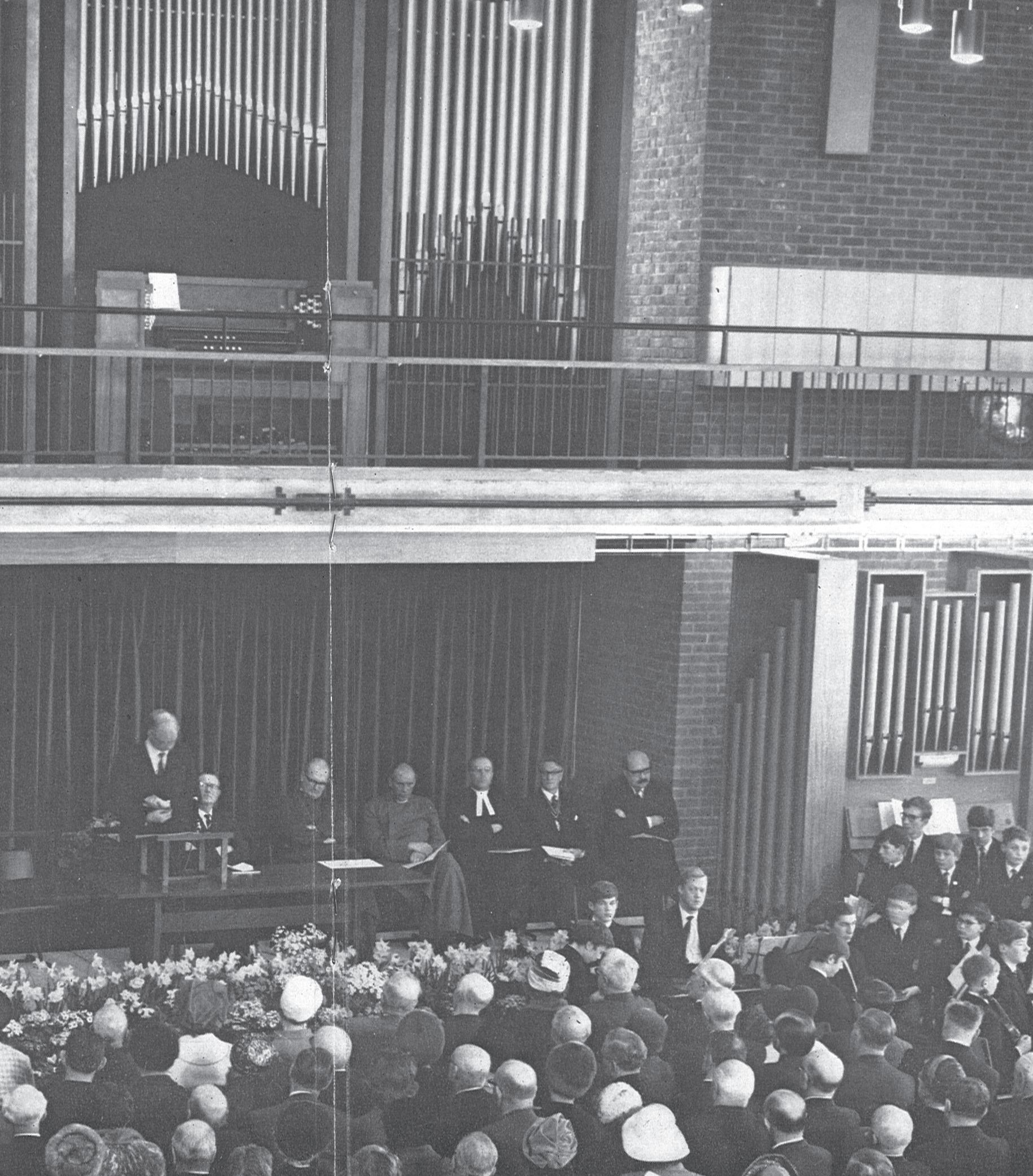
















This magazine reports on another excellent year in the life of St. Olave’s. Given our outstanding academic achievements over many years, for these records to be beaten this year following the pandemic is quite remarkable – a tribute to the dedication and commitment of all at the School. I have always believed the quality of enrichment and co-curricular activities contributes significantly to academic standards within the classroom. It is a pleasure to read about all of this fresh still in our minds, as well as knowing collectively the ‘Olavian’ magazines are the history of the school that future generations will research and read.
I trust that you will enjoy this record of St. Olave’s in 2022 – it has been another good year.
 Andrew Rees Headteacher
Andrew Rees Headteacher
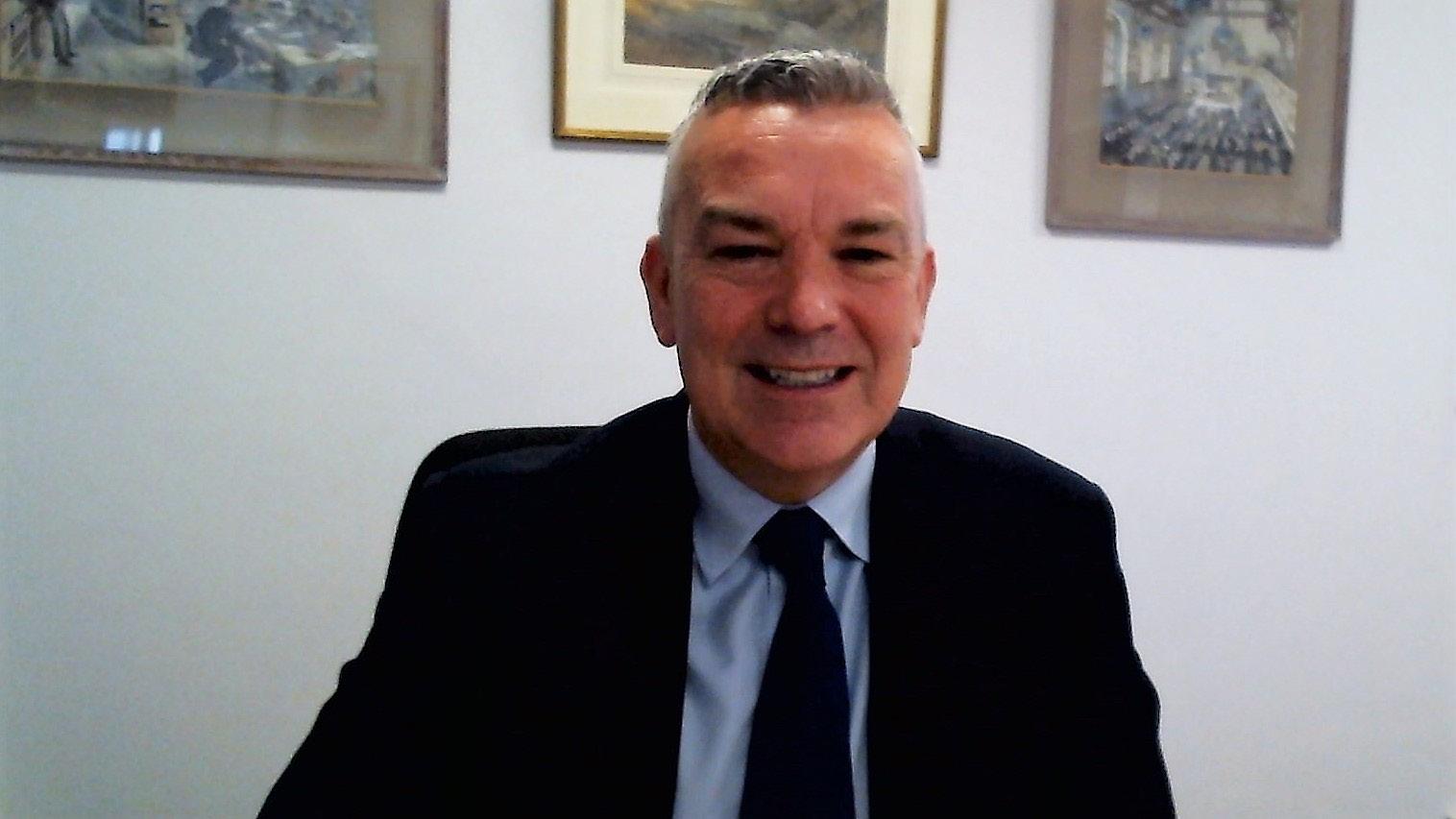
Thisyear’s magazine has been produced with the help of a new Assistant Editor whose dedication and support has been invaluable.
The Olavian is a record of the achievements of our amazing students and a true reflection of their inquisitive interest and in-depth knowledge across so many areas. After the challenges of the pandemic, we were finally able to return to a normal school routine, without the need for bubbles and social distancing. As ever, a myriad of events and activities have taken place throughout the year, resulting in a huge number of student successes and achievement in a wide range of subject areas such as Olympiads, competitions, sports and music.
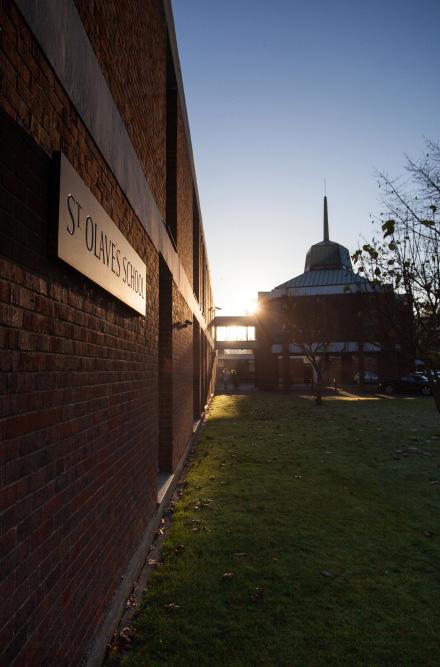
Thank you, once again, to the Headteacher, Senior Leadership Team and staff for all their hard work and for ensuring the smooth running of the school. Congratulations to all the students on their fantastic achievements.
Tereska Taylor EditorA.Boyd, M.A., M.Eng., A.C.A.
Foundation Governors
Appointed by the Lord Bishop of Rochester:
A Adeloye
Appointed by the Rochester Diocesan Board of Education:
The Revd. N. Poole
The Revd. G. Rogers
Appointed by the Chapter of Southwark Cathedral:
S. Rose, C.Q.S.W.
Appointed by the St Olave’s and St Saviour’s Schools Foundation:

Dr D. Ryall. Ph.D., B.A.
H. McAleer, M.A., M.Eng.
Appointed by the Dulwich Estate:
A. Fabian, M.A. (Oxon)
Appointed by the London Borough of Bromley:
R. Evans, B.Sc., DipEd
Elected Parent Governors:
S. Bandi, B.Sc., M.A.
B. Nunn, MCIPD
Elected Staff Governor:
C.A. Benham, B.A., P.G.C.E.
Co-opted Governor:
S. Chaudhary, M.A., B.Ed.
Clerk to the Governors
R. Walters, M.A.(Cantab), A.C.A.
Senior Staff
Headteacher
A. Rees, B.Sc., University of Bristol
Deputy Headteacher
D.J. Budds, M.A., St. Peter’s College, University of Oxford (Curriculum)
R. Maxwell, B.A., University of Manchester (Pastoral)
Assistant Headteachers
M.D. Birtchnell, B.A., University of Exeter, M.A., Canterbury Christ Church University
Dr A. Sidhu, B.Sc., UCL, M.Sc. University of Exeter, Ph. D. University of Warwick
Chaplain
The Revd. Dr. J.E. Bowen, D.D. (UIC, Delaware), B.A. (Hons), Canterbury Christ Church University, B.Ed. (Hons), South Glamorgan Institute
Headteacher’s P.A.
T. Taylor, M.A., Swansea University
S.L. Beston, M.A., St Catherine’s College, Oxford
P.E. Holland, B.Ed.(Hons), Brunel University
A.M. Kenward, B.A.(Ed.) (Hons), University of Exeter
D. Bowden, B.A., University of Lancaster
C.E. Marwood, B.Sc., The Open University; L.R.A.M., Dip. R.A.M.
M.F. Sullivan, B.A., Westfield College, London University
S.K. Wilcox, B.A., Goldsmiths’ College, London University
Dr. J. Bradley, B.Sc., Ph.D. King’s College & Royal Free School of Medicine, London University
C. Johnson, B.Sc., University of Nottingham
J.A. Greenwood, B.Sc., University of Bradford
K.A. Hodges, M.Eng., St. Catherine’s College, Oxford
M.G. Price, M.A., Trinity College, Cambridge
P. Vasileva, B.Sc., University of Sussex
V.E. Watson, B.A., University of Sussex
L.D. Espejo, Esq., M.A., University of St. Andrews
E.A. Goodman, B.A., University of York
R.E. Hawley, B.A., Middlesex University
A. Wilkie, M.A., B.A., University of Warwick & Goldsmiths’ College, London University
F. Affram, B.A., University of Ghana
J.M. Munday, M.A., Cambridge
H. McPartland, B.Sc., Bristol University
A. Lake, B.A., University of Nottingham
S. King, B.Sc., Queen Mary University of London
W. Haines, B.A. (Hons), M.Sc., Manchester
M. Lawrence, B.A. (Hons) (Cantab), M.Eng (Cantab) M.A. (Cantab)
Dr J.N. Stewart, B.Sc. (Hons), University of Glasgow, Ph.D., Heriot-Watt
A.K.J. Carroll, M.A. (Cantab), M.A. (London)
P.J. Metcalfe, B.A., Warwick, M.A., School of Oriental and African Studies
D. Farr, B.A., UCL
S. Lands, B.A. (Hons), Ravensbourne College of Design and Communication
J. Morrell, B.Sc., Reading
R. Smith, B.Sc., Leeds
J. Clift, B.A., Durham
S. Difford, B.Sc., London
M.C.M. Twose, M.Eng., Nottingham
A. Sykes, B.Sc., University of Oxford, M.Sc., University of London
C.A. Benham, B.A., London School of Economics
P. Bassett, B.Sc., Exeter
J. Savage, B.Sc., University of Warwick
M. Perks, B.Sc., Exeter
Dr A. Abbattista, B.A., M.A., University of Bologna, Ph.D., University of Roehampton London
K. Bishop, B.Sc., M.Sc., University of Bologna
Dr M. Ashford, M.Math, D.Phil., Oxford
R. Boyden, B.A., University of Surrey
Dr J. Carpenter, B.A., Cambridge, D.Phil., Oxford, M.Sci., Imperial College, London
N. Clegg, B.A., M.Sci., Cambridge
Dr S. Corlett, B.Sc., Ph.D., University of Liverpool
A. Shah, B.Sc. (Hons), University of Glasgow, B.Sc. (Hons), University of East London, M.Sc., University of Oxford
A. Fasoranti, B.Sc., University of Ife Nigeria, M.Sc., Newcastle University, P.G.C.E., University of Greenwich
A. Jewson, B.Eng., Bristol
E. Pourjam, B.Sc., Sharif University of Technology, M.Sc., Tehran
H. Attwood, B.Mus. (Hons), Birmingham Conservatoire, M.Mus., Guildhall School of Music and Drama
S. Senaratne, B.Sc., Royal Holloway College, London University
R. Zeshan, B.Sc., National University of Computer and Emerging Sciences-FAST, Lahore
R. Masters, B. Sc., University of Reading
A. Clark, B.A., Plymouth
E. Roye, B.Sc., Kingston University London
M. Wearn, B.A., Leicester
I. Saunders, Licence es Lettres, University of Lille
L. Probodziak, B.A., M.A., Somerville College, Oxford
C. Thomas, B.Sc., Goldsmiths’ College, London University, M.Ed., King’s College
S. Kemal, B.A. (Hons), University of Kent
E. Maltman, B.Sc., University of Hull
H. Smith, B.A., University of Bristol
R. Fuller, B.Sc., St Mary’s University, M.Sc., Staffordshire University.
I. Olalde Scott, B.A., Royal Holloway University of London
T. Smialowski, M.Sc., King’s College London
A. Ahmad, B.A. (Hons), London College of Communication, University of the Arts, London
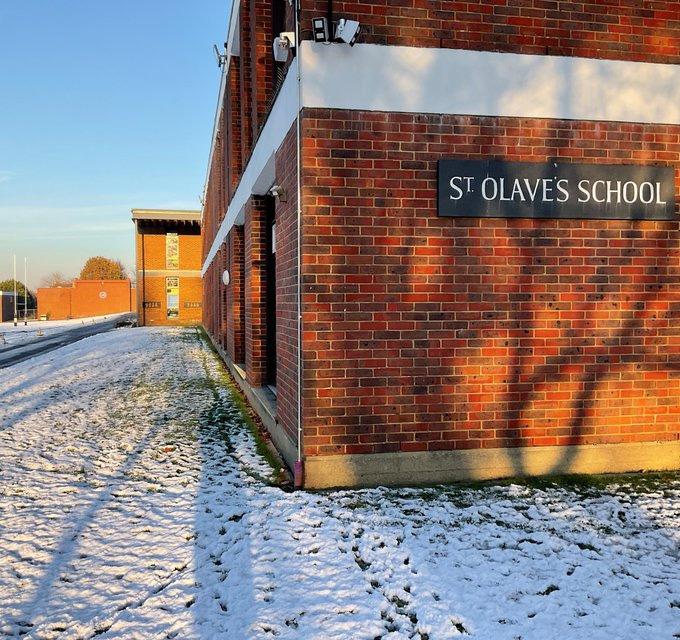
LEAVERS:

Deborah Farr, part-time Teacher of Art
William Haines, Head of Economics
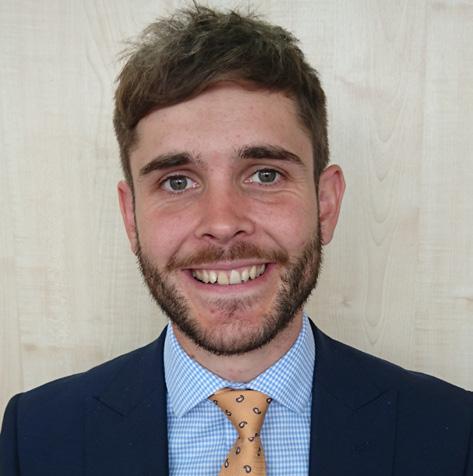

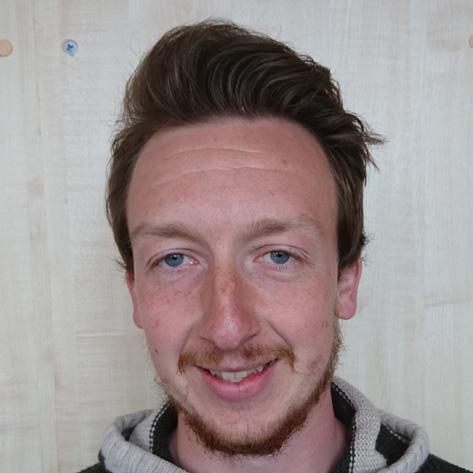
Andrew
part-time Teacher of Economics

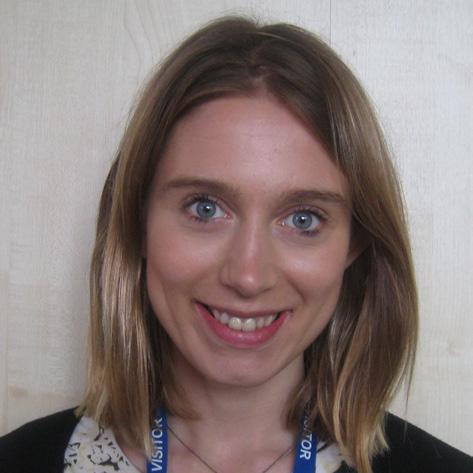
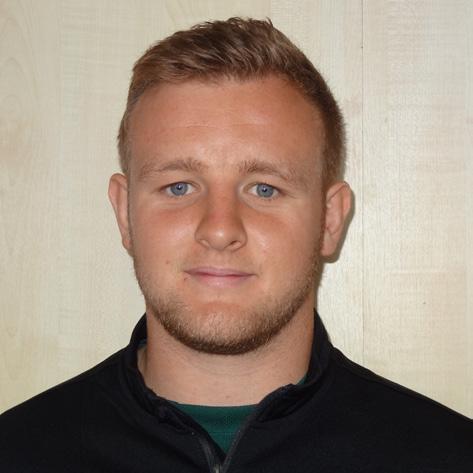
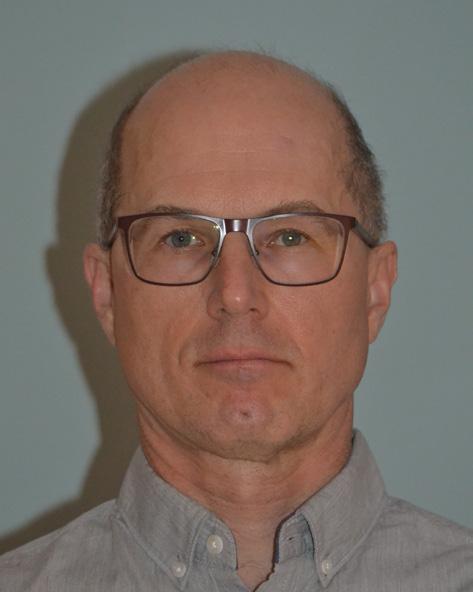
Jennifer Clift, part-time Teacher of History

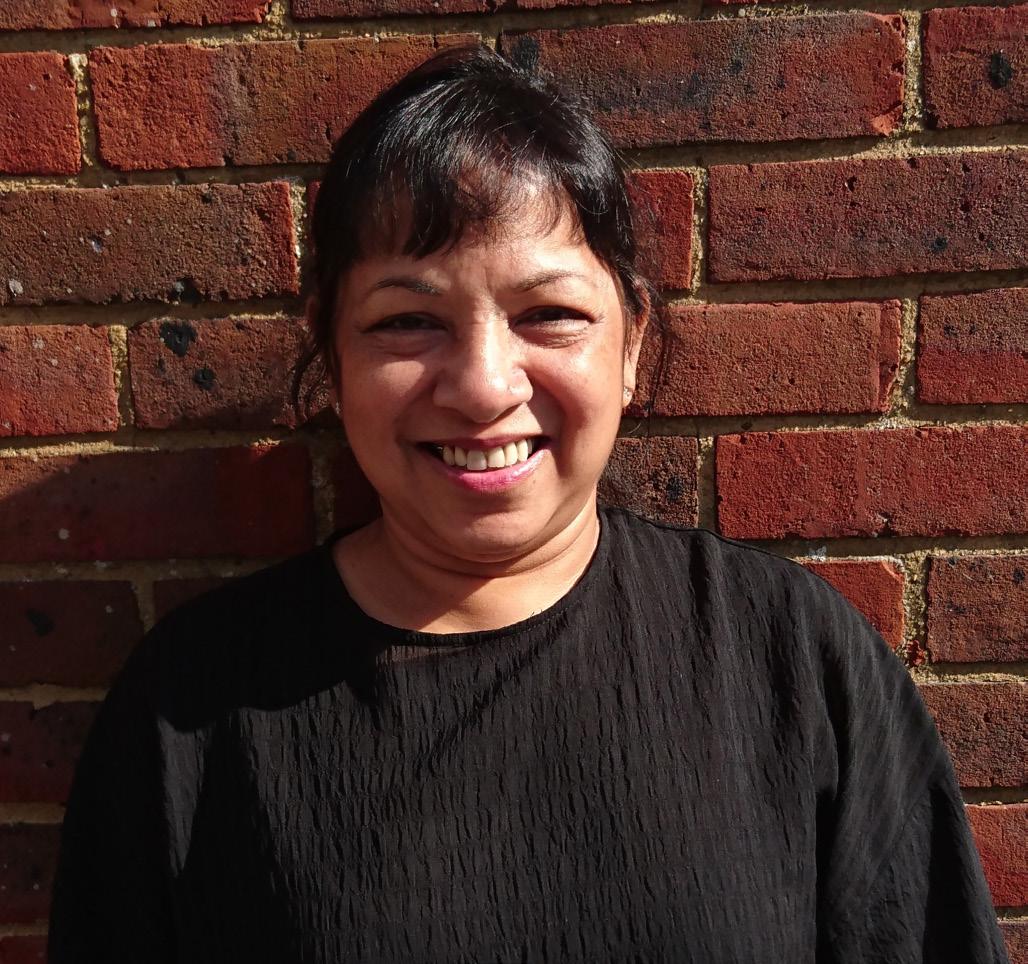



Mr Andrew Lay was educated at Brockenhurst College and went on to the University of Warwick where he gained a BSc in Economics. Andrew has acted as session leader for INSET days, has experience of EPQ Presentations, Oxbridge preparations, UCAS applications and personal statements. He also participates in a monthly Zoom meeting for Economics teachers. He has led co-curricular sessions/clubs on various aspects of Economics, organised an internal Economics blog and Sixth Form enrichment courses. Andrew has been a PSHE/SMSC Co-ordinator, an NQT (ECT) tutor and is an examiner for AQA Economics. He holds an England Hockey Level 1 Umpiring qualification and is a qualified DofE Assessor. Additional interests include sport, choral singing, cooking, quizzing.
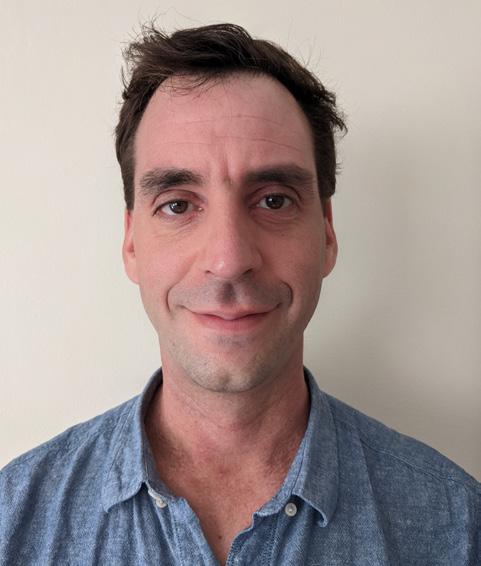
Mrs Sandra Potter was educated at Budehaven Comprehensive School. She initially studied Business and Finance at Plymouth University before [enrolling in the final year] and completing a BA (Hons) in Business at London Metropolitan University. She completed her PGCE at the Kent and Medway Teacher Training Institute. Sandra has extensive experience of the financial services sector having formerly worked in retail banking and for the body responsible for regulating the UK’s financial services industry. She holds a CISI qualification in Financial Services. She is also an AQA examiner and has a developed knowledge of both the Economics AQA and Edexcel A-level board specifications. In her teaching posts at Dartford Grammar School for Boys and then at Eltham College for the past 14 years, Sandra has organised Economics societies and clubs and is familiar with the various Economics essay competitions. She is proficient in the use of a range of computer operating systems and is a confident public speaker.
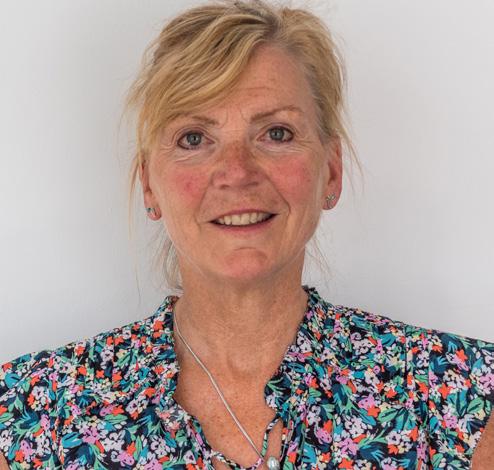
Mr Naresh Proddaturi was educated in India and went on to Bangalore University where he gained a BEng in Computer Science. He then obtained an MSc in Computer Networks from Middlesex University. Naresh completed his PGCE at the Institute of Education. He is an examiner with Pearson for GCE A level Mathematics, Further Mathematics and GCSE Mathematics. He is a Level 1 Google certified educator, is proficient in the use of Microsoft Teams and has provided training to staff for Teams and other IT technologies. Naresh has also taken the lead in a number of Mathematics competitions. He enjoys playing Chess and has been involved in the running of Chess Clubs.
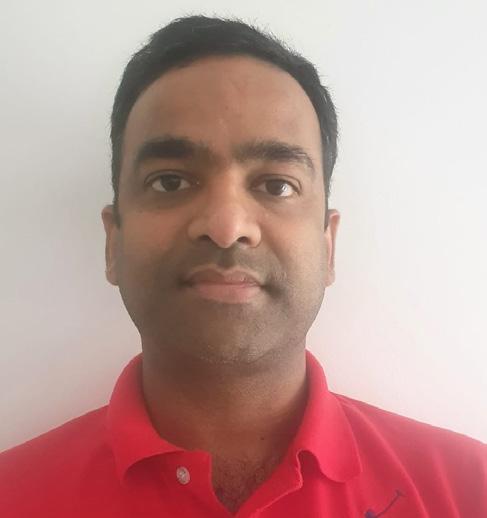
Miss Lily Foster was educated at St Ursula’s Convent School and attended St Olave’s Grammar School for the Sixth Form. She then went on to the University of Liverpool where she gained a BSc in Mathematics. Lily completed her PGCE at Canterbury Christ Church University. Lily has experience as a Maths Leader both in the UK and the UAE and has organised summer workshops and an intervention scheme to further support students. She has a keen interest in sports, has organised netball training and gym sessions. Lily is a Grade 8 violinist.
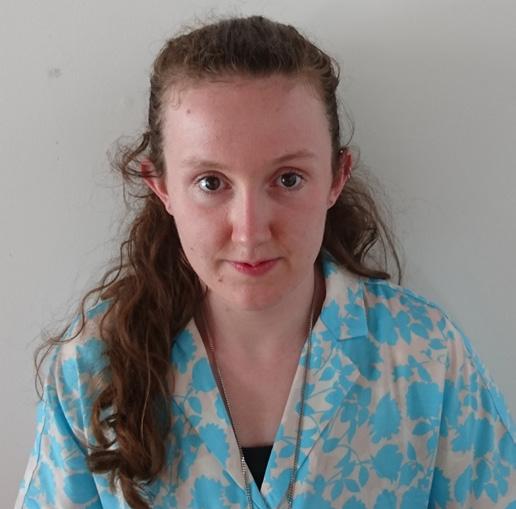
Miss Milly Chung-Faye was educated at Newstead Wood School for Girls, Langley Park School for Boys and Dartford Grammar School. Milly then went on to the University of Birmingham where she gained a BSc in Biochemistry. Milly completed a training placement at St Olave’s as part of her PGCE at University College London and participated in the KS3 Chemistry Club. She is proficient in the use of IT. She plays Rugby for Beckenham RFC and is a Rounders England umpire. She also enjoys team sports and holds Bronze, Silver and Silver Bar qualifications in Ballroom and Latin American Dance.
Max Johnson was educated at Allestree Woodlands Community School and attended Trent College Independent School for his Sixth Form. He then went on to Leeds Beckett University where he obtained a BSc in Sport and Exercise Science. Max completed his PGCE at St Mary’s University, Twickenham. Max has played academy rugby from an early age for Leicester Tigers, Northampton Saints and was also a contracted 1st XV player at Esher Rugby in National 2 South. He spent a season playing full time in South Africa for Western Province under 19s in the Junior Currie Cup and has played against the South Africa under 20s team. He holds an England Rugby Coaching Award and is looking to gain similar awards for both cricket and football.
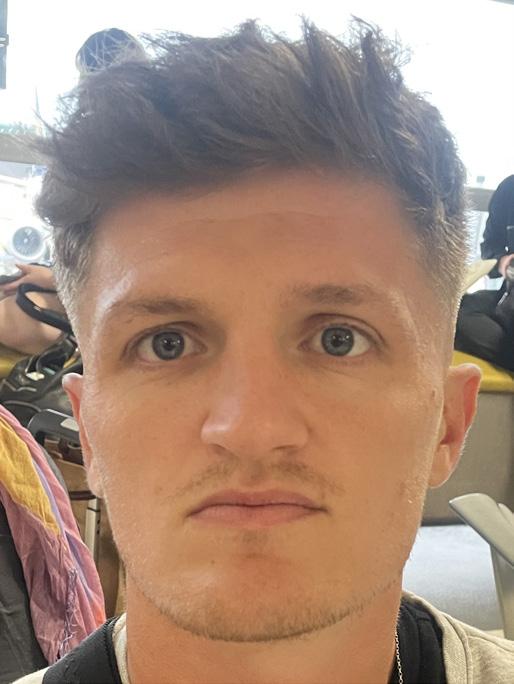
Mrs Lidia Prestipino was educated in Milan, Italy and went on to the Università Cattolica de Sacro Cuore where she gained a BA in Economics and Commerce.
Lidia has many years of management experience in the international financial sector before a change of

career and undertaking her Teacher Training as part of the School Direct, Kent and Medway training programme. Lidia speaks fluent Italian, German and French. She has led a German Club, Heritage Language Club and also has experience of the Duke of Edinburgh Award Scheme.
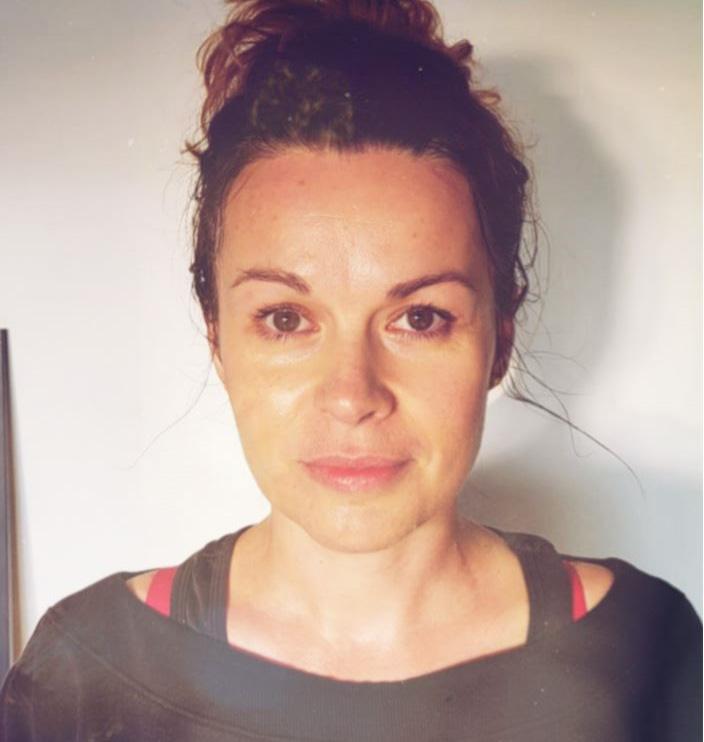
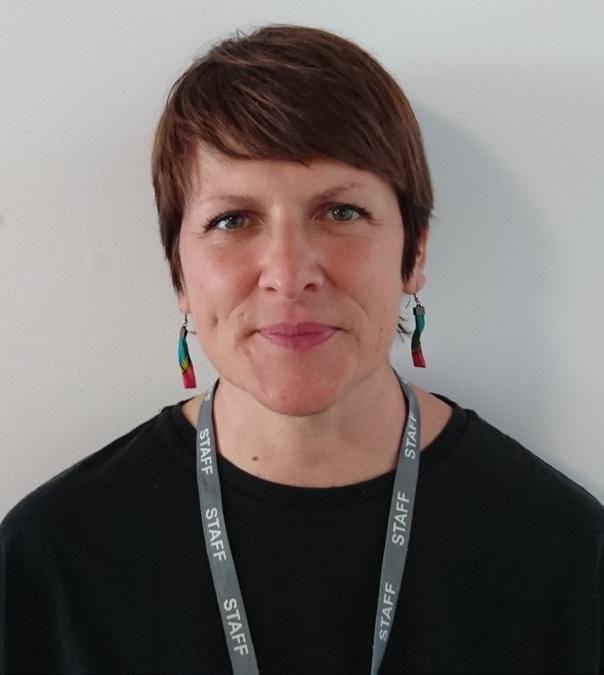
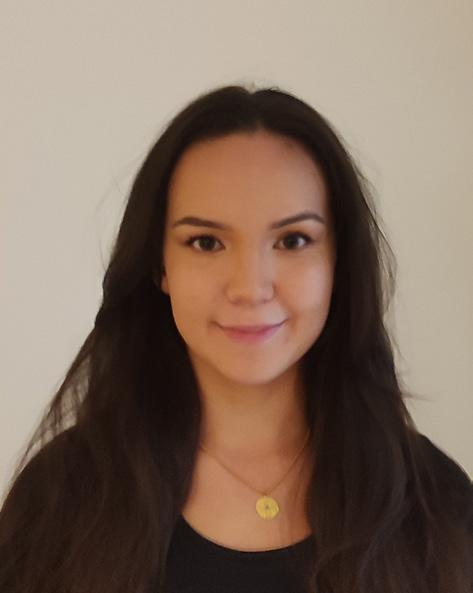
Mrs Alessandra Willmott was educated at St Peter’s R C School in Dorset and went on to Northumbria University at Newcastle-upon-Tyne where she obtained a degree in Design and Illustration in Fashion. She completed her PGCE at Goldsmiths University. Alessandra has extensive experience in the creative industry, working with artists and designers from across the fields of fine art, theatre, textiles, fashion design and architecture. She is also a freelance visual artist and has been involved in the production and delivery of creative projects for clubs, museums and galleries such as the V&A, Museum of Childhood and Horniman.
Mrs Olga KapitanskaMiekus was educated at the Jacek Malczewski Secondary Art School in Czestochowa, Poland and gained an MA in Art Education in the field of Fine Arts. Olga gained her QTS through the National College for Teaching and Leadership. She has worked on the renovation of frescoes and is trained to operate an electric ceramic kiln. Olga has supported students with their CGSE preparations including photography of their digital portfolios. She runs Art Clubs for both children and adults, is a member of Chislehurst Artist and Collage Collective and participates in various exhibitions and art events.

Miss Naomi AshleyThorne was educated at Stratford House Independent School and completed her Sixth Form at London South East Colleges: Bromley (LSEC). Naomi has managerial experienced within the business sector. Following a change of career, she attended LSEC where she gained a Level 4 Diploma in Therapeutic Counselling. She is also a member of the BACP. Naomi has worked with secondary age students through her counselling placements. She has worked closely with Safeguarding Teams and has facilitated weekly therapy and self-referral drop in sessions.
Mrs Tessa Molloy was educated at Presentation Convent Thurles in Ireland and went on to study at University College Dublin where she gained a BA in English Literature and Italian. The degree included an Erasmus year in Urbino, Italy. She then attended Maynooth, National University of Ireland where she was awarded a Postgraduate Certificate in Cultural Tourism. Tessa will complete an MA in Career Development and Employability at the University of Huddersfield and as part of the course, will achieve the QCD qualification in Career Guidance in January 2023, endorsed by the Career Development Institute. Her role as Head of Public Relations Recruitment for a prominent London recruitment company equipped her with a clear insight into how the commercial sector operates. Tessa has experience of UCAS applications and has been involved in the running of a Sixth Form external speaker programme. She has also attended weekly team meetings at Birkbeck, University of London, assisting with research into what prospective employers look for in graduates and is familiar with the wide range of opportunities within the business sector.
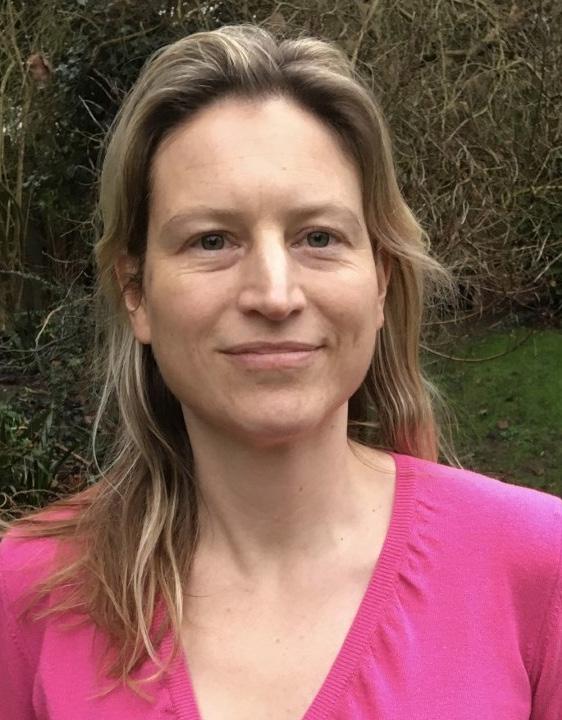
Mrs Tiffany Barradell was educated at Queen Elizabeth School, Corby and went on to De Montford University, Leicester where she obtained a BSc in Speech Pathology and Therapy. Tiffany has worked as a Speech and Language Therapist, Teaching Assistant and Early Years SEN Inclusion Practitioner. She has experience of working from EHCP targets, writing IEP targets and contributing towards annual review reports. As a past parent, she has co-ordinated the PA SEN Mock Tests and acted as an invigilator.


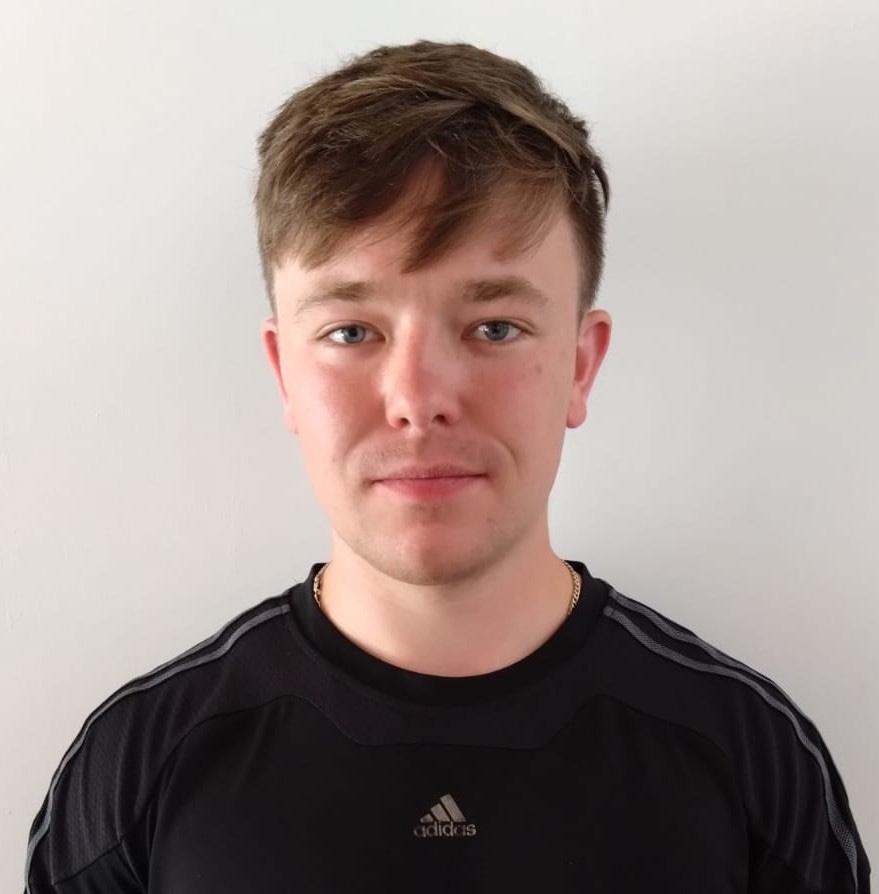

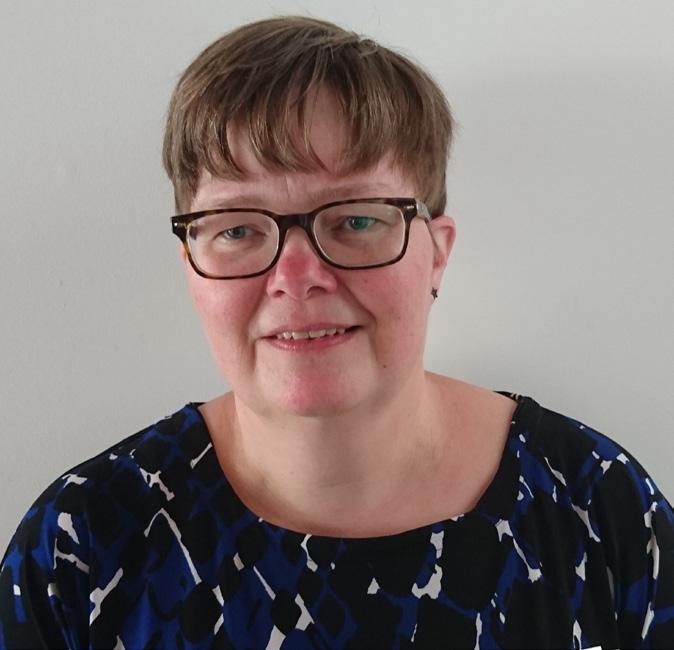
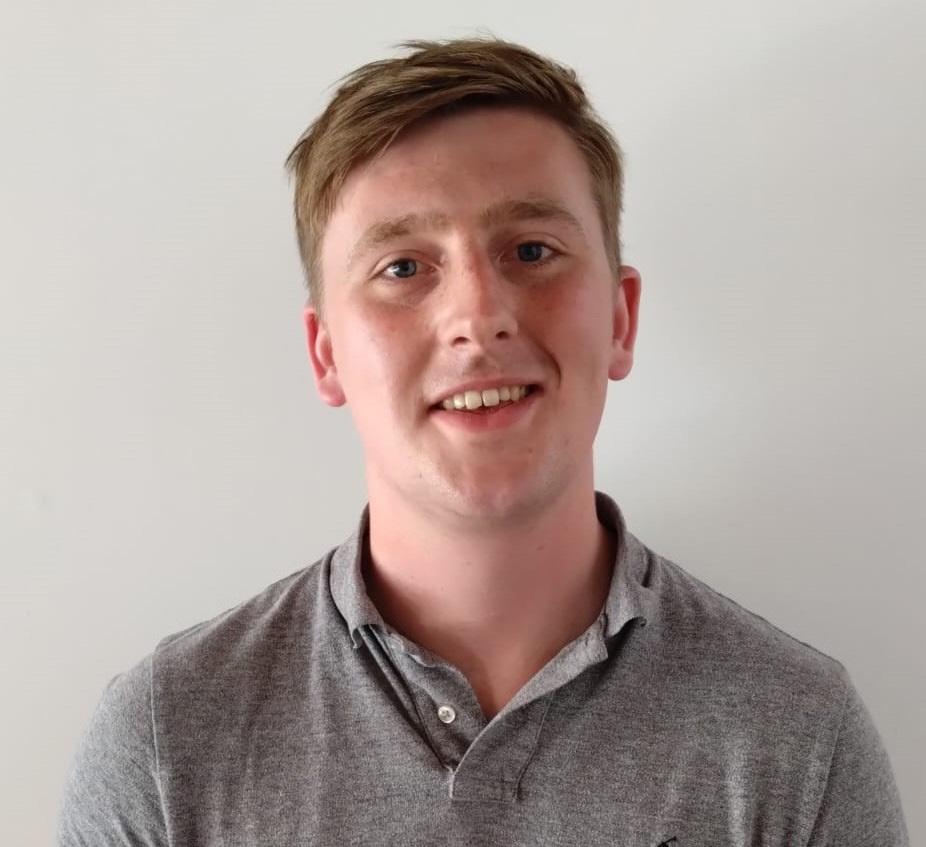 Receptionist - Mrs Suvetha Suresh
Trips Co-ordinator - Mrs Solveig Ruben
Part-time Teacher of Music (maternity cover) - Mrs Michelle Watkins
Receptionist - Mrs Suvetha Suresh
Trips Co-ordinator - Mrs Solveig Ruben
Part-time Teacher of Music (maternity cover) - Mrs Michelle Watkins
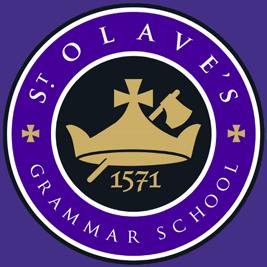
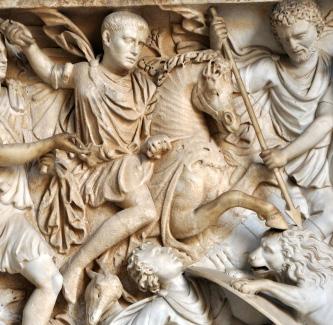

Honoured
it is a pleasure to welcome you to this celebration of the achievements of our prizewinners as we reflect on another excellent year.
It is funny how things that were once totally unfamiliar can, within a fairly short space of time, become totally familiar.
Take COVID testing. You have spent many mornings sticking a piece of plastic up your nose over the last two years. Swabbing the back of your throat – not sure if you were doing it correctly. I am sure you remember that.
This process formed part of a strange world across our schools, which I am not sure I can say you enjoyed, but you always did at school with the minimum of fuss!
The pandemic makes all the events, activities and achievements mentioned in my prize giving speech even more impressive and reflects the hard work, talent and resilience of our students alongside the constant support of parents, governors, and by no means least a committed and dedicated staff.
This evening I want to continue to highlight three areas of the longer terms vision for the school. These areas are happiness, success and our community.
The school has continued to pursue an outstanding environment that supports pupils’ wellbeing, and this has been driven by the pastoral team, Heads of Year and form tutors. We were thrilled to receive confirmation this year that we were accredited with The AcSEED Award for emotional wellbeing and mental health support. The review team were particularly impressed with our Vision for Pastoral Care, our Mental Health policy, our Wellbeing dog, Shelby, our Wellbeing journal Insight and how our School Counsellor supports students and staff.
Congratulations to all our students for making it through an incredibly tough two years. None of our leavers were able to sit GCSEs in 2020 and so this summer’s exams were the first external assessments you took.
A-Level results were once again outstanding. Not only are the results better than in the past two years when figures were based on assessments, but they are also up
on the last pre-pandemic year of 2019. The return of public exams has given our students the opportunity to clearly demonstrate the fruits of their continued hard work and focus during the challenges of the pandemic, and their strong motivation to push forwards. Among the many highlights, 96.4% of the grades secured were A* to B with almost 60% being at A*. There are some exceptional individual results, which include 93 students securing 3 A* grades or more. In 2019, this figure was 49.
Year 12s produced excellent AS results and GCSE results were no less impressive 91% of the grades secured were grades 9-7, with over half of these grades being at 9. There are some excellent individual results, which include 14 students securing all 9s. These figures are higher than they were in 2019, when exams last took place.
However, we have always known that this year was a ‘transition year’ between 2021 and 2019. This means that overall grades will be about halfway between the two nationally. It is therefore invidious to make direct comparisons with other years and vital that we celebrate the achievements of this year’s cohort
The resilience students have shown due to the disruption of the pandemic is remarkable as they prepared for exams. You are all exceptional, inspiring, and talented young people and we could not be prouder of you.
Thanks to contributions from the Voluntary Fund, the PA, the OO and the Foundation, the variety of sports and co-curricular activities continues to flourish, enabling our students to realise the best versions of themselves, beyond academic performance.
Lockdown had understandably had an impact on our international trips this year, but as soon as international borders opened up in February, the school ran exchanges, visited the battlefields, completed a World Challenge Trip to Norway, and participated in language visits in France and Germany. We also travelled nationally with inaugural trips to Hadrian’s Wall for a Classics trip and the Peak District for Chemistry Revision. Student engagement in DofE has been impressive with students taking part in expeditions across Kent and in Wales.
Our students regularly go above and beyond the examination specification, and this again was highlighted through the academic journals, including one to celebrate the 450th year since Queen Elizabeth I gave the school its royal charter in 1571.
From the impressive number of students gaining top awards in Computing, the Maths and Science Olympiads, Essay Competitions, Chemistry Challenges, CREST Awards, MFL Competitions and Olympiads, Economics and Classics Competitions, F1 in Schools, the International Space Settlement Design Competition, presenting at the You Economic Summit and the Hans Woyda Mathematics Tournament where we beat top independent schools throughout. These are just some of the examples of how the students look to gain success beyond the school setting. I know I would have missed some also.
For those wishing to develop or showcase their musical talents, there were ample opportunities, with music concerts, and for royal performances, and what will seem an eternity ago due to sad recent news regarding Queen Elizabeth II, our Wakeham Choristers of the Queen’s Chapel of the Savoy were honoured to sing for the Princess Royal and the Royal Victorian Order at the Chapel as part of the Jubilee Celebrations. Our choristers were exquisite in their contribution to this memorable occasion. Talented artists were on display by putting on an inspiring exhibition showcasing the fantastic work. Teams competed in the French National Debating Competition as well as a vast number of students completing a LAMDA qualification in public speaking and acting.
Sport continues to be successful and enriches the curriculum enormously. Saturday morning block rugby fixtures recommenced and congratulations to our 1st XV who won The Jimmy Cup. The same group of players went on to win the Judd 7s. We have been successful in Fives, with students being crowned U16 and U14 National Champions and outstanding Fives player, Genesis Nsenga was selected to represent Great Britain in the Wallball Championships in Holland. Well done to the U15 cricket team for their victory in the final of the County Plate competition. We have also had national and international success in skiing, hockey, chess, triathlon, cyclocross, basketball and tennis. Thank you to former colleagues Roy Archer and Chris Davies for carrying out the official opening of our All Weather Pitch. This is another fantastic resource we have added to the school to help improve facilities and encourage more students to take part in sport, which I believe supports a healthy lifestyle.
St Olave’s is a school which cherishes happiness within diversity and inclusion. This school year has provided many examples of how we celebrate learning together, whether it is through celebrating International Women’s Day, Black History Month, Cultural Evening or when we held the first ever school Iftar in the whole of Bromley. Leaders from different faiths were invited to share the virtues of fasting across different religions. We
were thanked by the Mayor of London, Sadiq Khan. The words in his thanks resonated with me as he stated London prides itself in its diversity – we do not just tolerate difference but respect celebrate and embrace it. Diversity is far from a weakness; it is our greatest strength. In a world where there are increasing divisions, it is so important that we provide these opportunities to be able to celebrate what we have in common together. I hope we do this here time and time again
And so it remains important that we hold our doors open to people of all backgrounds and traditions to unlock opportunities for all our students in a wide variety of disciplines, not simply those that are measured. We must patiently nurture development and growth, knowing that character stands at the heart of educational achievement.
We have continued to do our outreach work with local primary schools as well as inviting primary students into school for the Maths and Science Day. It is important that we encourage bright, gifted students from all backgrounds to learn, flourish, be part of this school, and encourage them to apply.
Our students are also aware of the need to reach out further than the school community and in this respect, I was delighted when our students chose to donate over £7000 from Festival to ‘Bromley Brighter Beginnings’ and ‘The Royal Medical Benevolent Fund’.
I hope that tonight’s prize-winners will continue to pursue that aspiration of reaching out beyond the community and build on the great legacy of this wonderful school, as they embark on life with optimism and excitement for the future in a new and changing world.
I truly believe that the endeavours of these young people have earned them their prizes in another highly successful year. Once again you have shone like the brightest stars. I also want us to recognise that there are many students who have not received prizes but who also work hard, give of their best and achieve in many different ways; they too deserve our praise. Congratulations to you all.
I would like to say that, whilst it is a great joy to look back and reflect on success and achievement, it is more important to look forward to new challenges and the exciting times and opportunities that lie ahead; as we start the new term and as students leave for university, there will be many of these, I am sure.
Leavers and current Olavians - I know many of you through what you do within and outside school exhibit Olavian characteristics time and time again.
Our school ethos states “When Olavians leave us, we hope that they will have developed into confident,
independent young adults with intellectual curiosity and imagination, as well as having achieved an outstanding academic record”.
I hope that you will not limit the height of your achievements, you will try and make your dreams come true, and work hard to reach them; aspire to be the best version of yourselves by learning from yesterday, living for today, bringing hope to tomorrow,
And this means getting the best education possible so you can think critically, so you can express yourself clearly, so you can get a good job and support yourself and your family, so you can be a positive force in your communities.
The pursuit of wisdom is a commitment to a lifetime of learning, personal development, and engagement as deeply as possible in each area of your work. It is a necessarily continuous process of formation. If you do this deepening, you are building your house on rock, not on sand, in contrast to the shorter-term pursuit of effectiveness and improvement.
It is essential that you engage with each other, not only online, but face to face so you learn through experiences – by committing together through lessons, seminars and lectures, sport and trips, eating slowly and discussing together, experimenting, failing, and celebrating. Maybe as you head off to student halls, you will pause and decide what it means to be an Olavian? What values do you think are important?
guest, Students, Parents and Carers, members of Staff and Governors. Thankfully, the last academic year saw something of a return to normality after the disruption of the previous two years. Despite regular COVID testing and higher levels of absence, the Year 13 students responded fantastically well and went on to achieve great things. None of us would have hoped for their time in the Sixth Form to be impacted in the way it was, but they made the best of the experience. Despite joining Year 12 at a time of bubbles, not being able to use the Sixth Form facilities fully and also their A levels being their first experience of public exams, they impressed us with their ability to go about things with a sense of calm and purpose. They adapted to what was put in front of them and did not allow it to stop them from fulfilling their ambitions, be that going to study at university, taking up an apprenticeship, going into employment or having a gap year.
The exam results awarded in the summer were
outstanding. The overall percentage of A* to B grades was impressive and this is the result of individual aspiration, hard work and academic excellence. The student body in the Sixth Form is talented and ambitious and I would like to congratulate each individual for what they have achieved and I know that they will continue to go on and develop both personally and academically. To our prize winners, your families will be justly proud of you and the school community is too. Well done on your successes.
The achievements of the Sixth Form are not just exam based. 67 students completed an EPQ with the vast majority being graded as A* or A. The essays and presentations produced for this qualification were truly exceptional with topics ranging from particle physics, literature, cryptocurrency and complex medical issues. This year we returned to delivering the presentations in person and were treated to a huge array of different topics that were spoken about eloquently and expertly. The support offered to each other during these presentations was also pleasing to see. Every presentation had an audience of fellow students who engaged with the content and then posed thoughtful questions to the presenter. Engagement on this academic level really is one of the hallmarks of the Sixth Form here.
Clubs and societies within the Sixth Form went from strength to strength - to say that they have been fully revived after the challenges of the pandemic would be an understatement. Having run their own societies in Year 12 when they started in the Sixth Form, Year 13 were fully prepared to run their societies last year and did so expertly. A wider range of societies than ever before took place and was also expanded to the younger years. Talks were as broad and as inspiring as ever and the range of external speakers also continued to increase following COVID disruption. These societies give so much to our students - they allow them to engage with topics of interest, they develop academic skills such as research and presenting, but they also give independence and confidence. Thank you to all those who are involved, be it as president or vice-president or as a regular attendee.
There were many other achievements beyond the curriculum. Numerous individuals and groups took part in many competitions and achieved highly in these. For example, Velian formed part of a team which won the Hans Woyda Maths Competition and Nils received the Elite National Finalist Award in the Oxford University Computing Challenge. These are just two achievements among many; too many to mention in a short presentation such as this, but all the students involved in extra-curricular activities should be justly proud of their achievements. Their engagement and involvement beyond the classroom further highlights their talents and their desire to extend their understanding and their marvellous achievements are one of the numerous things
about the Sixth Form at St Olave’s which make it such a special place.
The students have also demonstrated great commitment and determination in sport. They have shown exceptional leadership and have been excellent role models for younger students. There have been some incredible personal achievements in a wide range of sports. Just over a week ago, many in the year group came back to play against the current Year 13 during our Young Olavian’s Day. It was great to see them back in school once again and I would like to thank Nikhil for his work in organising this. We must also extend our thanks to the staff who freely give up their time outside of school to work with students and give them opportunities outside of the curriculum. This does not of course apply solely to sport, but to the many other activities such as clubs and societies.
Last year we were also able to resume in person concerts and many of the Sixth Form were involved in these, demonstrating exceptional musical talent. We were also treated to a fantastic performance on the piano from Jerry in the final assembly, as well as an excellent collective rendition of ‘Jerusalem’. We were all very excited that Cabaret could return and, again, we saw just how talented the students are with the various individual and group performances. This was mirrored at Cultural Evening. These two events are student organised and raised significant sums of money for different charities. Festival also very nearly came back in its original format but sadly was subjected to very last-minute changes due to a rise in COVID cases. Despite this, an excellent amount of money was raised for charity. The organisers of these three highlights of the school calendar showed great determination, dedication and creativity and the whole of the school demonstrated its great compassion in the accompanying fundraising. I would like to thank those in Year 13 who were involved in these charitable efforts. The willingness to undertake such things alongside an already demanding workload never fails to amaze me and the fantastic teamwork and leaderships skills that our students demonstrate are second to none.
The Sixth Form provides students with many opportunities to develop their skills beyond the academic. Many serve as prefects and therefore have the opportunity to develop their leadership skills. About 130 students took up prefect positions and were once again able to engage with tutor groups in the younger years and organise events within academic departments. The Senior Prefect Team of Millie Hennessy, Steven Coker, Anupam Bandhi, Jahnavi Singh, Scarlet O’Keefe, Rhea Rentala, Matthew Todorov and Nikhil Doosa achieved a great deal throughout their time in post. They adapted well to a hybrid of in person and online events. By the end of their tenure, they were well versed in everything
technological, having made many promotional videos and taken part in several webinars. They gave their opinions on various matters thoughtfully and reflectively and I am personally very grateful for their insight. Alongside the Sixth Form Association, the voice of the Sixth Form students could be fed into the work of the school and many initiatives were introduced which will benefit future generations of students who join us. The school is incredibly thankful for the work of all prefects and the developments that they leave behind. The skills that you have learnt will serve you will in later life, and you leave behind a source of inspiration to those students who follow.
As I come to the end of this speech, we must remember Isaac who very sadly passed away towards the end of Year 13. As a school, we remember him fondly and his friends and family continue to be in our thoughts.
The Year 13s have very much risen to the challenge of Sixth Form and all of them have made their school proud. You have shown resilience, flexibility and optimism. I am sure that the teaching staff would agree with me that it has been a pleasure to work with your year group. You have demonstrated the skills and qualities that we would hope for our students to have and that will allow you to make great contributions to the world around you in the future. You leave behind a great example to the new Year 13 as they begin their final year at St Olave’s. On behalf of the whole school, I would like to thank you for your good humour, your commitment and your many contributions and wish you every happiness and success for the future.
If someone had told me in the summer of 2010 when I was giving my last assemblies at St Olave’s, that I would be standing here again twelve years on I would not have believed them. So it is both a great surprise and pleasure to be invited back this evening.
Great schools have the capacity to capture the hearts and minds of those who study and teach in them and those in the school community. St Olave’s is no exception to that rule, and I still treasure my years spent working here. For sixteen years this was not only my place of work but my family home. We lived in the Headmaster’s House which is now the admin area! At the Old Olavians Reunion last week a member of the office staff told me she is now based in my bedroom. We won’t go further on that one! My son was a pupil here and we were proud parents. It was rarely a problem. Indeed a few weeks in his name was read out at Friday Assembly on the list of those in Saturday Detention. A ripple of reaction went round the Hall. I asked him about it in the evening and he said he had been getting the thumbs up all day! When
he was in the Sixth Form we took a trip to Brighton and he brought his girlfriend who was at Newstead. In the evening she thanked us for the trip and said: “Do you mind if I say something?” - “Not at all” I said confidently - she said “You are actually quite normal!” Her preconceptions did not envisage a head teacher as an ordinary parent.
There was however an aura for headship. At a concert in this hall a chorister in the front row fainted. I raced forward and picked him up in my arms asking the audience if we had a doctor in the house. The boy then came round, looked up with horror as he saw my face and promptly passed out again.
My wife also played her part. I tested my assemblies on her and she edited them ruthlessly with a 2B pencil scoring out large chunks of text. “You are boring them, they will be falling asleep, you have lost their attention at this point…” I can tell you now that generations of ‘Olavians’ have cause to be grateful for her work on those assemblies.
In a school like this with talented pupils and an aspirational and inspirational ethos there is always much to celebrate and there were many high points in our time here. I shall never forget the day we were presented to the Queen at a special service held at the Savoy Chapel. She spent a great deal of time talking to the choristers and their families and was well briefed about the School and its history. When she thanked me for allowing the boys to be out of school missing their lessons, I confessed it was in fact the half term holiday. “Oh well” she replied “above and beyond the call of duty then!”
I still work in schools and one of my roles as Chair of a new multi academy trust is both a privilege and a challenge. Meetings are all very well, but what I continue to enjoy most is spending time in classrooms observing lessons and sharing the joy of teaching and learning. I do have to be careful now though in primary and infant classrooms. Getting back up from those small chairs is not easy these days!
I always enjoyed too walking round the school talking to pupils and staff. Although occasionally I bit off more than I could chew, such as the time I started a conversation with one of our gifted Olavian mathematicians as we walked through the cloisters. I had just been to see -”A Beautiful Mind” the film about John Nash. “Ah yes” he replied “I am quite interested in game theory and probability and I’ve already disproved two of his main theories. Now the problem with Nash is….” Half an hour later I was thinking to myself “Jarvis you should never have started this conversation.”
It is customary I know, on these occasions, to give few
words of sage advice to the prize winners and leavers. I am mindful however of a Classics essay written by a Year 7 pupil who said “Socrates was a great thinker who went round giving people advice – they killed him”. So I shall be careful. This year saw a return to traditional examinations which I am sure was a joy to all of you. Academic standards and expectations are increasingly high and they are important, the currency to get you on to the next stage in your education, but not the only test in life. We have one of the most examined school systems in the world and the greatest fool can ask more than the wisest man can answer. If you look at the present crop of national examinations there are plenty of examples of that:
• A recent examiner’s report that said “there were gaps in some candidates’ ignorance”
• A Psychology ‘A’ level paper with the following question: “Is the average child a boy or a girl? Comment on any difficulty you may find in answering this question”
• Clarity from an English Paper: answer at least three questions but not more than four from this section, selecting your questions from at least two books but not more than three. NB you must answer one context question - you may if you wish answer two, but not more than two context questions
• And the one that gave most scope to young agile minds was in a Biology GCSE Paper “Name three things a living rabbit can do that a toy rabbit cannot”
While you might not take the view of the great John Maynard Keynes who, on failing his civil service exam, said “I clearly knew more about economics than my examiners” it is worth remembering that exams do not test all those other important qualities such as perseverance, courage, leadership, teamwork, the ability to influence, to care for and help others.
Intelligence has many dimensions and your future success will be found in many different ways. Like all Heads and teachers I have countless examples of pupils who go out into the world and find their success and vocation in ways that surprised them as well as us.
You - the prize winners are the stars this evening. Your parents have nurtured and supported you, the teachers have developed your learning and prepared you for the exams you need but you have done the work. If you have done your best, engaged in the co-curricular life of the school and contributed to this community you are a success.
I would add a fourth to that Trinity – never become obsessed by failure and learn from things going wrong.
We have for years been conditioned in our schools by a pattern that there is a right answer to every question – the University Challenge model. Real life is not like that. Science is no longer like that. I remember a wonderful interview with Trevor Baylis the inventor of the Clockwork Radio which has transformed the lives of people living in remote areas of the world. There had been years of failure and many false starts before he finally got it right. In which respect I was heartened to read of a primary school pupil taking his key stage Science practical. Having predicted the lump of metal would float he was heard to exclaim “Bloody Hell it’s sunk!”
Don’t give up and take inspiration where you find it. My life was transformed working in an international school and ever after I was committed to developing the schools I worked in as multi-cultural communities.
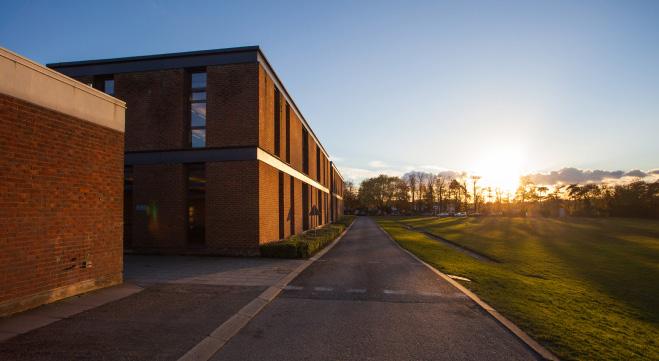
I want to leave you - especially the leavers with an image. A man is sitting in a prison cell. He is at table and
scribbling away on some sheets of paper. He has a doctor come to visit him. The doctor sees what he is doing and berates him “Writing poetry! You are mad! Come to terms with the reality of your situation” he says. “I may be mad” says the prisoner “but how much madder only to see the world as it is not as it might be”.
My generation has left you with much to do and I for one am delighted to see young people leading the campaigning for crucial issues that we must resolve.
It seems especially fitting this evening that my last quote is from our late Queen Elizabeth II: “When life seems hard, the courageous do not lie down and accept defeat; instead they are all the more determined to struggle for a better future.”
I congratulate you on your tremendous achievements which we have celebrated this evening and I wish you every success and happiness in the future helping to create a world as it might be.
Giles Pilcher Prize for Public Service (Awarded by The Old Olavians’ Lodge)
Steven Coker, Millie Hennessy
Art Prize Anandi Brown
Graphics Prize
Harvey Belchamber
Design Prize James Guest
Susan Owen Medal for Drama
Steven Coker
L.W. White Prize for Sporting Activities Sannah Zaman
The Headteacher’s Fund Prizes
Anupam Bandi, Nikhil Doosa, Scarlett O’Keefe, Rhea Rentala, Jahnavi Singh
I.W. Kirk Prize for Sportsmanship Edward Cross
Senior Victor Ludorum
Charles Nortey
Ben Read Trophy William Rowe
Douglas Keeble Prize for Fives Aaditya Deshmukh
Sidney Tweedy Chess Cup Aditya Verma
Chambers Prize for Leadership
The Anthony Jarvis Shield
The Woodard Board Prize
Michael Pugh Prize for Public Speaking
Debating Prize
Headteacher’s Prize for Poetry
The Kemal Cup for Poetry
O.O. Lodge Prize for Contribution to School Life
The Medical Fund
Cathedral Parish Prize for Voluntary Service
Leslie Sanders Prize for English Literature
French Prize
A.W. Walker Prize for German
Matthew Holmes Prize for Classics
The Ashley Prize for History
Antiquarian Society Prize for a History Project
The Alan H. Sainsbury Memorial Prize for History
The Sarah Beston Memorial Prize for Geography
Economics Prize
Harry Little Prize for Mathematics
Paul Slade Prize for Physics
Brian Ruth Memorial Prize for Physics
Gnaanachelvan Prize for Biology
Biology Project Prize
George Dyson Prize for Chemistry
Chemistry Experimental Skills Prize
Computing Prize
Phyllis Packer Prize for Practical Musicianship
An Old Olavian Prize for Music
Religious Studies Prize
Millie Hennessy
Krishna Akella
Steven Coker
Wren Welfare
Kiran Pearce
Martha Hodgson
Crystal Nettey
Selin Gorkem
Bharathsri
Sivasritharan
Kalina Poydovska
Elise Stringfellow
Griffin Keemer
Matthew Todorov
Elise Stringfellow
Flora Wilton
Tregear
Jemima Jackson
Eloise Rydell
Amishi Gupta
Flora Wilton
Tregear
Velian Velikov
Aaditya Deshmukh
Lara Tatli
Daksh Mehta
Elodie Gorter
William Rowe
Bharathsri
Sivasritharan
Nils André
Carla John
Matias Morgan
Laura Gander
Gordon James Christie Prize for Cricket Pranav Gillella, Daniel Saldanha
H.G. Abel Prizes - for students with 3 or more A* grades at A-Level
Adesimbo Adeniran Sanchi Joshi
Irem Akdag Vitheeshan Kajanthan
Pradhay Amarnath
Patrick Kenny
Nils André Harry Kibblewhite
Aruldoss, Gautam Lai, Alexander
Ayomiposi Awoyemi Hieronim Lecybyl
Samuel Baffoe
Caleb Lee
Vinujan Balakrishnan Sophie Lee
Ebunoluwa Bello
Vivian Lopez
Ishaan Bhargava Ye Lu
Saakshi Bhat
Navaneeth Madhavan
Raveena Boopathy Rupankar Majumdar
Rohan Boyapati
Daniel Byrne
Nandini Chanda
Holly Chen
Isaac Clark
Thanmay Mangala
Sachidananda
Adrian Manickarajah
Oliver McCabe
Daksh Mehta
Jeremiah Muoneke
Abdullahi Dahir Aidan Mylroi
Aaditya Deshmukh
Nikhil Doosa
Shahar Eyal
Fiona Fetahu
Venkata Golla
Elodie Gorter
Tanya Narendra
Charles Nortey
Chloe Odusola
Catherine Omosule
Macey Pattenden
James Perry
James Guest Pesenti, Maxime
Amishi Gupta
Kathy Halton
Samuel Peterson
Francois Poh
Hardiv Harshakumar Aimee Quan
Charlotte Heard Aakash Rai
Ibrahim Iqbal
Andrew Ize-Iyamu
Theodore Rhally
Amelia Rodrigues
William Rowe Ryan Thukalil
Tausif Samad Matthew Todorov
Aaron Sanjeevan Flora Tregear
Kathir Saravanan Neil Tripathi
Frank Shrimpton Toan Truong
Shreyas Shubham Tejal Vadukul
Jahnavi Singh Velian Velikov
Arun Sinha Vaibhav Vinod
Bharathsri Sivasritharan Zackary Welch
Grace Sodunke
Jedidiah Woodley
Siddharth Soni Yuran Xiao
Elise Stringfellow Tharun Yogakumar
Luxan Sureshan, Sannah Zaman
Lara Tatli Ruiqi Zhang
Shruti Thatikonda Tyrone Ziwa
Sarujan Thayalan Iman Zomah
H.G. Abel Prizes - for students with 10 or more GCSEs at Grade 9 or 8
Ethan Abeelack Sean Lee
Max Acton Max Lewis
Wafi Ali
Joshua Mead
Mehul Bhargava Chinedu Ndukwu
William Blackwood Ioan Negru
Oscar Brockwell
Timothy Oboh
James Carrick-Lawson Isaac Olaleye
Benjamin Dakshy
Daniel Oso
Ronald Dopemu Thaddeus Otuoze
Mikel Emele Abhinav Perikala
Vithun Gnaneswaran Sam Saji Pynadath
Frank Gubars
Daksh Gupta
Luis Rodriguez Cicirello
Sachin Sanathkumar
Raphael Huille Arjan Sandhu
Amitan Joseph Abhinav Tavv,
Yash Joshi
Ben Joshua Yip
Ray Keemer
Aradhya
Oliver Toth
Marko Tsioupine
Kennedy Umunna
Sachin Wimalan
Awarded by the Parents’ Association for “enthusiasm, commi ment and imagination in the use of the Lower Sixth year”
Governors Awards
Velian Velikov Balkan Mathematical Olympiad
Daanish Ashiq England’s London South U14 Hockey
Joshua Acheampong
Mensah, Taiwo Akinsanya, Oluwaferanmi
Akodu, Amogh Bhat, Srithan Chanda, Ayman Chowdhury, Aaditya Deshmukh, Zaina Elahi, Frank
Gubars, James Guest, Garv Gupta, Arjun
Jadhav, Nico Li, Macey Pattenden, Keshav Sheshadri, Karresh
Srikandaneswararajah, Uzair Syed
Muhammad, Ojas
Tiwari, Koby
Willmott, David Wu
Eduardo Holovatyuk
Ben Joshua Yip
Shaurya Mehta
Velian Velikov
F1 National Finalists
The Potto Hicks Award
Prajval Haldia India to carry out volunteer work organised through Sewa UK, on a project at the Chochlea School for Hearing and Speech in Pune, including the physical construction of the school as well as teaching English.
The Rushbrooke Memorial Award
James Perry Six-week summer camp placement in Frankfurt, teaching English and helping to run activities for children aged 5 to 12 years. Places to visit include Hesse, Koblenz, Munich, Starnberg and Zurich.
The Witton/Newmarch Award
Charlotte Heard, Martha Hodgson, Caleb Lee, Matias Morgan, Macey Pattenden, Lara Tatli, Zackary Welch
Rome to explore the modern-day culture, broaden knowledge and further develop interpersonal skills. Visiting The Pantheon, Capuchin Crypt of Santa Maria della Conceziona, Largo di Torre Argentina and St Peter’s Basilica.
The War Memorial Scholarship
Hans Woyda Competition
Sannah Zaman National Cycling Junior Hill Climbing Competition
Guneeka Chitkara, Maia Guo, Isabella Fisher, Esther O’Neill, Max Dawkins, Siddharth Mishra
St Olave’s School Award
UK Space Design Competition
Luxan Sureshan Gold Award
Eashan Rautaray, Abdul Rehman Silver Award
Grants for Outward Bound, Travel and Gap Year projects
The James Burdett Memorial Prize for Gap Year Travel:
Elodie Gorter Eastern Australia to experience the wonderful culture and nature, and to undertake voluntary work in local hospitals across Sydney prior to reading Medicine at University.
Maia Patricio Europe to broaden cultural, linguistic and artistic knowledge. Working in Mallorca for the month of August as part of a cultural exchange to experience authentic Spanish life and utilise language skills. Then travelling to Milan to study the architecture.
The Secretan Award
Millie Hennessy
Paris and Southern France to utilise and expand language skills, broaden cultural knowledge and visit sites of historical interest.
The Davis Award/Lennie Award
Rohan Boyapati, Anant Shanker Greece to broaden current knowledge and experience culture, visiting Heraklion, the Samaria Gorge and hiking up Pakhnes.
The Gridley Award
Kathy Halton, Alfie Holland, Griffin Keemer
Road trip through Central Europe, visiting Krakow, Trutnov and Prague to broaden knowledge and understanding of European culture, history and the political climate as a whole.
Senior Colours
Senior Prefects
Anupam Bandi, Steven Coker, Nikhil Doosa, Millie Hennessy, Scarlett O’Keefe, Rhea Rentala, Jahnavi Singh, Matthew Todorov
Intermediate Colours
Basketball
Cricket
Fives
Tausif Samad, Aaron Sanjeevan, Ritvick Sharma, Frank Shrimpton, Jahnavi Singh, Grace Sodunke, Elise Stringfellow, Uzair Syed
Muhammad, Lara Tatli, Shruti
Thatikonda, Matthew Todorov, Velian Velikov, Aditya Verma, Zachary Welch, Jerry Xu
Timothy Oboh
Aditya Anoop, Saahil Bansal
Aaditya Anoop, Thomas
Farmer, Anton Lewis, Connor
Contribution to School
Life
Harvey Belchamber, Ebun Bello, Isobel Buchanan, Jahcure Dixon, Scarlet Donoghue, Nikhil Doosa, Selin Gorkem, Prajval Haldia, Rhea Rentala, Matthew Todorov
Badminton Siddharth Soni
Chapel Matias Morgan
Ayomiposi Awoyemi, Krishna
Akella, Jahcure Dixon, Nikhil
Music
Rugby
Swimming
McMichael, Shiv Shetty, Marko
Tsioupine
Benjamin Dakshy, Chinedu
Ndukwu
Emenike Mwim, Chinedu
Ndukwu
Raphael Huille
Joshua Acheampong-Mensah, Max Acton, Oluwaferanmi
Cultural Evening
Doosa, Varsha Golla, Daksh
Mehta, Yash Karlekar, Rhea
Rentala, Yuran Xiao
Aaditya Deshmukh, Thanmay
Other Clubs
Akodu, Wafi Ali, Aaravamudhan
Balaji, Saahil Bansal, Max
Capamagian, James Carrick
Fives
Mangala Sachidananda, Neil Tripathi
Hockey Aidan Mylroi
Music Matias Morgan, Frank Shrimpton, Ruiqi Zhang
Netball Elizabeth Willcox
Rugby
Isaiah Akpovwa, William Boyd, Jahcure Dixon, William Rowe, Olasunkanmi Sanusi
Volleyball Sana Okada
Other Clubs & Societies
Farah Adegunle, Pradhay
Amarnath, Nils André, Anupam
Bandi, Peter Bellerby, Ebun
Bello, Nandini Chanda, Nikhil
Chidipothu, Shrey Choudhary, Isaac Clark, Aaditya Deskmukh, Scarlet Donoghue, Shivam
Dooraree, Zaina Elahi, Shahar
Eyal, Zachariah Fischer, Laura
Gander, Elodie Gorter, James
Guest, Prajval Haldia, Hardiv
Harshakumar, Millie Hennessy, Martha Hodgson, Joel Hughes, Griffin Keemer, Hieronim Lecybyl, Caleb Lee, Thomas Magee-Brown, Daksh Mehta, Matias Morgan, Chima Ndukwu, Victor Nguyen, Scarlett O’Keefe, Oluwapelumi
Oloyede, Macey Pattenden, Kiran
Pearce, James Perry, Nathan Plater, Amber Reddin, Eloise Rydell,
Junior Colours
Chapel
Cricket
Music
Lawson, Ayman Chowdhury, Thomas Farmer, Frank Gubars, Ben Joshua Yip, Ray Keemer, Aaditya Nandwani, Chinedu
Ndukwu, Benjamin Sharp, Ojas
Tiwari
Thomas Blew
Daniel Saldanha
Thomas Blew, Justin Choy, Francis Ikenye, Raphael Loges, Alexander Stevens, Thomas Sears, Shiven Shankar
Rugby Navin Matthew
Swimming
Sonny Landeman, Ahmed
Rashed
Abiran Akileswaran, Thomas
Blew, Shaurya Kadian, Devaansh
Lulla, Shaurya Mehta, Eashan
Other Clubs
Rautaray, Abdul Rehman, Kasim
Rehman, Daniel Rous, Aneesh
Sagar, Som Shah, Agastya Singh, Montgomery Ward
Good evening ladies and gentlemen and honoured guests.
Two years ago the boys began Year 10, and together we had those first remote assemblies, welcoming the boys and reminding them of the ‘new normal’ of masks and zones and having to tell the boys that the format of the GCSE exams was still ‘unknown’. Boys, you amazed me with your tenacity and resilience, adapting quickly to the new rules of COVID 19. Never a moan or a groan, and very much living up to the Olavian characteristic of ‘wholehearted determination to confront setbacks and to see the positive in adversity’.
So, we carried on and the boys worked hard and made the most of every opportunity….. Let me now reminisce and remind you about some of the highlights and amazing achievements that this group have been involved with over the last two years.
Opportunities have not been as abundant, but this did not stop the year group making the most of what was on offer……
We have a number of exceptional linguists amongst the year group, with several students travelling into London to the Goethe Institut to complete an ‘escape room’entirely in German! Additionally, Tony, qualified for the final of the ‘International German Olympics’, where he had to speak in front of a panel of judges.
Incredibly, over 40 students took part in the Duke of Edinburgh Award, and I attended one such expedition, however I did not manage to see many students as a number of them got lost! I am assured it was a success in the end.
Several pupils planned and delivered some excellent HPQ’s on topics of their choice, such as ‘Can we cure old age?’ and ‘Will the hunt for Dark Matter ever be fulfilled?’ The boys really impressed me with the high quality work that they produced.
I had the pleasure of seeing Thaddeus, Lutoni, David, Mikel, Tony and Isaac on stage where they were very entertaining, when they took part in the Black History Month celebrations.
We have had a number of individual successes too, such as Chess with a notable highlight for Amudhan with a win at the 2021 UK Chess Challenge U18 Final.
It was wonderful to hear of the boys volunteering and independent endeavours too. Such as, Wafi volunteering to collect unwanted coats at school as part of ‘Wrap up London’. Max Capamagian also independently
completed the Rapha Festive 500, where he cycled 500km in eight days.
The boys have been successful across a number of Sports in both team and individual events, from: Athletics, Cricket, Fives, Rugby and Tennis. Rugby has been very popular and successful with a number of first and second team players joining the senior level, which is a great achievement.
Aaditya and Tommy celebrated a fantastic win at the 2022 Eton Fives Schools’ National Championships.
Further afield, Raphael has had many sporting successes and we were very proud to hear he had been selected to represent Great Britain in Pentathlon in the U17 European Championships.
We also had some further successes with Paul taking part in the ‘Lithuanian Games’ and winning awards in both Badminton singles/doubles and Athletics.
A number of students took part in clubs and societies from Computer Science, Debating, Physics, Philosophy and there are many more achievements across the wide range of clubs and societies that are offered at this school. There are just far too many accolades to mention them all tonight.
I must take this opportunity to thank my colleagues for all the hard work, support and guidance they have given to the boys during these challenging times. It has not gone unnoticed, with teachers often going above and beyond to support the boys. I know the boys truly appreciate your efforts, as do I.
It only leaves me to say a big thank you and well done to the boys. I am immensely proud of the year group and really proud to have been your Head of Year. Gentlemen you have worked tremendously hard and now deserve this evening to enjoy your success and prizes.
Samantha Lands Head of Year 11
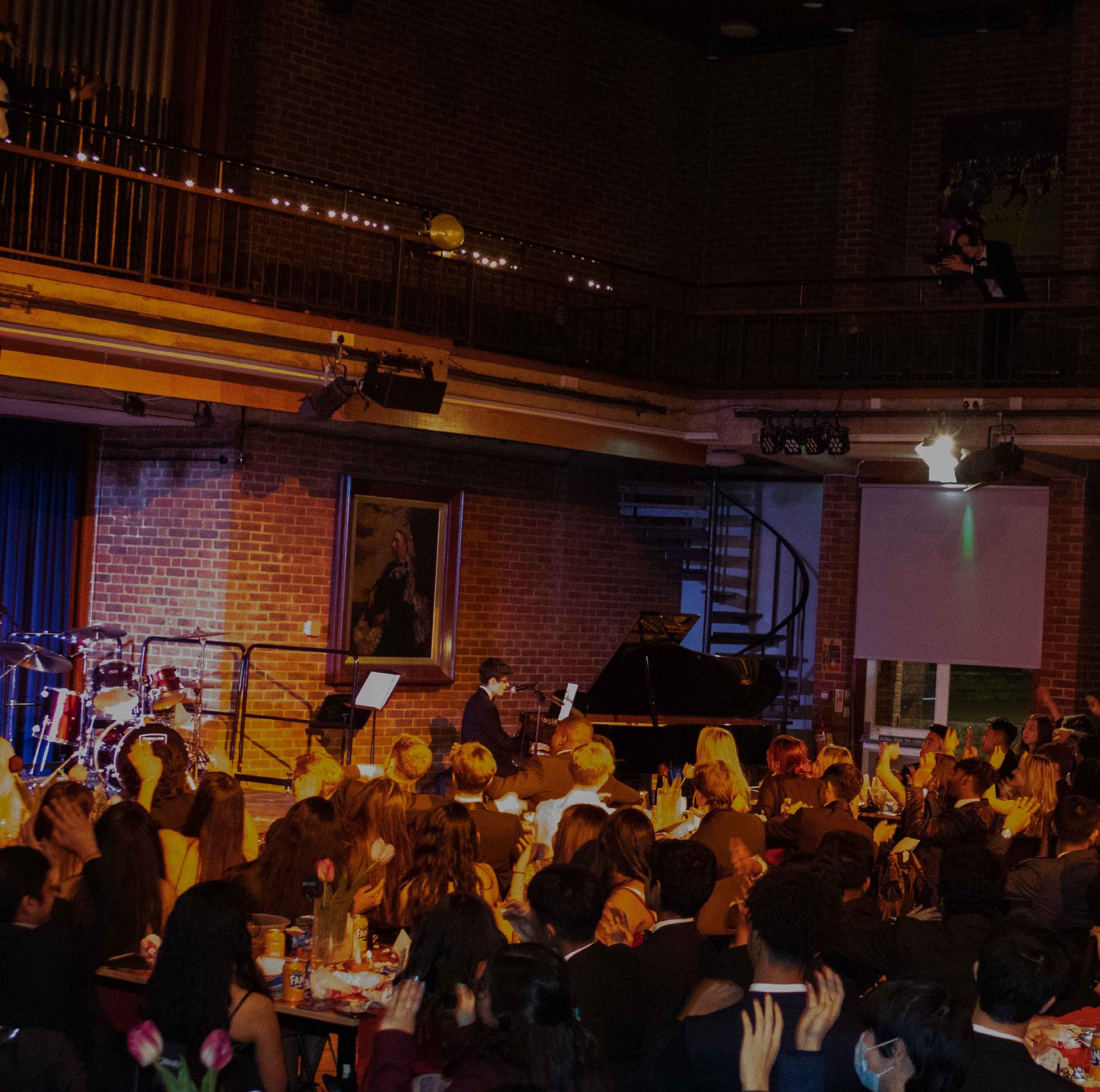
Asschool returned in September 2021, we all hoped for a more normal year after the impact of the pandemic. Fortunately, a form of normality resumed. Bubbles were no more and Sixth Form students were able to return to their normal spaces such as the Sixth Form Library, the Common Room and the Pavilion. Year 13 struggled to leave the PA Quad though, having been allocated the space when they were in Year 12. The only remnants of COVID were not being able to have whole school assemblies and the periodic testing that took place for half of the year. The students quickly adapted to the new situation and were soon making the most of the opportunities available to them.
At the start of the year, there was uncertainty around exams. Having been cancelled for the previous two years, it was unclear whether or not the 2022 exam series would take place. Braced for contingency measures, we learned probably a little bit later than we would have liked that the exams were going ahead as planned and so it was that all Sixth Form students sat AS and A Level exams. The resulting A level results were spectacular and every student in Year 13 should be proud of what they achieved.
Of course, Sixth Form life is about so much more than the academic. Highlights of the year include things like Cabaret and Festival, as well as the Year 13 leavers’ events. Cabaret returned unharmed from its absence the previous year and was a great success. The Senior Prefect Team were able to run a version of Festival (despite COVID cases being on the increase at the time) which raised money for two charities, Bromley Brighter Beginnings and the Royal Medical Benevolent Fund. Their creativity, efforts and determination in making Festival happen were a pleasure to see and they should be commended for their work in adding a little normality to the school year. We were also able to celebrate the end of Year 13’s time at the school. Students enjoyed breakfast together and then took part in some team activities on the field. We then had the customary assembly to mark the end of their time at St Olave’s. They were able to sing Jerusalem one last time…a fine send off for a remarkable group of young people. We were also able to have the Leavers’ Reception and the Leavers’ Ball. Students donned their finest outfits and celebrated the end of their exams and the end of their time at the school in style.
Another thing that returned to normal was Societies. The range available went from strength to strength, including Sixth Formers running Societies for the younger years.

These Societies give so many opportunities to the students and it is therefore so pleasing that they managed to return to the normal format of students from different year groups mixing with each other. Students gain leadership skills through running these societies and so many gain confidence in public speaking through the delivery of talks. The Societies also produce an amazing selection of journals each year, the quality of which is second to none. 2021/22 was no different, but instead of paper copies, all of the journals were electronic. When I go through UCAS applications and look at the students’ personal statements, I never fail to be amazed by the number who are involved and the complexity of the topics that they cover. A huge well done to all involved.
The prefect system also returned to normal with the end of bubbles in school. Academic, Form and Ambassador Prefects all took up their roles, alongside a weekly duty and did their utmost to bring back the advantages of the system. The Senior Prefect Team (Millie Hennessy, Steven Coker, Anupam Bandhi, Scarlett O’Keefe, Jahnavi Singh, Matthew Todorov, Rhea Rentala and Nikhil Doosa) were appointed following in person interviews and rose to the challenge of working in a new hybrid world. They became adept at making videos and holding webinars, and did their very best to lead the student body. Most importantly, they had opportunities to wear the purple robes, something which their predecessors had missed out on. Thank you for everything you did to help return to and improve on the school’s pre-pandemic state.
What must not be forgotten is that all of this extra activity goes on alongside the usual studies of the students. They devote so much time to their work but do not forget the importance of community and giving something back. This ability to manage workload with other commitments, which often includes volunteering and paid employment, is incredible and will hopefully help them as they go off into the next stages of their lives.
At the beginning of the academic year, I like to ask students to think ahead to where they want to be when they leave. When I asked Year 13 who left in June 2022, I do not think any of them realised what would lie ahead. I certainly did not. The world we live in has changed dramatically and so many have lost out on a great deal. Regardless, they approached their two years of Sixth Form with fantastic attitudes and will be all the more resilient as a result.
Writing this soon after the end of the academic year, it feels that the pandemic is being increasingly confined to the realms of history. It has instead been replaced with struggles of a different kind. The troubles in Ukraine, the increasing financial crisis and three Prime Ministers in a year all point to a world in turmoil. I wish our students success and happiness as they venture out into the world and hope they hold fond memories of their time in the Sixth Form at St Olave’s.
Matthew Birtchnell Director of Sixth FormAround 750 prospective students and their parents attended the Sixth Form Open Evening for external applicants. Thank you to all the Sixth Form student volunteers who engaged our visitors with charm and courtesy, sharing information with them and helping them to find their way around the site. I received many positive comments about the quality of the talks taking place in departments, with parents expressing their wish to return to school to begin studying once again. Thank you to all staff who supported this successful event as well as the PA for providing invaluable refreshments.
Around 70 Year 13 students took part in Interview Preparation Day. For the second year, the event was held online in order to reflect the fact that many universities are continuing to interview students remotely. The morning started with a group session that was used to discuss some important points surrounding interview technique and we also considered some of the myths surrounding university interviews. Students then had an individual 30-minute interview and feedback in their subject. As always, we are extremely grateful to the staff, parents and Old Olavian volunteers who conducted interviews and would like to thank them for their time. Students found the interviews incredibly useful as it gives them a chance to consider their chosen subject from a different angle, but the experience also gives them confidence for the real interviews. The feedback received from interviewers was extremely positive, reflecting the calibre of students we have in the Sixth Form at St. Olave’s.
We hosted our annual Festival in aid of charitable causes and this year students decided to raise money to support Bromley Brighter Beginnings and The Royal Medical Benevolent Fund. The event was full of entertainment, enjoyment and, of course, teachers participating in popular game shows. Overall, along with Cabaret, we raised £7352.98 - a fantastic achievement! Individual
form groups all ran stalls including ‘A Cricket Bowl Out’, ‘Christmas Selfie Booth’ and ‘Christmas Fete’; congratulations to 12Q for raising an impressive £291.
This year’s Academic Journal was edited by Year 13 students, Millie Hennessy, Rhea Rentala and Matthew Todorov. The foreword to the journal states: ‘450 years have passed since St. Olave’s was given the Royal Charter and, in that time, we have seen masses of change and progress of not only the school, but the world. This issue of the Academic Journal not only celebrates the talented students that fill our classrooms, but reflects upon the past, present and future of our society as a whole. With articles spanning from scientific discoveries to questioning the society we live in, the journal provides a broad range of writing, showing off the curiosity and creativity of St. Olaves students. For 450 years, the school has encouraged young people to never stop questioning the world around them, and this passion for learning is made clear through the articles throughout this journal.’ A big thank you to everybody who wrote articles for this year’s journal.
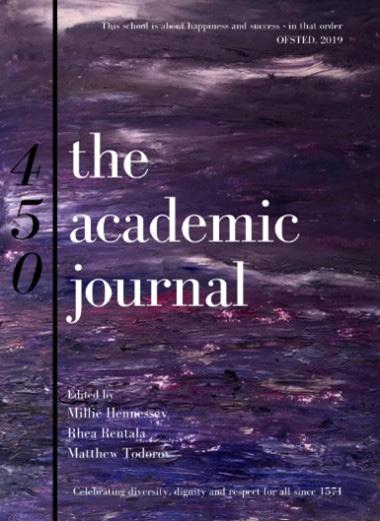
Congratulations to the Year 13 students who successfully completed Edexcel’s Extended Project 2022 - the A Level standard standalone qualification designed to extend and develop students’ abilities beyond the A level syllabus. Our students showed great scholastic aptitude in facing the 7,000 word Projects. In keeping with their Year 13 leadership responsibilities, external examinations and university interviews the students have independently completed Edexcel’s rigorous Projects designed to increase higher order thinking skills; resourcing knowledge; absorbing new concepts; exploring critical evaluations and testing reflective thinking. Peers and Staff enjoyed attending the presentations where students illustrated their arguments on Regenerative Medicine (Elodie Gorter); Social Media Platforms (Serena Onamade);
Particle Physics (Lara Tatli); UK Defence Systems (Harshvardhan Patel); Vehicular Automation (Chima Ndukwu and Pradhay Amamath); Green Engineering (Yash Karlekar) and Modern Monetary Theory (Tanay Saksena and Aditya Verma) - to name just a few. These exemplary Olavian students impressed with their superb performance – not only for themselves but as guiding lights for the younger members of the school showing the way to what is possible and achievable.
The evening was filled with phenomenal performances, food and magnificent cultural attire. Performances
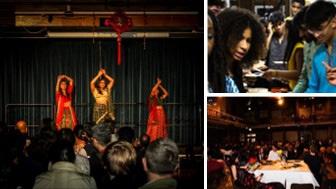
Both year groups also explored the Unifrog platform, the key tool through which we track each pupil’s workrelated learning and which offers a wealth of guidance and information on choosing the right courses and the right careers. If you have not yet seen this platform in action and are interested in discussing career options with your child, it is a good starting point for those conversations
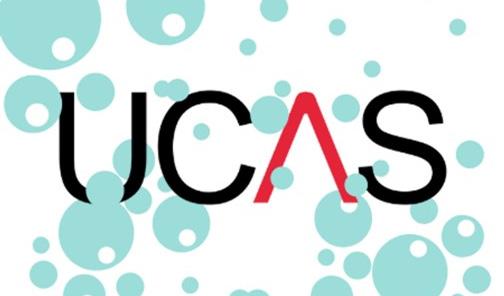
ranged from traditional dances and music to more modern rap and a thoughtful cultural speech delivered by one of our younger students. It was fantastic to see such a range of beautiful traditional clothing as well. The night raised in the region of £2500 all for Fareshare UK. A massive thank you to the Cultural Evening Committee for putting together such an amazing event despite the numerous restrictions across the last year
Year 7 had their inaugural Careers Day – the first major part of a programme of support which will run throughout their time at school. During the course of a busy day they had a general introduction to the world of work, covering why it was important to choose the right job, what sorts of considerations should inform their choices regarding school/university subjects and future careers, and how the school would support them in their aspirations. We also had two guest speakers presenting to the year group: Istiyak Chowdhury, via the Careers and Enterprise Council, presented on Careers within the NHS and, depending on which form pupils were in, they either learned about careers within the Civil Service, or establishing a start-up. These latter two sessions were both delivered by recent Old Olavians. We hope it made Year 7 think about the bigger picture as relates to their lives within and beyond school, and are hugely grateful to Katherine Taylor and Salman Hussain for giving up their time to return to the school and share their experience and expertise. Year 9 explored attitudes to stereotyping in the workplace, and how such stereotyping can be combatted.
We held our annual Higher Education evening during which students heard from the University of Birmingham on matters such as student finance, choosing courses and how to prepare for university life. School Captain, Steven Coker, also presented on personal statements and super-curricular activities. Mr Birtchnell concluded with a talk on how the UCAS application process works. This was followed by the Oxbridge Evening where we were joined by three academics from Cambridge and Oxford who shared their insights into the application process for these universities, as well as providing detailed information on admissions assessments and interviews.
It was a great pleasure to welcome the Mayor of the London Borough of Bromley, Councillor Mellor, to St. Olave’s to meet our School Captains, Rohan and Rohini, and have a tour of the school. The Mayor is coming to the end of his year in office this week so we thank him for his visit after also joining us at Commemoration.

Thank you to the staff, and particularly Year 8 students, Tharmesh Premkumar and Gabriel Doyle, for putting together and sharing resources for Diversity Week. This included updating display boards, selling rainbow ribbons, creating posters and quizzes, and organising a Diversity Society meeting. A whole school assembly highlighted the importance of celebrating differences, and it was a great pleasure to raise the Pride flag with students and staff. All donations from the sale of the rainbow ribbons will go to ‘The Proud Trust’, with students having raised over £30.



St Olave’s students used the power of words and animation to send a message of hope for a future where all are equal, irrespective of gender. Year 12 students Esther O’Neill and Guneeka Chitkara’s beautiful poem ‘All We Ask for Is Change’ was brought to life by the artistic hand of Sriram Senthil (Year 8), to show how young women and men can work together to create a better future.
Year 11 student, Wafi Ali, produced a short poem in celebration of the day. Well done to our Year 13 student and Senior Prefect Team, Jahnavi Singh, Scarlett O’Keefe, Milly Hennessy and Rhea Rentala, who led a brilliant assembly on this year’s theme: Break the Bias. The students spoke with eloquence, confidence, and conviction, and should be commended for all the hard work that went into putting the assembly together, it was inspiring to see.
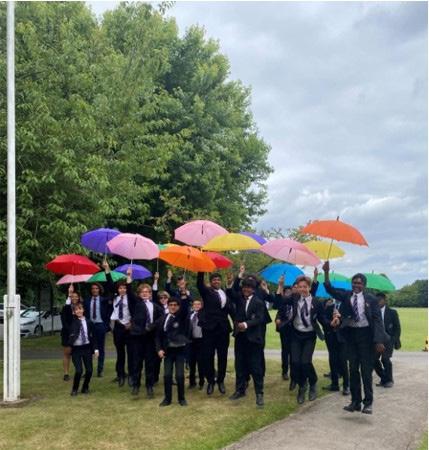
Also, nine of our Sixth Formers enjoyed a trip to the Courthouse Hotel, where World Vision offered a free screening of award-winning documentary ‘Girl Rising’. The film followed the story of nine inspirational young women across the globe as they strive beyond circumstance, demonstrating the strength of the human spirit and the power of education to change the world. It was a moving watch and a great opportunity to see the brilliant work being done by World Vision to tackle sexism and promote equality across the globe.
Congratulations to the School who overall won the Young Olavians Day competition on Saturday 2 September winning the football, netball, basketball and volleyball. The Young Olavians did manage to scrape a draw in the Fives match. Thank you to last year’s vice-captain, Nikhil Doosa, for co-ordinating the Young Olavian teams. The much-anticipated rugby match was postponed due to the hard pitches and will be played later this term.

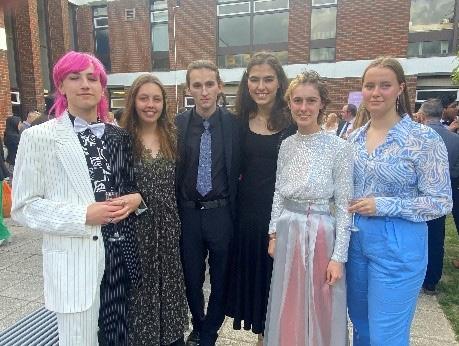
This event was a splendid ‘end-of-era’ occasion for parents and students to mix with staff in the relaxed environment of the Quad and to enjoy a glass of champagne before moving into The Great Hall for speeches from the Headteacher, the Director of Sixth Form and outgoing Captains of School, Steven Coker and Millie Hennessy. The Leavers’ Ball continued at Chelsfield Lake Golf Club with a band, a buffet and the mind-blowing tricks of the illusionist. It was a reflective evening for a fantastic year group who we hope will keep in close contact with the school for many years to come.
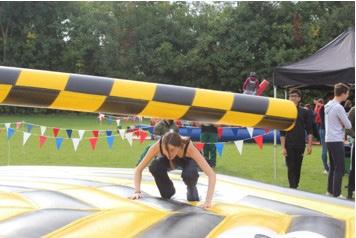
It was great to see the Year 12 bonding with their new forms and form tutors. Students took part in a series of problem-solving games which required them to use their team working skills to reach solutions efficiently and collaboratively. This included human table football, an inflatable assault course and racing inflatable horses. Students shared and built on each other’s ideas and began creating their form group ethos! The whole year group were involved in a range of games which required them at a couple of points to quite literally stretch themselves to the limit and jump over hurdles as they attempted to come out as winners.

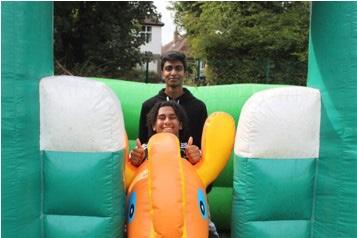

St. Olave’s has shaped me so much over the last six years and has been central in my development as a young person, far beyond simply the academic realm. I hope that, as School Captain, I can show my gratitude, and give back to this wonderful community of students, staff, parents, and Old Olavians. I would like to leave a legacy where St. Olave’s leads the way in Bromley’s educational community, with more outreach to nearby primary and secondary schools. As my A-Level options attest, I’m a bit of a magpie when it comes to learning: I find humanities every bit as fascinating as sciences, and am particularly attracted to topics sitting in the middle of this Venn diagram, like linguistics. I have absolutely loved being involved in the array of clubs and societies we have on offer, and am Vice-President of Politics & Philosophy Society, which has cemented my ambition to study PPE at university. As Co-President of Environmental Society I’ve already had the chance to work with teachers and pupils to improve our school’s ecological impact, something I hope we can develop further this year. Outside school, I play clarinet and organ, and also enjoy tutoring GCSE Maths and Science. During lockdown I started gardening and running for the first time, both of which I have found to be brilliant ways of looking after my mental wellbeing. I am incredibly proud, and just a little daunted, to have the enormous privilege of serving as Captain – I can still remember my admiration for Kosi, the School Captain when I was back in Year 7. I would love to inspire younger students as he inspired me, so please do say hello when you see me around school, and don’t be shy to get in touch on Teams!
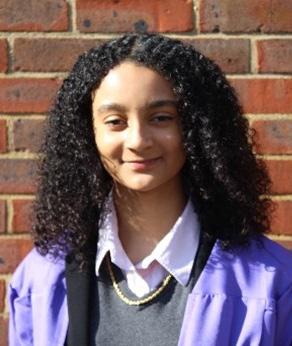
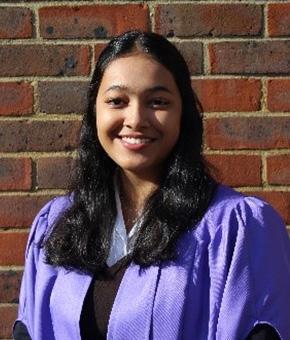
The decision to move to St. Olave’s was undoubtedly daunting but I found myself welcomed by a diverse, dignified, and spirited environment, which helped me settle in very quickly. The friendliness of our community and myriad of opportunities proffered enabled me to throw myself into Olavian life by taking on leadership roles, representing the school in sporting fixtures and attending a range of societies. Having now been selected as School Captain, I feel honoured
and privileged for the opportunity to help the Olavian community prosper and thrive in all areas of school life: academically, morally, and physically. I particularly enjoy helping people through being a blood donor, St John Ambulance Cadet, and volunteering weekly at our local Princess Royal University Hospital. This has allowed me to give back to the community, something which I aspire to do throughout my career, exemplified by my decision to study Medicine at University. In addition to academics, I am keen on sport and fitness, which I believe is requisite for both physical and mental wellbeing. I represent St. Olave’s by playing in the Netball team and have recently been awarded Managers’ Player for 2021-2022. I also revel in the performing arts, having been dancing for over 15 years, with my most memorable performance being at Disneyland Paris for their 25th anniversary. During my tenure I hope to be a positive role model and augment relationships between students, teachers, parents and Old Olavians. I would also like to further raise the profile of the school to the wider community as an excellent educational institution where all students are nurtured and encouraged to achieve their full potential. I am incredibly excited to work alongside the keen and motivated members of the Senior Prefect Team to foster the warm, respectful, and united environment that first welcomed me back in September. I am eager to connect with all students throughout the school, so please feel free to approach me for a conversation, say ‘Hi’ in the corridor or message me on Teams!
What I have found particularly enriching about my experience at St. Olave’s are the opportunities available. Not only the opportunity to receive a world-class education from engaging teachers but the opportunity to have your voice listened to, no matter how small the suggestion, question or issue is. As a representative for my year group in school council meetings and as Chair of the Sixth Form Association, I always strive to advocate for my peers and their ideas. Having been given the opportunity to represent the school as Vice-Captain, I will ensure that students’ confidence to voice their ideas is further developed and that they are readily implemented. As Head of Charity and Events, one way I aim to do this is by encouraging students’ input when organising events, to make them as fulfilling and enjoyable as possible. As a peer wellbeing mentor and having been on the Cabaret Committee, I recognise how important events
are in contributing to the social and academic balance at St. Olave’s. Therefore, in the aftermath of pandemic restrictions, I intend to resume and amplify many of the much-anticipated annual festivities. Alongside being passionate about representing the needs of those in the school community, I value the needs of the marginalised in wider society, which I strive to support in my role by enhancing the school’s charity involvement throughout the year. I attribute my desire to study law or politics at university to this passion for improving society and am the co-founder and co-president of the Main School Law Society. As a member of my local youth council, I have experience with organising projects to benefit the community and will assuredly utilise the skills I have gained from this in my role. In my free time, I also thoroughly enjoy reading, writing poetry, listening to music, playing the piano and taking part in the meetings of an online philosophy discussion group. To conclude, I urge students reading this to reach out to any member of the Senior Prefect Team if you have any queries or suggestions, or voice them to your form representative so that they can be communicated. Our priority is to represent you.
Alhough I only joined St. Olave’s in the September of 2021, I have found the kind, supportive atmosphere to be very easy to integrate into. I am already committed to the school and all its endeavours, having helped out at testing days, open evenings and leading my form’s contribution to Festival (where we raised over £420). I am excited to continue to contribute towards school life in my elevated role. In particular, I am looking forward to the outreach role I have been allocated. During my term as Vice-Captain of school, I will dedicate my time towards inspiring young minds through visits to primary schools. I strongly believe that an establishment such as this closer resembles a family than a school. Some Old Olavians –an integral part of our family – may feel left out of the loop on how the school has progressed over the years. For this reason, I plan to reach out and reconnect with them. Regarding academic interests, I am passionate about Mechatronic Engineering and would like to study engineering at Cambridge University. I am currently in the process of designing and building a bespoke electric guitar using the grant I received from my Arkwright Engineering Scholarship. Please feel free to ask me about it if you don’t mind having a long, rambling conversation! Outside of the classroom, I enjoy playing tennis, rugby, biking and cooking. I’m also - as you perhaps guessed – a keen guitar player. I play in a band and have previously


played my solo acoustic set in restaurants. I look forward to seeing you all around school and would be happy to help anyone out, be it regarding schoolwork, mental health, or anything in between. Feel free to contact me via email or Teams.
St. Olave’s has provided me with a nurturing community in which I am able to excel both in and beyond the classroom. It allows students to pursue passions in the arts, academics, physical activities and many more interests, forming well-rounded young people who go on to thrive after their time at St. Olave’s is over. As a Corporal in the army cadet force, I believe I have learnt the importance of teamwork and leadership in the times where it matters most. I have always admired my seniors and strived to adopt their leadership qualities. Now, to represent the school as part of the Senior Prefect Team is a great honour, in which I hope to demonstrate these attributes. Giving back to the community has always been an ardent pursuit of mine, hence me electing to volunteer at the Princess Royal University Hospital, where I have learnt vital communication skills that will help me to contribute to the school’s community spirit. Volunteering has fuelled my aspiration to study Medicine at University. Outside of Academics I am passionate about Netball, playing both in and outside of school and have had the honour of coaching younger teams. Playing in competitive leagues since I was little has taught me first-hand the importance of comradery in sports, and how to unite a community. I hope to carry this into my role to make the Olavian culture even stronger. I hope to impact years to come and help further develop the school’s multitude of clubs and societies, making them hubs for further learning and a microcosm of the greater school community including all year groups. Simply, I aim to be recognised as a friendly face round school and I hope to never be a stranger.
Having progressed through St. Olave’s from Year 7, I feel I have grown as an individual in all aspects of life, not just academically. I have always looked up to the Senior Prefect Team as role models in the school. However, over the past few years, it
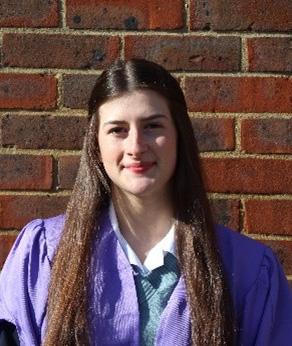
has been difficult to resonate with the Senior Prefects due to the circumstances of our world recently. As part of the new Senior Prefect Team, I hope to rebuild this sense of community within the school in order to promote the diverse society that makes up our school. As Head of House Captains, I hope to succeed in this by creating friendly competition between Houses and furthering the sense of House pride across all different kinds of extracurricular interests from sports to academic competitions. I myself have always looked to the enjoyment of competition to further myself. Being part of the 1st XV rugby team, and an avid player outside of school, I know that feeling of competing is exciting, no matter the outcome and I want everyone to experience this spirit within their own interests. Working with the Academic Prefects will be exciting in developing the enjoyment of learning in the classroom and beyond the classroom. St. Olave’s is an environment that thrives on excellence in all areas, and I aspire to leave this as a place which all students can look forward to coming to. Alongside the Senior Prefect Team, I hope we can bring new ideas into the school which will help to include all individuals in this community. So, please do feel free to talk to me in school or message me on teams with any ideas you have for new interhouse competitions or any ways you want to improve the school community!
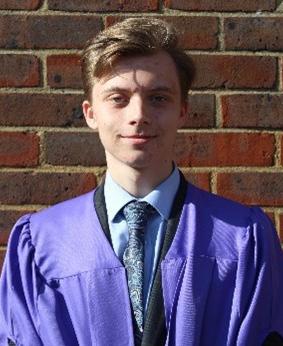
Having now spent nearly six years at St. Olave’s, I am honoured and grateful to be in a position to give back to the school and community, which has helped me to develop and grow and reach where I am today. While the last couple of years have thrown a myriad of unexpected challenges our way, I am relieved to be taking on this role in an environment where I know that I will be able to contribute most fully to current and future students at St. Olave’s. In particular, in my role as Head of Form and Ambassador Prefects, I hope to be able to make as meaningful an impact as I recall the weekly Monday sessions with Form Prefects had on me: all the way from helping me to settle in at the beginning of Year 7 to being the calming voice everyone needs during GCSEs at the end of Year 11. Previously having represented the school in tennis and now in my roles as President of Law Society and Co-President of Environmental Society, I am aware of the endless opportunities St. Olave’s has to offer outside the classroom as well as within it, and during the next 12 months, I look forward to working with staff and students to develop these areas for all. As the year progresses, I hope that I will succeed in becoming a recognisable face around the school that you
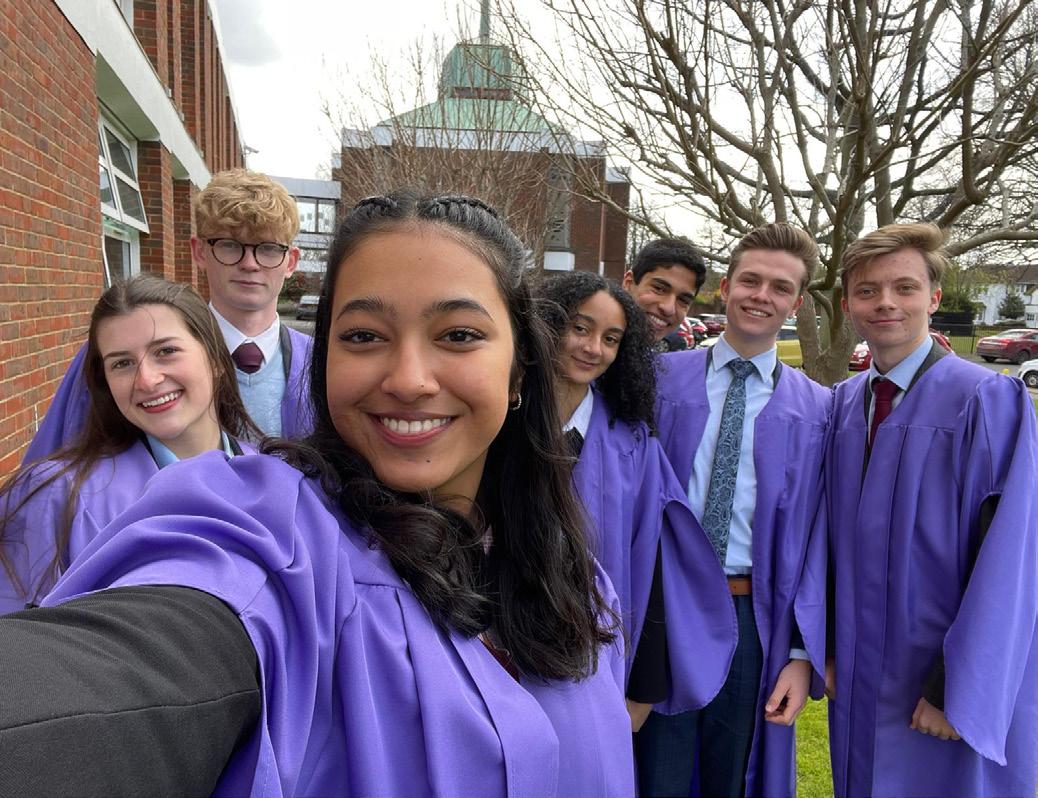
always come
It was a pleasure to attend the Senior Prefect Team training with Mr Birtchnell at St Benedict’s Centre in West Malling. We believe it is essential for this key group to have the time and space to explore their vision and how they want to implement this over the next twelve months. The team looked at different leadership styles, what makes a great leader and what activities need to take place to achieve their vision. The day finished with them presenting their vision, which looked at ‘creating a more inclusive and integrated school family, with an intertwined community of old and new students that stretches far beyond the gates of the school. Thank you to Mr Birtchnell for organising the day and to the students for engaging fully with the ideas they encountered.
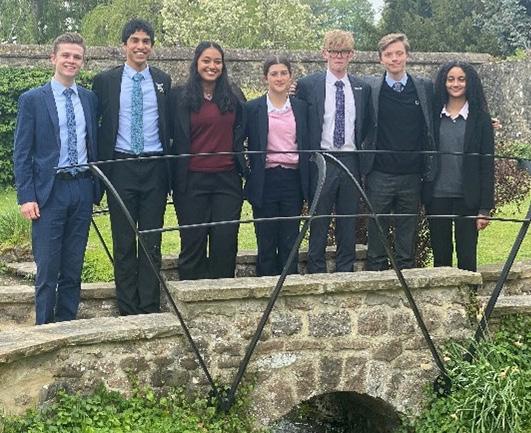

Adegunle, Farrah Gap Year
Adeniran, Adesimbo Imperial Medicine
Adesina, Justin Durham Law
Akdag, Irem University College London Medicine (6 years)
Akella, Krishna Bath Economics
Akpovwah, Isaiah Gap Year
Anatune, Chinonso Nottingham Philosophy
André, Nils Cambridge, Churchill Computer Science
Aruldoss, Gautam St George’s, University of London Medicine (MBBS)
Arya, Arjun Gap Year
Awodiya, Oluwatoni Reading Modern Languages and Int. Rels.
Awoyemi, Ayomiposi Nottingham Computer Science
Baffoe, Samuel Bath Economics
Balakrishnan, Vinujan London School of Economics Economics
Bandi, Anupam Swansea Medical Pharmacology
Belchamber, Harvey Bristol Physics
Bellerby, Peter York International Relations
Bello, Ebunoluwa Cambridge, Emmanuel History and Politics
Bhargava, Ishaan Imperial Aeronautical Engineering
Bhat, Saakshi Cambridge, Clare Engineering
Boopathy, Raveena University College London Medicine (6 years)
Boyapati, Rohan Imperial Medicine
Boyd, William Lancaster Economics
Brown, Anandi Central Saint Martins, UAL Art Foundation
Buchanan, Isobel Birmingham Biomedical Science
Burke, Derin Exeter Marketing and Management
Byrne, Daniel Warwick German and Economics
Chanda, Nandini Bath Computer Science
Chaudry, Hashim Gap Year
Chen, Holly London School of Economics Law (Bachelor of Laws)
Cheung, Hannah Cardiff University Law
Chidipothu, Nikhil Nottingham Economics
Chivukula, Sharath York Economics
Choudhary, Shrey Sheffield Medicine (Phase One)
Clark, Isaac Leeds Medicine
Coker, Steven Gap Year
Corlis, Simone Bath Accounting and Finance
Cross, Edward Durham Sport and Exercise Sciences
Dahir, Abdullahi Imperial Medicine
Dekany, Louis Cardiff University
Astrophysics
Delaney, Melissa Cambridge, St. Catharine’s English
Deshmukh, Aaditya Oxford, Christ Church Physics
Dixon, Jahcure Warwick Mathematics and Philosophy
Donald, Arran Cambridge, Trinity Hall Classics (4 years)
Donoghue, Scarlet Manchester
Dooraree, Shivam Gap Year
Cognitive Neuroscience and Psychology
Doosa, Nikhil University College London Medicine (6 years)
Doughty, Alexander Gap Year
Eduwa, Virginia Keele
Data Science with App. Bus. Info.
Elahi, Zaina Glasgow Economics (SocSci)
Eyal, Shahar Gap Year
Farombi, Emmanuel York Law
Farrell, George Manchester Mechanical Engineering
Fetahu, Fiona Oxford, St. Hugh’s Medicine
Fischer, Zachariah Warwick Politics
Gander, Laura Manchester Politics, Philosophy and Economics
Glen, Madeleine Leeds Civil and Environmental Engineering
Golla, Venkata Warwick Economics and Industrial Organisation
Goorvadoo, Kishan King's College London Physics and Philosophy
Gorkem, Selin Reading Pharmacology
Gorter, Elodie Cambridge, Lucy Cavendish Medicine
Guest, James Gap Year
Gupta, Amishi University College London Politics and International Relations
Haldia, Prajval London School of Economics Law (Bachelor of Laws)
Halton, Kathy Warwick Mathematics and Statistics
Harshakumar, Hardiv Imperial Computing (AI and Machine Learning)
Heard, Charlotte
Oxford, Wadham
Hendry, Nyobi Warwick
Hennessy, Millie Oxford, Worcester
Mathematics
Philosophy with Psychology
Philosophy, Politics and Economics
Hodgson, Martha York English
Holland, Alfie Cardiff University Politics
Huang, Ryan Queen Mary University of London
Hughes, Joel Bristol
Ibitoye, Aliyyah Brighton
Idogun, Josiah Warwick
Ilori, Cecilia Warwick
Iqbal, Ibrahim King’s College London
Ize-Iyamu, Andrew Gap Year
Jackson, Jemima Warwick
Mathematics with Management
Classical Studies
Pharmacy
Integrated Natural Sciences
Philosophy, Politics and Economics
General Engineering
Philosophy, Politics and Economics
Jeevanathan, Thilojan Gap Year
Jeyachandra, Ronald Gap Year
John, Carla Nottingham Music and Music Technology
Joshi, Sanchi St George’s, University of London Medicine (MBBS)
Joshua Yip, Abigail Sussex Arts and Humanities
Kajanthan, Vitheeshan King's College London Medicine
Karlekar, Yash Southampton Mechanical Engineering
Kaya, Elif Leeds Medicine
Keemer, Griffin London School of Economics International Relations
Kenny, Patrick Aberdeen Medicine
Khan, Zoe Royal Holloway, University of London Computer Science (AI)
Kibblewhite, Harry Nottingham Veterinary Medicine
Lai, Alexander King’s College London Medicine
Laryea, Damita Nottingham Finance, Accounting and Management
Lecybyl, Hieronim Oxford, Oriel Mathematics and Computer Science
Lee, Caleb Gap Year
Lee, Sophie Queen Mary University of London Medicine
Leung, Emily Manchester Architecture
Lopez, Vivian Imperial Computing (AI and Machine Learning)
Lu, Ye Imperial Chemistry
Luo, Leo Royal Holloway, University of London Theoretical Physics
Ly, Dominic Warwick Economics
Madhavan, Navaneeth Cambridge, Magdalene Computer Science
Magee-Brown, Thomas Manchester Politics and Modern History
Majumdar, Rupankar Loughborough Physics
Mangala Sachidananda, Thanmay King’s College London Medicine
Manickarajah, Adrian Oxford, Wadham Medicine
McCabe, Oliver Leeds Economics and History
Mehta, Daksh King's College London Medicine
Morgan, Matias Durham Geography
Muazu, Abdul-Rahman Nottingham Computer Science
Muazu, Ahmed-Rufai Bath Pharmacy
Muoneke, Jeremiah Cambridge, Clare Computer Science
Mwim, Chima Imperial Medicine
Mylroi, Aidan Warwick Mathematics and Philosophy
Narendra, Tanya St George’s, University of London Medicine (MBBS)
Nasseri, Behrad Keele Pharmacy
Ndukwu, Chima Warwick Engineering
Nealon, Conor Glasgow Common Law
Nettey, Crystal London School of Economics Philosophy, Logic and Sci. Meth.
Nguyen-Tuong, Victor University of British Columbia Commerce
Nicholls, Joshua Kent Law
Nortey, Charles Warwick Law
Odusola, Chloe King’s College London Medicine
Ofodile, Victor Gap Year
Okada, Sana Leeds
O'Keefe, Scarlet Gap Year
Gateway Year to Medicine
Okegbola, Abisola Birmingham Law
Oloyede, Oluwapelumi Gap Year
Olubuyide-Sivalingham, Zackhariah University College London
Omosule, Catherine Leeds
Onamade, Serena Warwick
Palmer, Tioluwanimi Nottingham
Pan, Jiang Yi Brunel University London
Pandey, Amartya Strathclyde
Parkin, Leo Nottingham
Chemical Engineering
Dental Surgery/Oral Science
Politics and International Studies
Industrial Economics
Psychology
Accounting and Finance
Natural Sciences
Parmar, Maya Nottingham Law
Patel, Harshvardhan City, University of London
Patricio, Maia Nottingham
Pattenden, Macey
Oxford, Worcester
Pearce, Kiran Warwick
Perry, James TU Delft
Pesenti, Maxime University College London
Peterson, Samuel Bristol
Plater, Nathan Nottingham
Data Analytics and Actuarial Science
Pharmacy (4 years)
Medicine
Mathematics and Physics
Aerospace Engineering
Mathematics and Physics
Civil Engineering
Mechanical Engineering
Poh, Francois Imperial Computing
Pratheepan, Sharina Queen Mary University of London
Quan, Aimee City, University of London
Rahman, Yacub Gap Year
Mathematics with Fin. and Acc.
Mathematics with Fin. and Ec.
Rai, Aakash Cambridge, Fitzwilliam Economics
Rangoolam, Rheeya Gap Year
Reddin, Amber Kent History
Rentala, Rhea Central Saint Martins, UAL Art Foundation
Rhally, Theodore Gap Year
Richardson, Ivan Queen Mary University of London
International Business
Rodrigues, Amelia Bath Physics
Rowe, William Oxford, Keble Chemistry
Rutter, Cameron Warwick
Physics with Astrophysics
Rydell, Eloise Oxford, Christ Church History
Saksena, Tanay London School of Economics
Samad, Tausif Gap Year
Mathematics and Economics
Sanjeevan, Aaron Imperial Medicine
Sanusi, Olasunkanmi Durham Economics and Politics
Saravanan, Kathir Southampton Mathematics with Statistics
Sathyanarayana Setty
Amarnath, Pradhay King’s College London Computer Science
Seelam, Viraj East Anglia Film and Television Production
Selvachandran, Varun City, University of London Accounting and Finance
Senthilkumar, Surya University College London Medicine (6 years)
Shanker, Anant Queen Mary University of London Economics
Sharma, Ritvick Bath Economics
Shrimpton, Frank Edinburgh Biological Sciences
Shubham, Shreyas Warwick Philosophy, Politics and Economics
Singh, Avaneesh Arvind Birmingham Medicine (5 years)
Singh, Jahnavi University College London Medicine (6 years)
Sinha, Arun Bristol Electrical and Electronic Engineering
Sivasritharan, Bharathsri Cambridge, Emmanuel Medicine
Sodunke, Grace Oxford, St. Hugh’s Mathematics and Computer Science
Soni, Siddharth Bath Economics
Stringfellow, Elise Oxford, St. Anne’s Classics and English
Sureshan, Luxan University College London Economics
Susilan, Abeshana Nottingham Law
Sutton, Jak Nottingham Architecture
Syed-Muhammad, Uzair Glasgow Aeronautical Engineering
Tatli, Lara Durham Physics
Taylor, Lily Manchester Medicine
Tekan, Ela Nottingham Physics
Thakar, Arjun Southampton Civil Engineering
Thampinathan, Sayeth Gap Year
Thanarajah, Thuvaarahan Imperial Medicine
Thatikonda, Shruti Cambridge, St. John’s Modern and Medieval Languages
Thayalan, Sarujan Imperial Medicine
Thayaparan, Kabisan Queen Mary University of London Materials Science and Engineering
Thukalil, Ryan Warwick Mathematics and Physics
Todorov, Matthew Universität St Gallen Economics
Tregear, Flora Oxford, Brasenose History
Tripathi, Neil University of New York Computer Science
Truong, Toan Imperial Mathematics and Computer Science
Upadhyay, Aarush Leicester Financial Economics and Banking
Usman, Naafay Southampton Medicine
Vadukul, Tejal Cambridge, St. Catharine’s Economics
Vatajelu, Alex Manchester Physics
Velikov, Velian Cambridge, Trinity Mathematics
Verma, Aditya Bath Economics
Verma, Shreyas Lancaster Economics and Finance
Vijayaakanthan, Bravin Leeds Computer Science
Vijendra, Ajan University College London Medicine (6 years)
Vinod, Vaibhav London School of Economics Economics
Waller, Owen Loughborough Computer Science
Welch, Zackary Warwick Mathematics
Welfare, Wren Heriot-Watt Psychology
Weston, Emily Exeter Flexible Combined Honours
Willcox, Elizabeth Exeter English
Wood, Roshan Cambridge, Lucy Cavendish Law
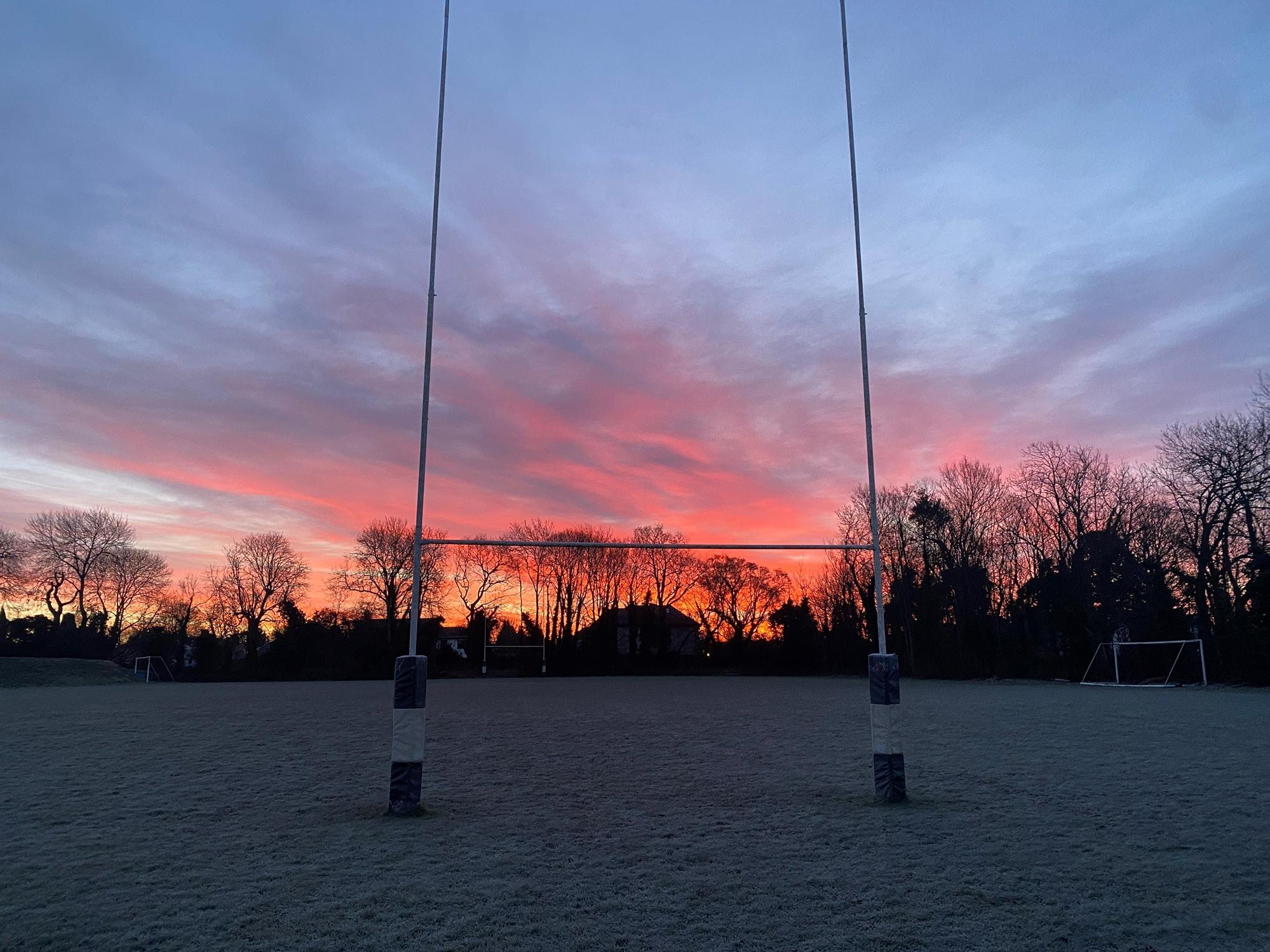
Woodley, Jedidiah Bristol Mathematics and Physics
Woodward, Luca Manchester Politics, Philosophy and Economics
Wu, Danis Imperial Medicine
Xiao, Yuran Warwick Economics
Xu, Muyu University College London Chemistry
Yang, Jungmin Leeds Medicine
Yeboah, Zachariah Birmingham AI and Computer Science
Yogakumar, Tharun Imperial Medicine
Yogendran, Kruthinan Warwick Psychology
Zaman, Sannah Cambridge, Homerton Chemical Engineering (via Nat. Sci.)
Zhang, Ruiqi Imperial Computing
Ziwa, Tyrone Gap Year
Zomah, Iman Brighton and Sussex Medical School Medicine
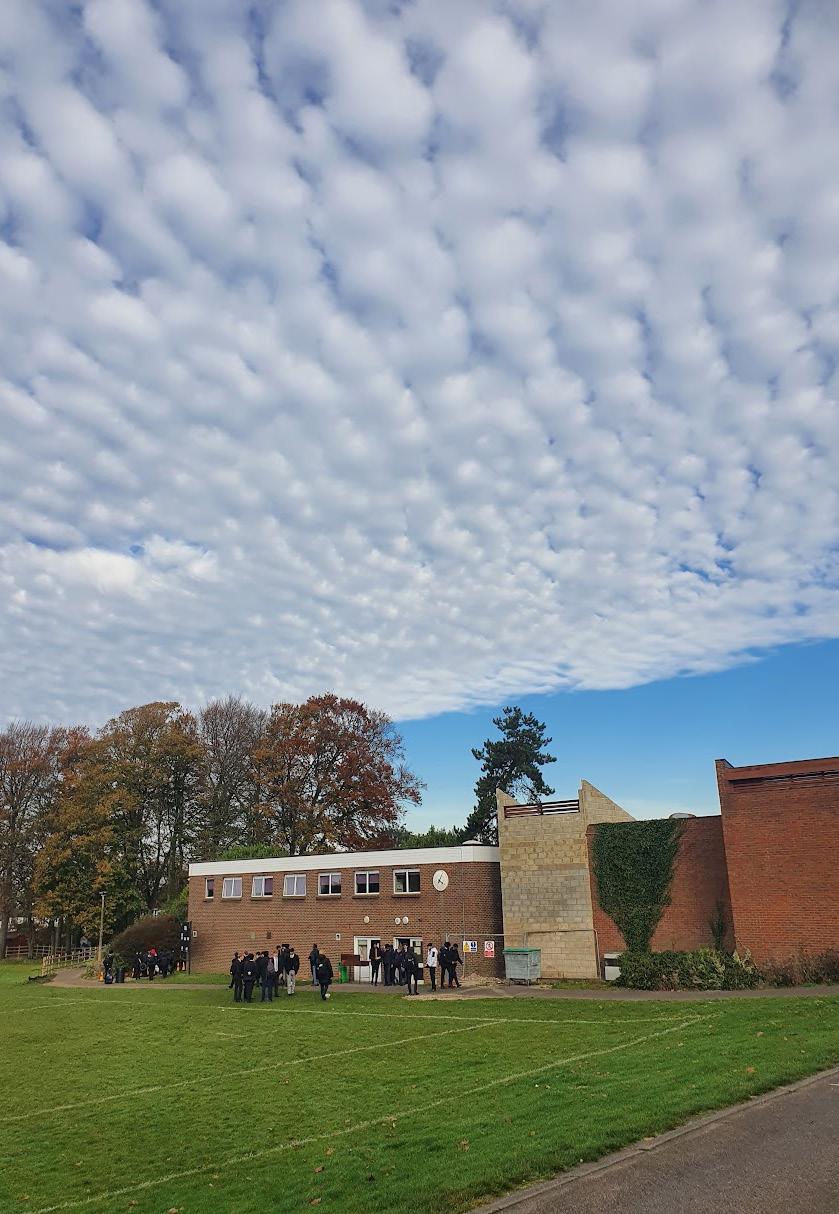

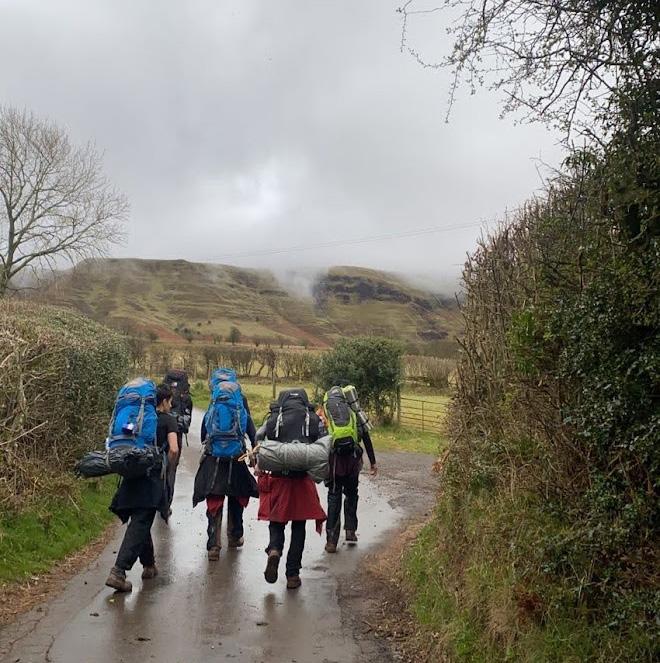
TheDuke of Edinburgh Award continues to be a huge draw for a large number of students in the school. The combination of learning a new skill, putting something back into the community and spending several days away form home, away from parents and under canvas with your friends has such an appeal. This year has been no exception with nearly 200 students again singing up for all levels of the Award.
The DofE season spreads across two school years, always starting in April with the Gold groups going out to the Black mountains for four days, followed by two Bronze combined expeditions. Bronze are out for three days and two nights with the first day and night training and the last two days and night being assessed. The award takes place locally with students finding the sheering distances with large packs testing, and then add the cooking, camp craft and being out in the elements for three days hard work. As the term comes to an end the Silver assessed teams go out for three days and two nights walking across several counties easily covering 60 kilometres plus and walking through as many forested areas as possible. The last hoorah for the summer term is the Gold assessed who go to Snowdonia and walk through the extensive Snowdonia mountain range, wild camping (camping in the mountains away from campsites) for the five days and four nights. After the summer holidays we quickly go into the last two DofE expeditions of the season with another Bronze combined expedition and then the Silver practice. The Silver practice has very much more of a training element to it with the students forced to deal with more complex navigation than the Bronze, and some very much more unpredictable weather that October can and does bring.
Over the last few years we have developed the modules on line for The Duke of Edinburgh’s Award giving the students more training they can easily access and the opportunity for them to develop their skill set further. We have added tests to them now and are in the process of including drop-in clinics for all to ask questions and gain further information that they can take forward with them. This is very much an ongoing development process where we ask for feedback to allow us, as a team, to enhance both learning and the sheer fun that the scheme can bring to all those who commit to it.
The Duke of Edinburgh’s Award at St. Olaves would not be possible. I would like to thank Mrs Attwood, Dr Carpenter, Mr Carroll, Ms Difford, Mr Jewson, Mrs Probodziak, Mr Whiteside and Mrs Wiltshire for their

help on the expeditions.
Paul Holland DofE Co-ordinatorThis year, due to the huge number of students signed up for the Bronze Award (in excess of 100), we developed a new expedition format, the Combined Expedition, which effectively merges the Bronze Practice and Assessed Expeditions into a three day/two-night challenge. The first cohort of Year 10 students met up at Sevenoaks. They hit the ground running by learning how to erect their tents, to use a Trangia safely to cook their dinner and then route planning as the sun set over Knole Park. The next morning, the students set off early and demonstrated their skills admirably with their successful navigation to East Hill. After making camp, each group’s knowledge was tested with a Q&A session on camp craft, first aid, navigation and rucksack packing. Day 3 started early as some groups were keen to set off quickly before the anticipated rain. Each group had a tracker enabling us to monitor their progress back to School. On arrival, groups had a final debrief whilst their tents dried out in the fading sunshine. Well done to Year 10 for being the guinea pigs for our new format. A huge thank you to all the staff – Mr Holland, Mrs Andrews, Mrs Attwood, Dr Carpenter, Mr Carroll, Miss Difford, Mr Jewson, Mrs Probodziak and Mr Thomas - who willingly gave up their free time over the weekend to make this expedition both successful and enjoyable.
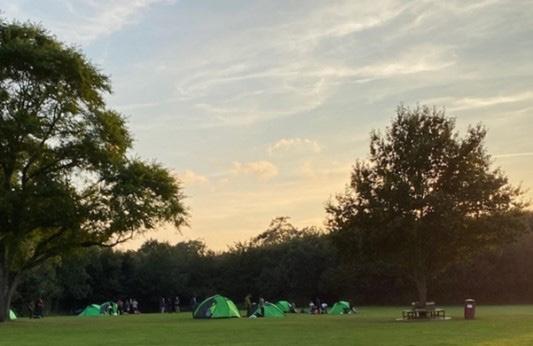
Easter always heralds the start of the new DofE season with the Gold DofE for Year 12. Student take-up for DofE has been high this year, perhaps due to the fact that so much was lost during the previous two years whilst living under the shadow of COVID-19. Seven teams comprising 42 students set off to Wales for their practice expedition in the Black Mountains, led by the experienced team at Wild Country Consultants. The weather at this time of year can be unpredictable with temperatures wavering between -1 to 10 degrees. The ever-present rainfall with occasional glimpses of sunshine, and gale force winds on the mountain tops for the final day’s walking made for challenging conditions.
Over the course of four days the students navigated, camped, cooked and carried all their equipment up and down a series of mountains, culminating with the summit of Sugar Loaf (680m) on their final day. On average, each team covered in excess of 20km each day, which is arduous in itself, but even more so when factoring in the terrain and weight of the backpack. The ethos of Gold DofE is very much about learning the skills of expeditions, working as a team and learning about yourself, and this was shown by our students throughout the expedition.
A big thank you to Dr Carpenter, Mr Carroll and Ms Difford who generously gave up their time during the Easter holidays to help make this expedition possible.

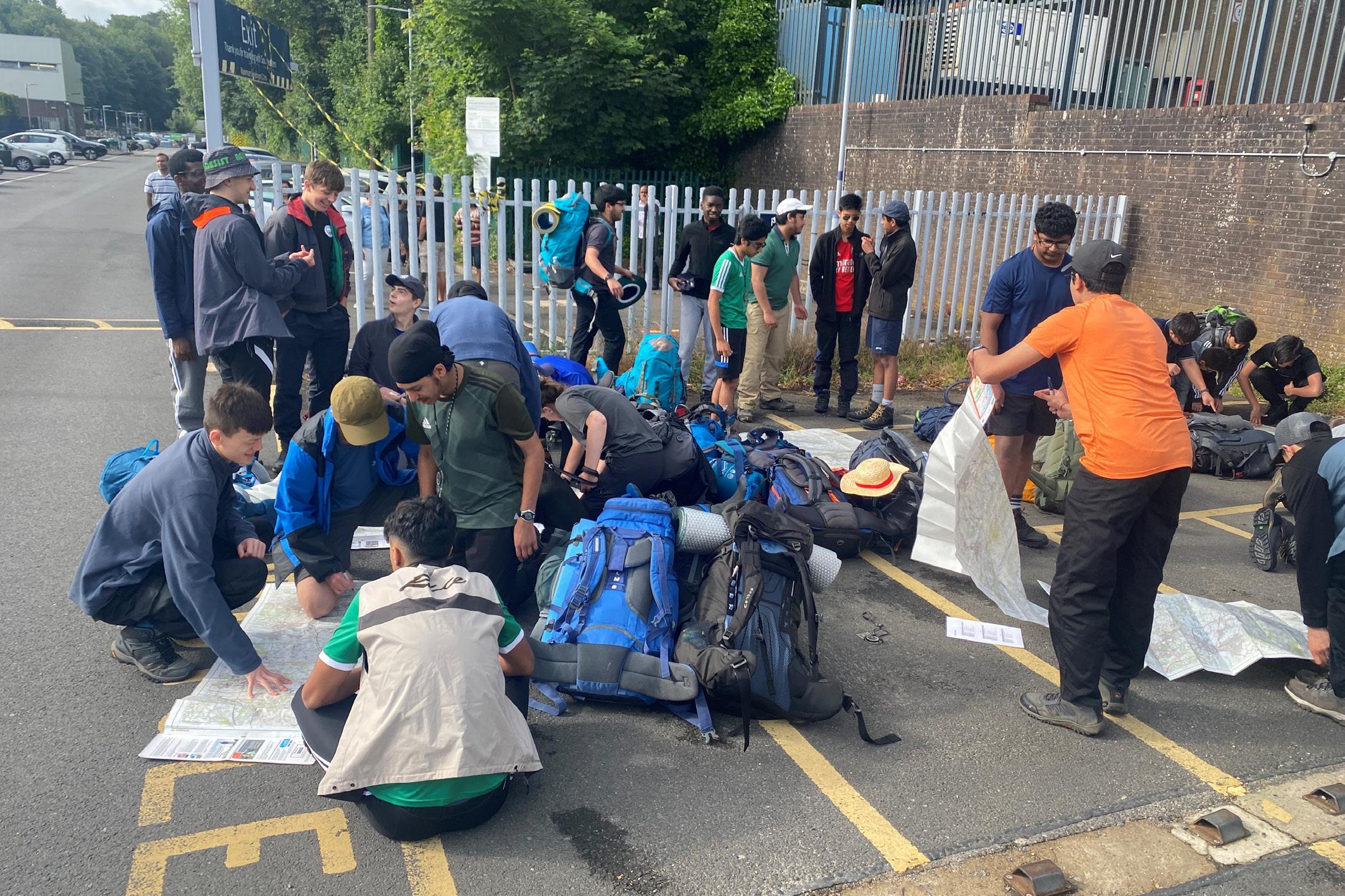



It was lovely to get back into the old routines and the hustle and bustle of normal school life here at St. Olave’s. We had huge numbers of students taking part in various UKMT competitions with some fantastic individual performances. Junior and Senior Mathematics Societies relaunched and were very well attended by students who had also craved normalcy and camaraderie.
This year, after a period on the waiting list, St. Olave’s gained a place in the Hans Woyda Mathematics tournament, involving 64 secondary schools from in and around London. The competition sees teams of four students (one from Years 7-9, one from Years 10-11, and one each from Year 12 and Year 13) competing to answer age-appropriate maths problems, working in pairs and as a group in some rounds. After a group stage, where our students beat three local schools, we progressed to the knockout rounds, where, one by one, our opponents fell. In a gripping final, held at City of London School, against St. Paul’s School resulted in victory for St. Olave’s in our debut year!

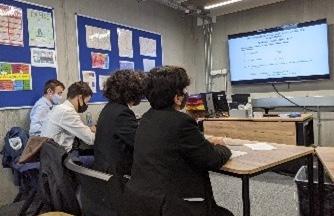
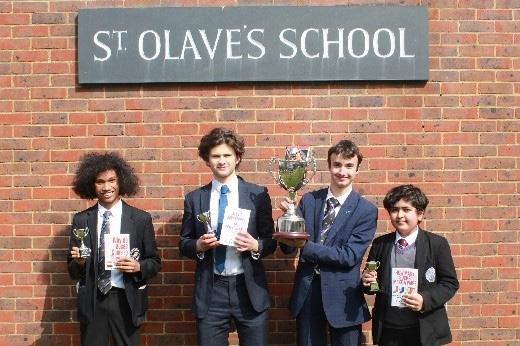
During Activity Week 1, we took Year 9 to Bletchley Park to learn about the important work done there and its legacy. Students were able to get up close and personal with an enigma machine, learning how messages were encrypted and decrypted and how the code was cracked. They were also able to visit the office of Alan Turing.
Our students in Year 11 and Year 13 sat their public examinations in the summer term. Both groups of students performed fantastically well, with many students in Year 13 heading to university to study mathematics or highly mathematical degree courses. We were particularly proud of their achievements following two heavily disrupted academic years.
At the end of the year, we said farewell to Mr Bassett and Mr Masters. I would like to take this opportunity to thank both for their contributions during their time at St. Olave’s and to wish them well in their retirements.
Meera Lawrence Head of MathematicsThis was the first year St. Olave’s Grammar School had entered the Hans Woyda Competition and after a long group stage, we qualified first to proceed into the Cup competition. This led to victories against St Paul’s Girls School, KCS Wimbledon and Hampton School. In the final we competed against previous winners, St Paul’s School. After a neck-and-neck mathematical battle, we became champions in our first ever appearance after team captain Velian Velikov took the score from 45-46 to St. Paul’s to 47-46 in the very last question. Congratulations to Velian, Eduardo, Ben and Shaurya. Thank you to Ms Lawrence who, with her strong enthusiasm and help, made this historic victory possible.
Computer Science students completed the UK Bebras Computational Thinking Challenge organised by the University of Oxford’s Department of Computer Science, and Hertford College. We achieved in total 137 Distinctions and 139 Merits resulting in another year of outstanding results. Congratulations to all students

who have participated and special congratulations to Hieronim Lecybyl, Sam Campbell, Aaron Liang, Lucas Pilu, Alexei Kubzin, Lewis Peatie and Douglas Burbidge on receiving the best results in school for their age group.
Year 13 student, Hardiv Harshakumar, completed two courses from the Harvard Summer School on Cyber Security. He also completed an EDT Experience which gives an insight into university and attended the Harvard Science Research Conference.
All of Year 11, all Year 12 mathematicians, around 30 Year 13 students and three Year 9 students took part in this annual competition aimed at Year 12 and 13. Congratulations to all students who took part. This year’s results are phenomenal. From 356 entries, students were awarded 65 Gold, 114 Silver and 152 Bronze certificates, with an incredible nine students qualifying for the British Mathematical Olympiad, placing them in the top 1000 (approx) of all entries, including Ben Joshua Yip (Year 11) and Shaurya Mehta (Year 11). Velian Velikov gained the maximum score of 125, with Kathir Saravanan and Hieronym Lecybyl both following close behind with 120. Additionally, 56 students qualified for the Senior Kangaroo (top 5000 approx), including both remaining Year 9 students: Shrish Deveramani and Veerarjun Jassal.


Congratulations to the students who qualified for the Junior Maths Olympiad following their excellent performance in the Junior Maths Challenge. Out of 150,000 students who sat the Challenge, they are among the top 1,200 who scored high enough to be selected for this prestigious follow-on round.
In addition, 56 Year 7 and 62 Year 8 students were invited to take part in the Junior Maths Kangaroo follow-on round. They were placed in the top 10,000 entries. Well done to all who took part.
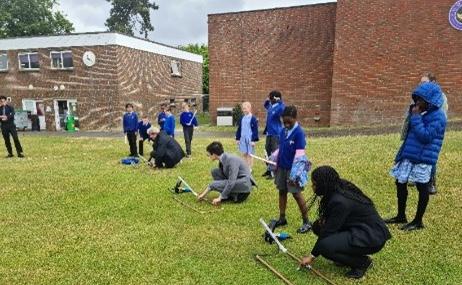
We welcomed 60 Year 5 pupils for our Science and Maths Outreach Day. The primary school students took part in a range of activities including launching rockets, investigating a dastardly crime using chromatography and working together to solve mathematical problems. All the students visiting were highly motivated and enjoyed getting out of the classroom and seeing a secondary school. A huge thank you to Mr Savage and Ms Bishop as well as all the Year 12 students who gave up their free time to help and run various activities.
President Velian Velikov, Vice Presidents NandiniChanda and Zackary Welch and enthusiastic mathematicians gather once a week to share and discuss interesting areas of mathematics, whether it be recreational, cultural, or just outside the school syllabus.
Old Olavian Zarya talked to our students about her university experience and introduced them to functional programming in Haskell. Students from all year groups enjoyed learning about concepts such as pattern matching from her live demonstrations to talk to our students. Zarya is in her second year studying Computer Science and Mathematics at Imperial College London.
Well done to the Computer Science Society and to Chief Editor, Hardiv Harshakumar, for producing the third journal of ‘hypertext’. Issue 3 contains 13 articles
on topics such as ‘AI Creativity’ and ‘Enhancing Musical Experiences with Technology’.
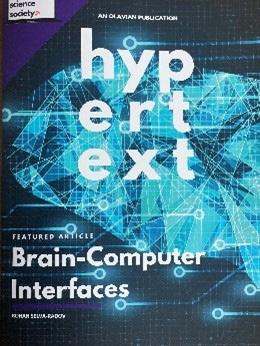
characters who worked there. Students had an opportunity to explore the site, including Hut 8, the former workplace of Alan Turing. They also spent time learning about cyphers, encryption and decryption, including a chance to have a go at decrypting an intercepted message from the enemy. Thank you to the staff who organised the trip and accompanied the students.
The Computer Science Department launched their first STOGs Inter-school Coding Competition for local secondary schools. This was a new initiative for KS4 students, to which teams from other schools were invited to attend. The coding competition was fully designed in house with the help of our amazing Year 13 Computing Prefects, Pradhay Amarnath, Nandini Chanda and Saakshi Bhat.
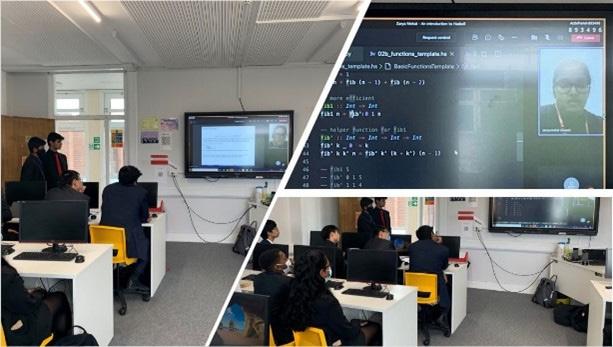
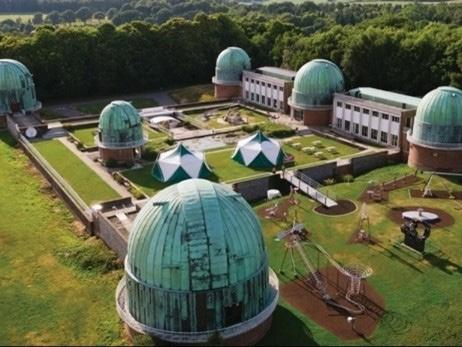
Congratulations to Year 13 student, Nils André, on receiving the Elite National Finalist Award in the Oxford University Computing Challenge. He falls amongst the top 20 Computer Science students nationally.
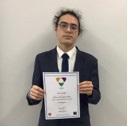
Key Stage 5 Computer Science students visited the Emmanuel Centre in Westminster. In five lively sessions experts from academia and industry explored relevant topics that complement the computing curriculum. The speakers took our students to the cutting edge of Computer Science, by looking at state-of-the art machine learning algorithms, animations and films, computational models in cancer treatment and the influence of robot traders on the financial markets. It was a wonderful opportunity for our students to see how the future is revolutionised by the advancement in Computer Science and Technology.
Year 9 visited Bletchley Park, the home of modern Computer Science. They were taken on a guided tour, learning a little of the human history of the site and the
In recent years, the usage of blockchain technology and cryptocurrencies has become more and more prevalent. The nature of transactions and money itself is changing rapidly. However, there are many misconceptions amongst the public regarding what this technology is and why it is so important. To address this, over the past academic year, there have been a multitude of talks at Blockchain and Cryptocurrency Society, with Presidents Navaneeth Madhavan and Rupankar Majumdar discussed the underpinnings of how cryptocurrencies operate and the economics behind them. Students go along to the Society to learn how to separate Bitcoins from Blockchains and really understand what this new, disruptive technology is all about.

Congratulations to Year 11 student, Aaravamudhan on his success in a number of chess tournaments. Aaravamudhan won the 2021 UK Chess Challenge U18 Terafinal, held at Blenheim Palace, which was one of the strongest junior chess tournaments of 2021. He clinched this title by winning the last round despite his opponent being ahead in a must-win match. He also finished 5th in the European Open U16 hybrid chess tournament, just a half point behind the winner and ahead of many other titled players. The tournament was held online, and it was another strong event with 64 top players from many European countries.
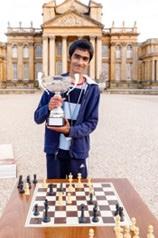
Congratualtions to all six members of our Chess Team who competed in the English School’s Chess Competition in Stratford-upon-Avon. They all did amazingly well and overall were placed 5th out of 19 schools.
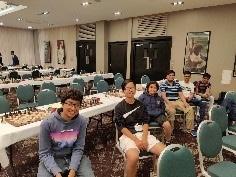

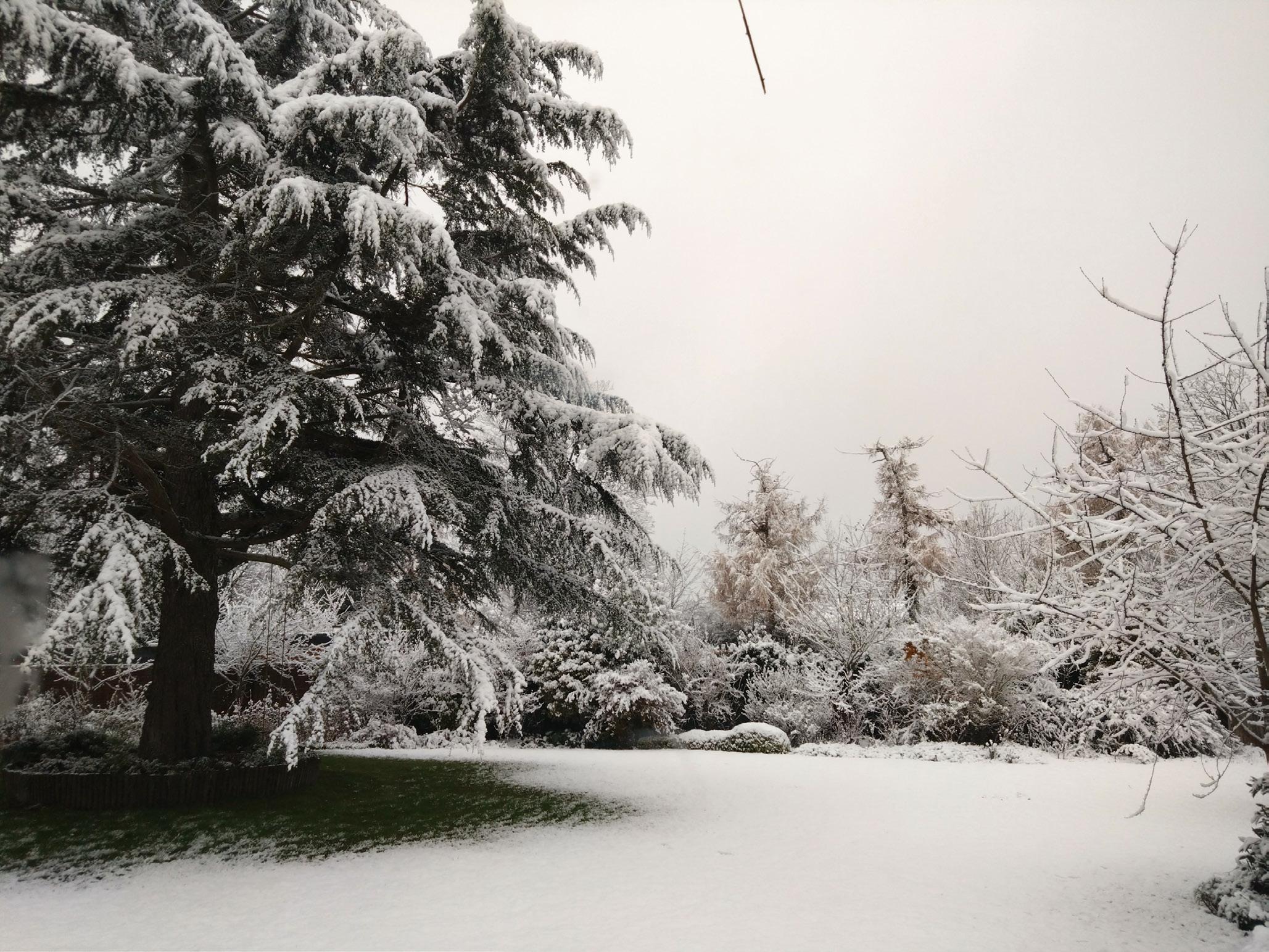

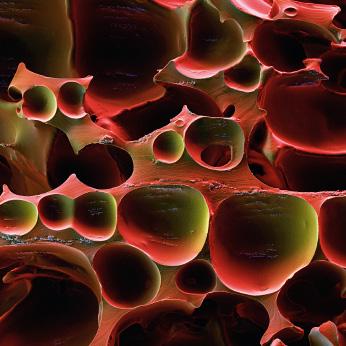
InScience we would like to see ourselves as a true learning community and we all strive to communicate this love of learning to our students. We actively promote opportunities for out of school learning and make a point of mentioning interesting developments and new ideas to students. 2021-22 was another interesting and challenging year for the Science Faculty, and once again our students rose to all the challenges thrown at them throughout the year.
It was fantastic to be able to have all year groups back in the Science laboratories, enjoying the type of practical work that they had missed so much during the COVID bubble times.
The public examination results achieved by Years 11 and 13 were outstanding, a real credit to students sitting their first public examinations. Wonderful results all round. Congratulations to all our students on those outstanding achievements. We are very fortunate to be able to teach such a motivated and inquisitive cohort of students. We look forward to welcoming our new Sixth Form students and wish all those students embarking on University courses or careers all the best for the future.
Students also excelled in National Competitions and Olympiads, proving themselves capable of competing with the rest of the country. I am amazed that so many of our students actually volunteer to sit such rigorous tests of their scientific knowledge, resilience and ability to adapt their understanding to complex situations. Their motivation and desire to overcome ridiculously difficult problems is inspirational. Some of these actually took place during lockdown, proving the resilience and dedication of our students.
However, academic success is only one part of the work of the Faculty, and the return of clubs and societies was a huge boost to the extra-curricular activities of the Faculty. The quality of presentations given at clubs such as Natural Sciences Society, Physics and Engineering Society, Medics Society and Chemistry Society is astonishing, as is the breadth of topics covered. Lower School students have their own clubs (CREST Club, Junior Natural Sciences Society, Junior Chemistry Society) which encourage them to try out experiments that go above and beyond the curriculum.
Trips also returned, with the Chemistry department running a revision trip to the Peak District in April, and the return of the Biology Field trip to Suffolk in
July. These additional opportunities to learn outside the classroom are so important for our students. In addition, Year 9 visited Hertmonceux Observatory as part of Activity Week, and thoroughly enjoyed their day (not least because of the glorious weather).
All additional competitions, societies and trips are only possible because of the dedication of the staff in organising and running the activities. The students are very lucky to be taught by such a talented and committed team (and it is very much a team effort). I would like to take this opportunity to thank all the teachers and technicians in the Science Faculty for their good humour, dedication and consistently going above and beyond expectations. There were some changes within the department, and on behalf of the Faculty I would like to thank Mrs Johnson, who stepped down as Head of Chemistry in July. Her contribution to the department and faculty has been immense, and we are fortunate that she is staying on to continue to teach. Congratulations go to Miss Difford, who was promoted to Head of Chemistry, and to Miss Bishop who has taken over the reins for Key Stage 3 Science. I am sure that they will be very successful in their new posts.
I look forward to another successful year.
 Neil Stewart Head of Physics and Head of Science Faculty
Neil Stewart Head of Physics and Head of Science Faculty
We have felt very fortunate in the Chemistry Department to be back in school labs this year. Many students have missed out on completing practical work due to the necessity of educating students in bubbles when COVID cases were of greater concern within school. It has been joyous to see students once again connecting the macroscopic world they can see to the sub-microscopic level which they can explain. There have been some real ‘WOW’ moments in lessons and students have quickly developed practical skills again. As restrictions have ceased, we have seized every opportunity to broaden student ideas about Chemistry. We were visited by an Environmental Chemist, Barry Mitcheson, in Activity Week 2 who spoke to Year 9 students about his work in chemical detection and cleanup in the environment. Students enjoyed learning about pollution problems locally and were amazed by the scope of Barry’s day-to-day work life. A team of Year 9, 10 and 11 students competed in a Top of the Bench Chemistry Competition run by the Royal Society of Chemistry. They completed a melting point determination practical at the University of Greenwich and had to work together to problem-solve some very challenging problems. We were also the grateful recipients of a student’s Jack Petchey money which they have chosen to spend on a hydrogen fuel cell – we’re looking forward to seeing this in action next year!
KS3 Chemistry Club has been very well attended. Year 7 and 8 students have been keen to attend to watch and complete fascinating practical work and demonstrations devised by Sixth Form students leading the sessions. Sixth Form leaders Joshua Peek and Saba Qureshi have been skilled in promoting both enjoyment and understanding. After the bubble year it was very rewarding to watch the lower years in the school learn so much from our Sixth Form students, and for our Sixth Formers to gain experience in leadership from this opportunity. Particular highlights were making Neutralisation Rockets (rockets powered by the neutralisation reaction between vinegar and sodium carbonate), flame testing, invisible ink and methane bubbles.
Students have taken a much greater role in organising ChemSoc activities. They complete practical work, prepare for the Chemistry Olympiad and Cambridge Chemistry Challenge, and give talks to the group. There have been some very high-quality talks delivered such as those on Entropy and How diamonds are formed and some colourful demos such as the colours of vanadium in different oxidation states, and colour-changing equilibria that switch between blue and colourless or red, yellow and green on shaking. In one ChemSoc meeting we even had a virtual visit from a published author! Fiona Erskine, author of ‘Phosphate Rocks’ and the ‘Chemical
Detective’ series was very generous with her time and attended a ChemSoc meeting to speak about her work and to answer questions as part of a Q&A session. Fiona is a Chemical Engineer and continues to work in that field. Her talk was inspiring as she spoke with great passion, both about her career in Chemical Engineering, but also about her career as an author. Results in the Chemistry Olympiad and Cambridge Chemistry Challenge continue to be excellent – a testament to the tenacity and logical thinking of our students.
Stephanie Difford Head of ChemistryThe St. Olave’s Medics Society is a vibrant, dedicated and thriving community and the perfect place for likeminded individuals interested in studying Medicine, Dentistry or Veterinary Science to come together to hear students and prestigious external speakers give talks, learn more about the application process and support each other in their shared interest and love for the subject. Their president was Anupam Bandi with vice-presidents, Nikhil Doosa, Steven Coker, Bharathsri Sivasritharan and Jahnavi Singh.
This year has been a successful one, with over 20 student talks on a huge range of topics from the ethics of designer babies to the evolution of the NHS, to a deep dive into sickle cell disease. There have been many engaging ethical debates regarding medical topics such as vaccine mandates, the privatisation of healthcare and abortion. As well as this, they collaborated with some of the other esteemed societies in our school, from PolEcon to FemSoc, to deliver joint talks on intersecting issues. Students were also able to hear insights from expert external speakers, ranging from medical students offering insights on applying to university, to a senior member of St. Johns’ Ambulance discussing first aid techniques.
Outside of society meetings, features such as ‘Book of the Month’ and ‘Article of the Week’ helped support the students with their wider reading, while the Medics Journal saw dozens of students contributing to a highquality journal with well researched articles on a plethora of medical areas of interest. Medics members have also had the chance to participate in university style PBL sessions run by Old Olavian medical students with professional experience in running these courses. Thank you to everyone involved with this Society, especially Dr Bradley for her invaluable work.
of Oxford and Samson Woodley, iBSc - Old Olavian 2010-17, who started medical school at Bart’s and the London in 2017, and has graduated from an intercalated Bachelor of Science degree in Medical Education. Each speaker gave a 30-minute presentation, during which students posted related questions in the Teams chat. The final 30 minutes were spent in a comprehensive Q&A session addressing these questions. Thank you to Dr Bradley for putting this evening together and to all the speakers for sharing their experiences.
16 Sixth Formers attended a lecture at Eltham College delivered by Harry Cliff, a well-known particle physicist working at CERN, and an Old Olavian himself. The topic related to his new and upcoming book, called ‘How to make an Apple Pie from Scratch, In Search of our Universe’, the title stemming from a Carl Sagan quip, “If you wish to make an apple pie from scratch, you must first invent the universe.” But, finding the ultimate recipe for apple pie means answering some big questions: What is matter really made of? The lecture covered a lot of ground. They discussed the history of the discovery sub-atomic particles, ranging from the atomic hypothesis to JJ Thomson’s electron. They further discussed the origin of elements from hydrogen and helium in the Big Bang to the creation of nickel and iron in Supernovae. One of the unique perspectives he provided was about what he did within the Large Hadron Collider in Geneva. It was a very interesting and engaging talk, that discussed quite complicated concepts, yet in a very accessible manner. Thank you to the Physics Department for organising this enriching experience.
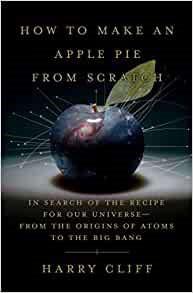

Around 60 students attended our ‘Aspiring Medics Information’ event. Content was delivered via a Teams meeting, hosted by Dr Bradley. We had three outstanding guest speakers: Professor Sue Smith, who spoke as Professor Emerita of Medical Education, Imperial College London, Dr Jonathan Buckler, who spoke in his role as College Tutor and Non-Stipendiary Lecturer in Clinical Medicine at St Hugh’s College at the University
Bharathsri Sivasritharan and Rupankar Majumdar had an opportunity to visit UCL and work in the microbiology department as part of their Gold CREST award. They learned many new techniques and experienced life in a working research laboratory. Both students worked hard and are now looking forward to completing their research and gaining the prestigious Gold Award.
Two Year 7 students also received their CREST Bronze Award for independent scientific investigations. Saron Victor-Ananthaseelan investigated the factors affecting bubbling in a chemical lava lamp. Jack Corlett looked at factors affecting the flight of a paper aeroplane. Congratulations to both students on their achievement.
Students participated in a very busy day of Science activities. They used rhubarb to investigate how different factors can change the rate of a reaction. This required them to use their practical and observational skills and introduced students to some of the Chemistry they will be studying at the beginning of Year 10.
Well done to Bharathsri Sivasritharan who was invited to participate in Round 2 of the UK Chemistry Olympiad.
Following on from our careers sessions to inform Year 10 about chemical engineering, Fiona Erskine, a working chemical engineer and author, agreed to answer questions from students over Teams at a lunchtime meeting in April. Fiona’s book ‘Phosphate Rocks’ blends mystery, history and chemistry in ‘an engaging novel that cleverly leads the reader through a winding series of interrelated stories detailing five decades in a factory’s life and its eventual demise’. Fiona Erskine herself has been described as “quite possibly the best mystery novelist ever to have taken up the quill in the name of chemistry.”
Students also received a talk from an Environmental Chemist. They enjoyed hearing about the detection element to the role and were able to apply their chemical knowledge to understand the origins of the pollutants, the dangers they pose and possible methods of clean-up. This was linked to a careers session in which students spent some time familiarising themselves with the Unifrog platform and the variety of jobs linked to STEM subjects.
Congratulations to four Year 10 students, Aarav, Aashman, David and Vedant on reaching the second stage of the Royal Society of Chemistry’s ‘Top of the bench’ competition. They experienced how exciting it is to work in a university laboratory by testing melting points of substances, worked with infrared spectroscopy and carried out the clock reaction; timing it with music. Thank you to Ms Bishop for supporting the students throughout the competition.
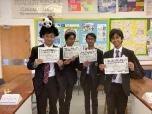
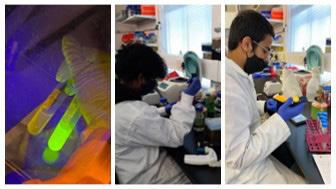
Students designed and fired off their own rockets in an enjoyable session with the Physics Department where they used their knowledge of forces to try to make the best rockets.
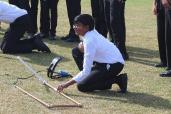
14 intrepid students took part this year, competing against over 2000 students from other schools. This is a fiercely difficult paper, with the average mark being just 25%, and all our students who chose to take part are to be congratulated on their determination and resilience. They have achieved an outstanding set of results, making this year our most successful ever by a wide margin. James Perry and Aaditya Deshmukh each received a Top Gold award and qualified for the next round of the competition. Thank you to Mrs Hodges and Mr Clegg for preparing the students for this competition.
Thank you and congratulations to Wafi Ali and Ojas Tiwari for editing and organising this publication which includes some fantastic articles on a wide range of topics from ‘Womholes’ to the ‘Physics of MagLev’ trains. Special thanks go to Dr Ben Brubaker, an awardwinning Physicist, who provided a very interesting article on Quantum-Optomechanics.
Congratulations to Year 12 student, Adam Steer, who was placed in the top 0.71% of the Cambridge Chemistry Challenge. This is a fantastic achievement, and for this performance he was awarded the top Roentgenium Award. To recognise this outstanding achievement, he was invited to the residential camp in Cambridge which took place during the summer break, just before the start of the new school term. The course was based at the University Chemical Laboratory and St Catharine’s College. This was a wonderful opportunity for him to meet other first-rate students and to hone his chemistry skills.

of similar opportunities. Students greatly enjoyed the time they spent together. The Youth Hostel (and staff) were fantastic in welcoming our students and providing them with lots of different opportunities to socialise. Students visited the nearby town of Bakewell, enjoyed the Games room in the hostel and took great delight (and competitive spirit!) in the quiz organised by Dr Stewart and Miss Benham. Our students were a credit to the school, with the Youth Hostel staff commenting on their excellent manners and behaviour. Thank you to Mrs Johnson, Dr Carpenter, Ms Bishop, Miss ChungFaye, Miss Benham, Mrs Rogers and Dr Stewart for their time and energy on the trip.

Chemists descended on the small village of Hartington in the Peak District for three days of Chemistry Revision. Mrs Johnson, Miss Difford, Dr Carpenter and Ms Bishop ran revision workshops for students at the beautiful 17th Century manor of Hartington Hall, which is now a Youth Hostel. Students worked hard and asked lots of questions, with many commenting that the trip had really helped them get to grips with their revision work. Students visited the Peak District Mining Museum where they had an introduction into the importance of mining. They were lucky to have two fantastic guides who discussed the links between Chemistry, Geology and Economics using mining as an example. Students were fascinated to hear about the guides’ careers as they utilised Chemistry in large-scale industrial processes. A story about collecting a handful of gold from a chute in a mine was a particular favourite. They also had a tour down Temple Mine – a 1920’s lead and fluorspar mine, which really brought the processes discussed to life.
It was wonderful to get away on a school trip after the pandemic had prevented students from taking advantage

Year 9 arrived at school during Activity Week 1 full of enthusiasm for their journey to The Observatory Science Centre at Herstmonceux. The Centre is an interactive Science Centre based at a former site of the Royal Observatory. The Royal Observatory moved to Herstmonceux from Greenwich in 1958, seeking clearer skies for their observations. Students greatly enjoyed learning about this rich history. They attended talks from astronomers who explained how reflecting and refracting telescopes worked. They saw both telescopes in situ and were encouraged to ask questions. Students were in small form groups for these highly interactive talks which provided excellent insight into their current Year 9 Space topic in Physics. The Centre itself has several hands-on activities for students to engage with, providing many learning opportunities. Thank you to the staff, especially Miss Difford, for organising the trip.
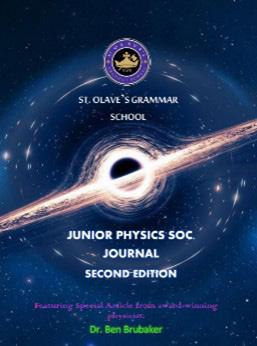
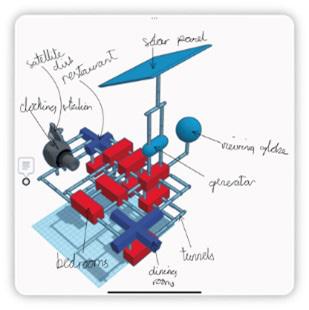
This Society is for physicists and engineers alike with an interest in understanding how and why our universe behaves the way that it does, and how we can apply this knowledge practically to shape our daily lives. Their President was Lara Tatli with Vice Presidents Caleb Lee and James Perry. This year, they have hosted a huge variety of talks and quizzes within diverse areas of the subject, from fundamental physics topics such as the Standard Model of Particle Physics, through to applied engineering such as how musical instruments work. Some highlights include a talk on ‘Chaos Theory’ and a simulation of the Lorenz Attractor by Moosa Saghir (Year 12), and a show-and-tell of some old engineering equipment by Vice President James Perry (Year 13). President Lara Tatli (Year 13) presented a talk on ‘The history of quantum mechanics’, which included solving the famous Dirac Equation and using it to prove the existence of antimatter. Physics and Engineering Society runs every week for Years 12 and 13 and continues to be among the most popular societies at St. Olave’s with a fantastic weekly turnout and over 130 followers on Instagram.

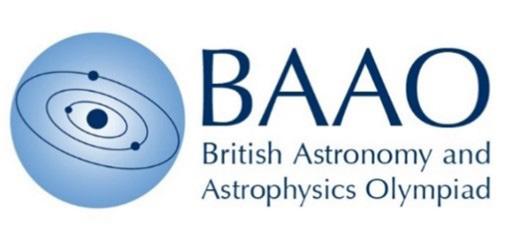
For the first time, Olavian students in Years 9, 10 and 11 competed in the Junior Astrophysics Olympiad. Congratulations to all 27 students who took part as each student was awarded a graded certificate. The students achieved in total 12 Gold awards, 12 Silver and 3 Bronze. Given that the challenge is aimed at Year 10 and we had a significant number of Year 9 students taking part, these are results to be proud of. Well done to all involved!
the SLS static fire and Starship prototype test flights live. No other Society is quite as explosive.
The Society also ran a Design competition for Years 7-11, in which students had to design an aspect of interstellar travel. Congratulations to all who participated and special congratulations and mention to our winners who designed wonderful and creative projects. In the Year 7-8 category, the group comprising Shubham Tumulu, Arshwin Thushakaran, Venoj Suthan, Aidan Manickarajah, Ashvik Dubey came out winners after they designed an Olavian Space Hotel. In the Year 9-11 category, Abdul Rehman, Pranav Gillela and Eeashan Rautaray designed a project called AstroSites, related to energy production and won.
Space Society saw a broad spread of enthusiastic talks from students, with a dual focus on astronomy and rocketry, organised by Presidents Tausif Samad and James Perry. Topics have ranged from the Artemis moon missions to components of Alien life and medicine in Space to the Roswell Incident. They also had collaborations with Computer Science Society, where they discussed the intricacies of flight avionics, and Literature Society, who taught them all about the scientific aspect to The Hitchhiker’s Guide to the Galaxy. It has been really enjoyable to follow along with the massive advancements in space exploration made this year, including watching
All students in Years 9 and 10 were given the opportunity to sit the online Junior Physics Challenge run by the Cambridge University British Physics Olympiad. As in previous years, our students performed fantastically with over a quarter of them achieving a Gold certificate. In total, the students achieved 61 Golds, 99 Silver and 56 Bronze. Well done to everybody who took part.
Old Olavian, Daniel Shergold has been awarded a Quest Scholarship by the Institute of Civil Engineers after securing sponsorship from Atkins – an engineering and project management consultancy.
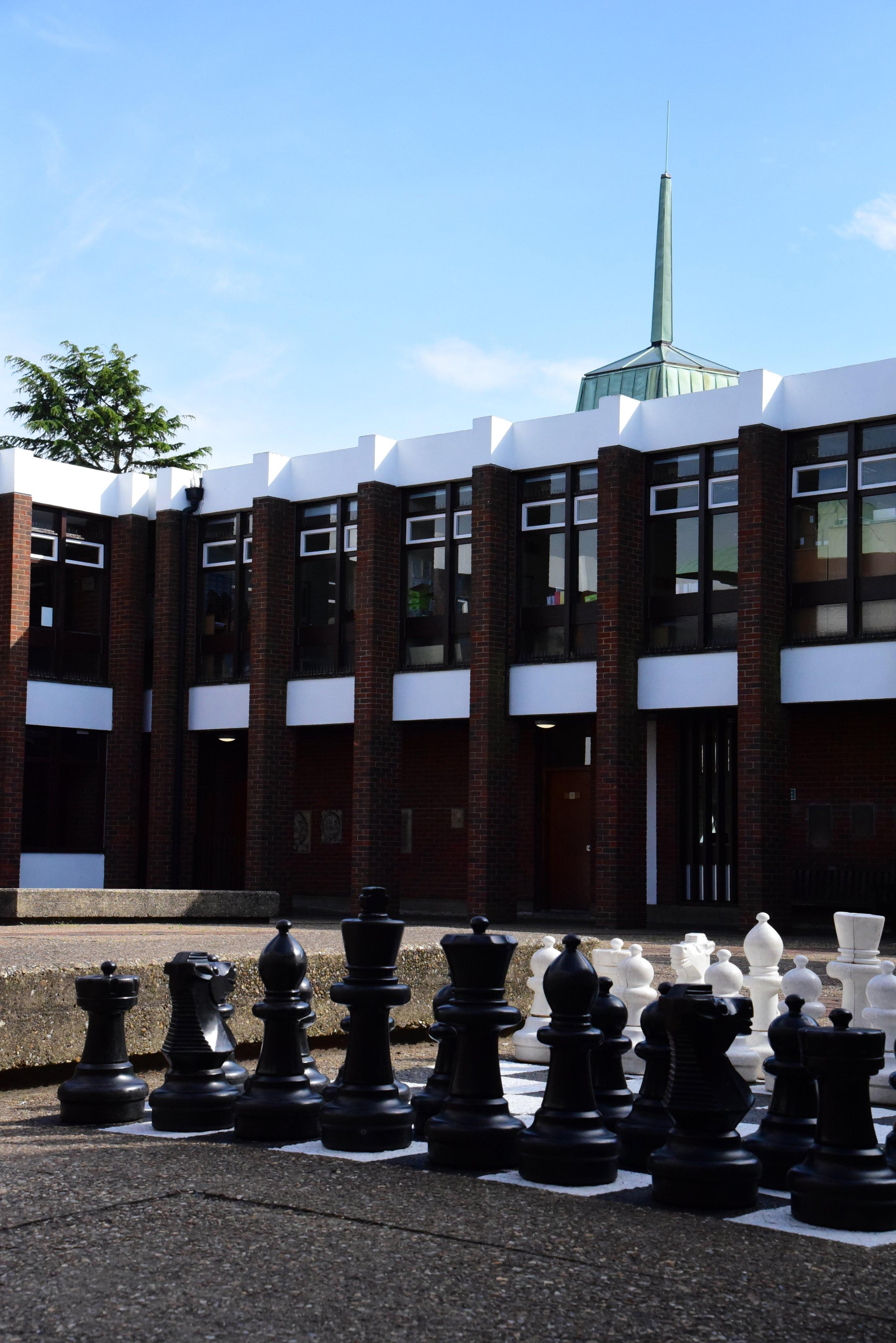



Althoughnot back to a typical year, we were able to get back to some of the opportunities that contribute to the richness of this faculty, including some new initiatives. Students worked hard, but also took advantage of different opportunities to learn beyond the curriculum. We continued to promote our desire to make students think deeply, work creatively and enjoy challenging and diverse literature through which they can engage with the world around them.
This year, due to COVID restrictions, we performed our Black History Month show during the day, with three performances to ensure all students had a chance to see their peers perform. Students from all year groups performed poetry, extracts from novels, dance, plays and music creating a wonderful celebration of the work of Black British artists. The shift from an evening performance worked well and it was fantastic to have every single student, either as performer or audience member, take part in this event to mark Black History Month. This was supported by our Black History Month magazine which gave students an opportunity to explore historical and current issues and events that impact particularly on Black British people today.
Before Easter we teamed up with the Music department to create a night inspired by musicals and film soundtracks. The Drama department created a scaled down version of Showstoppers! for the second half of the concert. We enjoyed extracts from musicals including ‘Oliver!’ ‘Hadestow’n, ‘Motown’ and ‘Hamilton’. Students delighted us with their performances, bringing the joy of musicals to the school hall.
We also teamed up with the Art Department to launch a new poetry and illustration day for Year 9 students to celebrate National Poetry Day. In the weeks leading up to the event, our GCSE art students worked in their lessons with Mr Clark to create a series of workshops to deliver to the rest of their year group. At the same time in English lessons, students explored how art and literature are interlinked through album covers, art works and book illustrations. The day itself focussed on creating illustrations inspired by the poem ‘Jabberwocky’ and the students created incredible work and enjoyed a fantastic day.
In the summer term we had the Lower School Show, performed in the sunshine, in the Business Centre garden. We started with a Roald Dahl medley, which
merged ‘Fantastic Mr Fox,’ ‘George’s Marvellous Medicine’, ‘Matilda’ and ‘Charlie and the Chocolate Factory’. This was followed by Tom Stoppard’s ‘Real Inspector Hound’. Both pieces were lively and full of fun, with superb performances from both casts.
Students in Year 7 visited The Globe in March to watch a production of ‘Macbeth’, and they and Year 8 enjoyed a theatre trip to see ‘Animal Farm’ at The Churchill Theatre in the Summer term. This fantastic production directed by Robert Icke, was filled with War Horse style puppets to depict the different animals and the students all thoroughly enjoyed the evening, enriched by their study of the novel at the start of Year 7.
During Activity Week 1, Year 9 enjoyed a visit to the National Gallery, complete with talks on three artists. After this we saw a matinee of ‘The Corn Is Green’ at The National Theatre. In the second activity week, we did mock trials followed by media projects exploring topical magazine television shows. These offered excellent opportunities for group work that extended beyond the curriculum.
We all enjoyed a visit from grand slam poetry champion Harry Baker. He delighted students in Years 7-10 with his witty and intelligent poetry covering ideas ranging from prime numbers to the solar system to humus. Following his performance, he did a series of workshops allowing students to develop their own poetry inspired by their work. It was fantastic for our students to meet a Poet who was able to combine his love for maths, science and poetry.
Year 10 had the opportunity to take part in public speaking training with the Jack Petchey ‘Speak Up, Speak Out’ project. A hugely valuable skill, it was great to give the students some time and space to focus on developing it further. Year 7 took part in a duologue project after their end of year exams, with every student performing short duologues to their peers. Year 8 students all performed in short plays in front of their peers and parents. We saw some real talent in these performances and we look forward to seeing more from them in future years.
Habibah Choudhury became our new Poet Laureate, sharing her poetry at various events including the Black History Month show. Joshua Peek made the long list of the National Theatre Playwriting competition with his play which told the story of an unwilling monarch accused of murder. Feminist Society and Literature
Society saw a series of interesting and engaging talks. Lots of students took part in Lamda, excelling in their exams and junior debating society explored interesting and challenging issues through their debates.
Well done to all of our students involved in these different initiatives, and thank you to the staff that enable them to happen.
Alexandra Wilkie S___Head of Faculty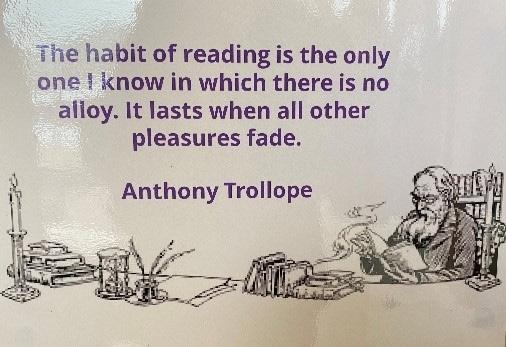
Year 11 students spent a day devoted to improving their writing skills. The first of three sessions focussed on developing structure and language skills in non-fiction writing, the second session explored character and plot, and the final session was dedicated to setting and plot in fiction writing. We hope students had the opportunity to build their confidence, hone their skills and think carefully about shaping their writing for effect. The writing section of the Language exams are worth 50% of the English Language GCSE so it is important that students continue to work on developing these skills.
Mrs Kemal, Poetry Ambassador for the Poetry Society, judged the Political Poetry Competition and sent her congratulations to the 40 or so poets who entered the competition. As a concept, the subject was dealt with carefully and sensitively. There were many references to problem areas such as: plastics; Afghanistan; social exploitation; outsiders; online abuse; dying animals; corrupt politicians and manifold environmental issues. Our students are clearly engaged with the politics of the planet and are super-aware of problems they will be facing as adults. All poets were commended for their keen, sensitive and impressive work.
Year 13 English Literature students studying ‘Everyman’ visited the National Theatre Archives at Waterloo to see a recorded production. They were working on comparative coursework essays, and this brought Carol Ann Duffy’s update of the medieval morality play to life. Directed by Rufus Norris and starring Chiwetel Ejiofor, students were able to appreciate the song, dance and rapping. Everyman falls to his death from the roof of a high-rise office building after partying hard - and as he faces his ‘reckoning’ many ethical issues arise. They received a warm welcome and a taste of the theatre postpandemic. Students then set to work on crafting their essays, comparing this play with the brilliant Arimah collection of short stories; ‘What It Means When A Man Falls From The Sky’.

Congratulations to Year 9 student Robin Saldanha who was announced as a winner in the Newsround Category. Young people aged 11-18 submitted their original story ideas to the competition, which is in its fourth year. It gives young people the chance to produce their own story with BBC programme makers, producers and journalists. Judges included programme editors and commissioners from across the BBC as well as presenters and reporters, including Huw Edwards, Naga Munchetty, and Nikki Fox from BBC News, Radio 1’s Roisin Hastie, The One Show’s Alex Jones and Newsround’s Ricky Boleto and Shanequa Paris.
Rishi and Tanish, Year 10, took part in the Bromley regional final of the Jack Petchey ‘Speak Out’ Competition at Hayes School. This was an excellent opportunity to hone their skills as public speakers and mix with other like-minded students from across the borough. Making a speech is a nerve-wracking task for many, but good preparation for future life. Competitors were assessed on the delivery, content and structure of their speeches. Rishi spoke on mental health awareness, delivering a lively speech that ranged through Einstein and Kit Kat eating to losing a family member to dementia. Tanish spoke about artificial intelligence, its dangers and possibilities. Both acquitted themselves very well and
visibly grew in confidence throughout the preparation. Well done to both for their hard work and dedication.
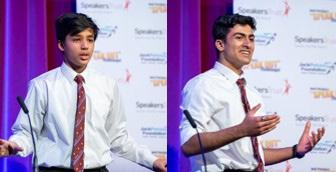
All Year 7 students attended a live performance of ‘Macbeth’ at the Globe. This was an excellent opportunity to experience live Shakespearean theatre in an authentic setting. It was a specially adapted 90-minute version aimed at school students that retained the original language. This will help them imagine and set into context future plays that they study in class. Students were gripped by the stagecraft and evil scheming of Macbeth’s ‘vaulting ambition’.
Thank you to Ms Wilkie, the English Department and students in Years 8 - 10 for putting together an outstanding performance, which gave a new perspective on favourites ‘Matilda’, ‘The Twits’, ‘Charlie and the Chocolate Factory’, ‘Fantastic Mr Fox’ and Tom Stoppard’s hilarious murder mystery, ‘The Real Inspector Hound’. The plays were cleverly thought through, and well executed, from all involved. The audience laughed due to the comic timing of the performers and the location in the Business Centre Garden made for an entertaining evening all round.
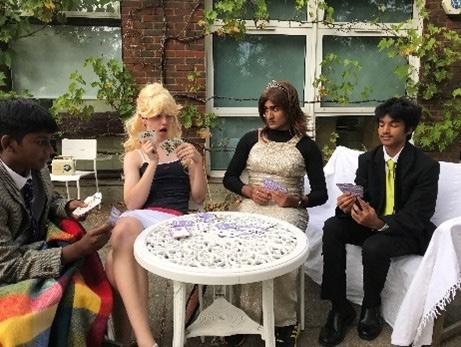
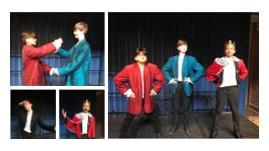
After working on scripted pieces in Drama, Year 8 performed their ten-minute plays over two weeks during their lessons. These included Blackadder sketches, ‘The King’s New Clothes,’ Chaucer’s ‘The Pardoner’s Tale, a dystopian play about consumerism and a play about a football team struggling to get enough players. Performing in the Great Hall, on stage, under lights, in front of an audience was a daunting task for some of our students, but they all met the challenge and excelled.
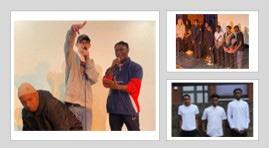
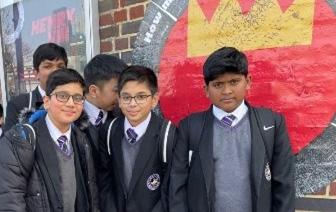
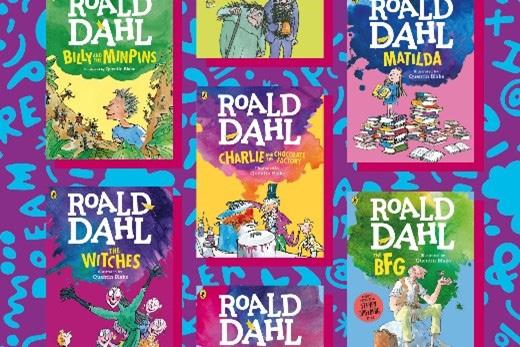
wonderful showcase of the talent, diversity and richness, which exists within the school There was an array of musical performances, including bands, choirs, raps, soloists, drama pieces and poetry recitals, including poetry written by current Olavians and famous poets. The whole school congratulated the performances and left with a greater appreciation of Black history.
Well done to Year 12 students, Amoré Adams, Pearse Barry and Joseph Davies, who were winners of the Bernie Simons Essay Competition 2022. The competition was named after the firm’s Founding Partner, Bernie Simons, who was an outspoken advocate of human rights and whose values continue to impact the ethos of the firm. This year, students from the London area in Years 11-13 were asked to write an essay on one of three topics related to civil liberties. The three topics of choice were: Vaccinations, Stop and Search and University Censorship.
We welcomed Steve Coppin and Meg Hutchinson to school for a student and parent workshop on Maximising Success. The workshop is designed to help promote good learning habits as students begin their GCSEs. Students explored three principles of effective learning/ revision, twelve different learning/revision techniques and a system of proactive learning/revision. Students left the session feeling better motivated and empowered, having chosen three or four preferred learning/revision techniques which they can use proactively throughout their school career and beyond.
Literature Society, led by Presidents Martha Hodgson, Elise Stringfellow and Crystal Nettey, had a year full of wonderful pieces of literature, and the wonderful people who engage with them. Talks ranged from ‘Detective Fiction’ to ‘Nonsense Literature’ and ‘The Marquis de Sade to the Gothic’. They have been diverse and numerous, each enlightening and intriguing; helping to broaden students’ literary horizons and allowing speakers to be enthusiastic about the subjects they love in a society where this is not just appreciated but encouraged. Quizzes and opical debate sessions, this society has something for everyone. Helping show just how important literature is to every field of study, even in the most unexpected spaces, like our collaboration with Space Society on Adams’ ‘The Hitchhikers Guide to the Galaxy’. They ran poetry workshops, many of those produced featured in our Society Journals, and creative writing, giving members the opportunity to chase their own interests and think imaginatively, without borders or limitations of the curriculum of checklist criteria. As a Society, they appreciate the many different forms of literature and the many different ways in which people
can engage with it. Producing their Literature Journal and Blog, filled with writing by their members, the ways in which their members can contribute their own work is numerable; there is no one way to be a lover of literature, and as a society, seek to foster these personal discoveries.

Congratulations to all our students for their fantastic results in the LAMDA exams. Over 200 students have achieved a range of grades and qualifications this year. The LAMDA team at St Olave’s offers the opportunity for all years to take part in an after-school Elocution Club or lunchtime classes, with skills taught in a fun and exciting curriculum through a number of creative disciplines.
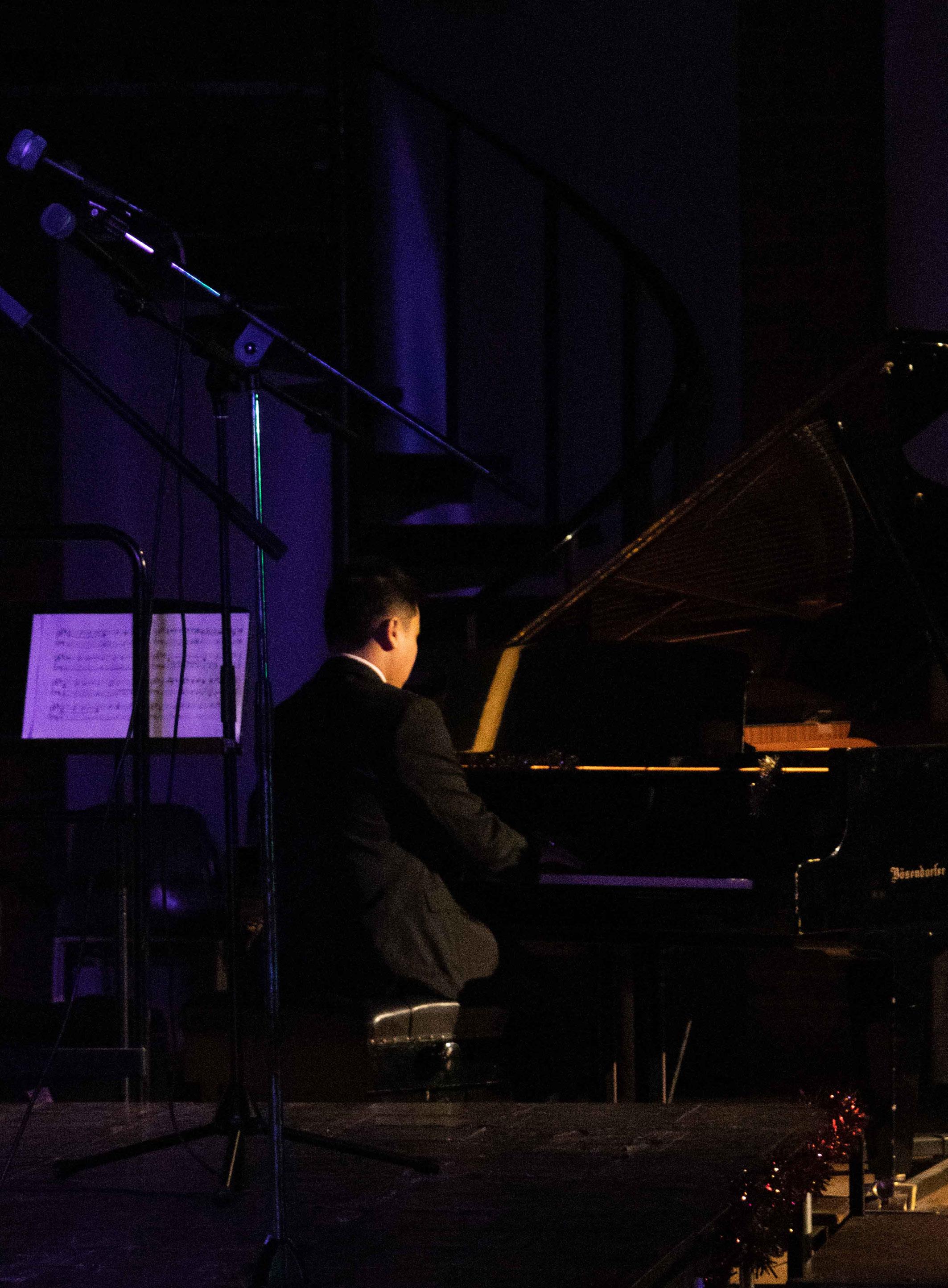
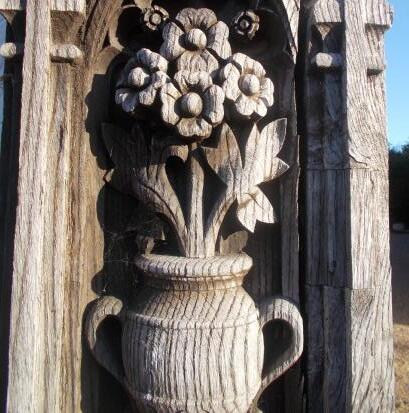

The return to normality has been quite a long road. The biggest signal of this happening was returning to Southwark Cathedral in May, after two years absence, to celebrate our school, now 451 years in name and formation. We welcomed as our speaker The Revd Canon Thomas Woodhouse one of the special chaplains to the Queen, now the King, who presides over the now, King’s Chapel of the Savoy, for which we provide choristers. The choir blessed us with a magnificent rendition of ‘Zadok the Priest’, we learned a little more about our school’s name’s sake, St Olaf, and our prefects led us in the Act of Commemoration. I was blessed to find Hodge, the Cathedral cat, sitting in the vestry before we started, apparently sitting, eyes closed, in prayer for us. The Cathedral was full, and it was a wonderful and very much appreciated experience for all.
As Chaplain to St Olave’s, I finally got to go to the Savoy Chapel in January. Thomas had extended a warm invitation prior to COVID which was then postponed twice, but finally I was able to go and preach. I was also privileged to have lunch with Thomas’ boss who lives in St James’ Palace. I met some amazing people and was given a short personal tour by one of the late Queen’s staff. It was a privilege to see first hand our wonderful choristers lead worship in such an amazing place. Thank you choristers, and Thomas, for inviting me.

We have slowly returned to full assemblies in the hall, beginning with one then two year groups, slowly increasing until we finally arrived at whole school. It is wonderful to have the Great Hall full again and to sing hymns together. The return of full communion services in Chapel on a Wednesday at 8:40am, began slowly and are beginning to grow again. I was amazed that once again a Chapel Choir has been formed and I am grateful to Alfred Beston and Thomas Blew for working with this group and providing such inspiring anthems during Communion. This year will see the return of the Christmas Communion Carol Service, open to all parents and friends of the school as well as our students and staff.
The Year 12 community service programme, Le Chavetois, could not run through COVID, so getting students back into placements has been difficult. Many of our previous partners were and are still hesitant but those who have taken students are seeing the benefit. It is good to see that local hospitals now have people in place to train and place volunteers.
The Christian Union has continued and the year 12’s and 13’s do an amazing job sharing their faith and helping younger ones grow in their own faith. I am grateful to staff who help to cover this group. Our Gospel choir continues and looks forward to being a part of our special services again at Christmas and Easter. The senior students who make these commitments are remarkable young people.
One of the most amazing events of 2022 was the interfaith Iftar we had in April when Easter, Passover and Ramadan intersected in the seasons of each faith. We were able to come together, learn about the value of fasting in each of our faiths, and then eat together. This brought a real sense of community, value and understanding along with a deeper appreciation of the traditions of the different faiths, as well as clearly showing us all how much we actually have in common. One thing we all agree on, coming together around food is a wonderful and worthwhile experience for everyone.
In June it was a huge privilege to be able to use the Chapel on a Saturday morning to baptise the children of a staff member. This is the first time I have conducted a Baptism at St Olave’s and it was a special and deeply spiritual experience for everyone. The intimate nature of the Chapel allowed everyone to get involved and be part of a wonderful ceremony of initiation into the family of God.
The Queen’s death brought us into a protocol for churches and chapels during the mourning period. The Chapel offered a place to reflect and light a candle, to think about the Queen’s reign and its effect on us. It also allowed a time of grief which had been lost during COVID and allowed us to minister to those whose experiences had been forgotten in the melee of the pandemic. This work will be ongoing, and I am grateful to all my colleagues, whose work in the wellbeing area allows students to explore their feelings, struggles, problems and mental health issues in a safe and peaceful environment. We all benefit from the blessing that is Shelby, our wellbeing dog, and I am glad to see him recognised as a member of staff on our staff board. Both student and staff faces light up when he is around, and he brings a dimension to meetings which helps all of us.
Our celebration of Harvest in October allowed us to think about their being enough food for everyone and about our willingness to share. Our donations were collected for the local foodbank who are so grateful to the school
for all it gives each year. I was very conscious that the cost of living is affecting all of us and made sure people recognised that their giving had to be proportionate to their own needs. Still the gifts kept coming from this generous school and its families. Thank you.
As always Remembrance plays an important role in our school life. We are privileged to have Old Olavians who share with us and reflect with us on the loss of past students in both world wars. The laying of wreaths at our memorial is always a poignant moment and the silence between ‘The Last Post’ and ‘Reveille’ is quite moving. Every year we light a Peace Candle and rededicate ourselves to the pursuit of peace and reconciliation.
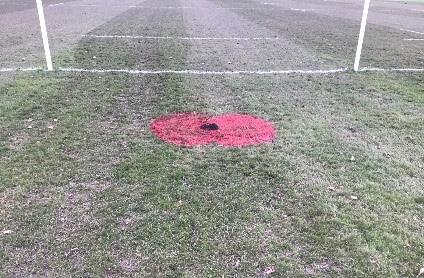
I continue to be profoundly grateful to the staff of this school for their commitment, enthusiasm, compassion and support. I am constantly amazed by what happens in this place, by whom I find in the Chapel and Wellbeing Area. By the conversations I have and opportunities for ministry I am given. By the sense of community and the life in all its fullness that is found here.
God bless you.
Our annual Service of Thanksgiving and Commemoration took place in the splendid setting of Southwark Cathedral. The Reverend Canon Thomas Woodhouse, Chaplain, The King’s Chapel of the Savoy within the Duchy of Lancaster gave an inspiring address to a packed cathedral of guests, including the Mayor of Bromley, governors, students, staff, parents and Old Olavians. The outgoing Senior Prefect Team and members of staff read the traditional verses before the whole cathedral resounded to the final hymn, ‘Jerusalem’. I hope that, particularly for the Year 13 leavers, this will
have been a memorable and emotional occasion to look back on in years to come. Thank you to our Chaplain, Reverend Dr Julie Bowen for overseeing the organisation of this wonderful occasion
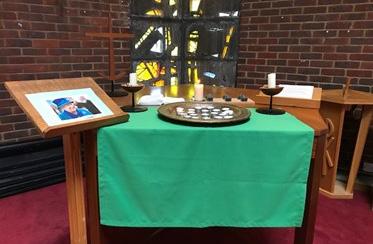
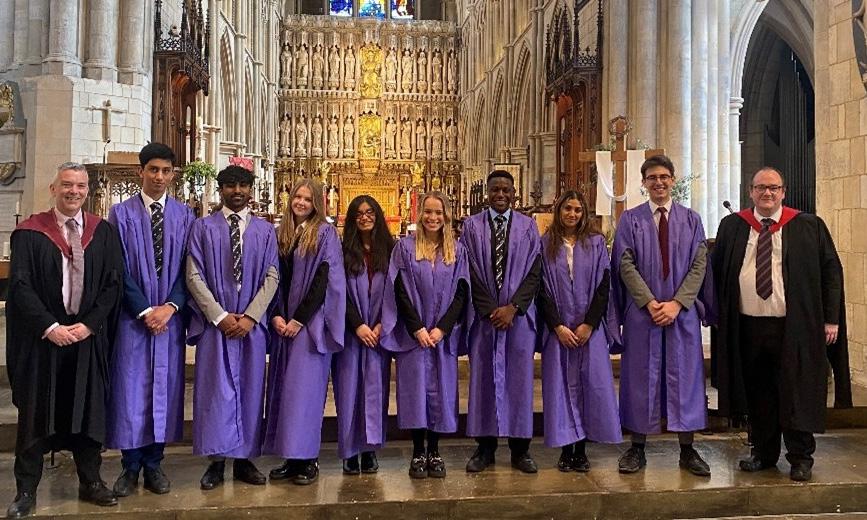
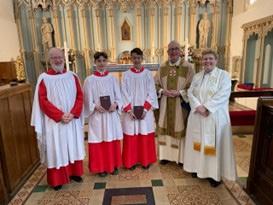
Old Olavian, Mr Graham Milne, laid the wreath together with Captains of School, Millie Hennessy and Steven Coker. Thank you to the Chaplain, Reverend Dr Julie Bowen, for leading the Service and to Mr Price for overseeing the music, which included a performance of ‘The Last Post’ movingly played by Year 13 student, Frank Shrimpton.
Wafi Ali and Alfred Beston both received awards from The Rotary Club of Bromley for their work in the community.
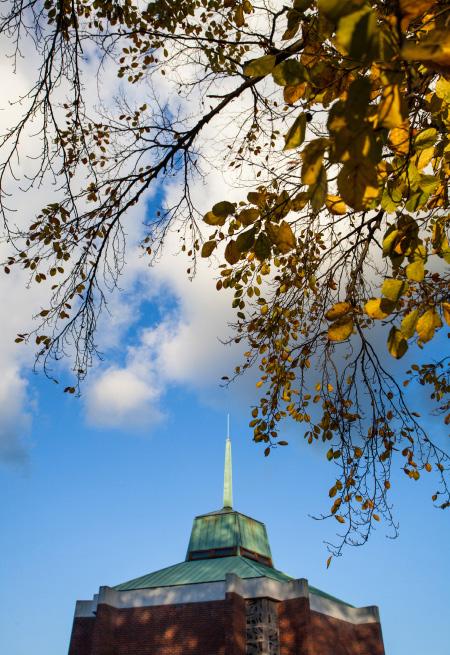


As we saw a “return to a new normal” Olavians have constantly risen to the challenges presented to them. They have adapted, made excellent academic progress, and developed as responsible individuals committed to celebrating diversity, building harmonious relationships, and contributing to the wider community.

We welcomed a new cohort into Year 7, who enjoyed and reaped the benefits of a Taster morning after National Offer Day, Summer School, as well as the more traditional Induction days. All these events supported them settling smoothly into secondary school life. Students in Year 9 also adapted to new form groups and the challenges of their chosen GCSE curriculum. This year group as ever enthusiastically participated in the Duke of Edinburgh Award which required an element of community service. To have so many participate in this award is a credit to their enthusiasm as well as teacher support and encouragement. One such student delivered a whole school assembly with Mrs Maltman about his work for a Community Fridge, an amazing example about how Olavians and their families go above and beyond. Contribution to school life further evolved with this year group being the first to participate in formal externally supported training to be wellbeing mentors to younger years. Peer support is often a first step to students feeling their voice is being heard and intervention provided.
Year 11 stepped up to the challenge of external exams and reaped the rewards of hard work and determination. With the help of their peers, Form Tutors, Heads of Year and the wider Pastoral team, the happiness and success of our cohort this year was supported effectively to ensure a resilient and wonderful group of young people who can move forward in the next step of their education.
Maxwell Deputy Headteacher (Pastoral)We were delighted to welcome new Olavians into school prior to the start of term. Initially a government initiative following on from the pandemic, we ensured it evolved into a programme which suited our cohort. Teambuilding activities delivered by the Bushcraft company and the Pastoral team, Maths, English, Science,
PE as well as Art, were all enthusiastically greeted by the new Olavians. These activities enabled them to start to build friendships, familiarise themselves with their new surroundings and develop an early foundation to learning in their new school. Staff ably ensured this programme ran effectively and smoothly. The transition for parents parenting a secondary school child also began.
We were delighted to hear about the achievements of students from Years 7 and 8 at this event. Presentations, musical performances as well as soliloquies ensured it was enthralling for all. Mohammad Fallaha, former Captain of School and now School Governor, delivered a very powerful speech celebrating the firm foundations of friendships he made at school, fundamental learning habits which he still uses in his current medical professional background, as well as sharing with the audience amusing anecdotes about staff who had taught him.
Healthy relationships have been a central theme to the work Heads of Year have focused on with their year groups. Two year groups benefited from the delivery of a workshop by the School of Sexuality Education where use of language, relationships within the family and amongst peers was explored further. This was just one element of Wellbeing Week for one of the year groups. Talks by other external providers gave insight for example into the pressure boys in a selective school might face from parents, their peers and themselves. The speaker highlighted signs to be alert to as well as coping mechanisms. Another highlight of this week is always the publication of the Wellbeing Journal. I am delighted that we are on the Fifth Series and am very grateful to Rhea Rentala for putting this together.
We were thrilled to be accredited with the AcSEED Award. The AcSEED Initiative was set up in 2010 by members of the YoungMinds VIK project. In 2013 The AcSEED Initiative was extended nationwide, with all UK primary and secondary schools eligible to apply for The AcSEED Award. The AcSEED Initiative collates experiences from young people, parents/guardians, and teachers/schools, and from this identifies best practices that form a minimum level of support that AcSEED recommends all schools to adopt. They noted specifically our Pastoral Vision, the Mental Health policy, access to the Wellbeing Practitioner, Peer Mentor training from
the DSM Foundation, all Heads of Year being Mental Health First Aid trained, the Pastoral area on school website, the delivery of a Wellbeing Week and our use of Shelby, the Wellbeing dog.

The fifth edition of the Olavian Wellbeing Journal includes a variety of articles from students, staff and external contributors on a range of topics from ‘The Power of Geometry’ to ‘The Impact of Mental Illness in Abstract Painters’. Thank you to Year 13 student, Rhea Rental, and all those involved in putting this journal together. The foreword by Mrs Maxwell, Deputy Headteacher, highlights that as “we look towards the future, we hold onto the hope mental health will be considered as important as physical health by everyone.” I hope this journal serves as a postive reminder of this.
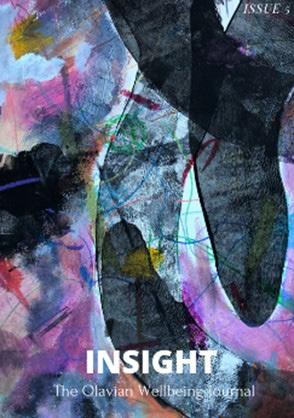
misconceptions. The Charlie Waller Memorial Trust delivered talks to pupils on mental health challenges, whilst our Bromley Wellbeing practitioner delivered a remote assembly to all, identifying mental health concerns and signposting support. The Sixth Form also had a talk focusing on exam worry. We hope refresher week for Years 7-10 provides pupils with the chance to engage further in non-academic work. The fifth copy of ‘Insight’ the Wellbeing Journal has been published showing the commitment of our student body to this subject. We are also committed to supporting parent’s understanding of wellbeing and mental health challenges young people might face.
In line with our whole school vision, we are committed to delivering outstanding pastoral support. The fifth Wellbeing Week provided an opportunity to give our community a time for reflection on wellbeing, healthy relationships and mental health. The School of Sexuality Education worked with Year 9 pupils inspiring thought-provoking conversations and challenging
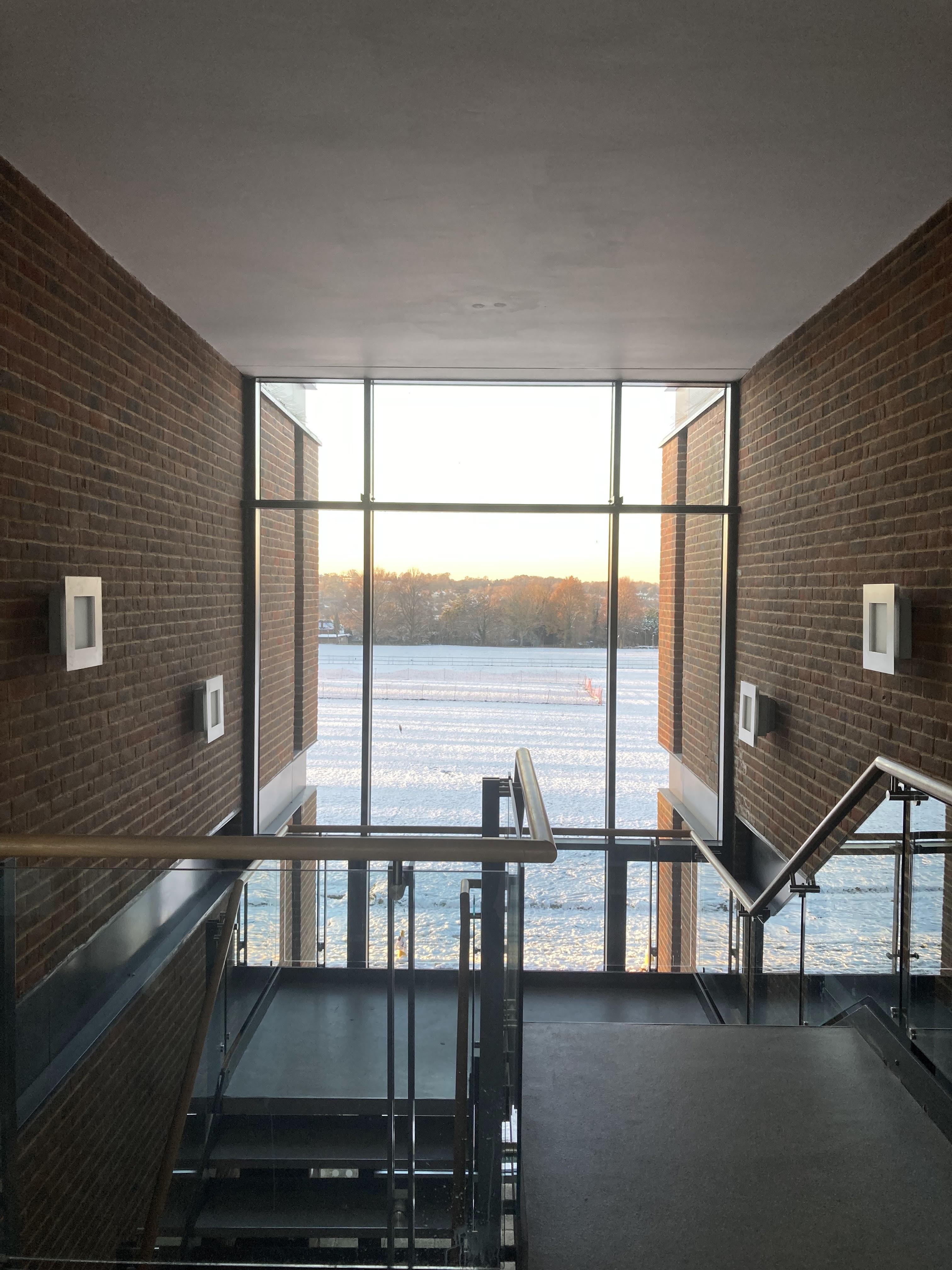

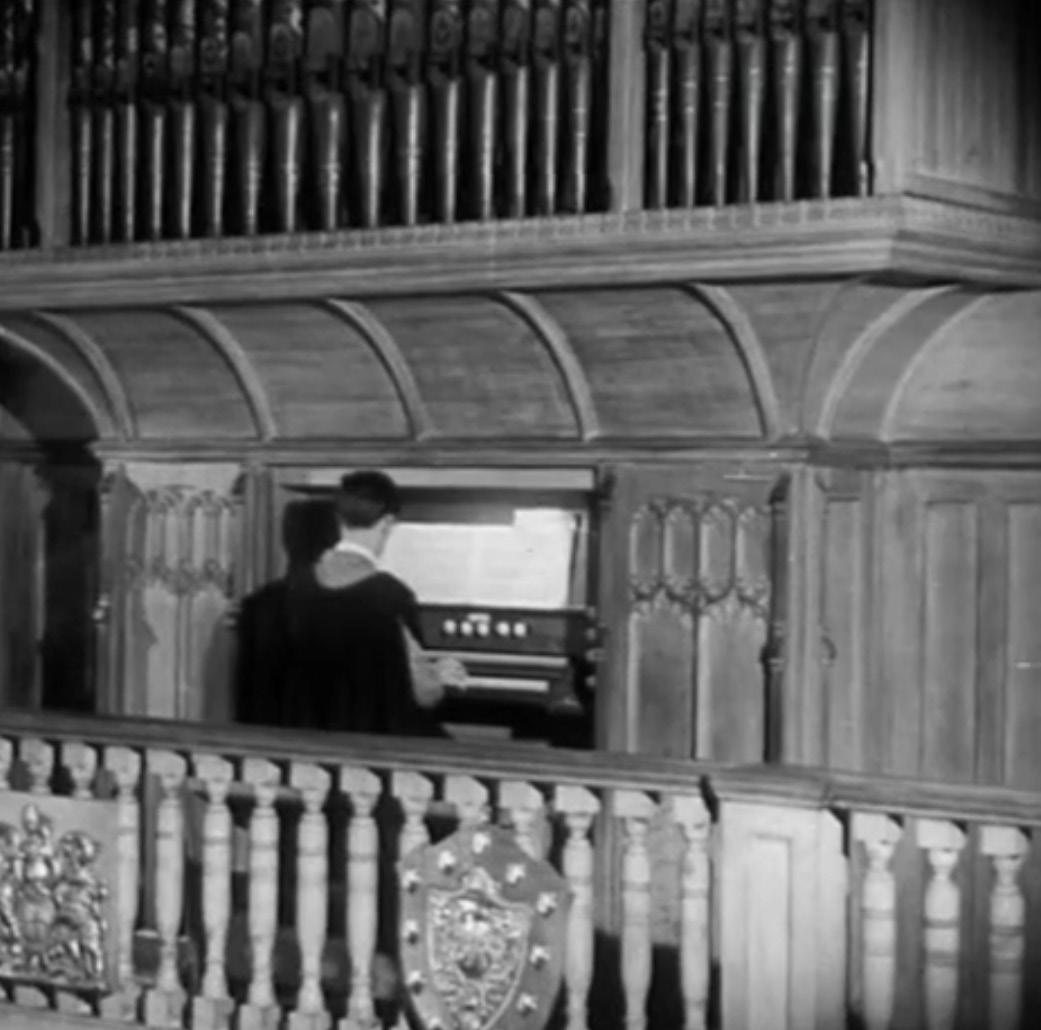
As we dared to believe that the worst of the pandemic was now behind us, in the Autumn Term the Music Department tentatively resumed its regular programme, which had suffered severe disruption throughout the previous two academic cycles. It was a welcome sight that students could once again participate in communal activities, including regular instrumental and choral rehearsals and not be separated down year-group lines.

The November Mid-Term Concert – now in the Great Hall rather than the Chapel – was the first department showcase to be resurrected. We were extremely pleased to see how eagerly the students wanted to return to performing in front of live audiences to share their diverse talents. Year 13 students through to some of the youngest, most recent members of the student community came together once again to offer solo performances and participate in ensembles.
A spirited Christmas Concert was the perfect celebration of music-making at the end of a productive term, where everyone had been working hard to return to ‘normal’. There was a wonderful mix of larger groups, solos, duets and small-group items, choral and instrumental, including a number of student-led performances. Further examples of superb talent were seen in the Spring and Summer Mid-Term Concerts. Both the uptake to perform at these events and the quality of those performances has never been better.

In the Spring Term, the Music and Drama Departments teamed up to produce an entertaining evening in a new format, the Stage and Screen Showcase, which proved very popular. The programme involved sketches, songs and instrumental arrangements from some of the most well-loved productions and films, a treat for the ears and eyes. The passion and commitment shown by Olavians to deliver high-quality performances was truly impressive.
The Chamber Choir, student organists and brass players led the music at our first Service of Commemoration in three years to be held at Southwark Cathedral. This had always been an important occasion in the school’s calendar, but the atmosphere was palpably even more special this time. While treble descants rang out across the building, the hymn singing was rousing, reminding everyone of the value of coming together in music and sharing those significant moments which will conjure warm memories of our time at St Olave’s for years to come.
Matthew Price Director of Music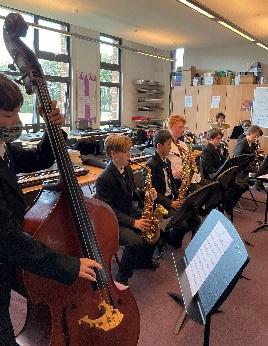
It was lovely to see and hear live music being made again after so many months of pandemic restrictions. With the Music Department’s ensembles all resuming weekly rehearsals. We encourage all singers and instrumentalists to take part in the co-curricular opportunities to make music. Pictured in rehearsal is the Improvisation Ensemble, led by Mr Bullard. This group is ideal for any student who plays at about Grade 3 standard or above and who is keen to play music in a jazz style and learn the art of improvising. Olavian musicians are often keen to set up their own groups too. Four Sixth Form string players formed a new quartet, exploring a variety of chamber music repertoire. Music is a great way for our students to demonstrate leadership, whether that be within an existing ensemble, by supporting less experienced students to develop their skills or by creating brand new musical opportunities.
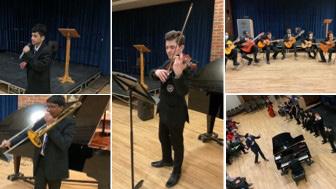
major’ on the piano. Alfred Beston of Year 10 closed the evening’s performances in true style, having contacted the composer Nigel Hitchcock to ask whether he could perform the piece ‘Interval’, transcribing this arrangement for alto saxophone and piano entirely himself and by ear. It was a particularly happy occasion for our musicians to be performing so expressively for a live audience once again, having had several concerts cancelled due to the ongoing pandemic. We would like to thank Mr Price, Mrs Attwood, Mr Bullard, Mr Blew and Ms Hatton for their contributions to ensemble items, as well as the PA for providing refreshments for performers and audience alike.
The audience was treated to an evening of outstanding performances by many talented instrumentalists across all age ranges at St. Olave’s. Wind Band opened the Mid-Term concert with a medley of Glenn Miller classics, including ‘In The Mood’, ‘Little Brown Jug’ and ‘American Patrol’. Wei Hong Song and David Wade of Year 9 and 8 respectively gave delightfully contrasting performances of, first, a lyrical Rachmaninov song arranged for violin and piano, followed by a punchy, high-spirited 21st Century trombone number. Improvisation Ensemble transported us to another genre entirely, closing the first half with the popular Brazilian tune ‘Tico Tico’. After a brief interval, the String Group, joined bizarrely by Mrs Attwood on the bassoon and Mr Blew on the piano, presented a bubbly Baroque Bourree by Handel. Year 13 student Matias Morgan should be highly commended for an impressive rendition of Schubert’s virtuosic ‘Impromptu in Eb
The Chamber Choir, Symphony Orchestra, Jazz Band, student groups, individual singers and instrumentalists each gave high quality performances, with the excellent Symphonic Wind Band rounding off the evening in style. The hard work of all student and staff participants was richly rewarded in what was a first-rate evening, enjoyed by all. With a blend of choral and orchestral favourites, as well as festive-themed items on the programme, the event was a superb send-off at the end of a challenging term. Congratulations to the musicians involved and sincere thanks to everyone, especially our Director of Music, Mr Price, who helped put together such a memorable event.
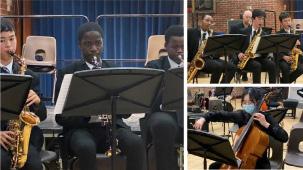
The Spring Mid-Term Concert featured a diverse range of solo and ensemble performances, with the standard once again set very high. Mr Blew’s Strings Group performed a movement from Handel’s Water Music Suite with appropriate energy and elegance to open the programme. The first half then included brilliant piano solos from Oliver in Year 9, Edward and Armand in Year 7 and Kenji in Year 12. Eythan’s boisterous trombone solo was full of character and Thomas gave voice to another less-heard solo instrument, the viola, in his expressive playing. After some much-needed refreshment, kindly
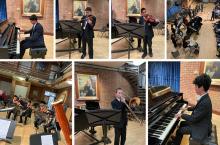
provided by the Parents’ Association, the second half of the programme began with an arrangement of The Beatles’ ‘Daytripper’, given by Mr Tarlton’s Classical Guitar Ensemble. Ruiqi and Matias in Year 13 gave a beautiful rendition of one movement from Beethoven’s ‘Spring Sonata’, one of the most challenging pieces of violin repertoire of its day, not to mention having an equally demanding piano accompaniment! Alfred adeptly demonstrated Bach’s intricate counterpoint in his performance of one of the organ trio sonata movements. It was a treat then to hear a second piece on the trombone, David this time highlighting the instrument’s more sensitive side. Two pianists followed: Harvey with a sparky performance of ‘Mister Trumpet Man’, then Ademofe, making his own stylish interpretation of the Stevie Wonder classic ‘Ribbon in the sky’. Rounding off proceedings with another popular number, the Improvisation Ensemble gave us its take on Miles Davis’ ‘Freddie Freeloader’, featuring delightful, improvised solos from all members of the group in turn. Many congratulations are due to everyone involved in performing, directing and organising the evening’s entertainment.
of the Royal Victorian Order at The Queen’s Chapel of the Savoy. The choristers sang throughout the service, which included beautifully performing the Anthem, ‘O Hearken Thou’. The pupils, and their parents, had the opportunity to speak to The Princess Royal after the service, and share stories about their interests and backgrounds. It was also wonderful to hear Old Olavian, William Awomoyi, talk about his role as a Young Ambassador to the Commonwealth on the BBC during the Jubilee Celebrations.
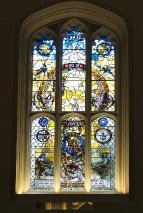
Congratulations to Year 12 student, Eva Wyld who was one of four finalists of the Royal Holloway Young Composer Competition, which invited composers of school age to write choral pieces for the Royal Holloway Choir. This was an international competition and Eva wrote a piece during lockdown about finding hope in a difficult time. The piece is called ‘The Light of Hope’ and the Choir chose this as the overall title of their concert. Eva attended rehearsals and the concert itself. She was also invited to have a composition lesson with the Choir’s composer-in-residence. Everyone was welcoming and generous with their time and it was a really enriching experience
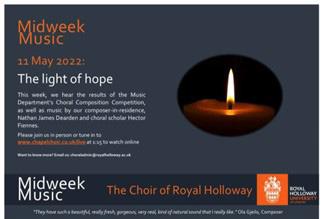
The audience was treated to an evening of outstanding performances by many talented instrumentalists across all age ranges. There were a combination of brilliant individual performances and ensembles. The evening began with the Summer Strings playing ‘James Bond’ and ended with the Improvisation Ensemble performing ‘Acercate Mas’ by Osvaldo Farres. In between, among other excellent pieces, Eva Wyld sang ‘Ave Maria’, Kaustubh Malviya played ‘Always With Me, Always With You’ on the electric guitar and Matilda Bates performed exquisitely ‘Violin Concerto Op. 26 in G Minor Second Movement.’ It was a particularly happy occasion for our musicians to be performing so expressively for a live audience. We would like to thank Mr Blew, Mrs Watkins, Mr Price and the peripatetic teachers for their support of our musicians, as well as the PA for providing refreshments for performers and audience alike.
Our Wakeham Choristers played their part singing in a Service of Thanksgiving for Her Majesty the Queen in the Presence of HRH The Princess Royal Grand Master
Joshua Mead passed his Grade 6 examination with Distinction in Guitar.
Yash Joshi passed his Grade 4 Guitar examination with Distinction.
Nathan Inwang achieved a Distinction in Grade 5 Piano examination and a Merit in Grade 5 Bassoon.
Ankit Gaekwad achieved a Merit in his Grade 4 Piano practical examination.
Samuel Marshall achieved a Distinction in his Grade 5 Double Bass examination.
Remy Tanna achieved a Distinction in his Grade 4 Drum examination.
Armand Healy achieved a Distinction in his Grade 7 Piano examination.
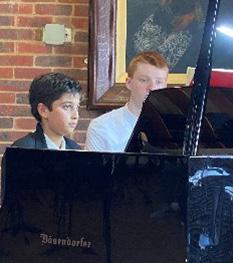
James Saldanha achieved a Distinction in his Grade 3 Electronic Keyboard examination.
Kaustubh Malviya achieved 85/100 in his Grade 8 Rock and Electric Guitar examination.
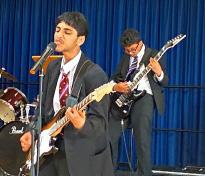
Siddharth Mishra won 1st place in the Maidstone Music Festival.
Kirthi Murali Krishnan Mani obtained a merit in his Grade 4 Violin examination.
Mark Ludden obtained a merit in his Grade 7 Violin examination.
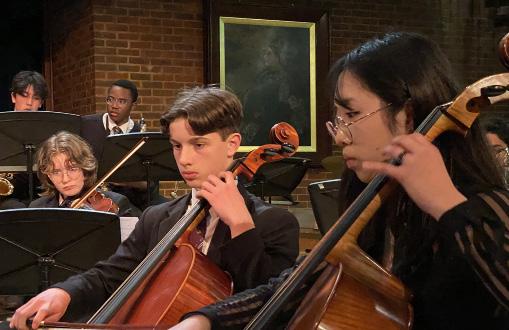
William Rowe achieved a Merit in his Grade 7 Piano examination and a Distinction in Grade 8 Drums examination
Sean Lee achieved a Distinction in his Grade 7 Horn examination.
Sam Lee achieved a Distinction in his Grade 4 trombone examination.
Devaansh Lulla achieved a Merit in his Grade 3 Piano examination.
Aditya Singh secured a Merit in his Grade 1 Piano Examination
Arjun Singh achieved a Merit for his Music performance in Classical Guitar Grade 5 examination.
Samuel Marshall secured a Merit in his Grade 4 Bass Guitar Examination.
Rishi Nandakumar passed his Grade 4 ABRSM examination in Piano.
Ashvik Dubey achieved a Merit in his Grade 5 ABRSM examination in Violin.
Neal Ye achieved a Distinction in his Grade 8 practical examination in Piano.
Francis Ikenye passed his Grade 6 ABRSM Violin Exam with a Merit.
Abhinav Nayak. achieved a Merit in his Grade 7 Piano examination.
Thomas Sears achieved Grade 5 in Piano Performance.
Qusay Dekkoun achieved Grade 3 in Piano Performance.
Mikhail Sumygin achieved a Merit in his Grade 7 Piano Performance.
Shaurya Shukla achieved a Pass in his Grade 4 Piano.
Darragh Keane achieved a Pass in Grade 6 Piano.
Thomas Blew achieved a Merit in Grade 6 Theory of Music
ABRSM
The School hosted two examiners from ABRSM recently and 35 candidates (some from outside St. Olave’s), who are taught by our peripatetic teachers, took examinations. There were some outstanding results from our students, including:
James Perry Grade 8 Organ Merit
Benjamin Dakshy Grade 8 Saxophone Merit
Thomas Blew Grade 6 Organ Distinction and Grade 7 Piano Distinction
Eva Wyld Grade 7 Singing Distinction
Christina Dales Grade 7 Saxophone Pass
Elliott Maurel Grade 5 Piano Pass
Kyle Firth Grade 5 Piano Merit
Hugo Maxwell Grade 4 Piano Merit
Arjun Jadhav Grade 4 Piano Pass
Noah Margolies Grade 3 Violin Merit
Rohan Pandit Grade 3 Violin Merit
Leon Kosaka Grade 3 Piano Merit
Tharmesh Premkumar Grade 2 Singing Distinction
Dhruv Bhatia Grade 2 Jazz Piano Pass
Ela Tekan ARSM Diploma Piano Pass
James Stoner Grade 4 examination ABRSM Piano Merit
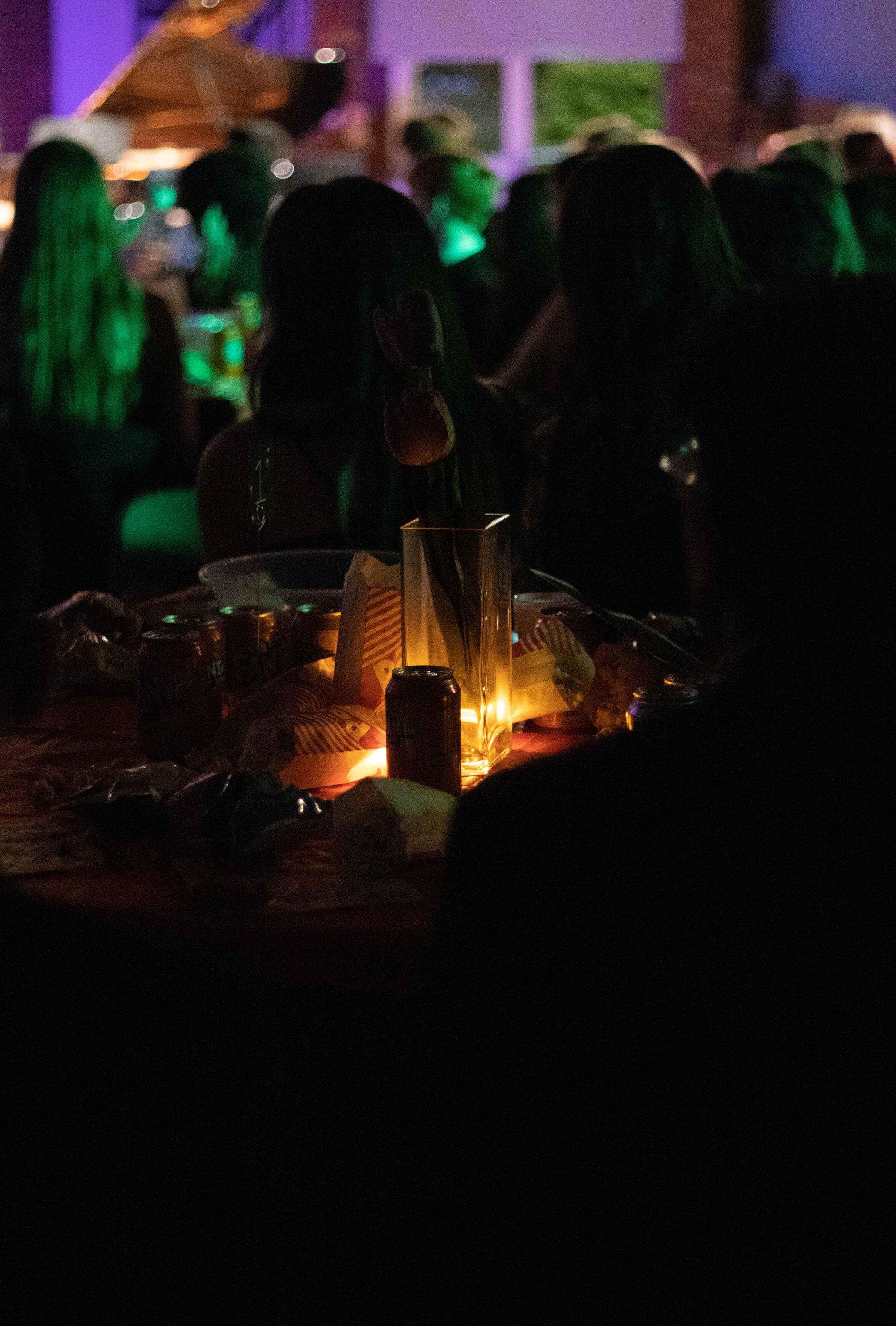


September 2021 marked the start of a muchanticipated academic year, full of promise of a return to normal, particularly as we finally returned to our own language classrooms which were in need of some tlc. We welcomed the advent of interactive whiteboards in our MFL classrooms, enabling us to be more adventurous in our lessons and provided a much more desirable quality of sound and picture. It was a very prolific year in terms of travelling abroad again, albeit for a number of constraints due to COVID regulations and Brexit, with events taking place at least once monthly.

A new academic year always starts with a bang in Modern Languages with the very popular European Day of Languages on 26 September, during which more cakes were baked and sold than ever before. As early as October 2021, the Year 12 and 13 attended their first film at the Cinéma Lumière called ‘Léon Morin Prêtre’ with one of the most iconic actors of the New Wave: Jean-Paul Belmondo. This was followed by a webinar presented to students by a Lead BFI free-lance teacher regarding one aspect of the film studied for AS and A level: namely the theme of Realism and Nostalgia in ‘Au Revoir les Enfants’. Soon after and as we were allowed to touch paper again after COVID, preparation was under way for the first pen pal scheme, from Year 7 to Year 10 classes with our partner school: L’Institution de la Croix Blanche in Northern France. This exchange of letters was a great success, encouraging students to write purposefully throughout the year to their peers on the other side of the Channel and the excitement was palpable whenever classes received answers. It was all the more useful for our Year 9 classes as some took part subsequently in the Year 9 French exchange, in May 2022. Congratulations to our two prefects: Shruti won a place to read French and ab-initio Russian at St John’s College Cambridge while Griffin won a place at UCL. As soon as the New Year started, despite still wearing masks early in February, some of our Year 12 French students braved the huge challenge of debating in French in the regional first heat of the French Debating Competition or ‘Joutes Oratoires’, which took place at St Paul’s Girls School. Despite a fair fight against welltrained competitors from private schools, neither of the teams went through to the next round but one soonto-be Head Boy and one soon-to-be Language Prefect took part in this experience and acquitted themselves with honour.
During February Half-Term, Mr Carroll, Nathalie Komuves and myself took one of the first trips abroad since 2019, having seen many changes of safety measures
at home and in France towards COVID in the course of January. The traditional trip to Paris finally took place and enabled Sixth Formers to test their skills in the City of Light: most appropriately, we saw the Eiffel Tower illuminated at night from a boat on the Seine. March saw the return of the ‘Semaine de la Francophonie’ where Year 7 students enjoyed a project on Asterix, including an Asterix- themed escape room. Year 8s watched a French Anime, Year 9 students did a research project on French-speaking countries and Year 10 students did groups presentations of different films. The Onatti Theatre Company performed two French plays in school: one for KS3 and one for KS4 classes, offering a different approach to teaching and learning and comforting our students in the belief that they can understand more than they think. Year 9 students were luckier than their predecessors in that they were offered the opportunity to take part in a language exchange once again during May Half-Term with our partner school. We were all made extremely welcome for a whole week during which our Olavians stayed with their host families longer than usual, as our stay coincided with a Bank holiday. The return leg of the exchange took place in June when the French party made the most of our proximity with London and even attended a performance of ‘Wicked’ among many other visits. For once, despite France’s reputation for strikes, the exchange party’s return journey nearly forced us to use the school minibuses to avoid the danger of them not being able to catch their return Eurostar train, due to a railway strike on our side! While Year 7 students would normally have spent a day in Boulogne just before May Half-Term, due to COVID regulations and restrictions on school parties to Calais by Eurotunnel, Mrs Napier organised a bi-lingual visit to London Zoo. Their visit resulted in a very original and ambitious production of publicity pamphlets from this cohort, in French or German. The academic year ended with the well-established yearly stay in Normandy at the Chateau de la Baudonnière for our Year 10 who studied French. This trip had been transferred to last summer from 2019 and included a magnificent revelation of St Michael’s Mount, a local bell foundry visit and the Bayeux Tapestry among other things.
It is with eagerness that the French Department is looking forward to continuing our challenging, enriching and engaging events and visits.
Isabelle Saunders Head of FrenchYear 12 and 13 French students attended a one-hour webinar, organised by the BFI Southbank, given by Muriel Huet, a freelance French teacher who has delivered talks live at the BFI, in the past, on similar aspects of French cinema. The webinar was supported by a worksheet to complete through the interactive presentation. The themes of realism and nostalgia in French cinema were exemplified through extracts and analysis of four key films, including the film which is studied to A level: ‘Au revoir les enfants’. Students were able to understand better how to analyse a film from camera angles to the use of scenarios through characteristics of the cinema of the French New Wave. The hour was packed with information and very beneficial to anyone preparing for the A level.
KS4 students who opted for French at GCSE enjoyed a play delivered entirely in the target language and centred on the eternal issue of misunderstandings between generations. It was fun and relevant to the audience because of its many similarities to our students’ life. Hélène does not get what she wants for her birthday and wishes for better presents, better family, in fact better everything! When her wishes start to come true she regrets being so greedy and misses normality. The play
While these topics would not be easy to debate in English, they are certainly not easy in French, the competitors’ first foreign language, in front of very well-rehearsed opponents. They must be congratulated for their preparation and very apt debating ability. They certainly held their own and are looking forward to competing again next year.
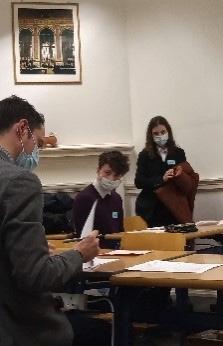
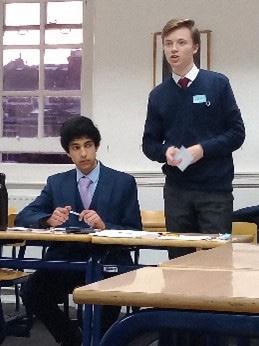
Linguists in Year 12 (studying French, German, or Latin), as well as a few enthusiastic Year 13s who wanted another chance at the Olympiad, took part in the prestigious competition. Well done to all students for participating. Particular congratulations go to: Joseph Davies (Year 12), Lisa Delaney (Year 13), and Viraj Seelam (Year 13) for achieving Bronze; and to Wren Welfare and Kiran Pearce (Year 13), and Nathan Choy (Year 12) for achieving Silver.
was performed by two native French actors. Students were able to follow the story and pick up on the humour, therefore boosting their confidence in the subject.
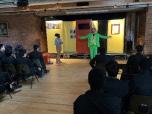
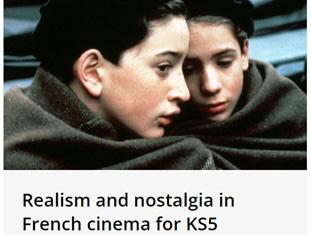
Many congratulations go to the following Year 12 students for their linguistic talent and courage: Kalina Stoyanova, Franklin Baron, Teodor Wator and Rohan Selva-Radov. The French Department sent two teams of Year 12 competitors to St Paul’s Girls’ School in February to take part in the regional qualifying rounds. Teodor Wator and Rohan Selva-Radov competed against teams from Queen Elizabeth‘s School, St Paul’s Girls’ School and Old Palace. Kalina Stoyanova and Franklin Baron competed against Sevenoaks, St Paul’s Girls’ School and Channing. They debated either for or against the following three motions: The world-wide success of Korean Pop music does more harm than good; A republic with an elected president is more desirable than a parliamentary monarchy; We have a moral obligation to renounce all food products which contribute to global warming.
After two years of uncertainty, 10 Sixth Form students accompanied by Ms Komuves, Mr Carroll and Mrs Saunders left St Pancras Station bright and early, bound for Paris. The group stayed in a central Youth Hostel, within walking distance of Notre-Dame Cathedral. Over the course of their stay, they walked to the Paris Town Hall, La Conciergerie, visited Sainte-Chapelle and saw the famous cafés of the Left Bank. They used the funicular to go up Montmartre and Place du Tertre and took the metro to the Arc de Triomphe, after which they had free time on the Champs-Élysées. Students toured the Palace of Versailles and took part in an artistic treasure hunt among the Impressionist masterpieces of the Musée d’Orsay. In addition, they all enjoyed an evening cruise on the Seine from the sparkling Eiffel Tower to the Ile Saint-Louis and back and had two very different culinary experiences: one in the Jewish district of Paris and one at Chartier, an iconic 19th Century popular Parisian restaurant.
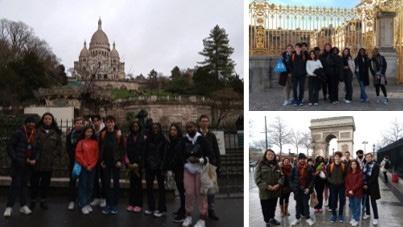
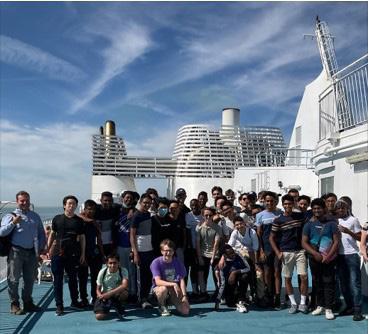
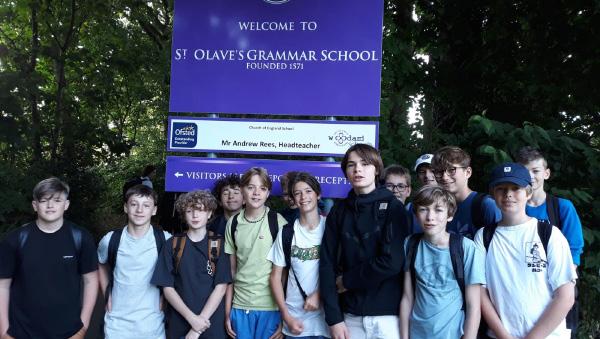
staff. Every morning started with a breakfast of croissants or pains au chocolat, baguette and cereals. Students had a guided visit of the nationally famous bell foundry where bells have been handcrafted and melted since the Middle-Ages.
During Activity Week 1, 14 Year 9 students who opted for French at GCSE, took part in the language exchange which started in 2014 with our partner school: the Institution de la Croix Blanche. The students met the French host families at Lille-Europe Eurostar Station, and on Monday morning they had a guided tour of the school and enjoyed a breakfast reception in their honour. The group went to Dunkerque where unfortunately they were unable to learn the art of sand-yachting, for lack of wind. They visited the Operation Dynamo museum, followed by La Coupole, and learnt about the occupation of Northern France during WW2. On Tuesday, the students attended their partner’s lessons all day as well as Wednesday morning when they were able to take part in the traditional commemorative cross-country race on the school grounds where several of our students arrived among the first. The rest of the week was spent with host families, as Ascension Thursday is a Bank Holiday in France. This meant that contact with the French language was maximised and some participants were driven to Paris, Bruges, on the Northern coast, treetrekking and a theme park outside Ypres. On Sunday, the French parents had organised a laser party game at lunchtime in order to enable the majority of French and English participants to mix one last time before departing on Sunday afternoon. The French host families praised our students for their adaptability and willingness to integrate while our students all thoroughly enjoyed the experience and said that they had gained confidence in their listening and speaking skills.
The reciprocal visit took place in June where the French students arrived with their two teachers at St Pancras International Station. The group travelled to London to see The Tower of London and The Crown Jewels. They spent the weekend enjoying activities organised for them by their host families where they had ample opportunities to practise their English. On Monday, the French students visited Trafalgar Square, Downing Street, Buckingham Palace and had a picnic lunch in St James’ Park.
Year 10 students arrived at the Chateau de la Baudonnière. It is surrounded by woodland and vast grounds where workshops such as aeroball, archery, orienteering and bread-making took place led by French-speaking on-site
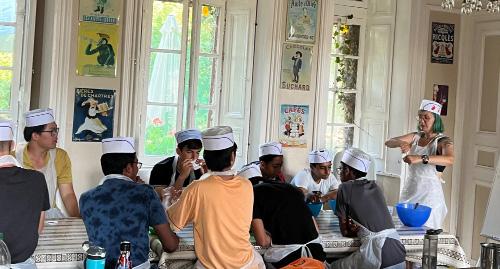

Our students went around a market before having their picnic back at the Chateau. The group also visited St Michael’s Mount Bay, sampled a barbecue on their last night, visiting the Bayeux Tapestry Museum on their journey home. Each activity was conducted in French and some students had the pleasure of tasting snails as part of the trip!
To celebrate this annual event, the French Department organised quizzes, competitions, special exhibitions, talks and dictation competitions, which led to different activities being organised during our French classes. 7B and 7L were asked to compete in small groups of four to free Obelix from the Escape room in which he was locked using puzzles on language learnt so far, including a mathematical element.
Year 9 classes did research on a francophone country of their choice and produced beautifully illustrated pieces of work which we are using for display in the MFL corridor. Year 10 students had been asked to watch a variety of French films and they prepared presentations with Power Point slides which they presented in target language to their peers. They
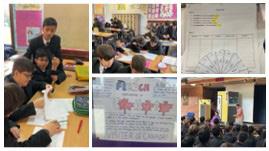
learnt new words in doing so and all enjoyed the films they had been allocated to present. Thank you to Mr Twose, Franklin Baron and Griffin Keemer for organising a House Quiz for the whole school on the theme of francophone countries. Thanks also go to ‘The Pantry’ for offering a French menu and for decorating the counter accordingly to mark the event.

Year 7 and 8 French classes attended a play performed by the Onatti Theatre Company, entitled ‘The world has gone French’, performed in both French and English. This was about an English teenager who, while trying to solve a puzzle map of the world, discovers that everybody he meets only speaks French. By finding the missing countries in the puzzle, which turn out to be French-speaking countries, he realises that French is spoken in more countries than he thought originally. Some students were called to take part and it was a great success with the classes involved.

13 students from the Year 12 and 13 French classes took the opportunity after school to attend a film preceded by a talk delivered by Professor Ginette Vincendeau from King’s College, London on the iconic French New Wave actor: Jean-Paul Belmondo. This was most timely, as the class had spent the previous few weeks discussing French cinema, one of the topics on the syllabus and so convenient, given our proximity to South Kensington and the French district of London. Students discovered the film: ‘Léon Morin Prêtre’ by Jean-Pierre Melville, another prominent figure among the French New Wave directors, as is the director: Louis Malle who figures on the AS curriculum. It had all the characteristics of this 1950s/60s trend but offered an extra philosophical,
historical and social perspective through the exchanges between a young Catholic priest and a communist and atheist young woman under the German Occupation. How satisfying it is to experience at first-hand what is taught in the classroom.

During Activity Week 2 Year 7 took a walk on the wild side by visiting London Zoo. They took a deep dive into rainforests, saw penguins on the beach, a paradise of butterflies and tiger territories to mention just a few of the magnificent animals that nature has to offer. Staff and pupils alike marvelled at the beauty and wonder of the animal kingdom. Whilst exploring, pupils were busily noting down the animals seen and will produce booklets and leaflets to showcase the zoo to French, Spanish and German audiences. The zoo was a magical experience. Thank you to the staff for organising this trip.
saw a return to more or less normality which meant that the German Department was once again able to offer a more substantial calendar of events throughout the year, including international travel. There were a wide range of activities offered to students in order to develop their knowledge of German speaking language and culture beyond the classroom.
We continued our penpal scheme with our partner school, the Intergrierte Gesamtschule Wilhelmshaven. This scheme allows students in Years 7 to 10 to be partnered with a German student. They write letters to each other throughout the year, thus developing both reading and writing skills whilst also developing cultural understanding. Because of relaxations to travel restrictions in Germany, Year 10 were able to visit Wilhelmshaven during Activity Week 2. The students spent the afternoon with students from IGS as well as taking part in various excursions and visits, such as to the city of Bremen, where they visited the old city and the Universum Science Museum. Not only was the trip an excellent chance to experience German culture first hand, it also meant that we avoided the fierce heat being experienced in the UK at the time.
We were also able to restart our annual trip to Berlin. A group of Year 13 students visited the German capital with Frau Probodziak and Herr Birtchnell over the February half term, experiencing a broad range of museum and gallery visits. Berlin’s culture and history form part of the A level course so the students were able to extend their understanding in preparation for their exams, whilst also having the opportunity to develop their language skills through the various tours they took part in.
There were visits within the UK, such as to the Goethe Institut in London or the BFI. We also welcomed people to school, be it a senior examiner who spoke to Years 11, 12 and 13 in order to prepare them for their public examinations, or a theatre group which performed a short play entirely in German.
Taking part in competitions is a key element of the German curriculum and 2021-2022 was no exception. Students participated in the Oxford German Olympiad, the Anthea Bell Translation Competition and the University of Sheffield translation competition, with a number of students winning prizes or being commended for their work. One student also won the UK round of the International German Olympiad. This was a fantastic achievement and meant that they went on to the global
competition which took place in the summer holidays in Hamburg.
Our MFL Prefects continue to do excellent work to promote languages in the school. They run a weekly society which sees talks on all manner of linguistic topics taking place. They also help with events such as the European Day of Languages and the preparation of the MFL Journal.
As normality returns, we look forward to developing the provision in German even further and instilling a love of German language and German speaking culture in our students.
Laura Probodziak Head of German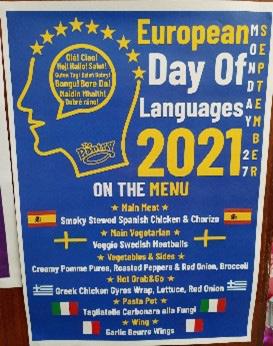
Sixth Form Language Prefects –Frank Shrimpton, Kiran Pearce, Griffin Keemer, and Shruti
Thatikonda – put together a playlist of songs from various European countries and shared this across Teams channels for students to enjoy. There were fantastic, generous contributions to our bake sale, which ran both at break and lunchtime, through which we raised over £362 for Save the Children’s Afghanistan Crisis Appeal. Year 7 were given a ‘Language Secret Agent’ booklet of challenges to complete at home, with prizes and house points for the best completed booklets. There was a Poetry Competition open to all year groups – to submit a short poem (e.g. Limerick or Haiku) in a foreign language, with an English translation and a languages display in the school foyer, featuring various members of the teaching staff and the languages they speak, plus a favourite quote or expression in another language. We are hugely grateful to our catering team, who put together a themed European menu and to everyone in the school community for their support of this event.
Old Olavian, Jasper Maughan, delivered a talk on languages study at Languages Society. Jasper is entering his second year of reading German and Russian at Cambridge University. Jasper was very informative on his

degree, the preparation he did to apply, his background with languages at school, and also speaking generally about applying to Cambridge for various subjects. The talk was well attended with students from a range of year groups from Year 8 through to Year 13.
Montgomery Ward and Agastya Singh in Year 9 were highly commended on their entry to the Oxford German Olympiad, and also commended on their entry to the Anthea Bell Translation Competition. In Year 8, Thomas Howcroft, Vasiullah Shah, Ashvin Aravindan, Om Kuravinakop, Harwin Victor Bharathy, and Arush Upadhye won their category, which featured them drawing a picture of creatures that live in and by the Rhine river, and describing them in German. Similarly, Yifan Luo in Year 7 came runner-up in this category. Also in Year 8, David Wade came runner-up in the category for writing about a day in the life of a prehistoric inhabitant of Lake Constance. Year 7 student, Kethav, won the national category of the Anthea Bell Translation Competition (level 1). The winners of the Oxford German Olympiad were invited to the Prize Giving Ceremony at the Bodleian in Oxford. Well done to all winners and those who participated.
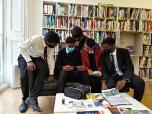
Tony Ndukwu qualified for the final of the ‘International German Olympics’, held in Hamburg in August. Tony had to speak in front of the judges and other contestants about his free time, beliefs, and his personal qualities, and then discuss in a group for 12 minutes what teenagers tend to use social media for, and how that usage changed with the COVID-19 pandemic, as well as presenting his own opinion on this. This was all spontaneous speaking, fully in German. Only Tony and one other student from the UK qualified to go through to the final. Tony was able to go out to Hamburg and stay there in a hotel undertaking not only the final of the competition, but also a full programme of German learning events, all paid for and provided by the Goethe Institut. This is a fantastic achievement and we are extremely proud of Tony for this. Gut gemacht!
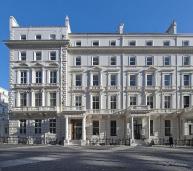
Year 11 students travelled into London to the Goethe Institut to complete an ‘escape room’ - entirely in German! The students worked in groups of five against each other to piece together clues in order to identify the hacker of the Goethe Institut correctly. After lunch, they visited the Natural History Museum where they completed a German-themed quiz. The winners of the escape room and the best quiz team were awarded prizes for their achievements.
Students studying German for GCSE in Years 9 and 10 were fortunate to have the Onatti Theatre Company perform a play, entirely in German, for them. The play was performed by two actors only, who played several parts between them – and spoke only in German. There were engaging interactive elements in the performance, as well as lots of comedy and entertainment. Some audience members even got splashed by a water pistol at one point! It was a very enjoyable experience, and students were able to get a confidence boost by how much language they understood, and they were able to ask lots of questions to the actors at the end.
Year 13 students of German travelled to Berlin with Frau Probodziak and Herr Birtchnell. They had an extremely rich and varied itinerary, featuring visits to museums and historical sites such as the Jewish Museum, the former border crossing point known as ‘The Palace of Tears’,

the beautiful Charlottenburg Castle, and the museum to German Resistance during World War Two. Alongside these historical items, the group visited art galleries and museums, such as the Broehan Museum for an exhibition about famous ‘Dada’ artists, the Hamburger Bahnhof where the group attended a workshop, the German Cinema Museum, and a museum dedicated to Germany’s most famous female artist, Kaethe Kollwitz. For the more scientifically-minded there was also a visit to the vast ‘Technikmuseum’.
The week was also packed with opportunities for
walking through the city and taking in sights like the Brandenburger Gate, the TV tower at Alexanderplatz, the famous East Side Gallery, and the ruined church known as the ‘Gedaechtniskirche’ in the West of the city. There were opportunities for shopping and the chance to try traditional German food, and also to experience Berlin’s multiculturalism through world cuisines. It was a thoroughly enjoyable and enriching experience.
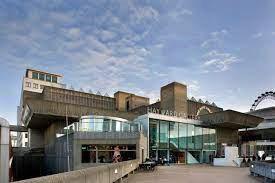
Year 13 Germanists visited the Hayward Gallery at London’s South Bank to see the exhibition of Gerhard Richter’s drawings and more recent paintings. The exhibition featured more than 60 artworks by Richter created over the past two decades – the most recent of which were from earlier this year. The drawings were arranged by media to highlight Richter’s processes and skills. The exhibition included artworks using Richter’s typical ‘over-painted’ photographs process, which were exciting to see ‘in real life’. Richter is one of the most significant contemporary German artists, and has been established as a leading figure in this area for several decades.
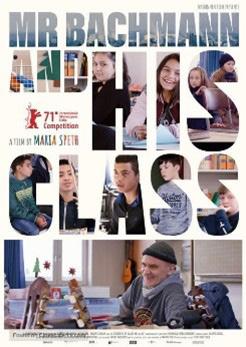
Year 11-13 students of German went with Frau Probodziak to the British Film Institute on London’s South Bank. They watched the new German language film: ‘Mr Bachmann and his Class’, which was being shown as part of the BFI London Film Festival. The film is a heart-warming tale of a teacher on the verge of retirement in Germany, whose class is made up of children from all different backgrounds and walks of life, and many of whom do not speak much German at all. Mr Bachmann works with them to create a sense of community and mutual support, as well as helping the children of refugees and immigrants learn to speak better German. The film won the ‘silver bear’ at the Berlin International Film Festival earlier this year and has been praised as an excellent insight into the current multi-cultural German climate.
50 Year 10 students travelled to the North Sea coast of Germany. This is a less visited part of Germany but
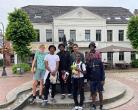
is the home of our partner school, IGS Wilhelmshaven, some of whose students we visited during the week. As part of the visit, students visited the aquarium and the naval museum in Wilhelmshaven. They took a boat trip to the Friesian Islands to see the seals and learn about the biodiversity of the area. They undertook a ‘Wattwanderung’ or a mud flat hike at the unique UNESCO World Heritage Site, learning about the different animals and the geography of the seabed. Finally, they spent the day in Bremen, visiting the city centre (and seeing the famous statue of the City Musicians) and then the Universum Science Museum which was filled with hands-on experiments. The students had a great time experiencing Germany first-hand. They showed high levels of engagement with all the activities as well as taking the opportunity to develop their German language skills. Thank you also to the staff who accompanied the trip.
The German department welcomed Wanda Marshall, an expert in the German GCSE and A-Level examinations with AQA. Mrs Marshall regularly consults on study guides for those exams, working with Hodder Education; is a speaking examiner with AQA for German, and teaches the Edexcel A-Level German course. With over 20 years of teaching experience and leading languages departments, she is highly qualified and can share a wealth of information and advice. Mrs Marshall ran an exams skills session in the morning for Year 11 Germanists, and another exams skills session in the afternoon for the Year 13 German class. Students worked through a booklet of resources and were able to practise exam questions and ask their own questions about the course and exams.
Year 9 German students learnt about German Easter customs, such as Easter-bonfires, ‘Easter trees’, and the intricate decoration of Easter eggs. They also made their own ‘Fensterdekorationen’, or ‘window decorations’ on an Easter theme.
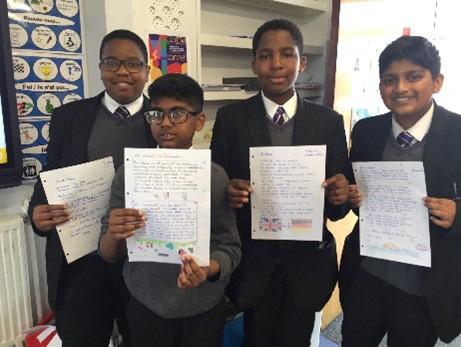
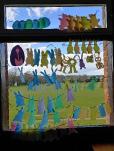
Spanish is proving to be very popular this academic year. There is a real enthusiasm for the language and Hispanic culture. In fact, we are planning trips to Valencia, Madrid and Salamanca in 2023 as travel restrictions ease so preparation is key. Boys want to go and use their new-found Spanish skills.

In class, this year has been about consolidating the learning from years 7 and 8, preparing the boys for their coming GCSE AQA exams in 2024. This has involved talking about football, Latin American music as well as Spanish festivals and Mexican traditions. Fortunately, it has also involved tasting and learning about food; be it a Spanish tortilla or a Mexican tortilla. In fact, some students are already inquiring about doing Spanish A-Levels!
In the autumn term, the Onatti Play about a camping holiday that goes wrong in Spain, gave students a flavour of the dramatic in Spanish. Without the need for dictionaries or Google translate, they understood the jokes and laughed about the hilarious scenes. We will definitely avoid camping on our future residential trips to Spain.
This year for the first time we are setting up a Spanish partner school in Aragón (northern Spain) where students from both schools have now started writing letters to each other. This is the first of many Spanish international initiatives in the offing. The 100th penpal letter was reached quickly within the first month!
Our Spanish partner school IES Piramide which has students from Years 8 to 13 has received the first batch of correspondence. Spanish students are now reading and correcting our students’ Spanish. Dr Pickett will try to match students to their interests as much as possible. Soon we will receive by post the corrected Spanish letters coupled with their respective introductory letters in English.
It is up to our students to reciprocate and correct their English. This interaction is the start of regular correspondence, future voice messaging and zoom meetings between countries. For the time being, we will avoid all social media platforms. It is important students from both countries feel safe and confident.
Martin Pickett Teacher of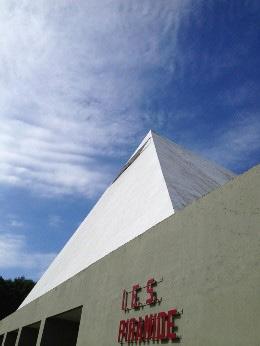
Year 9 students of Spanish were treated to a performance by the Onatti Theatre group entirely in Spanish of ‘en el campamento’, which was all about two friends going camping and the various obstacles they encountered. The performance was very entertaining, featuring music and a full stage set and costumes from the theatre group; and was also interactive, drawing on audience participation using only Spanish to communicate. Year 9 really enjoyed the performance and were pleased that they understood the language even though it was entirely in Spanish with no English support.
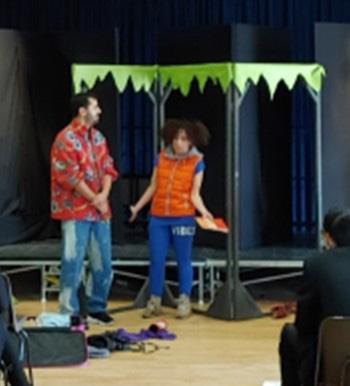
This year we set up a Spanish partner school in Aragón (northern Spain), the first of many Spanish international initiatives in the offing. Our Spanish partner school, IES Piramide, which has students from Years 8 to 13, has received the first batch of correspondence. The Spanish students are now reading and correcting our students’ Spanish and Dr Pickett has matched students to their interests as much as possible. This interaction is the start of regular correspondence, future voice messaging and Zoom meetings between countries. In the next academic year, our plan is to organise a special school trip to Spain which will involve an immersion programme at a language centre in Spain. These initiatives are ideal for Olavians to use real Spanish in authentic contexts and excellent preparation for GCSEs as well as A levels in the future. Not only are they educational they also are fun…¡Viva la vida!
On 28 September, the Year 10 Spanish class visited the Royal Society of Chemistry for their Epistemic Insight project.
The purpose of our visit was to learn about epidemic insight and share our ideas to professional scientists about linguistics in driverless cars. Some wouldn’t realise the importance of languages in the world of technology but on further thought it became more evident to us.
Picture a self driving car, no need for a steering wheel, almost self-aware. Although a peculiar idea, it could become prevalent across the world in a number of years.
Five out of the nine students who attended learnt about the Epidemic 9 project, which showed us the fact that there is no subject/topic or problem where only one discipline is required to understand or solve it. Let’s say you need to solve the problem of an asteroid hitting Earth. You would not just need astronomy - you would need Chemistry to find the composition of the asteroid and the elements present in it, as well maths to calculate how much area the landing affected and geography to see how the land will be affected by the landing. The other four Olavians delivered the presentation in front of numerous cameras (for later viewing) and a room of university students. It was evident from the number of questions asked that we had successfully delivered our message, that linguistics were a key feature where moving into the future is concerned.
Although we were out of our comfort zone in such a prestigious building, we both shared a useful insight into the world of linguistics, and gained knowledge about epidemic insight that can forever be utilised into everyday life. This meant that the trip was an overall fascinating and unique experience.
Written by Monty Ward and Aabhas GuptaHispanists of Year 10 enjoyed a unique opportunity to
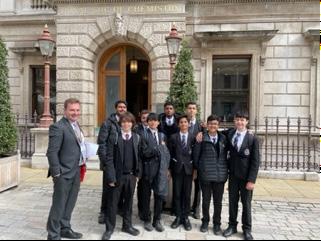
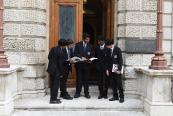
discuss their ideas on designing driverless cars with UK and US academics at the Royal Society of Chemistry. Scientists and other students, listed to why there is a need for students to discuss real-life linguistic problems.

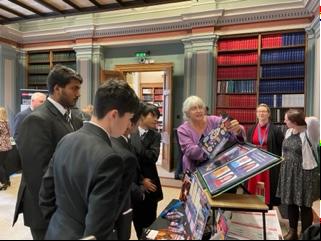
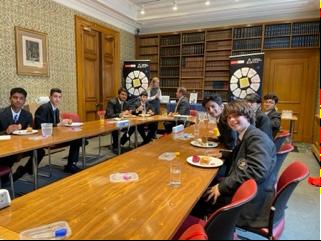
Olavians showed how machines will interact with humans leading to language and cultural problems. They prepared a presentation on the subject to show how non-English speakers will have problems.
Scientists and engineers will create the technology, the software, coding and data needed to work in the physical world. Nevertheless, are we going to give all instructions to the car in English? Imagine the US user - on a UK holiday - commanding their car to “go on the pavement”. How unsafe could this be for those unlucky pedestrians on the sidewalk (UK pavement)!
A linguist would instantly inform the engineer that words can have different and contradictory meanings, even in the same language. Indeed, is it reasonable to expect that all the world must understand and command their new cars in English, especially when there are so many Spanish speakers in the US?
Our hypothesis is that students have not before considered the way that two different disciplines can shine different lights onto the same question – a key tenet in Epistemic Insight. For some learning a language is considered a talent, a gift, an inherited skill, even a luxury to speak. At first glance, scientists and engineers may not see the link or the advantage of having a multilingual communicator on their team. Nevertheless, they will avoid elementary mistakes by listening to an MFL communicator. In fact, business investors may save money by employing the linguist to anticipate communication problems in different cultures. Thinking and working in a different language brings real tangible benefits.



Theyear 2021-22 proved to a very successful one for all the departments within the Humanities Faculty. Ken Brown joined the Faculty and alongside its stalwarts, the quality of teaching only continued to improve and all pupils achieved excellent results in public examinations. The faculty continues to work actively to challenge students and promote scholarship; the societies run by its pupils have produced a range of thought-provoking publications and have featured many excellent presentations! The Faculty appreciated the return to normality in the post-COVID era which brought with it the opportunity to run a host of trips again. The faculty bade a fond farewell to Jennifer Clift (at Christmas), William Haines and Andrew Sykes (both July) as they departed St. Olave’s to pastures new. While they are all much missed by students and staff alike the Faculty will only continue to thrive in the new academic year.
Daniel Espejo S___Head of History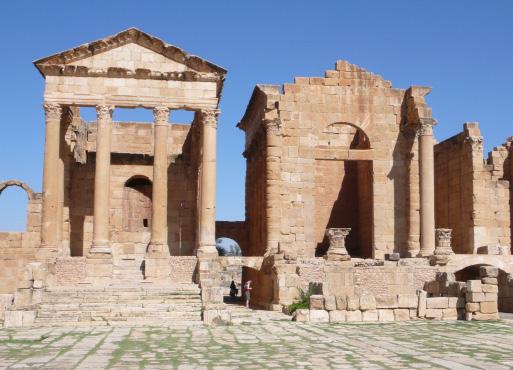
The department bid a fond farewell in December 2021 to Jennifer Clift who did so much to promote History across the school. She contributed as a teacher and leader (both academically and pastorally) in her seven years at St. Olave’s and provided the impetus for many innovations within the department. She moved on to work at the Department for Education and at the time of writing has served five different Education Secretary’s in ten months! 2021-22 saw the department return to the World War 1 battlefields around Ypres and the Somme for the first time in three years as Year 8 were able to experience the trench warfare which dominated the western front between 1914-18. While the First World War provided a focus for the year, Year 8 were also able to enjoy a day trip to the historic dockyards at Chatham which included the opportunity to explore a Cold War era submarine! The department has been enhanced by the addition of Hannah Scholefield to its fold. She has brought enthusiasm and a range of exciting new teaching ideas. 2021-22 was an action packed year for the History department, 2022-23 promises to match or even exceed it!
Year 8 set out for an informative and thought-provoking exploration of the WW1 Battlefields at Ypres and the Somme in Belgium and Northern France during AW2. The time spent in the cemeteries and trenches was an eye opener as it brought the history they had learnt from textbooks into the brutal reality that was the ‘Great War’, enabling them to see things from a soldier’s point of view rather than that of an historian. Most enlightening was seeing and feeling the trenches of the German front line and how the grey solidarity of the gravestones brought ‘alive’ the terrible cost of the war. The boys visited Newfoundland Park, stood on top of Hawthorn Ridge in the Somme and paid their respects to School Captain, JT Jones, and Old Olavian ‘Jimmie’ Ruggles who is buried at Pozières.
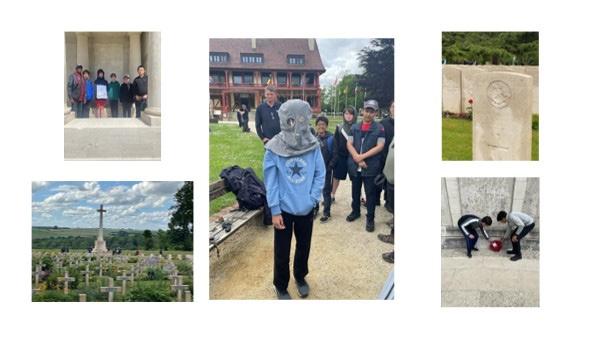 Daniel Espejo Head of History
Daniel Espejo Head of History

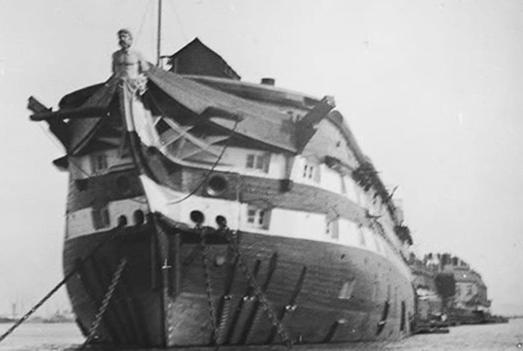
Taking the DLR out from Lewisham, where I grew up, you pass through Deptford Bridge station towards Greenwich. Here my father would point out to me the Deptford pumping station down below; what he would describe to be ‘the most important building in South East London’. In this pumping station, a famous engineer called Bazalgette cleaned London’s water. In so doing, he rid the city of cholera, and began the movement towards public sanitation and a local and state responsibility for the health of the people. For several years I would regularly volunteer with the sailing charity, the AHOY centre, from the wharves of Deptford, where River Ravensbourne flows into the Thames. There were days when we found ourselves unable to sail due to the immense smell and danger of the river, when raw sewage would still be pumped directly into it. It happens when it rains heavily, to stop the existing Victorian sewage systems in the surrounding houses overflowing. This was my first personal experience of what once overwhelmed London, known as the “Great Stink”. Every single cesspit, all sewage waste and industrial debris flowed into the Thames throughout the 19th Century. The heaving mass of London’s population turned the great river into an effluent morass. The river was described by the Prime Minister, Disraeli, as being a ‘stygian pool reeking with ineffable and unbearable horror’.
radical building of London’s sewage system. Bazalgette’s scheme, which he commenced in 1858, was described at the time by the Observer newspaper as ‘the most extensive and wonderful work of modern times.’ What Bazalgette built, remains in place. His work consisted of 165 miles of main sewers, over 1100 miles of local sewers, and with the construction using over 13,000 miles of pipeline. By means of these sewers he was able to separate human excrement from London’s drinking water. This was an inspirational leap in public health enterprise. The sewage was pumped from Deptford downriver to Crossness, where a breath-taking and elaborate pumping station was built. The romantic and palatial architecture of ironwork and ceramics truly reflects the astonishing breadth of Bazalgette and his engineers’ imagination and vision. The irony of this being that it is dealing with sewage. There was a final severe outbreak of cholera in 1866, but by the time the new sewer system had been completed (in 1875), cholera had been cleared from London. One of father Thames’ deadly offspring had been conquered, but the others remained.
This stygian pool was London’s water supply. The population was being poisoned. Stalking the urban streets was an epidemic, and these 1848 and 1854 cholera outbreaks claimed 14,000 lives. Examining the second outbreak, John Snow observed the cases of this disease, and mapped them back to the pump of Broad Street. This pump was being fed directly from the Thames; Snow had exposed the source of London’s cholera. The people needed clean water. However, the Great Stink was infecting London with more than just cholera. A famous cartoon from 1858 was entitled: ‘Father Thames introducing his offspring to the fair city of London’. Rising from the river are three images of children in the grip of a deadly horror: Cholera, Scrofula (Tuberculosis), and Diphtheria. The stink led to action, in the form of the
Father Thames had not only spawned the monstrous children (Cholera, Tuberculosis and Diphtheria), but on the river banks stalked another horror: Jack the Ripper. An editorial in the Daily Telegraph in 1888 found a voice for the female victims: ‘With ear of imagination, the Metropolitan Board of Works might have heard the murmuring: “We, your, murdered sisters, are what the dreadful homes where we live have made us… You leave our wild beast layers unchanged and uncleansed. The slums kill us, body and soul, with filth and shame and spread fever and death… when it is possible for the poor of London to live and sleep in decency you will not pick up from backyards so many corpses like mine.”’ Reluctantly and slowly change was underway. The Sanitary Act of 1866 forced local authorities to provide sanitary inspection. The 1867 Metropolitan Poor Act established the Asylums Board to deal with illnesses endemic to London. The 1875 Public Health Act reinforced the work of the Metropolitan Board of Works, giving them teeth. These new institutions would
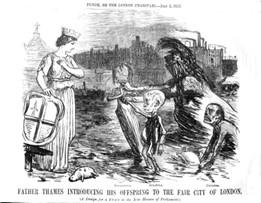
not only be in charge of treating the sick, but solving the root of diseases: atrocious living standards and slum housing. This Board was forced to respond quickly following a smallpox epidemic in 1881. Two old hulks of warships were converted into isolated hospital ships, and moored off Deptford creek. Delirious smallpox patients frequently threw themselves overboard. The Thames was once again a vision of hell. Two years later, once the outbreak was under control, the hospital hulks were moved 15 miles downstream. Sickness and suffering were also fuelled by fear; nobody wanted these fever hospitals anywhere near them.
hygiene, Joseph Lister’s work on antiseptics, and Koch’s discovery of the bacteria causing Anthrax, Septicaemia, TB, and cholera; cross contamination in hospitals was extremely rare. Fevers were isolated and treated in separated hospitals. In Hither Green, the Park Fever Hospital dealt with Diphtheria and Scarlet Fever (both of which were particularly devastating to children). Within the limitations of medical knowledge at the time, this hospital was at the cutting edge.
Within sight of my home in Hither Green, looms a towering and unusual building. The most significant remnant of what, in 1896, was the largest fever hospital in the country. The tower extracted water from the chalk aquifers (the beds of which run deep under Hither Green and out beneath my school in Orpington). It is a monument to clean water and its position at the heart of the Park Hospital is significant: pivotal to curing infectious diseases. In 1896, this Park Fever hospital was built away from habitation, on the outskirts of Lewisham, over rolling green fields. There were colossal local objections to its establishment, from fear of infection and being ruinous to development. However, these fears were not brought about by ignorance, rather the opposite. New information and research informed the population of the need to not only treat the sick, but to isolate them from others (to prevent the spread of disease). Whilst watching a staged production of Middlemarch that my mother appeared in (at the Orange Tree Theatre), I noticed its relevance to my local area. In this novel, written by George Eliot and published in 1871, a radical doctor (Lydgate) aspires to set up a fever hospital for ‘fever in all its forms’. He faced an immediate refusal from every medical man in town to be involved with it and there was great resistance in the community. ‘Fever in all its forms’ would have killed almost all its patients through cross-infection. Simultaneously to the writing of this novel, a physician and fever expert, called Murchison, wrote: ‘it would be better to have no hospitals at all than to mix cases of Typhus, Smallpox, and Scarlet Fever with patients suffering from other diseases.’ By the time the Park Hospital opened in 1896, scientific discoveries and advances had bounded ahead. Thanks to Florence Nightingale’s advances in hospital
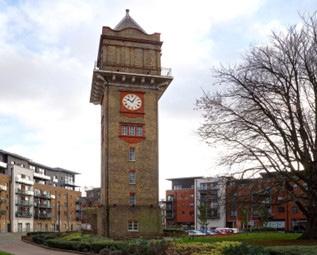
Most ground-breaking of all, the treatment within these hospitals was absolutely free of charge.
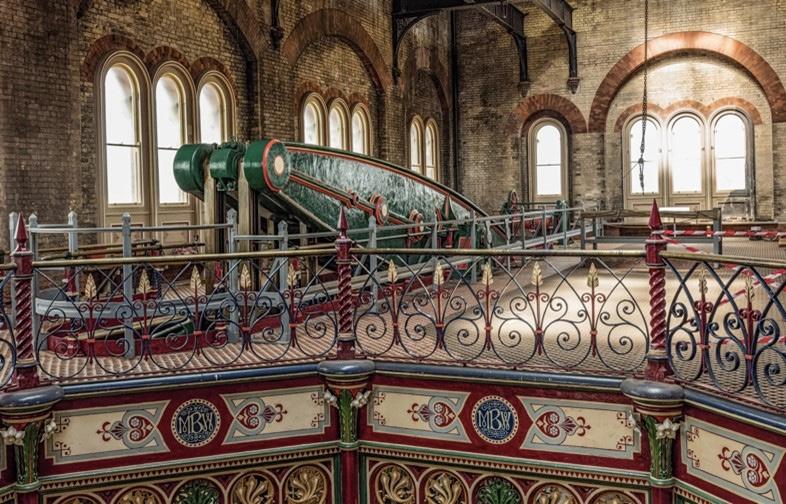
From the outside, the hospital’s tall towers and regimented blocks of wards create a gloomy and forbidding atmosphere. Within high walls and gated entrances (which still remain), lay 18 two story pavilions, with 24 other buildings for offices and staff across 20 acres of land. The original plan divided the pavilions into separate barracks for Scarlet Fever, Diphtheria, and isolation wards. Despite the brutish and intimidating outside, life within the wards was airy, warm and clean. An unquestionable improvement on the dingy tenements from which most of the patients came. The architect, Edwin T Hall, tried to create (in his own words):
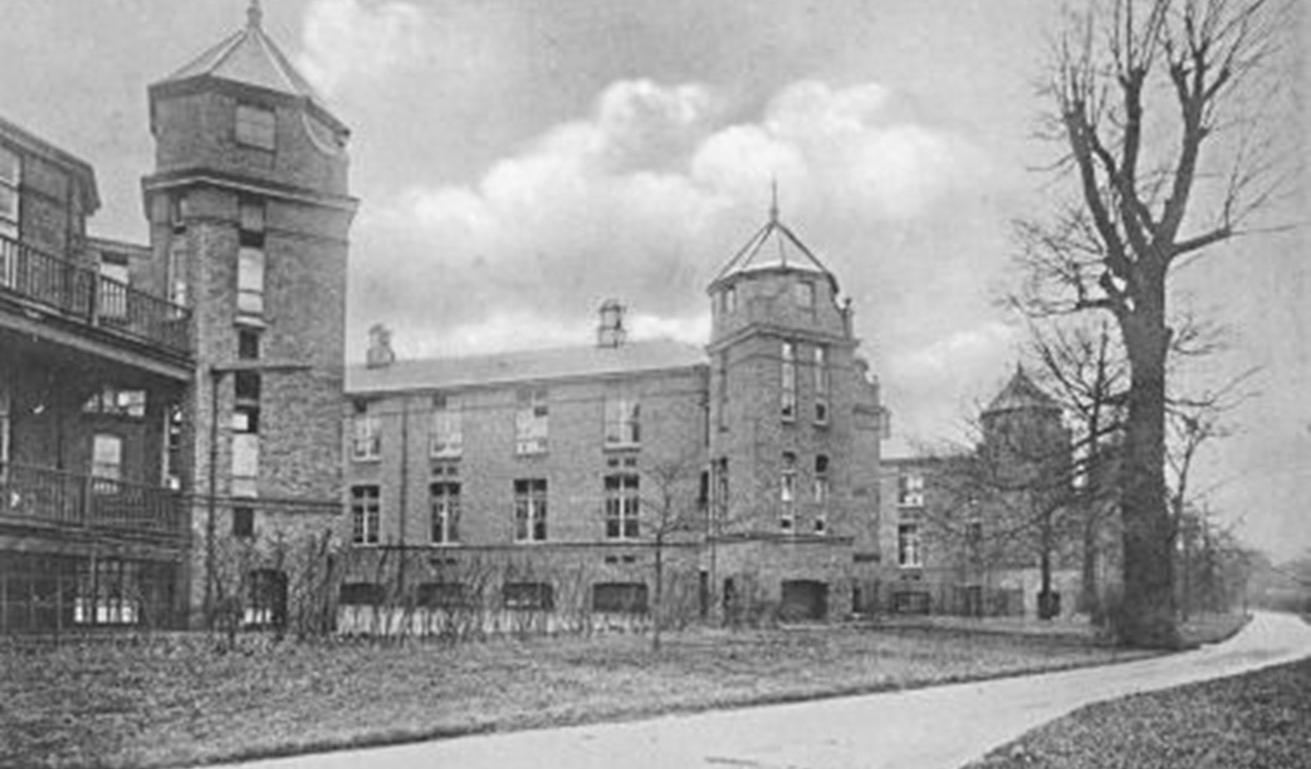

‘quiet repose, dignity with pleasant detail’. This was an institutional building, but it had sufficient architectural detail to soften the brutality. The first superintendent of the hospital, Dr Birdwood, certainly had an impact beyond that of medicine. He planted trees. A different tree for each ward, according to its code letter: Cherry, C ward, Damson, D ward, Hornbeam, H ward and Meddler, Quince, Tree of Heaven, Tulip tree, Indian bean and Snowy Mephistopheles. The patients could recuperate within an arboretum. Many of these trees still stand alongside the Dutch gables and mixed coloured bricks. These pleasant aspects of the design reveal a once progressive attempt to make the hospital appear welcoming. Although utilitarian in design, these were more than just barracks for the impoverished sick. It was a start to destigmatising help for the undeserving poor. Within these walls the seeds of the National Health Service were being sewn, and a healthy shift in attitudes towards the poor was underway.
rents were offered in many cases for poorer people. At the beginning of the 20th Century, Corbett represented an unusual mixture of philanthropy and capitalism, a genuine attempt to help slum clearance. Cleverly he bribed the station constructors (loaning them £3400) to erect a second entrance reached by steps, leading directly to the Corbett estates. At the same time, he negotiated 10 years of reduced season tickets for inhabitants of the estate (with £2 off first class and £1.10 off second class). Corbett’s dream persists. Everyday, alongside hundreds of other residents, I travel from my Corbett home to the station, climbing the steps he put in place, on my daily commute to school.
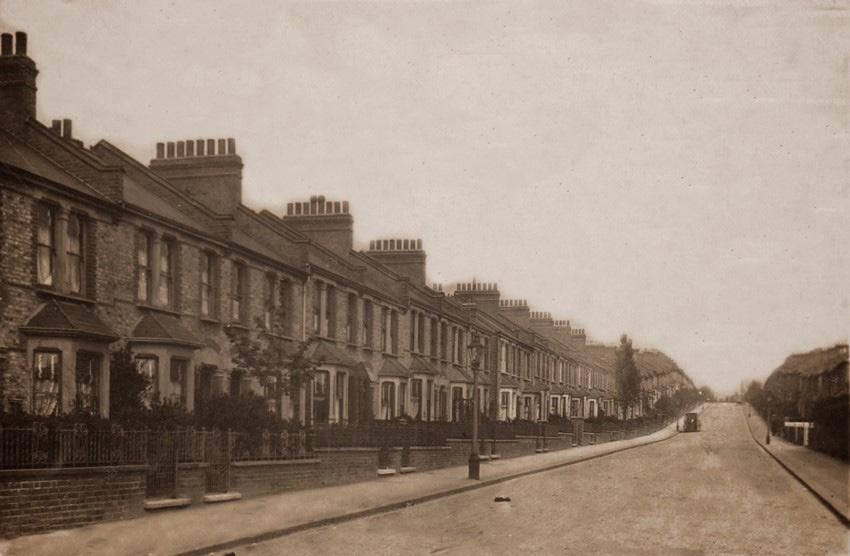
Hither Green became a colossal building site, intruding for miles into formerly quiet rural fields. Developers had overcome their fears of the Fever Hospital. A new station was built in 1895 across the main line, coming out from the centre of London. Nurses, porters, and doctors could travel to work by train. A huge new opportunity now opened up for working class people to be able to live close to country air and commute into the city. In the same area where infection was being confronted, an alternative to slum conditions was to be offered. Vast quantities of land in Hither Green were bought by the developer and philanthropist, Archibald Cameron Corbett. He wanted to build affordable homes, an alternative to poor living standards in working class tenements, with the aim of offering healthy living conditions in a community. Surrounding the Fever Hospital, almost all houses were built facing North to South so each large garden would receive the most sunlight throughout the day. A Temperance fanatic, he insisted on covenants that no alcohol be sold within his estate; legislation that was only overturned in 2003. The Corbett homes featured a social gradation in sizing and price: the further a house was from the station, the more affordable. He wanted working people to be able to afford the purchase and rent price of his homes and fixed them accordingly. Assisted
The Park Fever hospital was successful. By 1910, fever cases had declined so much that it became a children’s hospital. It catered for the children of the workhouse; a poor law infirmary. By 1914, a renewed epidemic of Scarlet Fever found the Hospital once more isolating fever cases. However, the Spanish Flu pandemic of 1918 was unstoppable, and Fever Hospitals were no protection against it. In the years between the wars, there were steady technical advances in isolation. Beds were at last separated in cubicles, and ward hygiene improved (with increased knowledge of bacteria). Operating within the grounds of the Park Hospital was the Southern Group Laboratory, opened in 1927, by Neville Chamberlain. Ground-breaking research was made into pathogenic diseases (such as Polio and Whooping cough). It was also the site of the first medical photographic unit in the country. During the second-world war, victims of bomb damage had their injuries treated inside the Park Hospital. Most memorable was the horrific attack by two German fighter-bombers on Sandhurst Primary School, in the centre of the Corbett estate. 38 children and 6 teachers were killed, and the school was almost entirely demolished. 61 injured children were taken for treatment to the Park Hospital. Amid the chaos, it took some families more than a week to find out whether their children were alive or dead.
Park Hospital became part of the brand new National Health Service in 1948, during the ‘golden age of antibiotics’. Antibiotics made fever hospitals redundant; the infectious diseases the Park Hospital was established to deal with were now curable with drugs. Father Thames’ offspring were overcome. However, in 1955 it still had to deal with swathes of Polio cases, infecting mostly children, and a hydrotherapy pool was built on the grounds. The 78 injured victims of the 1967 Hither Green train crash were also taken to the Park Hospital. However, by the last few years of the 20th Century, the hospital was quietly wound down. When it finally closed in 1997, only geriatric patients were being treated. Since then, all the wards have been demolished and replaced with blocks of flats. Some of the housing has been sensitively built with a nod to the style of Edwin T Hall.
Standing proudly in the middle remains the great water tower, the symbol of Hither Green. Within its shadow is a Tesco Express, but despite this urbanisation, the tower is still surrounded by trees. The only other memory of what the grounds once held now stand inside the original front gates. The quaint arrivals and discharge cottages now serve as the waiting rooms for a GP health centre.
Twenty years later, Park Fever Hospital could have been a perfect set up to take in COVID patients, to prevent Lewisham hospital being overwhelmed. It is interesting that the immediate response to the pandemic was to build an emergency Fever Hospital (the Nightingale) down near the Thames. Whilst we are healthier and more scientifically knowledgeable, we still find ourselves at the mercy of an infectious disease outbreak. What used to be local responsibility has fallen into central government’s hands. Government scientists and politicians have even been forced into national and international intervention to keep our National Health Service from breaking down. Lockdowns have driven the whole nation into a compulsory social and individual isolation. The present government’s preoccupation with the Public Health of its citizens is an astonishing new role, brought about solely by COVID-19. Such an all-embracing responsibility would have been utterly incomprehensible to Londoners in the 19th century confronting the perils of the “Great Stink”.
Flora Treager - Year 12
Acknowledgements:
‘A Stygian pool’…Disraeli quotation.
From ‘London. The Biography’ by Peter Ackroyd. ‘Waste Matter’ p344 published by Chatto and Windus 2000
Observer quote ‘Most extensive and wonderful work etc’ ditto p344
Daily Telegraph editorial 1888 ‘On the Death of Dark Annie’
Oxford Book of London. Edited Paul Bailey. Published OUP 1995
Murchison quotation: ‘It would be better to have no fever hospitals at all etc’
Royal Soc of Medicine: ‘The Trend of Fever Hospital Practice’ E H R Harries MD MRCP DPH
Park Fever Hospital and Corbett Estate
‘Hither Green: The Forgotten Hamlet’. by Godfrey Smith published 1997 by the author.
Students in Geography this year have continued to explore a variety of places, processes and people from across the globe, helping them to further expand their knowledge and understanding of the world we live in. Current affairs have, as always, featured prominently in Geography lessons, from the Russia-Ukraine conflict to COP-27 and have exemplified the ever-changing nature of the subject. Indeed, Geography is not just about what is written in the textbooks, but what is going on all around us every day. The department has continued to encourage scholarship amongst its students with Geography Society meeting regularly to give talks on all manner of things, from the impact of fishing on the world’s oceans to the evolution of life on the planet. The new room 34 library has been a welcome addition to the department too, with an excellent pool of books for students to read about all aspects of Geography, with titles including ‘Prisoners of Geography’, ‘The Looting Machine’ and ‘The Planet Remade’ to name but a few. It has also been a bumper year for fieldtrips, hopefully marking the end of the COVID-19 pandemics disruption on the practical side of Geography. Students have relished the opportunity to visit Seaford, the Ashdown Forest, Eynsford, Croydon and Orpington to investigate a variety of issues and processes in the real world. Year 8 students were also treated to a brand-new fieldtrip to the Olympic Park in Stratford led by Miss Benham, where they investigated the risk and management of flooding in the area before completing some fast-paced orienteering, making the most of the glorious weather. It has truly been a delight to take so many year groups out of school again after missing out on fieldtrip experiences for so long.
As always, the hard work and dedication of GCSE and A-Level students paid off, with another fabulous set of results. GCSE was a particular highlight, with an astonishing 64% of geographers achieving a grade 9! The students tried their absolute best yet again and the department is very proud of all their achievements, well done!
 Rhiannon Smith S___Head of Geography
Rhiannon Smith S___Head of Geography
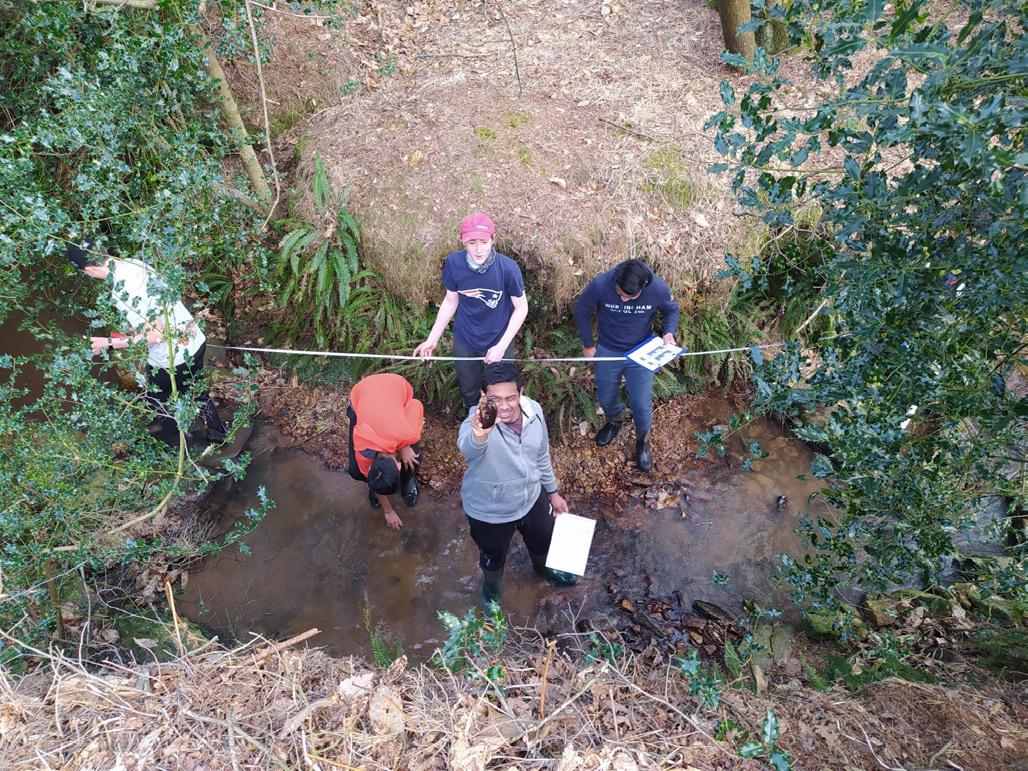
Tharmesh Premkumar and Shaun Abraham were selected to take part in the Eco-Schools National Committee. 22 young people were selected from applications by thousands of 10 – 18 year olds, and it is testament to the talent of our students to have two representatives from St. Olave’s. Tharmesh and Shaun will support the Eco-Schools Team at Keep Britain Tidy as they try to ensure that all those in education have the opportunity to learn about environmental themes such as climate change, pollution and biodiversity loss. They will be working alongside awarding body OCR, Speakers for Schools and children’s author and environmental activist Georgina Stevens to help green the whole curriculum and guide other young people on how to begin a career in the environmental sector.
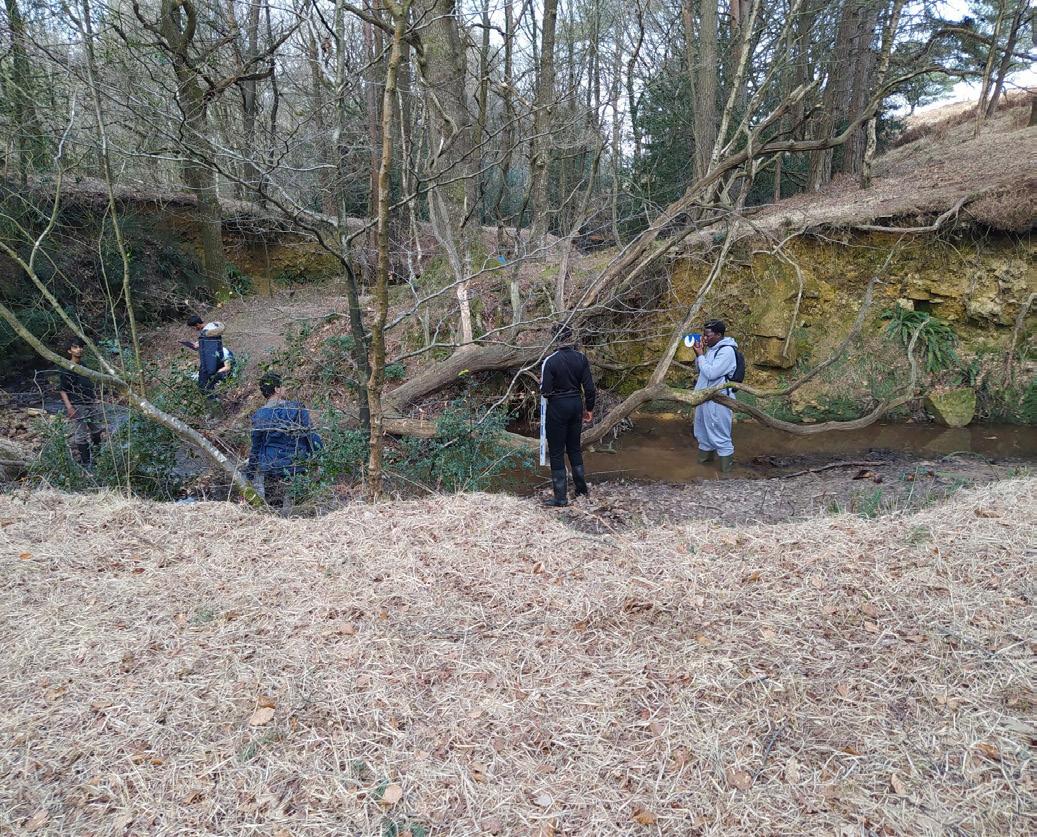
If Ghana and Ivory Coast Outlawed Child Labour, what would happen to the Chocolate Industry?

Over 70 billion chocolate bars are produced every year. However, some believe 100% of these bars can be traced back to child labour, or child slavery. It is undeniable that chocolate is so cheap, even when it is such a labourintensive product. Even worse, however, is the fact that most people do not know of these young people who are forced to work just to treat the taste buds of others.
into thinking that working at the farms will result in them getting a good wage and when the children arrive at the farm, they are presented with a horrifying life in which they will be forced to work for them. They are made to use machetes which are the only tool that can be used to cut off the yellow fruit from the cacao tree.
However, tracing back cocoa beans is very difficult. The communities around the cocoa farms are very sensitive when it comes to talking about child workers. Also, child-harvested beans are usually sold to small traders who require no paperwork. Only larger traders need this. That is how these cocoa beans are sent into circulation: smaller traders produce the paperwork (or forge it) and then sell it to big traders, who finally sell them to chocolate bar companies like Cadbury® or Nestlē®. These beans are common since they are low-priced child workers who are paid nothing.
You may find this to be unfair, but the Supreme Court blocked lawsuits against chocolate companies. It was stated that the issue was in a foreign country and government, and had no direct control by the companies.
Nevertheless, if these governments were to stop child labour, what would happen? How would this affect the everyday buyer? Would this change affect the economy? After all, the chocolate industry is worth over $100 billion.
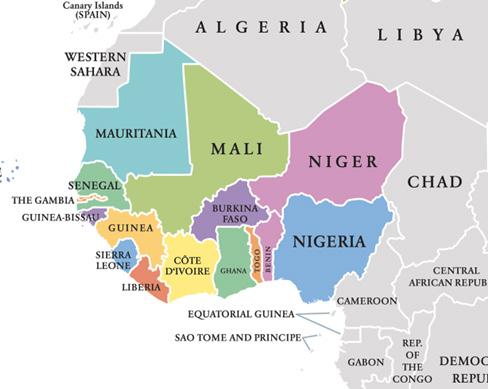
Child labour is the act of forcing children to work in harsh, challenging conditions while having neither rights nor wages. These children are often punished severely if they try to escape. And how do the children find themselves as slaves? Trafficking. Trafficking is the act of moving a person against their will. Over 7000 children are trafficked each year. Most of the children who are trafficked come from Burkina Faso and Mali, two countries bordering Ghana and Ivory Coast (on the map on the right, it is known as Côte d’Ivoire). The children who are trafficked come from families with very small wages. These children, willing to help their families will jump at opportunities to earn money and farmers use this to their advantage. They trick the poor children
The trafficking of children, child slavery and child endangerment are all prohibited by the ILO (International Labour Organisation). However, the farmers are clever. They tell the children not to talk to others because they would not know the language that the people of Ghana and Ivory Coast speak.
If Ghana and Ivory Coast decided to ban child labour, then these giants in the chocolate industry may experience severe losses. Some companies may even go bankrupt due to great losses of money.
The traders would be the most heavily affected, especially the smaller traders. If child labour were to be outlawed, then it would be the same as more than half their business disappearing overnight. As for the larger traders, their business would be affected, but not as drastically as the smaller traders.

Fairtrade would experience positive changes should child labour be outlawed. This is because more companies would start purchasing portions of cocoa beans grown, well, fairly. Fairtrade farms are supervised carefully to make sure that no forms of slavery take place on the farm.
The slaves might experience large different lives. Some of them will be reunited with their parents. Additionally, many of the children would have a chance to start a life of education and later on, a life of paid work. Sadly,
some children may not be able to find their original families due to the family moving away having lost all hope.
The changes in the economy would be very varied and complex: while the average buyer would suffer from higher prices, the farmers would reap from their efforts. Since they would most likely be paying adult workers, they would then be able to charge higher prices for their cocoa beans. This could increase the economy of the countries of Africa involved in chocolate production, and would also bring the average income of the people to a higher number (currently, in the Ivory Coast, the average income is £1000 a year).
This would also benefit the chocolate bar industry. If their cocoa beans are being bought for a more elevated price, they can charge a greater price and a larger profit.
In contrast to the industry, the buyer would suffer from this change. While it is for a good cause, the buyer would have to face higher prices for an everyday treat. Inflation can also exacerbate prices.
Consequently, many people could be deterred from chocolate due to a price increase, which can damage the company’s profit, leading to a decreased economy. This is the reason why the effect of the change on the economy is so complex.
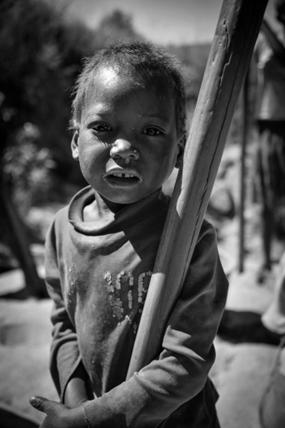
Now that we know what these innocent children are forced to endure every day, we can now take action to help these children. Here are two simple ways stating how:
1. Write to your MP or your chocolate company of choice:
You can make a difference. Write to them campaigning about checking for cocoa beans produced on a farm using child labour. A gradual change makes the world more prepared to adjust…
The simplest way you can help is by purchasing Fairtrade chocolate. Fairtrade chocolate is made from farms where no form of child labour is used. These farms are supervised by representatives from Fairtrade who ensure that every single cocoa
By following our advice you can save unwanted pain and toil that the children experience regularly. Imagine a world where supermarkets sell Fairtrade products and the satisfaction of knowing that the creators of every wonderful bar of chocolate are not maltreated and benefit from their hard work and from the small amount you pay for each bar. This is a world that you can create. All it takes is a little perseverance and you can achieve this.
But that doesn’t mean you should never eat chocolate! Keep enjoying your favourite treat but just watch out for the Fairtrade® sign!
By Venoj Suthan and Aidan Manickarajah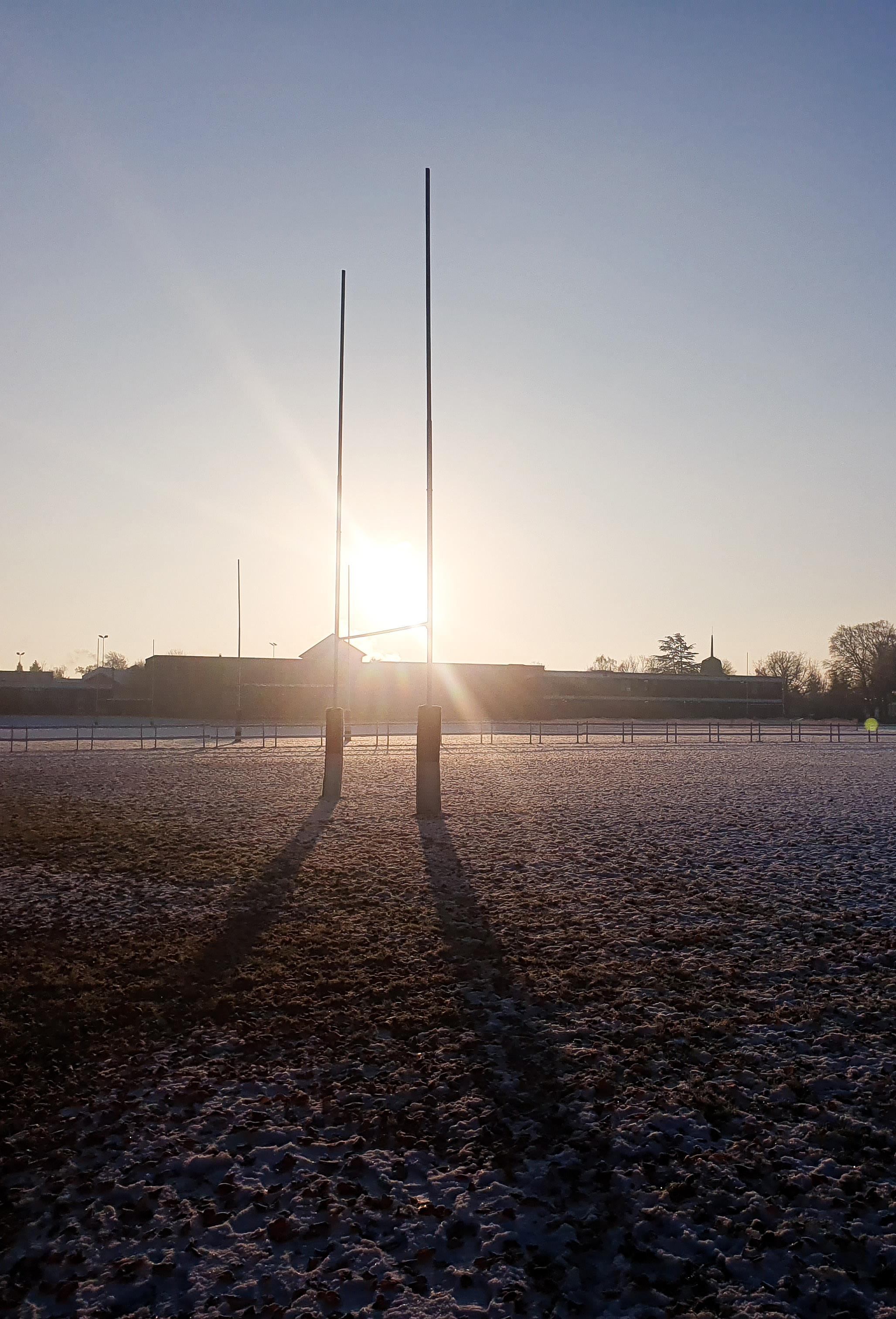
Ifyou feel that you are well acquainted with ancient mythology, do read Sophocles’ Philoctetes or Euripides’ Iphigeneia at Aulis for a different take on the heroes and divinities of the ancient world as you may be surprised by how the playwrights present and question their so-called ‘heroism’.
Through the inspiration of my colleague, Dr. Abbattista, I spent quite some time last year reading fragments of the Athenian Tragedians, Aeschylus, Sophocles and Euripides. We have circa thirty-two complete plays by these playwrights of the 5th Century B.C. Fragmentary plays are those which survive from incomplete papyri or in quotations by other authors. We must also not forget that there were very many other playwrights of the period whose names we know, such as Pratinas of Philus, Phrynichus and Choerilus, but for whom we do not even have fragments. With the help of boys from Years 8, 9 and 10, we performed three fragmentary plays (Sophocles’ Niobe, Euripides’ Telephus and his Andromeda). Temperatures were Hellenic adding to the atmosphere due to the July heatwave. The few surviving sections of Euripides’ nationalist Telephus and comically romantic Andromeda and Sophocles’ bleak Niobe were brought back to life by Sandy Collins as the lovestruck Perseus faced with Monty Ward’s Andromeda – possibly the first instance of a love scene on stage; Qusay Dekkoun reignited Achilles and Noah Margolies showed the tragedy of Telephus with Eythan Soysa, the malevolent god Apollo. Oliver Tovarlaza gave a brilliant Messenger’s speech, Samarth Patki, the cunning Odysseus and Chorus Leader, Aryaan Shaikh, Agamemnon, Sarthak Pandey, Menelaus and Shehryar Raza, Second Chorus Leader. Dr. Abbattista aided rehearsing and Harshit Jagarlamudi prepared the technical side of matters. Performing such difficult language with material which ends mid-sentence, mid-scene or even mid-play gave the students every possibility to allow their imaginations to fly in how they might perform these during a very enjoyable afternoon.
Athenian Tragedy remains the best way to re-engage with ancient mythology as rather than just retell the myth, the tragedians bend them for dramatic effect. My view of Achilles’ and Odysseus’ relationship has changed due to Euripides’ presentation of them during Telephus which he wrote when Athens was at the zenith of its imperial power. The way he portrays them (questioning and weak) at the end of the Fifth Century when Athens had lost its hegemony was not the only characterisation he used for them during his career: his views of the
heroes changed with Athens’ real political successes and failures.
This was our first Classics Play since 2016; it was St. Olave’s Grammar School’s first ever visit to Hadrian’s Wall for the first time. Thank you to Ms Senaratne and Mrs Johnson for accompanying me and all their organizational brilliance with Year 10. The boys’ good humour, willingness to walk some breath-taking countryside and sophisticated questions made it a very memorable Activity Week Two for all.

It is an anniversary year for the Wall, which was begun in A.D. 122. Hadrian solidified the shape of the Roman Empire. He was the first emperor to make a progress through his territories and like Odysseus he encountered a vast array of languages and peoples. This gave rise to his great interest in Greek philosophy and culture. He was the first emperor to make wearing a beard in the Hellenic style fashionable. His willingness to learn through travel is a good lesson for all.
Currently, the prescribed texts for GCSE Latin and A-Level include, alongside Virgil, Apuleius’ Metamorphoses describing the habits of the witches of Thessaly. Apuleius was a Numidian-cum-Carthaginian, born in Madaura, modern Algeria and spoke Punic as his native tongue, learning Latin and Greek as second and third languages. He admits that his Latin style is not purely Roman. At A-Level we are reading Tacitus, Livy and Catullus. These historians and poet tell us more about their own contemporary history than the history they claim to discuss.
Once again, my deepest thanks go to Dr. Abbattista, Mr. Budds and also to Miss Bicknell for their top teaching and inspiring of our students in all aspects of the Classical world. Miss Bicknell leaves us for a teaching role in Hampshire and our fond wishes go with her. I am most grateful for my colleagues in giving me new ways of approaching teaching and the ancient world.
We must celebrate individual student work. Esther O’Neill (13Y) won the Gladstone Essay Prize, answering, ‘Why does the modern world find the Romans so fascinating?’ This will be published in the Classical Association’s journal Omnibus. Sophie Kerr (13S) and Emily Kerr (13S) attended an invitation-only Classics Study Day at Saint John’s College, Oxford where Emily received a commendation for her essay about self-sufficiency in the ancient world. Shaun Abraham (11N), through Dr.
Abbattista’s training, won first prize in the Intermediate Section of the Cambridge Classics Association Latin Prose Reading Competition (online) for his rendition of one of Pliny the Younger’s letters (V.5). The Cambridge University Orator, Professor R.J.E. Thompson who judged the competition wrote that the passage allowed “the reader to express character and emotion.” The letter is typical Pliny, combining humour with philosophy; we are left in no doubt that the self-satisfied Pliny knows his work shall outlive him. He was right, we are reading it right now!
Greek continues to thrive extra murally as we start to read Homer and Herodotus on Thursday afternoons and I am very grateful to our Classical Sixth Formers now acting as mentors to the younger students in Latin. Dr. Abbattista’s Greek Club provides a basis in the language for younger boys and always has space for new members. The enthusiasm of our Sixth Formers has made Classics Society buzz with talks and quizzes all year. I hope that Sophie Kerr’s, Emily Kerr’s, Esther O’Neill’s and Zahra Kazi’s successors continue this tradition.
At the point of writing, Hadrian’s Wall is booked for Activity Week Two 2023, as is a trip to the Bay of Naples with the Geography Department (Mr Budds tells me that last was Lent 1990).
The opportunities are once again boundless and I thank you parents for reading my words and encouraging your children in taking up these opportunities.
Alexander Carroll S___Head of Classics
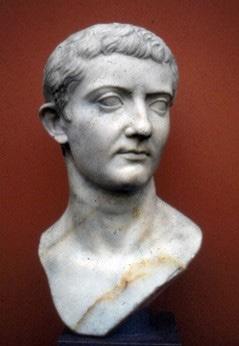
Asterix does not always beat brute force by superior cunning and intelligence - he does it thanks to his unexpected access to even bruter force than the enemy can deliver. Such heroics may have actually taken place historically, but are lost to history as it was written by the winner, Julius Caesar himself in his ‘Commentaries’. In adventure after adventure, most of the Gauls’ overingenious schemes misfire as badly as the best-laid Roman ones. The reassuring fantasy is that, thanks to the magic potion, Asterix and his friends can mess things up and still win out.
Dr Christopher Burden-Strevens, Lecturer in Roman History from the University of Kent, gave a talk on the ‘Ciceronian Rhetoric of Tactius’ Annals’ . This was highly informative using examples of rhetorical figuresof-speech from famous descriptions of the revolutionary Piso, dastardly Sejanus and libertine Marc Antony. He also illustrated the continued relevance of Classics, with more than a few cynical comparisons with contemporary politicians to illustrate the techniques of praeteritio, hypophora and anaphora.
Mr Carroll’s delivered a talk on ‘Asterix the Gaul’. Mr Carroll shared how the basic storylines also reinforce the series’ international appeal, and how different translations of the story engage different nationalities. For wherever Roman conquest reached, there are still tales of heroic resistance and glamorous native freedom-fighters.
Dr Elizabeth McKnight (UCL) addressed Year 12 Latinists and the Classics Society regarding their prose set texts, Tacitus’ Annals IV (the rise of Sejanus) and Livy Book I (the overthrow of the Roman monarchy). The point which really made the class and their teachers think was how Tacitus’ description of the malevolent Sejanus’ rise to power and how he controlled the emperor Tiberius is inspired by Livy’s account of the corrupt final Roman monarchs, the Tarquins. She was bombarded by questions regarding Tacitus’ difficult style and negative attitude towards the principate. With Classics Society, she gave a biography of the Roman politician Cicero and challenged her audience by showing the vital influence of the Greeks Archilochus and Aeschines upon the Romans.
Dr Sonya Nevin and Steve Simons (University of Cambridge) addressed Year 9, Year 10 and Sixth Form students of Latin and Classical Civilisation about their digital work animating Greek art for schools and museums. Abdul Rehman and Edward Bell (9L) wrote, “We found the talk on the history of Greek women, art and music fascinating. From geometric patterns on vases, to the Trojan War and the beautiful love poetry
of a Greek woman named Sappho to the process and development of Sonya’s and Steve’s own animated vases and music made the ancient world come alive for us.”
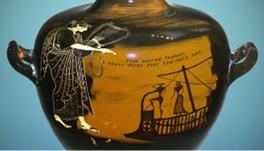
Newnham College, Cambridge Essay Competition. Her entry, in the Engineering category, explained the possibilities of using roads and transport networks to generate electricity in the future.
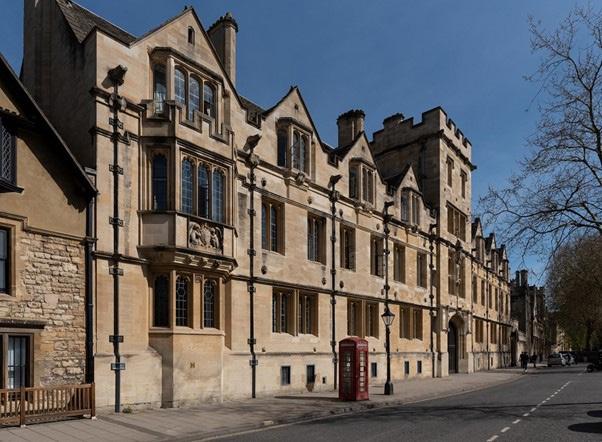
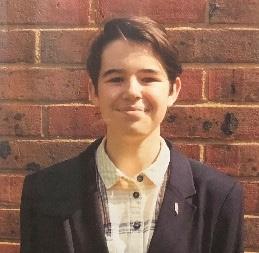
Congratulations to Shaun Abraham who won 1st prize in the Intermediate Section of the Cambridge Classics Association Latin Prose Reading Competition for his rendition of one of Pliny the Younger’s letters. The Cambridge University Orator, Professor R. J. E. Thompson who judged the competition wrote that the passage allowed “the reader to express character and emotion.” This letter is typical Pliny, combining humour with philosophy; we are left in no doubt that the selfsatisfied Pliny knows his work shall outlive him. He was right, we are reading it right now!
Olavian Classicists took part in the annual Euroclassica Latin and Greek Examinations. This competition is taken by around 6,000 students in 15 European countries and includes translation, grammar and comprehension exercises based upon a passage of Latin or Greek alongside historical and mythological questions. This year St. Olave’s attained: 14 Bronze Certificates, 20 Silver Certificates and an excellent four Gold Certificates. Well done to Cameron Walsh 8H, Shaun Abraham 10N, Mark Ludden 10N and Arnav Sharma 10J for achieving Gold.
Congratulations to Year 12 student, Esther O’Neill, who won the Fitzwilliam College Classics and Ancient World Essay Competition for an essay on ‘Why do we need new translations of ancient texts?’ with a discussion of the varying approaches to translating Catullus’ 64th poem, his mini epic describing Ariadne and Achilles. This is an outstanding achievement – well done.
Congratulations also to Year 12 student, Guneeka Chitkara, who achieved 2nd place in the prestigious
Emily Kerr, Sophie Kerr and Franklin Baron attended, by invitation, the Classics and Ancient History subject exploration day at St. John’s College, Oxford in April. The students met all the tutors and gained insight into what Classics and other similar courses are like at Oxford. Emily received a commendation in the literature category for her essay on self-sufficiency in the ancient world from Dr Emma Greensmith. Franklin attended talks about the role of tribunes within the Roman legislature, about the meaning of dreams in antiquity and the importance of Asclepius in the development of dream treatment. Emily and Sophie went to talks about gender desire in Sappho and Catullus, Epictetus’ response to wrongdoing in Euripides’ ‘Medea’ and one on micro-revolutions in ancient literature. The day was extremely interesting and they gained a great deal of knowledge about Classics at Oxford, as well as university life.
During Activity Week 2 Year 8 visited the Roman villa at Bignor in the gorgeous West Sussex countryside and the Roman Palace at Fishbourne. These are among the largest villas from the Roman occupation of Britain with the finest mosaics ranging from the 1st to 4th Centuries A.D. showing the skill of the British
craftsmen to reimagine Roman art. They explored the remains sketching the layouts and mosaics, considered the landscape around Bignor using 1:25 ordnance survey maps and took part in a Roman food tasting activity at Fishbourne.
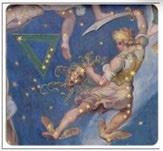

Students in Years 8-10 performed fragments of Euripides and Sophocles with Hellenic temperatures adding to the atmosphere. The few surviving sections of Euripides’ nationalist Telephus and comically romantic Andromeda and Sophocles’ bleak Niobe were brought back to life by Sandy Collins as the lovestruck Perseus faced with Monty Ward’s Andromeda – possibly the first instance of a love scene on stage; Qusay Dekkoun reignited Achilles and Noah Margolies showed the tragedy of Telephus with Eythan Soysa, the malevolent god Apollo. Oliver Tovarlaza gave a brilliant Messenger’s speech, Samarth Patki, the cunning Odysseus and Chorus Leader, Aryaan Shaikh, Agamemnon, Sarthak Pandey, Menelaus and Shehryar Raza, Second Chorus Leader. With thanks to Dr Abbattista for helping with rehearsals and to Harshit Jagarlamudi for his technical support
Year 10 students of Latin are trendsetters as the first Olavians in memory to visit Hadrian’s Wall on a dedicated residential trip. Led by Mr Carroll, Mrs Johnson and Ms Senaratne, the group engaged in a week of archaeological and museum visits, trail-walking, map reading and learning about the medieval and industrial past of the North in Newcastle-upon-Tyne and Durham. They visited the forts of Housesteads and Birdoswald, walking five miles along the iconic best-preserved sections of the Wall. Year 10 student, Alfred Beston, amazed everyone at the Wall’s highest point with his drone footage. They also visited the main military hub of the wall, Vindolanda, a World Heritage Site where the Emperor Hadrian himself resided during his tour of the Empire in A.D. 122. Here and at the Roman Army Museum, local archaeologists gave tours about the most recent finds. The week concluded with a trip to Durham to see its cathedral and university and Antony Gormley’s Angel of the North.

 Hadrian’s Wall
Hadrian’s Wall
Everyone knows the old question of whether a tree falling in the woods makes a sound if nobody hears it.
In one sense, it could be a question about whether we can prove anything with certainty on the basis of past experience. I know that all previous trees I’ve seen falling have created a noise, but can I know for certain that the next one will? This is a question with significant implications for the scientific method and it isn’t really the focus of this report but if you are interested then here’s a summary: in the 1620s, Francis Bacon said you could know that sort of thing for certain on the basis of past experience; then in the 1700s David Hume said you couldn’t and he was right and this caused a problem which everybody just kept quiet about until Karl Popper said in 1934 that we were all looking at things the wrong way round.
Popper’s solution was to say that a hypothesis like ‘trees make sounds when they fall’ is a nice hypothesis because you can test it, but no amount of testing will ever prove it to be true. If you test it and it passes the test, the best you can say that it hasn’t been proven not to be true and so it can stand for now, and even though you may become more confident in the hypothesis with each test it passes, ‘standing for now’ is the only status any scientific statement can ever have.
So the first question raised by the unheard falling tree is probably one for the scientists. The second question seems to be a question of meaning. We are fairly sure (though not certain – see above) that a tree falling in the woods will make the air vibrate, so why do we hesitate to answer ‘yes’ to the question of whether it makes a sound? I think the answer is that sound is something we experience. Vibrations in the air are one thing, but they only become ‘sound’ when someone experiences them as such. In that sense, the presence of a hearer does actually make a difference: sound that is not heard is just vibration in the air.
There is something very lonely about that image of the tree falling in the woods, announcing the end of its life but entirely unheard. Even one person stopping to listen to it would feel like an acknowledgement that its existence mattered. There is a sense here in which our response to the lonely tree falling tells us something about what makes a thing meaningful. Meaning is created; it isn’t intrinsic. A thing only means something at all if it means something to someone. That someone could, of course, be God, caring about every detail of his
creation. Equally, it could be someone who loved the tree and mourns its passing. In the absence of either of those, the tree fell and the air vibrated and none of it made a sound.
I was recently reading the exam papers of some of our GCSE and A-Level students and was struck by how a school bursting with creativity is continually running the risk of allowing great trees to fall in silence. I read an A-Level exam script which was, frankly, a work of art and yet if I hadn’t happened to ask the exam board for a copy of it and then read it myself, it would never have been seen by anyone other than the marker. The writer had poured his soul into the most perfect examination of the question of whether or not Christianity is inherently sexist and the only person to read it was being paid to do so. The culmination of mountains of effort, silently falling to the ground. There are bots on Twitter broadcasting their thoughtless nonsense to millions, while works of great brilliance pass entirely unnoticed.
So let us take a moment to acknowledge all the work produced by all those students day after day. The artwork that is eventually thrown away; the books that are marked quickly and then forgotten; the homework that becomes an entry in a markbook but not a treasure in the memory. Every exam result and every end-of-year report is a reminder of largely unseen work that deserved to be appreciated.

One consolation for me as I read those wonderful pieces of work is that there is at least one difference between the content produced by a Twitter bot and the work produced by a student. The work produced by a student will always have meaning to the student who produced it. We sometimes fall into the trap of thinking that being proud of your work is a sort of optional extra, but it really isn’t: if your work means nothing to you then it may be quite literally meaningless (I think that’s a danger which some students run if they see their subjects as being no more than stepping stones to the grade which gets them to where they want to be next, but that’s probably a topic for another time).
I think that if there’s one thing I would like to report about the year 2021-2022, it’s that staff and students cared about what went on in RS. Students engaged in discussion and wrestled with ideas. They worked hard to articulate their thoughts and they produced work they were proud of. It is an enduring feature of Olavians that they are curious and imaginative and they burst with a
desire to share their thoughts. Marking their work can take an age at times, because generally speaking it’s worth reading. Students worked hard and where there were exams to be sat they achieved incredible results. Where there were no exams, they wrote and drew and discussed with enthusiasm. As in previous years, students cared about their work and because they cared about it, it meant something to them. And because it meant something to them, it really did mean something in the grand scheme of things. And so I can say with confidence that in these woods in 2021-2022, no tree fell silently.
Incidentally, if you are a student who has read this far and you feel that your own work is meaningful and something to be proud of, then in token of acknowledgement for your efforts I have a limited supply of chocolate bars in Rm32, to be claimed by any student. Rules = 1 student per form group may claim a prize and first come, first served.
recitations of the Holy Quran to a comedic performance from ‘Prince Abdi’. An auction of special Islamic art and calligraphy was also conducted by Year 12 student, Amaan Hamid. The food is one of the fundamental aspects to the Iftar as it is the time for ‘breaking of the fast’ at sunset. The meal shared to those who attended was excellent. Thank you to everyone involved, especially student organisers, Habibah Choudhry and Sulaiman Galaria, who were key in getting this event organised alongside Head of Computing Mrs Zeshan, the PA and many parents. We also received a letter of thanks from the Mayor of London, Sadiq Khan.
Fasting is common over most religions and Ramadan is about fasting, generosity, charity, self-discipline, and

recharging our spiritual, as well as physical, selves. On Friday 22 April, we held the first ever school Iftar in the whole of Bromley. In the event, our Islamic society hoped to share the spirit of Ramadan and was extremely successful in doing so. Leaders from different faiths (Islamic, Christian, Jewish, and Hindu) were invited to share the virtues of fasting across different religions. With over 120 people present, the programme ranged from
The president of this Society is Laura Gander. Across the academic year there has been a broad spectrum of student led talks, many examining the role of the state, including its duty to different groups within society and balancing the relationship between religion and government. This has been coupled with debates about the best ethical ideologies to use as a framework for governing, considering the merits of utilitarianism, deontology and different thought experiments such as ‘the trolley problem’ of utilitarianism which arise when such theories are implemented on a wide scale. Other students have led discussions which have examined more niche philosophical schools of thought such as anarchism and egoism and their influence on human nature. Human nature has also been explored in discussions about the morality of crime and the ethics of protesting, which proved extremely topical in the wake of climate change protests. More contemporary ethical discussions have also been held, such as who deserves rights in a society, spanning from criminals to robots to plants, to the influence on social media on the idea of human free will. Talks have also been given about the merit of philosophy itself, exploring its importance in comparison to science, and its role when helping people understand and appreciate art. Overall in this academic year, a wide range of topics have been rigorously examined in Philosophy and Politics Society.
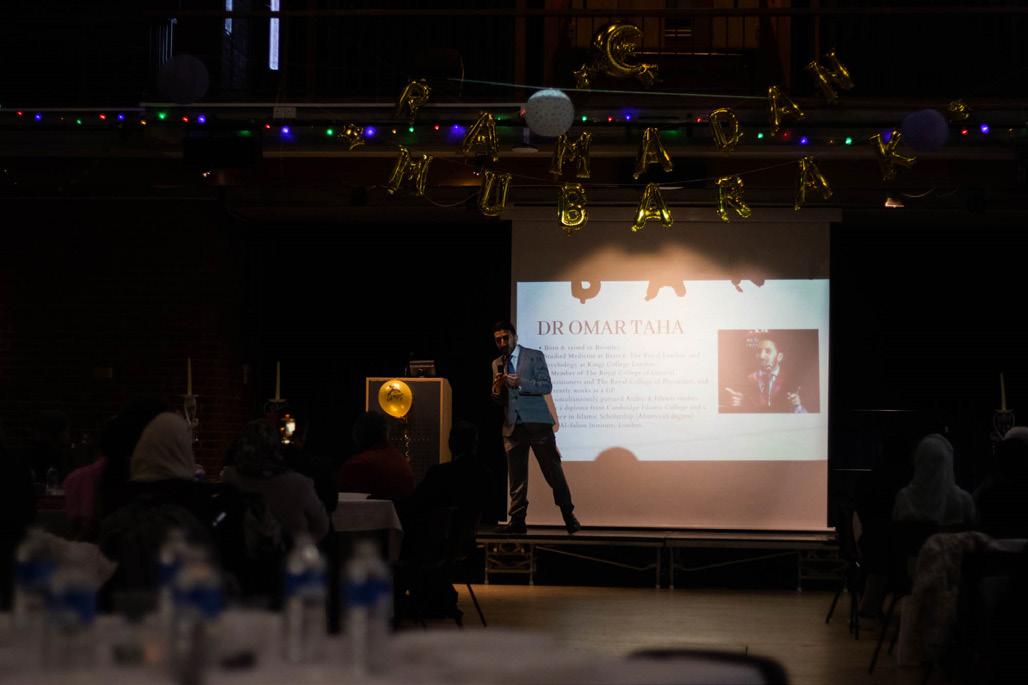
The Economics department saw considerable change over the summer of 2022. Departing from the role of Head of Department, William Haines left for pastures new in Manchester, but left a tremendous legacy. We wish him well for his relocation. A teacher with a national reputation, William was at the forefront of pushing the subject in schools into the 21st Century: renewing focus on deep, important, topical issues such as sustainability and inequality, and helping highlight the role of women on the subject. Economics at university and beyond is heavily gender biased, but this is in part a pipeline issue: the subject is heavily gender biased at ALevel too. More and more attention is being paid to this issue, nationally and internationally, with more focus on female role models in the subject and on the topics that a male-dominated academy might overlook. To this end, William helped start our Women in Economics society where we discussed issues such as childcare, the tampon tax and microfinance. As part of this push, St. Olave’s also welcomed guest speaker Lizzy Burden, Economics reporter at Bloomberg, who came to talk to our societies.
Also leaving the department was Andrew Sykes, whose experience and deep knowledge was highly valued by students. Coming into the department in 2021 was Kenneth Brown, who joined us from Whitgift. With his jovial Scottish brogue and clear enthusiasm for the subject, Kenneth was quickly a big hit with the students who really appreciate his willingness to go the extra mile in support of their learning.
During the year, students in the department continued to perform superbly in both the return to public examinations and their wider development as young economists. As part of a competition run by Discover Economics, an Olavian team reached the national final of the YES! Competition run by Discover Economics, in which they had to research and present findings in a key societal issue. The team looked at the potential for hydrogen power to help decarbonise air travel. William Lawson (Class of 2023) was judged category winner in the Royal Economic Society’s Young Economist of the Year essay competition, probably the most prestigious essay contest for A Level economists, with his entry on cryptocurrency. Although not quite winning the overall contest, this was a fantastic achievement, and will hopefully inspire this year’s cohort when the essay titles are released for the 2023 edition. The Political Economy society team put together another wideranging edition of The Olavian Economist, our annual student publication which this year featured articles on inequality, sustainability, wellbeing and monopoly power,
among other topics. Every week, the society meets for presentations and discussions mostly delivered by students, but with occasional outside speakers, including, last year, Chris Giles, the economics editor of the FT.
Sometimes the economy can trundle along with seemingly little of interest going on. Economics students know this is not really true, and that economics helps illuminate some of society’s most pressing issues, but in any case, 2022 has not been one of those years! With it being a great time to be learning the subject, the current and recent crop of Olavian economists continue to impress us all with their ability to apply complex ideas to these real-world issues, and in the words of the LSE’s motto, “strive to know the causes of things”.
Old Olavians, Swastik Gupta, Arnav Barry and Kirandeep Nagra gave a talk on ‘What on earth is going on with oil prices?’
It was a great pleasure to welcome Lizzy Burden, our first guest speaker, to our newly established Women in Economics Society. The Society has been set up to achieve gender balance in the Economics discipline. Lizzy spoke to a group of 30 female students about her career to date, having travelled the world as a model to now working for Bloomberg as an economics journalist. She filled the room with a huge amount of confidence and courage by motivating the students to make the most of every opportunity in life.
We were also delighted that five former Olavians were able to speak (virtually) to our female students about their experience at university. The aim of the society is to achieve gender equality in Economics. Thank you to Sofia Cotterill, Aadya Tripathi, Sheena Akende, Victoria Dimitrova and Poppy Wheeler. The current Olavians were able to benefit from their guidance and support in relation to Economics, PPE and Finance and all five speakers presented impressively.

Congratulations to the Sixth Form students who put together the latest edition of The Olavian Economist edited by Year 13 students, Shrey Choudhary, Shahar
Eyal, Zachariah Fischer, Elodie Gorter and Matthew Todorov. Their articles cover a broad range of fascinating topics within the section, ranging from the provision of public services to help inequality on a national scale, to the role of the technological revolution in aiding low-skilled workers to the psychology of poverty. Furthermore, to gain an expert view on the state of poverty and inequalities within the UK, Dr David Khabaz of the University of Westminster participates in an interview, touching on his interest in media reporting of key issues and specifically the effect of the pandemic, drawing on his research with several notable research institutions. In addition to economic theory and policy, the social, psychological, and philosophical effects of inequality and poverty are presented through insightful arguments and probing questions.
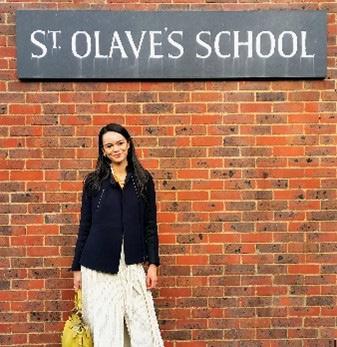
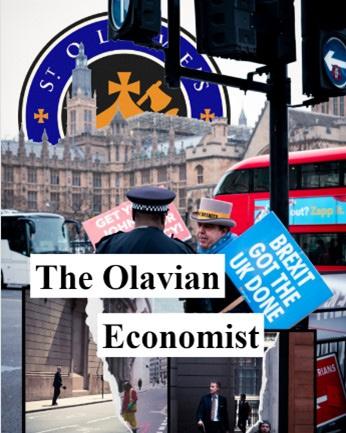
This year, Law Society, with presidents Justin Adesina and Prajval Haldia, has engaged in a variety of presentations given by our Year 12 cohort. Topics have included: tax law, jury equity, and wrongful convictions amidst many others. As well as presentations they have held intellectual debates on current legislation, such as the new policing bill, and hope to engage in more in the future. They hope to compete in The Bar Mock Trial, a national competition that will see them competing against other schools in a mock trial, judged on their ability to run a trial rather than the verdict.
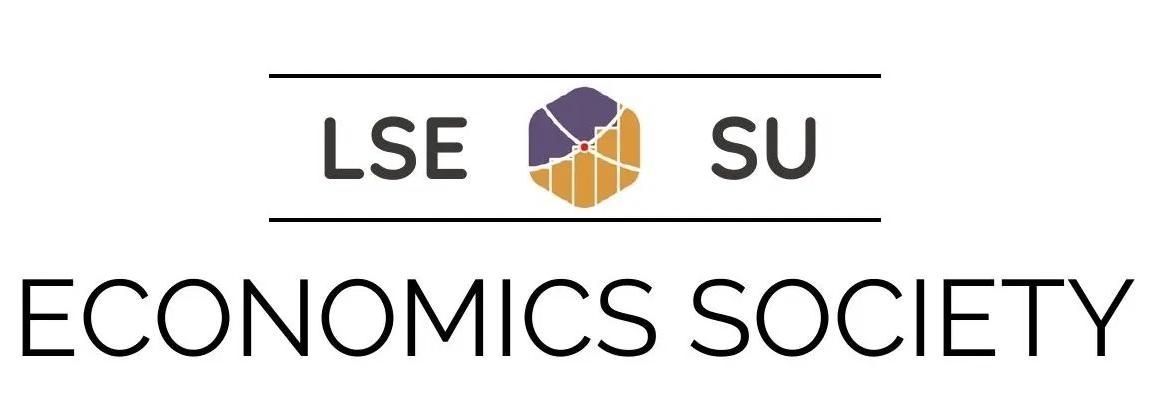
The goal of a Central Bank is to achieve macroeconomic stability and to regulate financial markets. The former is achieved through monetary policy – controlling interest rates and quantitative easing – and the latter through regulation of banks and financial market infrastructure. In Britain, this process is orchestrated by the Monetary Policy Committee and the Financial Policy Committee, alongside other BOE institutions like the Prudential Regulation Authority.
Cryptocurrencies, like Bitcoin, are decentralised virtual currencies which use blockchain technology to allow transactions to be verified and secured by users. These currencies therefore emphasise the role of individual cooperation, excluding central banks which exercise a great deal of power over traditional monetary systems.
This poses a particular challenge to the Central Bank’s ability to regulate financial markets, as anonymity and decentralisation make it difficult to protect consumers or prevent illicit activity. This not only entails a financial threat to consumer safety, but also the social threat of rising crime. However, the complexity, volatility, and risk inherent in Crypto make it unlikely to become widely adopted, and therefore it is likely that the Bank of England will continue to control the UK monetary system.
In regulating the financial sector, the Bank of England seeks to protect consumers and promote stability; yet Cryptocurrencies are notoriously difficult to regulate. This is because they are decentralised, with control of the money supply and transactions not attributable to a particular body, and anonymous, with users protected by pseudonyms.
The first issue is one of protecting consumer interests. In Britain, the Bank of England regulates bank behaviours to minimise risk taking, whilst also guaranteeing deposits under £85,000 to protect consumer savings. This task becomes far harder in the Crypto market, where anonymity and decentralisation make it impossible for regulatory bodies to safeguard people’s assets. Cryptocurrency wallet services are not subject to the same regulatory standards as mainstream banks, and yet if such firms do collapse there is no guarantee that investors won’t lose all their bitcoin. The socio-economic implication of this is that, without BOE protection, the volatile Crypto market is incredibly dangerous for consumers, with the Financial Conduct Authority saying, “If you invest in Crypto assets, you should be prepared to lose all your money” . This is best seen in the potential collapse of crypto-wallet Coinbase, with
corporate negligence potentially having a devastating effect for consumers .
Secondly, but of perhaps more concern, is the need of the Central Bank and other regulatory bodies to minimise financial crime. Institutions like the Financial Conduct Authority, along with BOE institutions like the PRA, struggle to track and prevent crime carried out through anonymous Bitcoin transactions. According to a Europol study, “The use of cryptocurrency as part of criminal schemes is increasing,” as criminals become able to “obfuscate money flows” . The issue is most acute in regard to weapons purchases, with numerous cases of radicalised individuals using Bitcoin to purchases guns, a transaction which could’ve been prevented had it been overseen by a centralised regulatory authority.
Uptake of Cryptocurrencies is not a major threat, however, to the ability of the Bank of England to regulate mainstream banks and other large financial institutions. Whilst some large banks do trade in Cryptocurrencies, only 4% of the global population own crypto and therefore the vast majority of a bank’s operations will be done using standard currencies. Moreover, large financial institutions based in the UK are registered with the BOE and therefore can be regulated and held accountable regardless of the extent to which they use crypto. Thus, the development of cryptocurrencies like Bitcoin is not a threat to the ability of the Bank of England to control mainstream financial institutions, or to prevent crises like the 2008 Global Financial Crisis.
The threat of Cryptocurrencies as a monetary system: Money functions as a store of value, a unit of account, and a medium of exchange; as such it is the cornerstone of modern, specialised economies. It is commonly believed that Cryptocurrencies threaten to displace national currencies as the primary monetary system worldwide. If this were so, it would wholly nullify the ability of Central Banks to use monetary levers to achieve macroeconomic stability, as currency and money supply became decentralised. Yet it seems seriously unlikely that such a situation, in which Cryptocurrencies seriously threatened national currencies, could ever arise.
Cryptocurrencies fail to adequately fulfil the functions of money. Long transaction times (nearly an hour for Bitcoin transactions), combined with the need for third party verification of each transaction, mean that Crypto would provide an inefficient medium of exchange. At the same time, the volatility of Cryptocurrencies, with Bitcoin losing 50% of its value this year and Ethereum recently losing 20% of its value in 24 hours, reduce its reliability as a store of value.
Furthermore, there is little widespread appetite for the complicated and somewhat inaccessible technology to be used as an alternative currency. Most of those that do own Crypto treat it as a speculative investment (indicative of its volatility) and few genuinely use it as a currency . As a result, it seems incredibly unlikely that Cryptocurrencies could ever threaten the Pound Sterling as the main UK currency, and therefore the Bank of England will continue exercise sole control over the monetary system of the United Kingdom.
Conclusion:
Overall, Cryptocurrencies pose some threats to the Bank of England’s objectives, particularly the regulation of the financial sector and the prevention of illicit financial transactions. However, the unlikelihood that Crypto ever becomes a widely adopted monetary system means that the Bank of England will likely continue to have substantial power to control the UK macroeconomy.
By William LawsonReferences:
Böhme, R., Christin, N., Edelman, B. and Moore, T. (2015). Bitcoin: Economics, Technology, and Governance. The Journal of Economic Perspectives, [online] 29(2), pp.213–238. Available at: https://www. jstor.org/stable/24292130?read-now=1&refreqid=excel sior%3A314ffdb693a0e5f169d649e54f37ff2e&seq=18 [Accessed 10 Jul. 2022].
Bank of England (2018). What is the Prudential Regulation Authority (PRA)? [online] Bankofengland.co.uk. Available at: https:// www.bankofengland.co.uk/knowledgebank/ what-is-the-prudential-regulation-authority-pra.
KEY FINDINGS 2 EUROPOL SPOTLIGHT -CRYPTOCURRENCIES: TRACING THE EVOLUTION OF CRIMINAL FINANCES. (n.d.). [online] Available at: https://www.europol.europa. eu/cms/sites/default/files/documents/Europol%20 Spotlight%20-%20Cryptocurrencies%20-%20 Tracing%20the%20evolution%20of%20criminal%20 finances.pdf.
Bambrough, B. (n.d.). Serious Coinbase ‘Sell’ Warning Triggers Sudden Price Crash As Bitcoin And Ethereum Dive. [online] Forbes. Available at: https://www. forbes.com/sites/billybambrough/2022/06/27/seriouscoinbase-sell-warning-triggers-sudden-price-crash-asbitcoin-and-ethereum-dive/.
Meiklejohn, S., Pomarole, M., Jordan, G., Levchenko, K., Mccoy, D., Voelker, G.M. and Savage, S. (n.d.). A Fistful
of Bitcoins: Characterizing Payments Among Men with No Names. [online] doi:10.1145/2504730.2504747.
Glaser, F., Zimmermann, K., Haferkorn, M., Weber, M.C. and Siering, M. (2014). Bitcoin - Asset or Currency? Revealing Users’ Hidden Intentions. [online] Ssrn.com. Available at: https://papers.ssrn.com/sol3/ papers.cfm?abstract_id=2425247.
The Independent. (2022). Ethereum price drops dramatically amid cryptocurrency collapse. [online] Available at: https://www.independent.co.uk/ tech/ethereum-cryptocurrency-bitcoin-marketcrash-b2077226.html [Accessed 10 Jul. 2022].
Financial Conduct Authority (2019). Cryptoassets. [online] FCA. Available at: https://www.fca.org.uk/ consumers/cryptoassets.
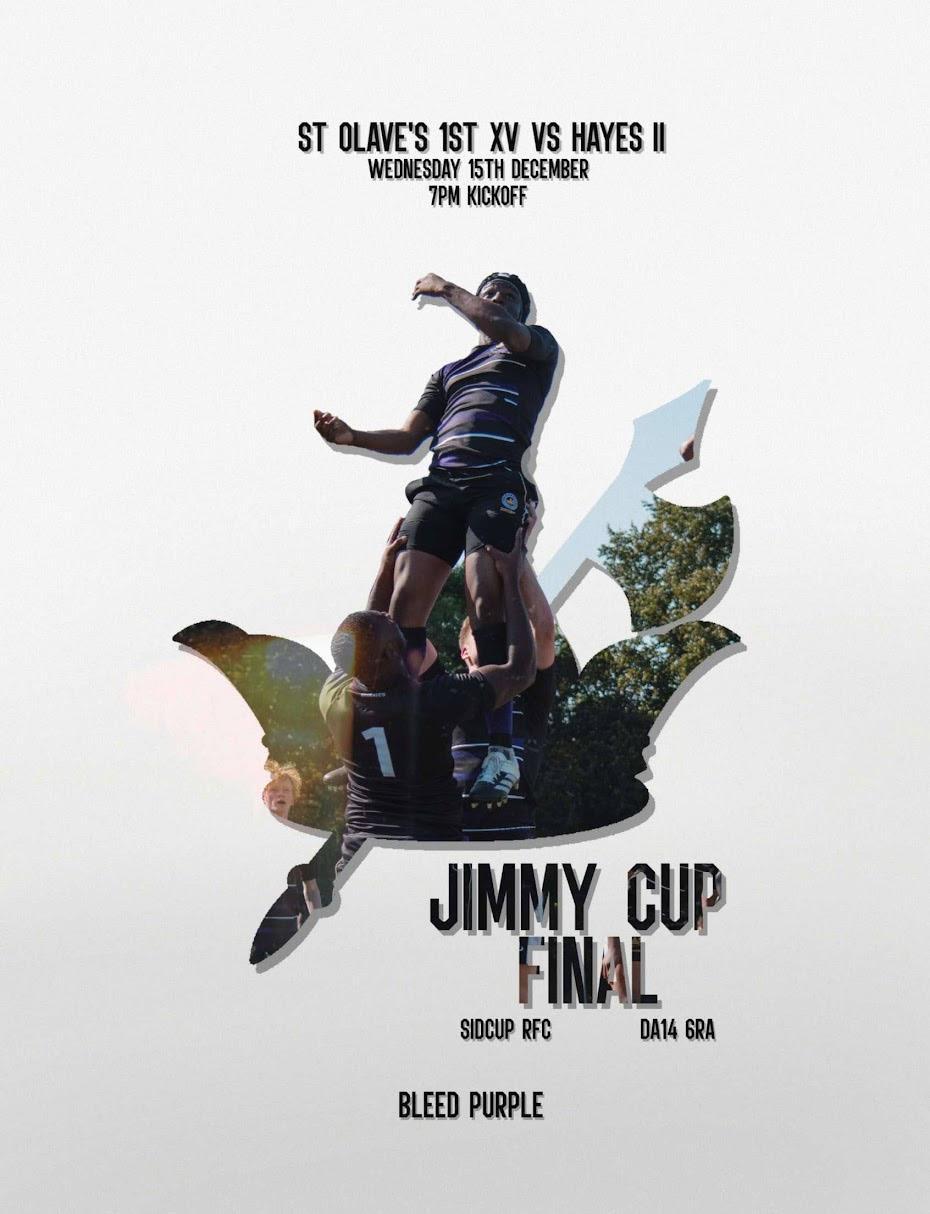

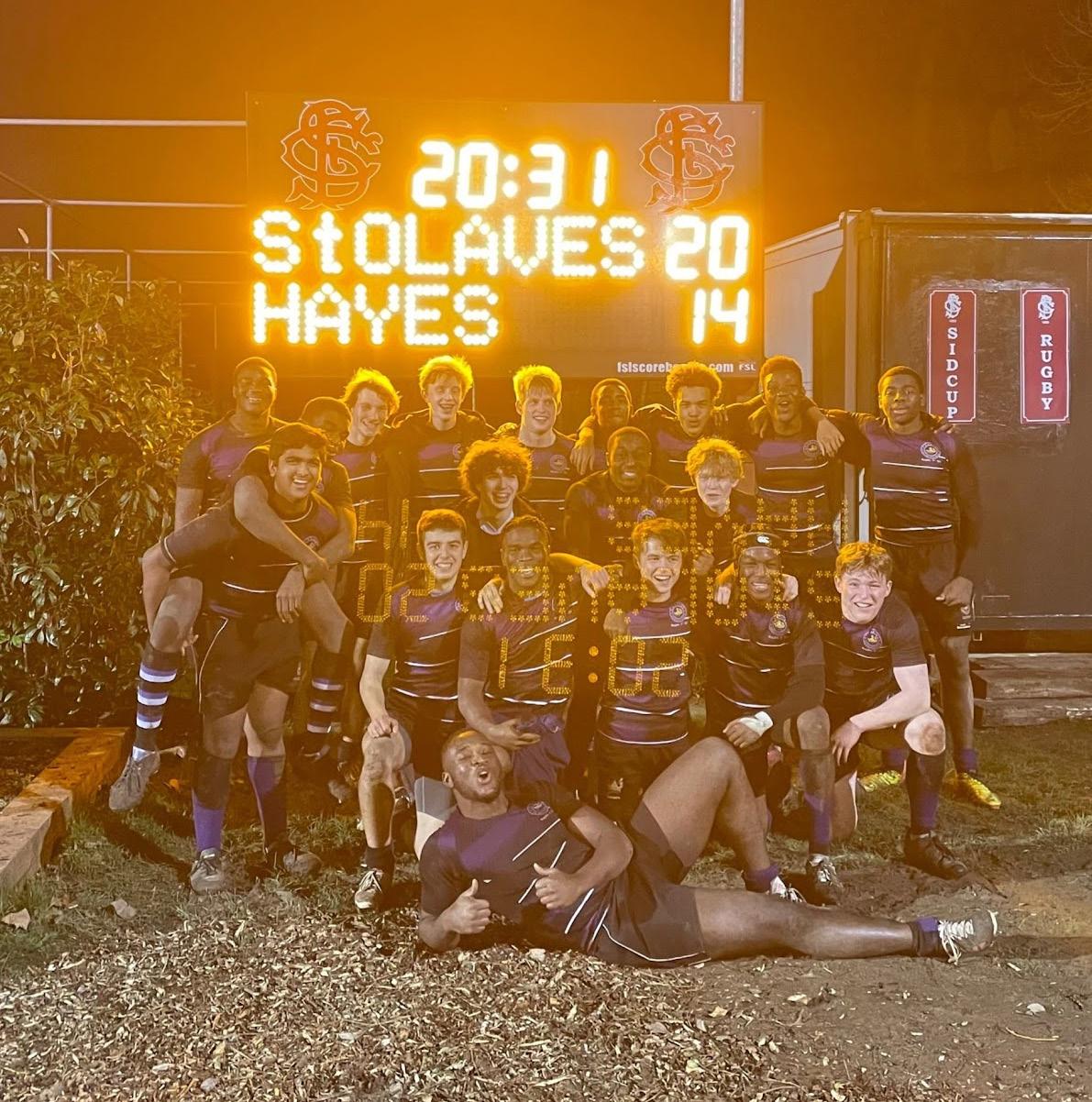
Itwas hugely satisfying to be able to return to a whole year of competitive sport with inter and intra school fixtures regularly occurring in a range of activities. The students responded to these opportunities and we were delighted to see them engaging so readily. The Sports’ Prefects did a tremendous job in generating enthusiasm in a range of activities by offering support for training and House matches. The senior rugby team led the way with a stunning series of results to win the Jimmy Cup, fulfilling their potential as the Year 13 boys had been successful throughout their school careers, having won the Kent 7s trophy in both Year 8 and 9. A wide range of team sports were back with competitive fixtures and it was great to see the students engaged in netball fixtures as well as football against other schools, and playing House matches. The school cricket teams also performed well, the highlight being the Year 10 team winning the Kent Plate competition. We were able to welcome parents back for our summer Sports Day which created an atmosphere befitting this important sporting event.
Amongst the team sports were also a multitude of individual successes in a range of activities. Eton Fives continues to excel with national champions in the U16 category and reaching the Finals with the U15 pair and Semi-finals in the Open age group and the U12s. Genesis Nsenga also represented England in wallball. Other activities also had individuals reaching county or higher standard, such as squash (where Caleb Boy was ranked number one in England for the U17 age group), basketball (Timothy Oboh representing England U16), badminton, swimming, cycling, archery and biathlon (with Raphael Huille representing GB).
The future of sport at St. Olave’s is tremendously exciting as we will utilise the new All Weather Pitch for a multitude of purposes. Hockey will be a key beneficiary and we are looking forward to training and playing on this outstanding surface. As always, these opportunities would not be possible without the commitment of the staff and their willingness to give up their time and so, on behalf of everyone who was involved in the sports programme last year, thank you.
Andrew Kenward Director of Sport
Thank you to former colleagues Roy Archer and Chris Davies for carrying out the official opening of our

All Weather Pitch. The event was also attended by representatives of Blakedown Sport and Play and Barkers Associates. This is a wonderful additional resource for the school, which was paid for out of donations from the Voluntary Fund. The PE Department have started using the surface and students are using it at lunchtime. I have always believed that the money given by parents into the Voluntary Fund should be used to give our pupils the very best facilities available and enhance their learning experience. I am sure you will agree that this new facility will help us do this
14 netballers from Years 12 and 13 competed in the annual Kent Schools Netball Tournament at Rainham School for Girls. With 36 schools competing for 8 places in the Final the odds were against us, especially when many of the other schools were girls’ schools, where their squads had potentially been playing together for up to five years already, and some of the St. Olave’s girls met for the first time on court at the tournament! The team were well disciplined and enthusiastic throughout, even when faced with playing back-to-back matches. Beating the host school 6-3 was a particular highlight, but there were also some outstanding individual performances from Ruby Fitzpatrick, Jessica Liddemore, Grace Moore and Rohini Kumar of Year 12, as well as Oluwatoni Awodiya, Elizabeth Willcox and Laura Gander of Year 13.
Badminton players from Years 7-10 visited Langley Park to play some friendly matches. The boys all acquitted themselves extremely well and the standard was high from both schools. The boys all played two singles and two doubles matches so plenty of experience was gained. Overall, the Olavian players won by 33 games to 15. Congratulations to all involved.
Ayan Mahajan competed in various county badminton tournaments, including winning the Bronze medal in the Warwickshire U15 Men’s singles tournament and the Gold medal in the U16 Kent Restricted Men’s
doubles. He won Gold in two national U15 badminton doubles tournaments, as well as picking up a Silver and
Congratulations to Year 11 student, Raphael Huille, who was selected to represent Great Britain in Pentathlon for the U17 European Championships in July, which were held in Krakow, Poland. This is an outstanding achievement.
Bronze in the singles tournaments. He is also ranked 27th nationally for U15 players.
Sai Reddy competed in the U16 and U18 Kent Futures Badminton Competition, winning a Gold medal in the U16 doubles, and Silver medals in the U16 singles, U18 doubles and U18 singles. These are outstanding results as he was competing in an older age group. Also, congratulations to Year 7 student, Debaditya, who gained a Bronze medal in the doubles of the U14 tournament.
Year 10 student, Vidwanth, won a Silver medal in the London Youth Games for Badminton, representing Bromley.
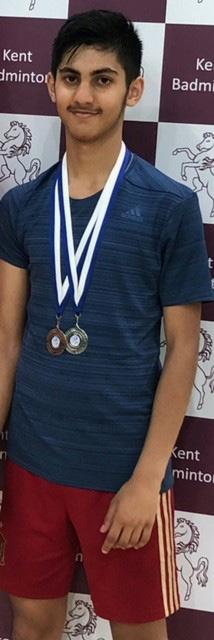
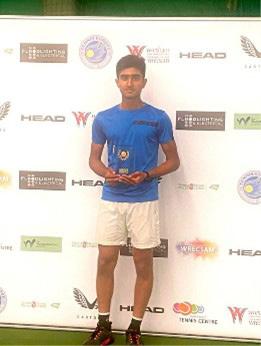
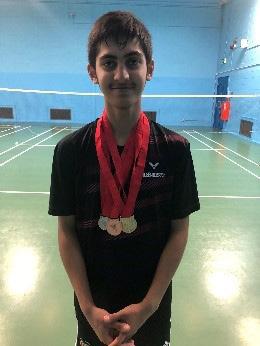
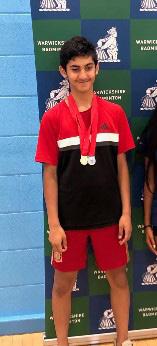

Well done to the U15 cricket team for their victory in the final of the County Plate competition. Their total of 188 was largely based on Amogh Bhat’s 76 and Srithan Chanda’s 62. Sutton Valance managed a score of 153 in reply, but this was not enough to prevent St. Olave’s prevailing.
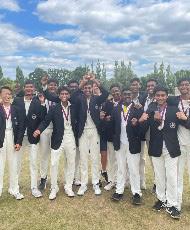
Year 10 student, Pranav, competed successfully in a range of tennis tournaments over the Easter break. His successes include winning the singles at the U16 Welsh Junior Open and runner up in the doubles at the U16 Welsh Junior Open. Pranav has worked really hard to achieve these successes, balancing school along with his tennis training. We wish him every success in the future.
Congratulations to Timothy Oboh who was selected to be a member of the England U16s squad for the 2022 Four Nations Tournament in Dundee from 6 - 8 May.
Well done to Year 11 student, Raphael Huille on his Biathle and Triathle successes. Raphael achieved a Silver medal in the Biathlon Championship in Bath and has represented St. Olave’s in the Under 16 Boys South/South East Regional Biathlon Qualifier, coming 1st overall after being placed 2nd in the swim and 3rd in the run. Raphael qualified to represent Great Britain in Biathle and Triathle at the European Championships in Marathon, Greece.
Ankit Gaekwad won the Under 14 Boys tennis tournament at the Crescent Tennis Club in Sidcup.
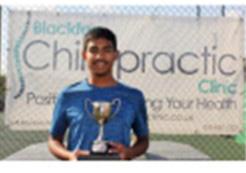
Eduardo Holovatyuk worked as a Ball Boy at the Tennis Championships, Wimbledon, having been selected from over 1000 applicants.
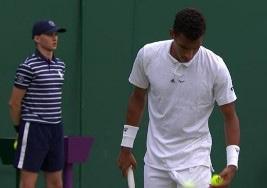
Congratulations to our First XV who won the FJ Schools Rugby Cup (The Jimmy Cup) at Sidcup Rugby Club. The squad overcame an excellent Hayes team to win 20 -14 in a hard-fought contest. Well done to all the team and the coaches for this excellent finish to a tough season. Thank you to everyone who has represented the school this term, not just for the First XV, and also for the support of parents who have driven their child to and from matches, and have watched from the touchline.
Congratulations to the squad for winning the Judd 7’s and also to our First XV Rugby Captain, Isaiah, who represented London and the South East against Midlands U18s.
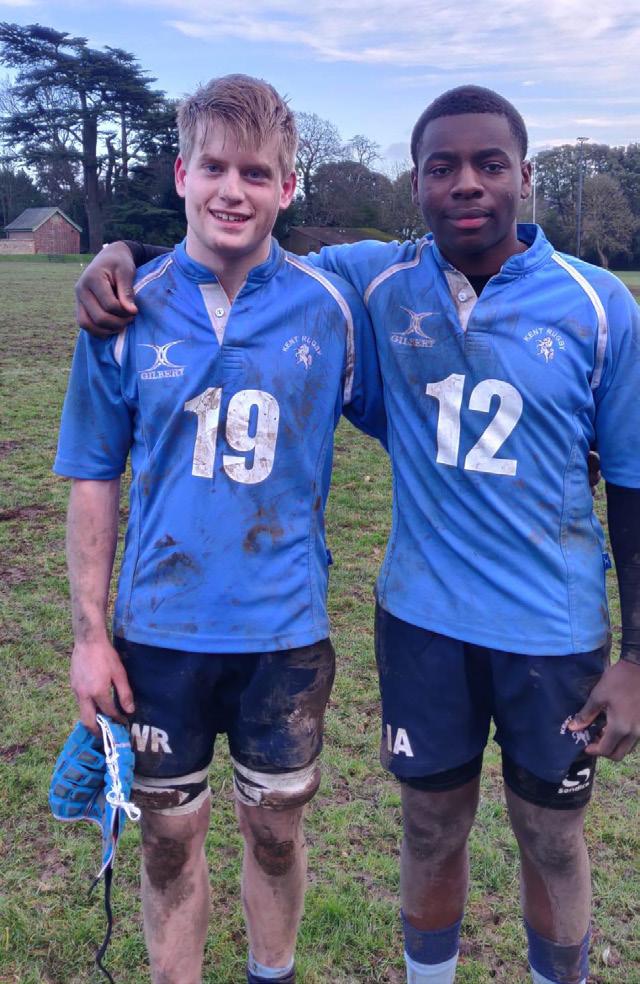
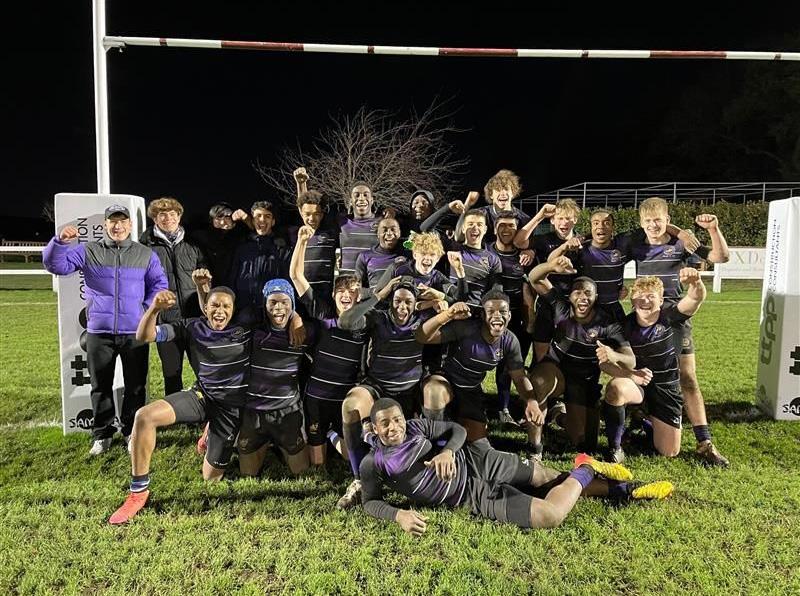
Genesis is the first Olavian to win this event.
There was also a succession of Olavian triumphs in the Eton Fives Association’s individual events held at Harrow School. In the U18’s, Navaneeth Madnavan and Aaditya Deshmukh both reached the Final, which Aaditya subsequently won. In the U16’s, Rishi Nandakumar and Aadi Agarwal reached the Final, which was won by Aadi. In the U14’s age category Oscar Rushton did really well to end the day as runner-up.
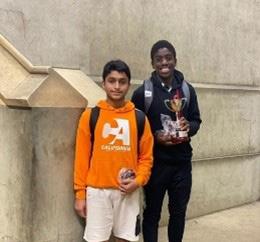
Genesis Nsenga, competed in the National Rugby Fives Under 16s Singles Championships hosted at Alleyn’s School. He played brilliantly throughout the event, defeating players from Durham, Alleyn’s, St.Paul’s, St. Dunstan’s College, and Edinburgh Academy. He made his way all the way through to the Final, where he defeated a very strong player from Tonbridge School.
Following his success in the Eton Five Schools’ Nationals, Folabomi Adenugba enjoyed more success a few days later in partnership with Old Olavian David Mew. Together, they won the Festival section of the Adult Midlands Championships held at Repton School. The London Open followed a few weeks later and the Festival section was also won by St. Olave’s pupils: Franklin Baron and Ethan Nancekivell-Smith triumphed in a tough field of seasoned adult players. There have been numerous fixtures including matches against Highgate, Eton, Westminster, Berkhamsted and Harrow. Year 12 and Year 13 students have competed alongside the Old Olavians in League Division matches and have enjoyed some impressive results. Lower School students have also made a flying start to the season and both large squads are making excellent progress. Well
done to the whole Fives Team for representing the School to such a high level!
Well done to all our Fives players who competed in the 2022 Eton Fives Schools’ National Championships. In the U16 Semi-Finals, Thomas Farmer and Aditya Anoop beat Harrow School in a very strong performance, winning 3-0. Their final against Highgate’s first pair proved to be another amazing match. After losing the

first set, the students were even more driven to win. Their determination paid off and Thomas and Aditya won 3 games to 1 (7-12, 12-7, 12-7, 12-10) becoming the U16s Schools’ National Champions. The U15s final saw Oluwafolabomi Adenugba and Aadi Agarwal put up a great battle but ultimately lost 3-0 to top seeds Berkhamsted. Meanwhile, at St. Paul’s School in Hammersmith, Caleb Boy and Genesis Nsenga started their U18s Rugby Fives singles campaign, qualifying for the semi-finals.
This year saw the return of the Sixth Form football team with many Year 12 and Year 13 students participating and producing very entertaining football. The team started strongly with a comfortable 5 – 0 win to Harris Academy Beckenham. Next was a tough away match against Ravensbourne, played on the Bromley FC pitch, which we narrowly won 1 – 0, with Nathan Daniel scoring the winning goal. The team then lost out 2 – 1 at home in a close match to a very good St Gregory’s team. Another defeat looked to be on the cards against Hayesbrook, but the team showed grit and determination to fight back from two goals down for a 2 – 2 draw, with Theodore Rhally scoring a last-minute equaliser! The next game was a decisive 5 – 1 win at home to The John Roan School, spurred on by a large and enthusiastic crowd of Olavian supporters, with Daniel Kenward scoring twice. Special thanks from the players to Mr Davis and Dr Sidhu for their coaching and support.
Year 9 student, Daanish, represented the London Under 14 Hockey team against Oxford, beating Oxford 2-1 in a hard-fought victory.
Year 9 student, Haris, represented Bromley in Hockey at the London Youth Games finals at the Olympic Park. He was a key member of the team that finished 5th out of the 32 London Boroughs.
Congratulations to Year 7 student, James Stoner, who was awarded his White Belt First Class in Doce Pares. This is an after-school activity at St. Olave’s, which James has been attending since September.
Congratulations to the St. Olave’s skiing team who competed in the Kent Schools’ Skiing Championship. They managed to finish 2nd in the Male Secondary Senior category and 6th overall. Oliver Tovarlaza came 5th, Tommy Higgins 11th and Victor Nguyen 12th in their category. Well done to the entire team.
Congratulations also to our ski team for their Bronze medals at the Kent School Ski Championships in May.
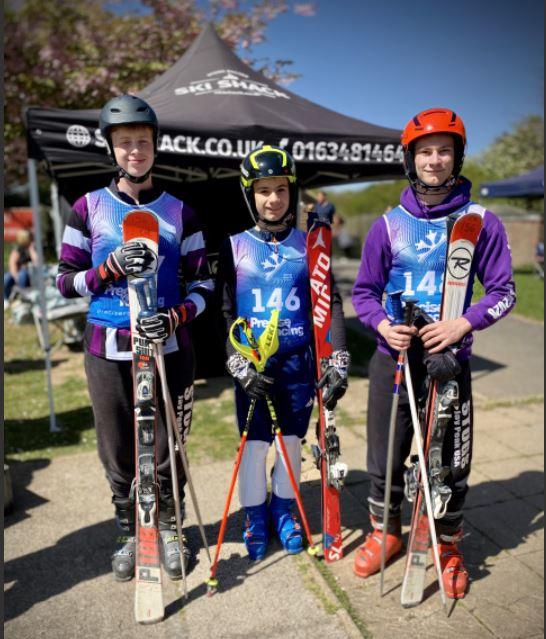
Niccolo, Tommy and Oliver really impressed and can be very proud of their achievement.
Oliver Tovarlaza also took part in the National Club races (dry slope skiing) in Norwich and finished 3rd in the U18 group (one of the most competitive age groups).
The school’s best athletes traditionally showcase their talents but many others also represent their House. Competition within the year groups, as well as for an overall winner, was fierce and it was great to see sporting rivalry between the boys upheld in good spirit. Special mention goes to Navin Mathew in 9K for winning the Junior Victor Ludorum as the most successful Year 9 athlete on the day. Bingham won in Years 7 and 9, with Cure winning Year 8 and Harvard Year 10. Well done to Harvard who were overall winners of the Sports’ Day trophy and thank you to Mr Kenward, the PE staff, the Premises Team and helpers for organising the day
Year 11 student, Paul Barkus, won a Gold medal in the U19 Badminton Doubles and Bronze medals in U19 Badminton Singles and Athletics in the Lithuanian Games.
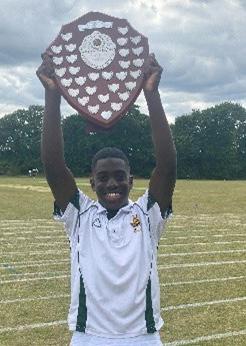
Max Capamagian represented Bexley in the London Youth Games and helped his team finish 3rd in the Road Cycling event.
Yani Djelil won the Southeast Cyclocross Junior Regional Championships.
Sannah Zaman became the U18 National Cycling Junior Hill Climbing champion. Perhaps even more impressively she also came 10th nationally in the women’s hill climbing. Both are outstanding achievements, well done!
Arjun Bhatia competed in the North Kent Junior cricket league. He was the second-highest run scorer across the U11-U14 cohort and also finished in the top 10 for bowling and fielding across the U11 cohort.
Arnav Singh was selected to represent the U11 London School’s cricket team following a successful season for both club and area, including being the highest wicket taker across all area age groups.
Aarush Gandham won Gold in table tennis at the HGTT academy tournament.
Isaiah Akpovwa was selected for the London and South East Divisional Rugby Squad and also played for Kent
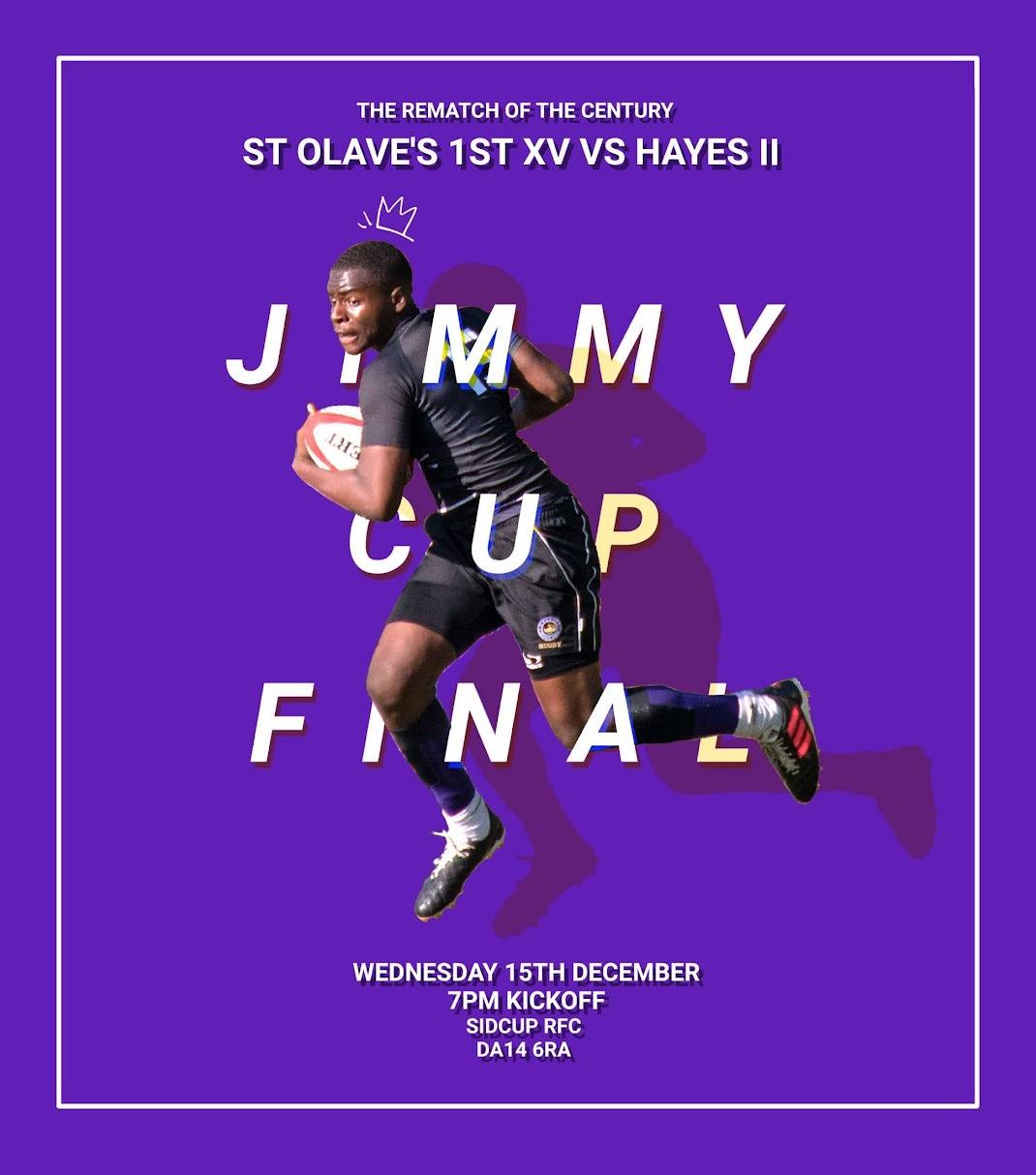
Arnav Shukla took part in the Shine Night Walk for Cancer Research which started late in the evening and finished at midnight. Arnav walked a half marathon distance and finished it in just over 4½ hours.
Our congratulations and thanks to Olavian parent Mr Michael Macedo, who completed the London Marathon with an impressive time of 2h 53mins smashing his target of 3 hours. We are hugely grateful to Michael, who is generously donating the funds he has raised to the School, which amount to over £3,300 (£4,000 with Gift Aid). He was delighted with how it all went and humbled by the generosity of his supporters, which will benefit the students’ academic achievements as well as their co-curricular opportunities.


The Art & Design department have had a hectic and difficult year, as with everyone, the pandemic has brought a series of challenges but for the students in Art & Design and the staff delivering the content it has been particularly tricky; limited access to materials and equipment, delivery outside of the Art studios, students working with whatever they can get their hands on at home, trying to deliver practical hands-on tasks via teams and video etc.. But, the resilience, determination and ingenuity displayed by the students engaging with the subject has been a huge bonus for us and represents the very best qualities we should aspire to for all of our Olavians and in many ways makes the quality of work produced even more special. We’ve had Pop Art periodic table posters, digital Art & Design workshops developed for students by students, Pop-Up interactive maps of personal spaces, students painting with food and making sculptures out of recycling as well as some outstanding work in more traditional formats. Please see two very personal works created by our students this year, the first is a response to the COVID pandemic by Samuel Rayner in Year 11 inspired by the work of Basquiat and the second is a much softer reflection on her family by Hannah Wallis.
As spring gave way to summer we experienced a real mixture of emotions, excited to have our students back and working in the studios and to see the amazing work our exam groups had been doing at home and hopeful for the future but also tinged with sadness in the knowledge that again we would not be able to hold our end of your
showcase exhibition. It is only in its absence thar we truly realise the importance and impact it has on the morale and spirits of the students as well as providing a suitable culmination for the course and a celebration of their hard work. Just before half-term we also wished Ms. Farr the very best as she departed on maternity leave and at the same time welcomed Ms. Ahmad to replace her, full of enthusiasm and bringing a new perspective on the Arts and especially adept with illustration she has quickly settled into the Olave’s community. Results at GCSE and A-Level have been excellent again with some students managing to exceed their challenge grades despite the difficulties and we continue to develop and work on our GCSE uptake. One of the unfortunate sideeffects of the restrictions within school was our inability to build on our Creative careers focused visits by external speakers and whilst our numbers have balanced a bit more at GCSE we would love to see more students opt to continue with us as they progress through the school.
We hope that this year will enable us to once again spread our wings a bit more, get the students out on more visits to galleries, exhibitions and creative careers trips and, fingers crossed, hold our annual exhibition at which you can experience the work for yourselves.
 Alex Clark Head of Art
Alex Clark Head of Art
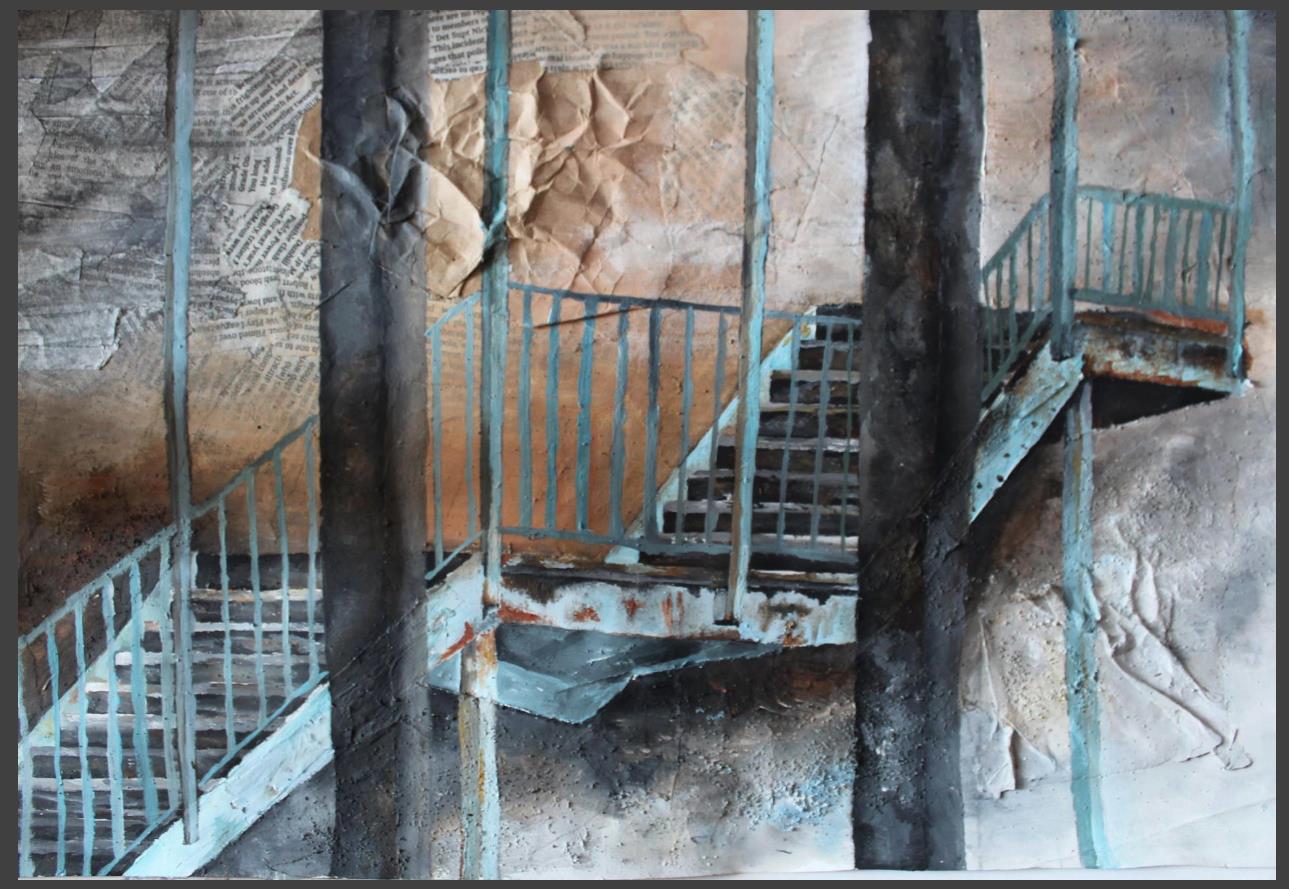
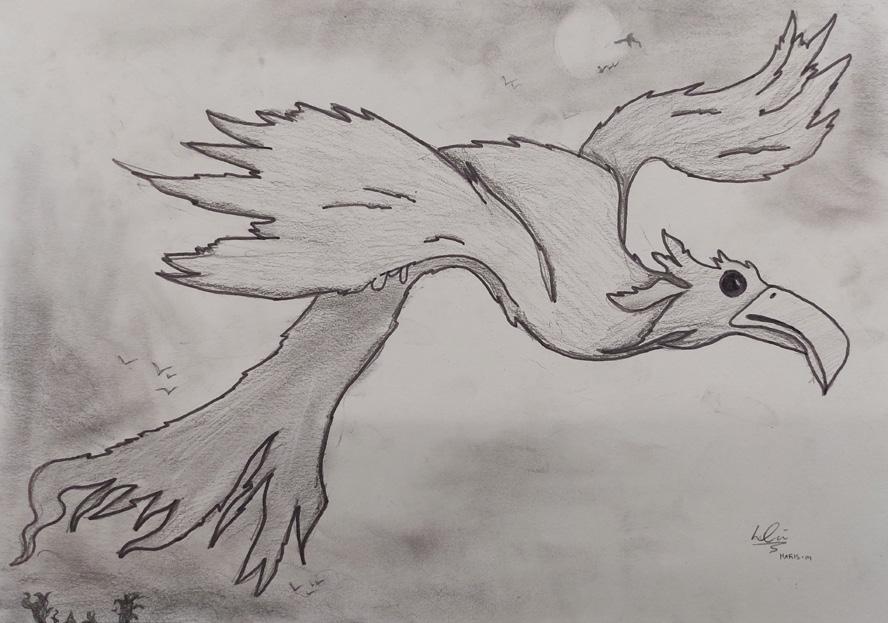
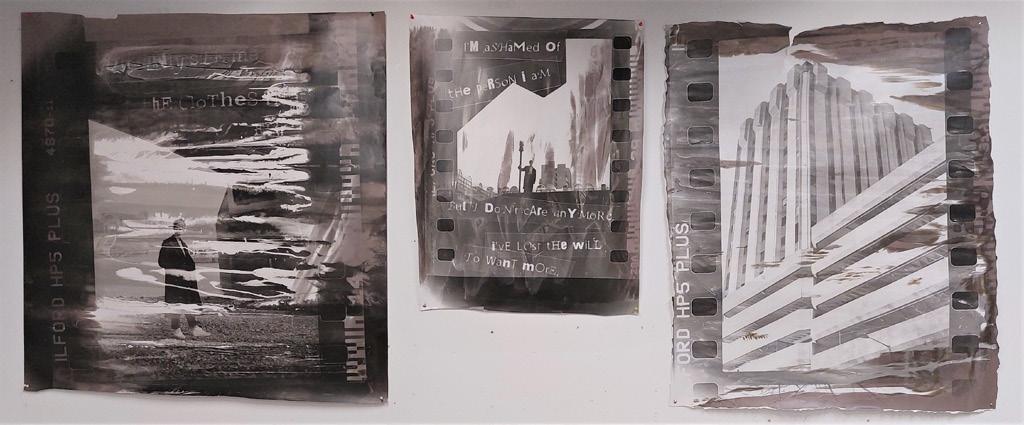

Congratualations to all the students and thank you to the Art Department for putting together the Year 13 Art Exhibition. The exhibits were diverse and thoughtful. They reflect the hard work and dedication of our students throughout the course of their A-Level.
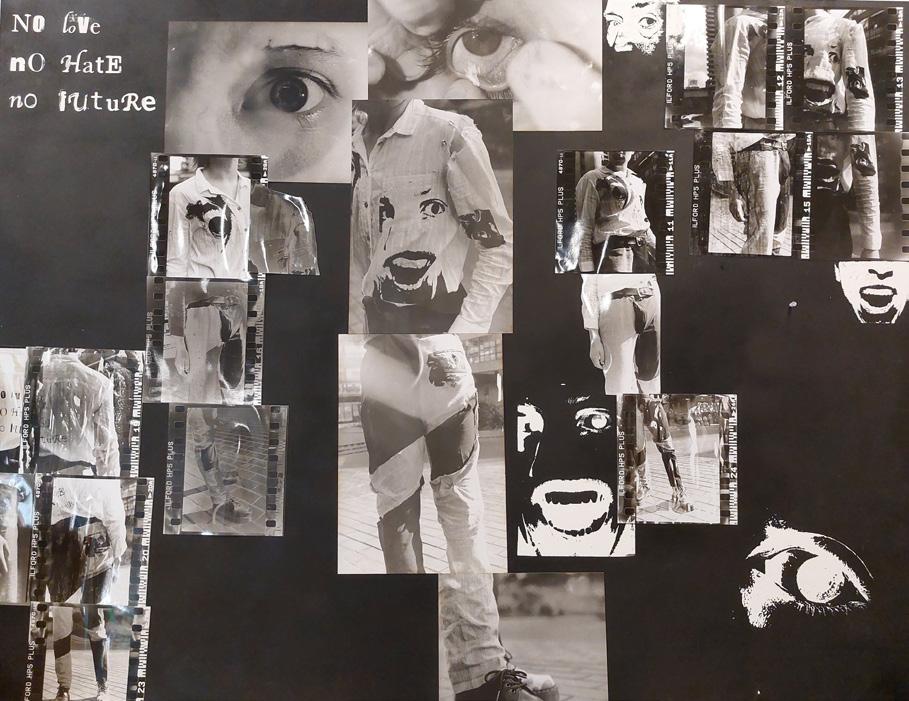
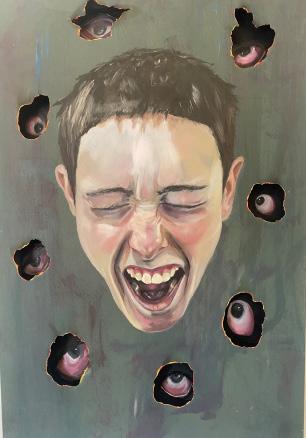
Hanming Wang won 3rd prize in the ‘Colourful Imagination of Ice and Snow, Best Wishes for the Winter Olympics’, International Youth Painting Invitational Exhibition.

Thishas been another very successful year for Design and Technology with both staff and students enjoying being able to settle back into the workshops with all year groups. Students showed great determination and hard work to build up the skills and experience lost due to lockdowns and bubbles and threw themselves into the opportunities offered both in and out of the classroom throughout the year. The department continues to grow with another large increase in interest in the subject at GCSE and students continuing to take part in numerous extra-curricular activities.
Rosie Hawley Head of Design & TechnologyCongratulations to the UK Space Design Team on winning their UK Space Design Competition Regional. They now go on to compete in the National Final in the Spring. Well done to our team comprising Nathan Plater, Macey Pattenden, Maia Guo, Esther O’Neill, Siddharth Mishra, Anupam Bandi, Scarlet Donoghue, Elodie Gorter, Isabella Fisher, Guneeka Chitkara, Max Dawkins and James Guest.


hard work and inability to accept failure was finally rewarded with a win in their 14th match and making it into the knockout rounds. The camaraderie which had developed was testament to the skills and teamwork that all participants had developed over the competition. The lessons learnt will be invaluable in coming back next year stronger. Thank you to Mr Savage for spending so many hours after school and at weekends helping prepare for the competition over the last few months and to both MrSavage and Mr Clegg for accompanying the students to Southampton.
A group of Year 12 students worked hard to design, build and program an autonomous robot for a national competition against other schools. This culminated in a visit to the University of Southampton to compete in the finals in May. Over the weekend the team worked hard so the robot worked as effectively as possible. This

The 2022 Season has been a long but exciting one for St. Olave’s students, as due to some previous delays caused by COVID, the season is still ongoing.

Regionals have taken place, with five teams entered by the school. The teams started this year’s competition in Years 9 and 10 but are now in Years 10 and 11. All five teams did extremely well, with every team receiving an award.
All five teams did extremely well, with every team receiving an award. The journey continues for two of the teams at the National Finals which will be held in

January 2023, in the NEC Birmingham arena alongside the Autosport International show.
In the Entry Class the new teams did exceptionally well, beating off the internal competition to even get the chance to represent the school at Regionals.
The attention to detail and hard work of the two Entry class teams paid off as Tori Veloci won the Fastest Car award. With team Inferno winning Best Engineered car and also taking 1st place in the Class. Both teams are looking forward to stepping up a category and are already working towards the 2023 season.
Development, some fantastic innovative thinking, utilising AI to develop the most aerodynamic car possible, saw team Tachyon achieve 1st place in the class, earning them a spot at the National Finals. A great achievement for their first season.
In Professional Class, the two veteran teams of Techtonik and Protonic who have worked their way through all three classes over the past three seasons, battled it out against stiff competition. Protonic’s imaginative and interactive Pit Display, meant they were awarded a Star Quality award. Whilst team Techtonik’s consistency and thoroughness with the rule book, secured them 2nd place in a tough division and earnt them a spot at the National Finals.
Whilst some teams look ahead to the National finals, others are already working towards the 2023 season. With the return of our Sixth Form team and National finalist Golden Motorsports, and seven new Year 8 teams, we are very optimistic about the future.

Congratulations to Year 12 students Max Dawkins, Rohan Selva-Radov and George O’Connor on being awarded the prestigious Arkwright Scholarship Award 2021. Every year, the Design and Technology Department offer students in Year 11 the opportunity to apply for the Arkwright nationally recognised Scholarship. Fifteen Year 11’s applied for the Arkwright scholarship during Year 11 and had to complete a detailed application and an aptitude exam. We were delighted that eight students were invited to interview, and very pleased with their commitment and dedication in preparing for this during challenging times. We are very proud of their success and hope this scholarship will nurture their passion for Engineering.

Congratulations to Year 12 student, Bukunmi, for curating an exhibition for the Surface Design Awards at the Business Design centre. The Surface Design show is a prestigious event where pieces from the 48 finalists of the Surface Design Awards are showcased. The selected pieces highlighted the innovations in surfaces from architectural practices around the world. Bukumni was successful in creating an exploratory experience, by playing with lighting and fabric where attendees of the event curiously disappeared into the forest of fabric she created. She explored a range of materials varying in thickness, colour, and size, all to accentuate the theme of the Surface Design Awards
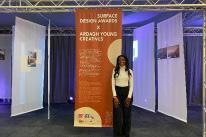
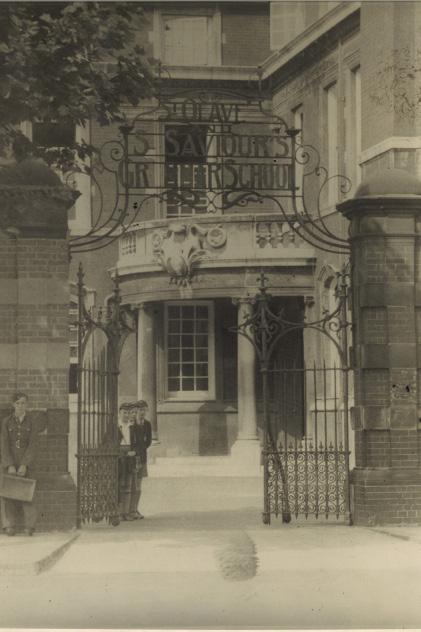
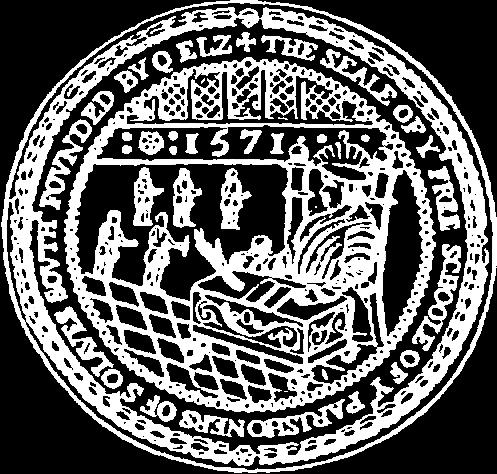
I wrote the next two paragraphs in the first week in September, and I have decided to leave them as I wrote them then.
On 6th February 1952 there was a very unusual occurrence at St Olave’s, certainly unique in my experience: the whole school was called to an assembly in the Hall at about two o’clock in the afternoon. I don’t think anyone knew why we had been summoned in this way until Dr Carrington addressed us. He told us the sad news that the king, George VI, had died and that we should not be surprised to see members of the public showing their emotions as a result. This meant, of course, that we now had a Queen as our monarch and, as most of my readers will know, she had to fly home almost immediately with Philip, soon to be made the Duke of Edinburgh, from their holiday in Kenya.
Elizabeth II is still our queen, and we have this year celebrated seventy years of her reign. What a wonderful reign it has been, seventy years – and more – of dedicated service to our nation. Sixteen months after her father’s death, she was crowned in Westminster Abbey. It was 2nd June 1953, and my mother took me and my brother, Hugh, to sit on the edge of the pavement in The Mall throughout the previous night so we could watch the spectacular procession of marching troops and carriages on the day itself. It was unforgettable, and I shall always be grateful to my mother for taking us there for such a special occasion. I also remember that we had to relearn our national anthem, even though it only meant changing one word several times.
A few days after I had written that, of course, there came the desperately sad news that the queen had died, and our lives were changed as a result. Now the older ones amongst us will have to get used to singing God Save the King again.
Last year I wrote that we will all have lived through one of the more difficult years and this has been followed by another during the past twelve months. I managed to catch my almost inevitable dose of Covid in April and had to miss scoring one of my county cricket matches for Derbyshire as a result. Later in the season I suffered a loss of appetite, accompanied by sickness which caused me to miss another two weeks of the role which has given me so much pleasure and satisfaction over the last twenty-three years of my life. My doctor decided that I should have a couple of CT scans, but thankfully, after several weeks of waiting, I have heard that these do not seem to have produced
It seems quite likely that this will be my last season scoring for my adopted county as they look to find a replacement who is younger and thus with a greater potential shelf-life.
I thank those Olavians who have sent contributions to interest and/or entertain our readers. I hope there will be others who will feel tempted to record their own personal recollections of the “happiest days of their life”. You do not need to be very old – even those of us who have left school quite recently must have their own stories to tell. Why not share your experiences with the rest of us?
My thanks go to Clare Cockshott for her help in producing the OO section of this magazine: we are most fortunate to have someone who gives so much of her time and expertise in looking after our interests.
John M Brown (1948-55) Editor, Old OlavianAs I do every year in late September/early October, after the annual Reunion, I look back over the Society’s previous twelve months.
The School’s service of Remembrance was held in the Great Hall on 11th November 2021. Old Olavian, Graham Milne (1963), laid a wreath together with Captains of School, Millie Hennessy and Steven Coker.
All of a sudden a new year had dawned (time passes so fast as you get older!). Covid was less threatening due to vaccines, but the world would be no less scary due to a war in Europe and the frightening economic prospects caused by the costs of Covid and that war in Ukraine. This being the beginning of financial hardship for so many, it is worth remembering that our small charitable trust, The Old Olavians Benevolent Fund, was created over one hundred years ago to help in such cases. If any Old Olavian is facing hardship, then the trustees, of which I am one, would like to hear.
Our Society has survived through worse times over its 120 years! Since it was established in 1882 the headline objectives have changed little and are the bringing together of Old Olavians for the furtherance of personal friendships, and the maintenance of support and loyalty to St Olave’s School.
Every ex-pupil and member of staff is recognised as an Old Olavian and all are invited to join the Society.
In March 2022, as in the previous year, the Society’s AGM was held via Zoom. It was well-attended and the minutes are published below, showing last year’s donation to the School. The accounts referred to in those minutes were signed off by our honorary Auditor, Paul Askham (1977), and showed the following:
2023 will see similar, if not more, numbers attending.
Our annual Reunion was held in September. As usual it provided a reason to meet up with old friends, including some that had not had contact with each other for many years. You will read later how that feels in the articles submitted by some of this year’s attendees. The toast to the School was proposed by this year’s honoured guest, Stephen Hickey (1997). He is a British Diplomat, currently working in the Middle East, Former British Ambassador to Iraq, and Ambassador and Political Co-ordinator at the UN in New York. His very entertaining speech gave many fine examples of how St. Olave’s had prepared him for his life as a diplomat.
I know that Stephen has also given up some of his time to the School. It is one of the main ways that Old Olavians are able to support the School, by sharing their experience with current Olavians. That support can be by way of giving interview practice/advice, or by talking to a society, or by talking at a careers event. I applaud all those who give up their time to help current Olavians. You know who you are.
Through the voluntary Subscription and Sponsorship membership, the Society is also able to provide some financial support to the School by way of an annual donation. These funds have been used for a wide range of items over the most recent years. Examples include:
- Employing a chess coach,
- Refurbishing of the Holyoak Room (to make it into a functional teaching environment),
- Equipping the kitchen classroom,
- Helping with travel expenses for a team to compete in the VEX Robotics World Championships in Kentucky, and
- A significant donation (£40,000+) towards the new Fives courts
In the last year, funds previously donated were used for the upgrading of the audio and visual technology in the Great Hall.
It is hoped that the next AGM can be held in person in 2023, as well as via an Internet Conference facility, thus ensuring that all who wish to can attend.
The School’s annual service of Commemoration and Thanksgiving in Southwark Cathedral was held in May with a number of Old Olavians attending. Lunch beforehand provided an opportunity to share memories. I hope that
We should also say thank you for a generous legacy willed to the School by Bertie Robinson, who left the School in 1947; this was used this year to refurbish the stained-glass windows in the Great Hall. You will see a photograph of one of them below.
Membership of the Society also gives full access to our
website, which among other things has photos and other archive materials uploaded by members, a calendar of events and a Business and Networking portal.
As the Chairman, I currently produce a newsletter every two months, which highlights items that may be of interest to the members, including Old Olavian achievements; Old Olavians raising funds for charity; new publications by Old Olavians; upcoming events in the Society’s and the School’s calendars; and news from the School.
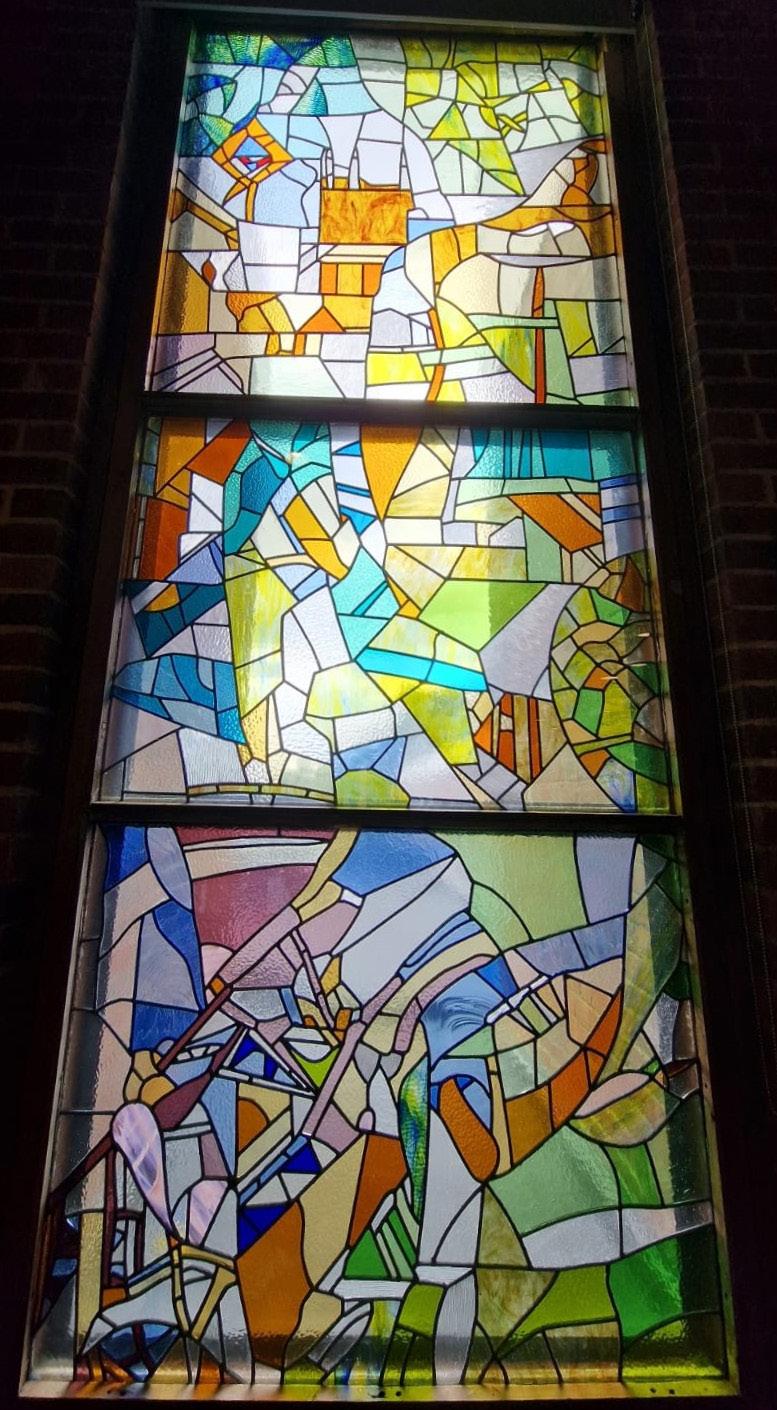
I would like to hear from any Old Olavians who have news that they want to share and I so look forward to meeting you at a future event.
Chris Harris (1970-77)chairoldolavians@gmail.com
Old Olavians Society website
https://stolave.ptly.uk
Wednesday 24 March 2022 – 19:30
Opened at: 19.31
Closed at: 21.11
Attending: Committee Members: Chris Harris (1977), Chairman (“CH”), Paul Ouseley (1977) (“PO”), Rajiv Purwar (1977), Graham Milne (1963) (“GM”)
Others attending: Andrew Rees (Headteacher) (“AR”), John Brown (1955), Ian Giles (1966) (“IG”), Roger Hammond (1973), Laurence Harris (1970), Richard Norman (1962) (“RN”), Keith Richards (1949) (“KR”), Mike Roberts (1965) (“MR”), Andrew Sawczenko (1981), George Snelgrove (1964) (“GS”), Howard Wiseman (1987) (“HW”), David Woodward (1972)
1. The Chairman welcomed members present and introduced Andrew Rees, the headteacher, who outlined the school’s plans for the future: Clear Vision, in which the School would be part of the wider community involving various groups, including the Old Olavians. He outlined a master plan for the development of the school site which had already seen many changes in the fifty-plus years since it had been built on the present site. The architects are Walters and Cohen. AR reported that Clare Cockshott is the temporary contact for OO liaison at the school, until a permanent replacement for Veronica is engaged. Two damaged stained glass windows are being replaced as the result of a generous bequest by Bertie Robinson (1947). AR also confirmed that OO visitors are always welcome for a conducted tour of the site.
2. Apologies from Bill Prouse (1977), Derek Marshall (1956), Jim Madden (1979), Ian Woods (1970), Peter Leonard (1977), Ray Franklin (1965), Philip Clare (1983), Richard Sharman (1963),
3. Minutes of Last Meeting: The minutes were agreed to be a true record of last year’s AGM and were unanimously approved.
Matters Arising
Website: Feedback on the website continues to be largely positive, but improvements are still sought.
Mike Roberts volunteered last year to look after the photo albums on the site.
CH has been liaising with Lucy Crawford, the new Head
of Finance, who is setting up a Development Team. We expect to hear more on this and how we can continue to support the school.
The Fives courts have not yet been officially named.
Membership: There are 3023 names on the database with all leavers’ names having been added since last year, although we only correspond with those who actually register as members. 2568 of those registered have an email address. We continue to try to make contact and add new email addresses. As at year end 30th September 2021, 346 members paid £20 or more entitling them to the magazine, and a further 189 paid a lesser amount, giving a total of 535 paying £9,882. This includes thirteen sponsorship members, paying £975. CH wrote to all members subscribing less than £20 asking them to consider increasing their donation, to which there was a limited response.
Society Admin: There is little change to report, with the school still seeking a replacement for Veronica Andrews, the OO administrator. Our thanks go to her for her considerable contribution to many OOs and their families.
The audit is currently managed by the committee, with thanks to Paul (Frank) Askham (1977), our honorary auditor. For legal reasons the audit will have to be known by a different name in future years.
Magazine: Thanks again to John Brown, our editor. The magazine has been delayed this year, but it should be with members in the near future. Contributions for future editions are always welcome.
Website: Members are visiting the website more frequently now. Photos are especially welcome.
The new pages developed last year were: Announcements eg Deaths, Births and Marriages. Archives – A timeline with links to photos and documents. As the Olavian archive is digitised by the School, the magazines will all be available in our Archives. Old programmes from performances or sports days can all be uploaded to the website (CH can help with this if need be). It is hoped that a new page ‘Alumni Stories’, a biographical description of individual OOs’ lives so far, will be added this year.
Newsletters: Feedback has been positive following two years of distribution every two months. OO news is especially welcome.
LinkedIn Group: CH hopes for more support to run this
facility, which currently has 659 members. In order to be an effective group, members are asked to contribute articles of interest to the other members, e.g. relevant news items and job opportunities
Facebook: CH continues to run this facility which has 871 followers. Feedback on how to improve its content and presentation would be welcome. It is another way to contact the Society and will continue.
6. Changes to the Society’s Constitution: There are four main changes to the constitution being proposed.
- A change to the name of the membership type from Registered member to E-member
- Changes to the number of officers on the committee, the number on any sub-committee, and the number to make a meeting quorate.
- A change to the wording re the signing off of the accounts.
- The ability to hold all meetings virtually, or with some participants attending virtually.
GS made several observations and proposed (seconded GM) the changing of the proposed wording, all of which were accepted nem con. The full updated Constitution is downloadable from the website.
7. OOs Funds Donated to the School
OOs Account: The current balance is £27,971.73, all previously donated by the Society and not yet spent. They are, however, all earmarked for refurbishment of the Great Hall, but this amount is not enough to cover all the work which is planned. It is recognised that some of the funds donated effectively covers part of the cost of the support given by the School; and it is important that this is recognised if the Society is to continue to get the future support it requires.
Head teacher’s Hardship Fund (funded from the defunct Marshalls Fund and our Benevolent Fund)
These are available for students in need; the Headteacher has not made any request for help from the Benevolent Fund in recent times.
8. Finance Report
Society Accounts: Total Subscriptions are up £510 on last year (including those non-recurring £400); investment income and deposit interest both down slightly. .
The 2021 reunion lunch was held after the end of the financial year: most of the income is shown, but none of the expenses. The lunch will have been subsidised by about £230.
CH recommended making £10,975 available to the school, including the sponsorship money, in accordance with the current policy to maintain a minimum Accumulated Fund of £25,000 after the donation to the School.
Proposed by CH (Seconded PO) - Agreed nem con
CH proposed a repeat of the usual donation of £500 to the OOs Cricket Club to assist with tour expenses, but this was amended to £1000 (proposed MR Seconded GM) Carried nem con. It was agreed that the usual donation had been in place for over ten years and tour costs/expenses had significantly increased over that time.
Benevolent Fund: The trustees have not donated any funds to the School in the last three years for the Headteacher to use in cases of hardship. No direct requests for assistance were received.
9. Functions Report: The reunion was a success with David Craig , retired Head of Classics, acting as guest speaker.
The result of the recent questionnaire showed that the majority view was for future reunions to be held at the School in the form of a lunch on a Saturday. It was suggested that it might encourage older members to attend if transport (perhaps school minibus or lifts from members) could be arranged to convey them to and from the station.
If a year group wants to arrange a reunion, CH would be happy to provide them with information to help with the arrangements.
There was no Savoy Choristers reunion last year, but one is planned for the second Sunday in July this year.
Fives – Howard Wiseman reported on another successful year for the club, during which they had just won the Barber Cup for the twenty-third time. There are two hundred and fifty Facebook followers, 60 active players , with thirty-five of them being regularly active. HW had some disturbing news regarding the new courts: he had raised and spent £330k including £40k from the Society for the construction of four courts, but the quality of the
build had been substandard and two of the courts had to be demolished; the building firm involved had become insolvent, so they could no longer be held responsible for the shortcomings. Unbelievably it seems none of the £250k cost now required to complete the project will be covered by insurance. After discussion, and advice from RN, it was agreed that HW should make further enquiries by consulting a legal expert (preferably OO) with experience in insurance to consider the terms and conditions of the original policy/ies.
Cricket – Ian Giles reported that the tour of south Devon in 2021 had been a success with three generations of OOs amongst party members. He appreciated the increase in OO donations which would go towards the costs of ground hire, supporting young cricketers and cost of balls, etc. There would be three mid-week matches in the London area this summer against Old Wilsonians, Old Dunstonians and the School.
Lodge and Chapter – Graham Milne gave an up-to-date report on the Lodge’s activities during the year.
Chairman Chris Harris
Secretary Bill Prouse
Treasurer Paul Ouseley
Committee member Raj Purwar
Committee member Graham Milne
RN proposed (KR seconded) re-election of full committee - Carried nem con.
Peter Leonard (1977) has volunteered to be the School’s archivist. IG reported that there is a great deal of cricket club material which deserves to be archived.
RN asked if we could look out for bell-ringers as he has started an OO group.
Mike Roberts appealed for photos which could be included on the website and other outlets.
There being no further business the meeting closed at 21.11 with thanks to all for attending.
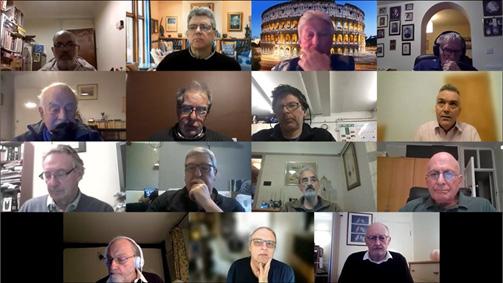
Our chairman, Chris Harris, talked to many Olavians who attended the reunion lunch and persuaded (bullied?) them into writing a contribution about their experience on that day. These follow:
Brian Milbank (1972-79) wrote: Some of our school year had kept infrequent contact over the years. The email list is up to sixteen at the moment, which isn’t bad considering there were ninety boys in our year, and at least three are no longer with us. When we realised it was fifty years since we first walked through the gates in 1972, it was too good an opportunity to miss. When someone mentioned that our form master, Mr Evans from the 2nd year (year 8), would be there, that clinched it.
It was interesting to see what has changed and what has stayed the same. Coming in from Goddington Lane looks the same: the chapel, the view of the rugby pitches, the headmaster’s house. A bit further in and the quadrangle is now covered, but everything is recognisable. Room 8 where we started, moving to Room 5, then Room 2 as we progressed. Then moving further in and a peek into the Small Hall shows the first change. It has been extended into the Speech Room, our form room for the 5th form. From there, so many changes. The carrels have been removed from the Great Hall balcony; the science labs have moved, the music room has moved. The most obvious changes are the new buildings. The sixth form blocks, additional changing facility, additional Fives courts, additional all-weather pitches. But where is the amphitheatre? It must be under the mass of bushes. Where are the bikesheds? And where is the swimming pool?
Everything has to adapt to the times and St Olave’s has moved forward in most areas. However a quick look into the metalwork and woodwork rooms gave me a reassuring feeling that these were the same. And I’m sure that lathe was here fifty years ago. The equipment in the gym looked familiar too.
The lunch itself was a time to catch up with some people I hadn’t seen for over forty years. The head boy from 1979, the boy I used to go to scouts with, two years older than me, the younger brother of someone who was also in the school’s barbershop group (is it still going?). And of course, Mr Evans, our form master, who got me through O Level history (Grade B). Does anyone else remember the Prime Ministers from 1815 to 1914 in chronological order? Finally there was Mr Davies, the music teacher, who remembered me in the barbershop group. We talked about Mr Sykes the Physics teacher who started the group, and his conducting style.
Most of my table, boys who joined in 1972, went on to The
Maxwell. It is where I had my first pint in 1978 returning from a school trip to the Hayward Gallery, hiding behind the fruit machine in case the barman saw how young I was. On arrival it was good to see many year groups were there, each reminiscing about old times. The Maxwell is as much a part of school tradition (for the 6th form at least) as singing “Gather Us In” used to be at the end of each term. I’ll definitely come back to the school again, and I won’t leave it forty years next time.
David Evans (1979) wrote: The Reunion was memorable for many reasons. Returning fifty years after we started in 1972 evoked many vivid recollections. The speeches were excellent, the food great and the event was thoughtfully and well managed.
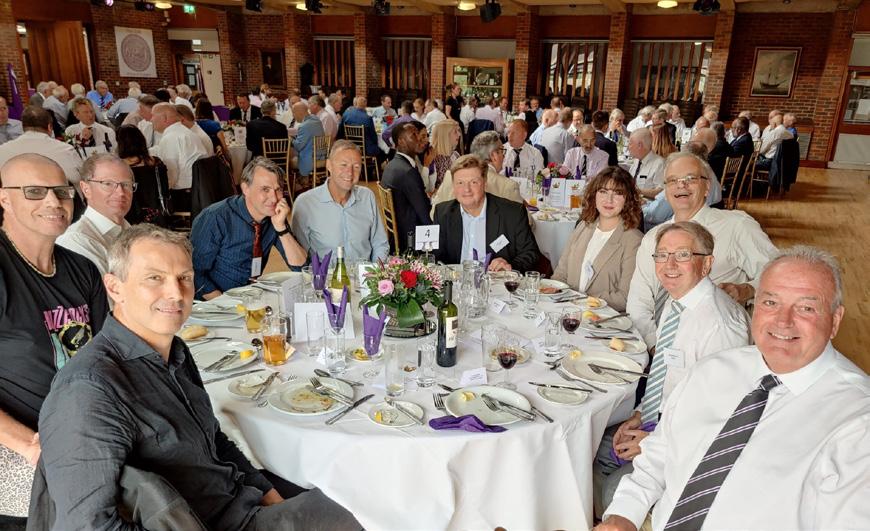
Anxiety of being frog-marched to the staff room for a dressing down proved unfounded. As well as being brilliantly executed, there was a real human touch, with recent leavers on hand to give tours and sit as a guest on each table.
The lasting memory was of course the people. The years melted away as former classmates mingled. It was a particular privilege just simply to say thank you to former teachers. To Alan Evans, a history teacher who brought his subject to life for us, Stephen Davies who sparked a lifelong love of music, and John Burston who had the foresight to realise just how beneficial it would be to take us down Grimethorpe Colliery – right to the coal face. But my own personal highlight was being able to ask Howard Wiseman to pass on my thanks to his father, Dennis, who saw something in me that I didn’t see in myself all those years ago and also encouraged my nascent interest in politics.
We didn’t realise or acknowledge it at the time, but how fortunate we were to have been given such a start in life.
I would thoroughly recommend the reunion to any Olavian young or, as with us, rather older. And then of course there was the school song…..
Graham Bennett (1977) wrote: And did those feet in ancient times (the 1970s)
Richard Walker (1984) wrote: Arriving early for a nostalgic walk around the school I was amazed how much it has changed since I left in 1984. There’s a whole new block/quad and much improved sporting facilities with enhanced and new fives courts and a shiny new all-weather artificial five-a-side and football area. Oh, and the pool has gone as well! Fortunately the good weather made this nostalgic wallowing a lot more pleasant than last year’s torrential deluge.
It was great to meet up with old friends including two of my ex classmates who I have not seen since our schooldays. The fact that one of them is retired didn’t make me feel any younger though. It was a really enjoyable afternoon with great chat (the passing of nearly forty years seems to make no difference), an excellent meal and well stocked, given that it’s a school hall, bar.
Our illustrious guest speaker old boy gave an entertaining speech and the event was wonderfully rounded off with a rousing rendition of the school song. This was supported superbly, enthusiastically and musically, by my old music teacher, Mr. Davies, on the organ. and enthusiastically by the assembled Old Olavians.
I have only attended two of these events but am certainly planning to go next year. If you are thinking about attending, give it a go!
There! It was there in that classroom that dear, scary old Des Swinburn cut short – after one line – my compulsory, First Year audition for the school choir; wise man. And I remember him, too, up there on the balcony in the Great Hall, rousing even the most cynical of us with his rendition of Jerusalem on the school organ, his robe flowing behind him. And here’s the Chapel, always so impressive to my eyes, modernistic in design, where two classmates flagrantly performed Money by Pink Floyd; how did they get away with it? And there, over there; that’s the Chemistry room, where our teacher, with shaking hands, did the brown-ring test, while we all held our breath. And the room where we did German in the Fifth Form; Was ist das? Das ist ein buch! How did we pass our German O-Level? And the Fives Courts; I was a good athlete, but I never did quite get Fives….
As I wandered through the school, I seemed in a dream; I knew which staircase to go up to see where I did Geography, my best subject, I found my way without hesitation to the library, I sat down in the Lower Sixth Common Room and wondered what had happened to my old classmates, who had such very different dreams of the future, who were such an eclectic bunch. I had not been inside St Olave’s since I left the school in 1977, and many things have happened in my life since then, good and bad; like all of us. I don’t know what decided me to go to this reunion; it just felt like the right time, like I needed it somehow, a look-back before the next step forward. And my old classmates, those who were there, welcomed me without hesitation, and conversations sparked like we had never been apart. It was clear STOGS had had a big impact on the lives of those men – and women, too, since the school started to introduce girls into the Sixth Form. When I left later that afternoon, and in the next few days, many, many other thoughts and memories came into my head, including fellow Olavians, some of my best mates, who were not there: where were they, what were they doing now? If you have ever thought of attending an annual reunion but have thought: no, too much bother, too long ago, too embarrassing, no-one will remember me; well, think again, and come along next year, for the food, the banter and the memories of Jerusalem resounding through the air in that strange, inspiring, thought-provoking place where we grew up, that we were part of and are still part of!
Ian Ketchin (1982) wrote: In recognition of the 40th anniversary of leaving the school, members of the 75-82 cohort decided to rally a strong turnout at the Old Olavians lunch this year. Eleven classmates of the original 1C, travelling from as far afield as Portugal, the United States and Goddington Lane (!), were joined by four further members of their year group. On entering the school much
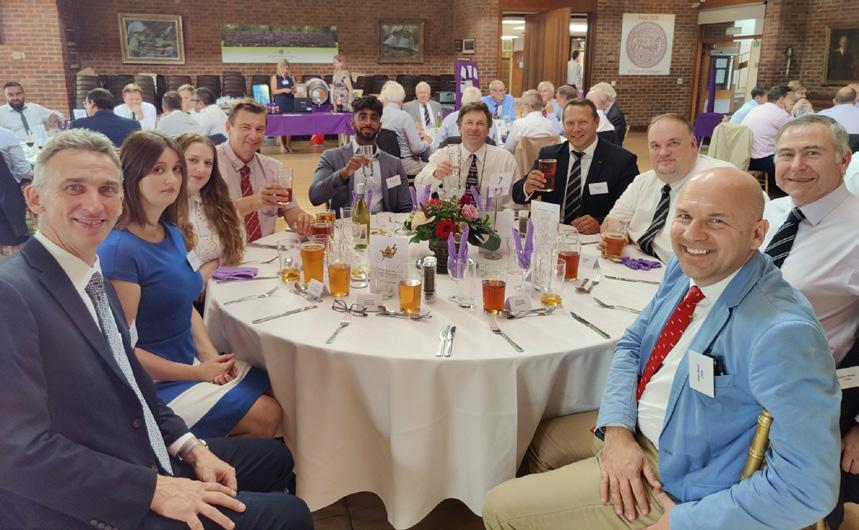
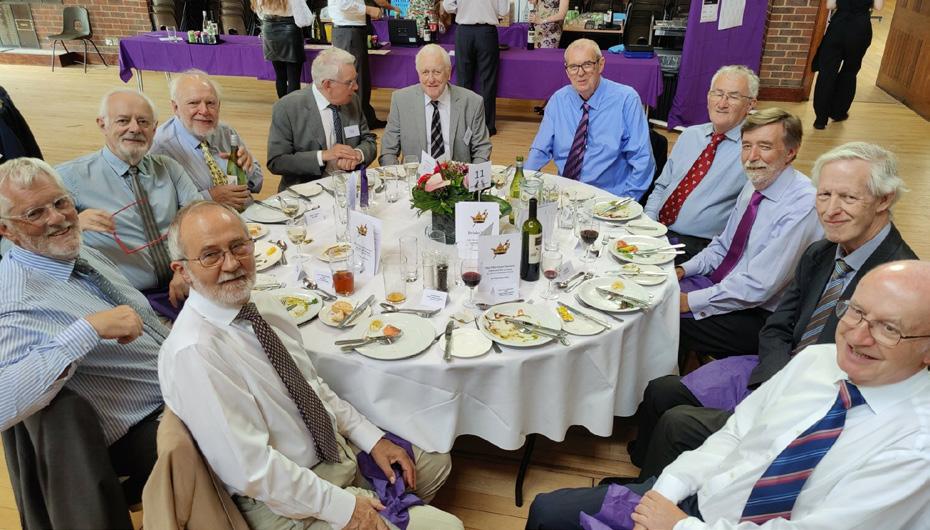
seemed very familiar: the Quad, the Great Hall, the spiral staircase to the Library! A tour of the school prior to lunch was a wonderful opportunity for us all to see how the school buildings have been extended over time and to reminisce about our time at the school. Assembling in the Great Hall for lunch it was surprising how easy it was to pick up where we had left off with friends we hadn’t seen for forty years and with whom we had shared so many experiences.
Indeed, it was wonderful to reunite with classmates after all this time, but it was also a joy to share our table with members of the senior prefect team who had just moved on from STOGS. Of course, younger and far brighter than any of us, but what an absolute pleasure it was to listen to their experiences and compare stories on legendary teachers that have helped all of us on our way! Some of the old boys would like to thank a few of these young Olavians for their support and encouragement in climbing over the locked Park Avenue gates after the event. Scaling seven feet gates without incident in our late fifties clearly demonstrates the solid foundation of education gifted to us, to rise to every challenge and push forward without fear! It’s also a testament to the effectiveness of our PE lessons all those years ago…
OO Chairman, Chris Harris (1977), and his team had organised an excellent event. Headmaster Andrew Rees was the perfect host, bringing everyone up to date with the achievements of the current cohort of Olavians and Stephen Hickey (1997) gave a very entertaining speech. It was wonderful that several former staff from our time, including Mr Coulson, Mr Davies, Mr Burston, Mr Evans and Mr Loader were also present. Our thanks go to all of them for making it such a memorable day. I’m sure all the 75-82 intake present would thoroughly recommend the reunion lunch to all Old Olavians (and the after-party in the Maxwell!).
Peter Brown (1982) wrote: A quick word to thank you for all your work in arranging yesterday’s reunion. I had a wonderful few hours in great company.
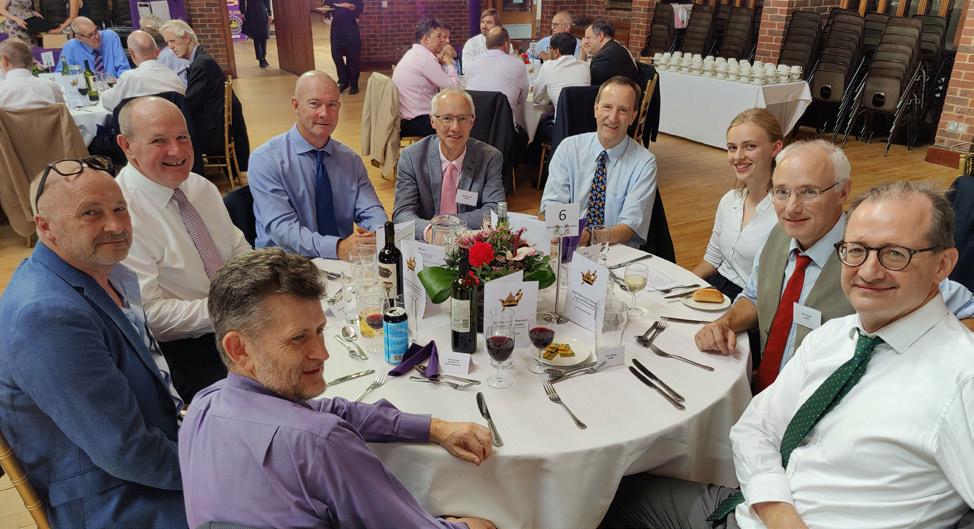
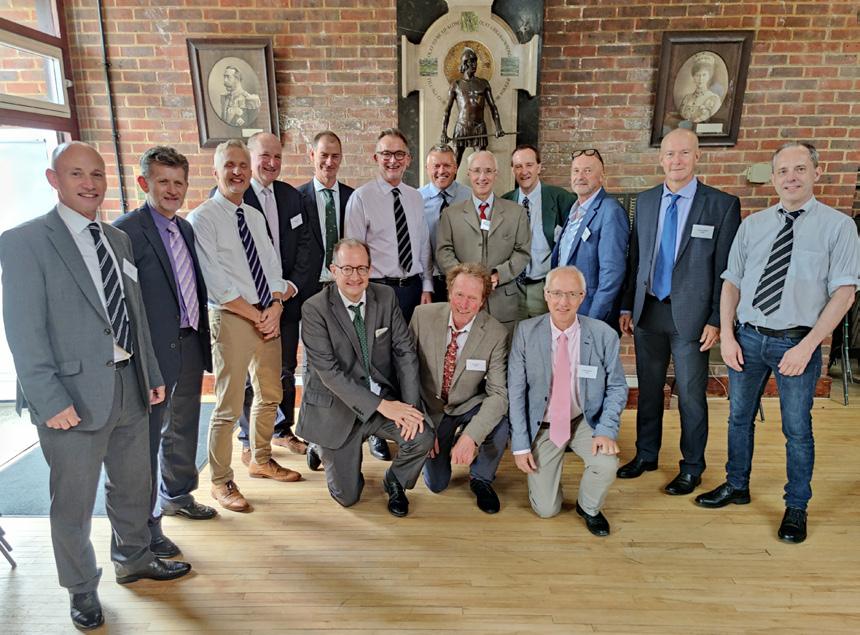
Eleven of us from our form attended the lunch. That’s not a bad turnout from the possible twenty-eight (two have tragically died already) and ten of us sat in the Maxwell chatting late into the evening. I was struck by how naturally a group of lads who, more than forty years ago, spent their formative years together, can sit and talk so easily and be fascinated to hear each other’s stories.
Like many ex-choristers (though not so many this year) I always look forward to the second Sunday in July, when the ex-Choristers’ Service – as it was once termed, seemingly no more – of the Queen’s Chapel of the Savoy takes place. It is, of course, no longer directly stated but is still woven – albeit less densely – into the fabric of the regular Chapel Matins service.
As time passes, the number of ex-choristers stays pretty much the same, but their age and service years grow closer to the present-day, as veterans of all us one-time boys who sang pass on.
On Sunday July 10 this year I could hardly say I felt ancient, and I do not know, in truth, if I was the oldest ex-Savoy Chapel Chorister present – but it certainly felt like it at 83!
I was in the first post-war Savoy Chapel choir drawn from members of St Olave’s Grammar School choir in 1951; there were, I think eight boys chosen. I loved singing. Whilst I cannot now recall all of their names, among the group were several who went on to make notable careers. Principally, Martin Carthy, who became one of the country’s finest folk-singers (MBE) and who played a major role in ensuring Paul Simon made his first recording as a solo artist for CBS in London in the mid-1960s (I published a book on Simon & Garfunkel in the 1980s). Another was Colin Jeynes, who went on to become the chief executive of Doncaster Council and also conducted
choirs and jazz bands in Doncaster for many years. I recall that Colin, in particular, had probably the best voice of all of us, though neither he nor I was selected for the 1953 Coronation Choir: only two Savoy Choristers were chosen at that time – Brian Mick and a guy called Woodhead (whose first name I forget), and I can recall to this day Colin’s outstanding account of Mendelssohn’s ‘Hear my Prayer’ – for which the then chaplain – The Rev Cyril Cresswell – handed Colin five shillings (25p) in the vestry after the service! - the equivalent of £5 today.
We did the annual Beating the Bounds Ceremony a couple of times – there is a national newsreel item of one of them – and occasionally joined the St Paul’s Cathedral Choir for the annual St Matthew Passion performance in the cathedral, and were taken on a day trip to Southampton (I think it was) to visit ships and have a slap-up meal. In those days, of course, St Olave’s was still in Tooley Street, right next to the London docks, where the dreaded Headmaster was the legendary (and infamous) Dr R.C.Carrington – his divorce was the first in English legal history since Henry VIII where evidence was heard in camera.
Dr Carrington certainly believed in the homily ‘Spare the rod and spoil the child’ – the slightest misdemeanour, it seemed, warranted at least two whacks across the buttocks – I certainly got my share. But he was a superb teacher – much later, I was enthralled by his lessons on American History and Politics.
Our music master was Dr Henry Bromley-Derry, a magnificent musician and organist – he was Grand Lodge Organist of British Freemasonry at Great Queen Street –much later, following my own initiation as a freemason, I was able to play several organs at the home of UK Freemasonry, though it was many years before I knew of Bromley-Derry’s appointment by the Grand Master, King George V.
We all loved Bromley-Derry, who sadly after a few years took ill and could no longer train us or play the organ at services: there was an interregnum with a competent musician, whose name I forgot long ago, until William Cole took over. At the time there were only two men in the choir – but that changed almost straightaway. At Christmas 1955 the boys had their group photograph taken on the altar steps: it is framed and hangs in the vestry (I am third up, on the right) and each year I always look at it for the memories it brings to mind.
William Cole was a nationally-established musician: composer, conductor, choir trainer, Bach specialist, and friend of many composers, especially Ralph Vaughan Williams (whose birth year was wrongly given on the companion to the Order of Service this year!). Dr Cole
arrived at Savoy Chapel like a whirlwind in 1954-55. I’ll never forget his first comment ‘I heard you last Sunday, and I thought you were terrible!’
That put us in our place, and we were soon thrown into very hard work, but at that time my voice was breaking and falsetto no longer covered it. I left the Choir at the beginning, I think, of 1956 (it may have been at the very end of 1955) with mixed feelings, but my time at the Queen’s Chapel of the Savoy fired my latent musical interests forever, since when I have published around thirty books and composed over two hundred works – my new Viola Concerto is to be premiered at the CBSO Centre in Birmingham on October 2nd – and I currently edit two music magazines: Musical Opinion (founded in 1877) and The Organ (published since 1921). My memories may have faded a little, but my affection for the Savoy Chapel and its timeless qualities remain boundless.
Robert Matthew-WalkerFirst the name: why ‘The Oaf’? I can’t vouch for when Carrington was first blessed with this name but it was certainly commonplace, if not universal, among those of us who attended StOGS from the mid-1950s to the early-mid 1960s. It was primarily a reaction to Carrington’s frequent inclination to refer to us corporately, if not individually, as oafs: ‘You’re all oafs, lads’ . If he really thought this was an accurate description of us it is a measure of failure on his part. If we were all oafs, one thinks he should have done something to mitigate our shortcomings.
[In my day – early to late fifties - RCC was known as ‘Carrots’- JMB (editor)]
In fairness, I suppose he did do something in this line as for the first two to three years we all had two ‘Speech (i.e. elocution), lessons per week. I don’t think there was ever any intention to make us all speak with RP so much as improving the diction of those of us from inner London boroughs who might have been too Cockney. Possibly as a back-up to this refinement, we all had one or two writing lessons a week in the first year, when we could only use a dip pen fitted with an italic nib. Any benefit from the writing classes has long since left me but I might be among those who benefited from Miss ‘Fanny’ Robinson’s Speech lessons. This is certainly true insofar as her classes introduced us to public speaking, something that became an integral part of my professional life and continues to this day with talks to the local history group.
Another quirk to the curriculum that seems to have been unique to Carrington was the requirement that we all had
two lessons a week of woodwork in one year and metalwork in the alternate year of our first two years at the School. Also, those of us who opted to study science subjects for our O-level exams took O-level art. On fine days in the summer term, it was not unusual for the ‘lesson’ to be spent sitting on the cannons along the waterfront of the Tower of London, notionally sketching whatever took our fancy. For those who had chosen arts and humanities there was no comparable light relief, I think they may have had a couple of general science lessons to help broaden their outlook.
Curriculum quirks apart, Carrington’s other dominant characteristic was fear. Not his own fear but the fear he engendered throughout the school and almost certainly among many of the teaching staff. Whatever else he was, he was not a benign or approachable headmaster. During each day he had four routine ‘defaulters parades’. First thing each morning, anyone who had been absent from school with illness, for example, or who needed time off for an appointment such as for the dentist or optician, would line up with a parent’s note outside his office door in the school library. The note would either be signed off with a grunt or there would be an interrogation to detect signs of malingering. At the end of morning assembly (there were assemblies at the start and end of every day) he would read out a list of boys with whom he wished to have ‘word’. Following afternoon assembly, he might want to have a ‘word’ with some, others he merely wanted to ‘see’. Those in the latter category were instructed to go and wait for him in the library before being taken into his room for the ‘whack’ (cane). He said he wanted to ‘see’ me on two occasions, once in the first form and another in the second: three whacks on the backside each time.
The fourth defaulters’ parade was immediately after the first lesson of the day, which involved anyone who had arrived too late for morning assembly. Despite the fact that I had to cross Tower Bridge every day and might get caught by the bridge opening, I was only late once. On these occasions we had to wait for him, with your copy of the current class poetry book, outside his study, but on the balcony by the school organ rather than in the library. Carrington would then select something that he thought appropriate and this had to be learnt overnight and recited to him the following day. The occasion I was late I was stood beside the school’s leading thespian, Roy Mold –better known these days as the actor Roy Marsden. On being told which poem he had to learn, he told Carrington he did not think it suitable. I expected an explosion of wrath, instead of which Carrington simply chose another poem. Amazing!
Despite his general lack of warmth or empathy, some of Carrington’s quirks were positive. Unlike his more recent successors, even if you only got four O-levels at first sitting
(as was the case with me) you could still progress to the sixth form providing the four included maths and English language. Failed O-levels were then resat in November and again the following summer and again the following year until they were passed or you left school; this piecemeal approach enabled me to raise my tally to ten. When you passed your modern language O-level, you simply started a second language and, even if it was only after two terms, sat the O-level exam for that until you passed – or more likely left school.
Entry to the sixth form also meant ‘Modern Questions’ (I think it was called) with Carrington. In the lower sixth this involved one term reading, discussing – and being tested on – the history and constitution of the USA. Another term was given to the Teach Yourself ‘The History of Russia’. I quite enjoyed this book and, after leaving university, bought my own copy, which I have recently reread. In the second year sixth we had a succession of half-term topics with different masters. One of them may have been Europe in the 19th century, but the one I recall most clearly was again with Carrington and was on classical architecture. For homework, this involved drawing the ground plans for numerous famous buildings, including St Paul’s Cathedral and Hagia Sofia Grand Mosque in Istanbul. All of these lessons were meant to help us when it came to taking the General Paper O*-level exam but I’m still not sure how drawing ground plans helped.
Others of my peers will undoubtedly have different memories of Carrington but I doubt that anyone would say they loved him. What I suspect we can all agree on, however, is that he was unforgettable. So much so that he occupied a fair number of reminiscences when I met up with two of my classmates for lunch in Portsmouth last September.
Stephen
Deganwy, N Wales
Before I start rambling on, please bear in mind that fiftyfive years have passed since I first attended the school and age and ales may have impaired my memory, but I hope most of what follows is correct.
Kitted out in a blazer that would last me to the fourth year, shorts and a balaclava, I set off from Orpington to St Olave’s in Tooley Street quaking at the knees. Luckily, I met up with a couple of pals at Orpington Station and off we set for a journey that was monumental in more ways than one. Jumping off the slam-door train at London Bridge, down the stairs with the apparent pungent smell
of rum barrels, down Tooley Street and then herded into a group at the front of the school.
Looking up at the top windows of the school, I asked why some of the older lads were pointing at some of us: “That’s who they’re selecting to bully”, and, guess what, I was one of the kids being pointed at.
We were then marched off to the Great Hall to be introduced to Dr Carrington, aka Oaf, on the raised platform, who boomed out “Church of England to the right, Catholics to the left”. Trouble was I hadn’t a clue what religion I was and there I stood in the middle to be shouted at by Oaf to make a decision and I shuffled to the right where the group was bigger. Then we were marched through the threatening dark panelled corridors by our tutor, Graham Agnew, who seemed to be the less threatening of the tutors as he was very young and didn’t have a gown.
The first day was awful, but at least I hadn’t been bullied, but the second day seemed like a baptism of fire as we attended various lessons, were given homework and I got bullied. The journey home was that of a slightly battered lad with a satchel filled to the brim with books and homework. I got home, explained to my mum and dad that I had tripped down the stairs and after tea, got on with homework that took three hours to do, a total shock to the system.
Two days down the line, I had the accolade of my Geography homework attaining three out of ten, being described as “Total rubbish” by Agnew. So it had to be done again, together with another three hours of homework. I got home, went upstairs, looked at all the homework to do, burst into tears, knuckled down and did it all.
On the last day of that first week I got bullied and got even more homework. Wow, those days were characterbuilding and much more happened in those three months at Tooley Street, including me standing up to the bully, but I think a synopsis would be more appropriate. Toppo and Kempton had the great idea of balancing a chalk box on the classroom door which landed on Agnew’s head causing much internal mirth though the downside was, as we wouldn’t tell him who had done it, we were kept behind for a couple of hours without our parents being informed.
I remember running the risk of being caught sneaking out of school to retrieve balls that had gone over the wall to land near the river. As the school only had an ancient gym, swimming lessons were down the road in the public pool and field sports involved a trip to Dulwich. To get to Dulwich we had to run the gauntlet of William Penn school boys, who seemed to have taken a dislike to us which meant some of us got more bruises than on the rugby pitch.
On the first day of cross-country, I was standing with a group of new-found friends when the games master shouted at me, “Oi, fatty, get over with the other fatties”. No PC back then, but as one of the “fatties” said, we only had to do one lap rather than two of the cross-country course, so I was well pleased with my apparent roundness.
By January 1968, the brand-new Orpington school was ready to receive us and the next chapter began. Immediately, we pupils from Orpington were aware from the attitude of some of the teachers that they did not appreciate being down in Orpington and that they did not have a high opinion of Orpington pupils or their parents. My second year started with a vengeance and the tutor of my class was Bernie Oram, which was a real awakening. Bernie in his gown and scary face was not there to take prisoners and the double bubble was that we had Bernie for Maths, which seemed to be always after PE (a conspiracy theory was that Bernie planned it this way). With little time to change, we ran from the changing-rooms trying to put our ties on whilst wiping away the sweat. On one occasion, I encountered a fifth-former en route, who took great delight in sticking two postage stamps on my glasses which made life difficult writing down Bernie’s explanation of some theorem or other. Luckily for me, but not for one of our classmates, Muck, who was asked to explain a theorem that we should have learnt up at the blackboard. It was clear that Muck didn’t have a clue and Bernie offered to “help” him, so Muck repeated what Bernie said but realised the game was up when Bernie said, “And Christmas Day is always on a Sunday”. I leave the consequences that Muck suffered to your imagination.
A subject that really proved beyond me was Latin, but I quickly realised that our homework course book involved translating English sentences to Latin and then the next week translating the same sentences from Latin to English although I still made sure that I got a few wrong. However, my come-uppance was in the classroom tests where I and a few mates were so hopeless that we were told to attend extra woodwork or metalwork classes, which was marvellous as I chose woodwork with Mr Eddy who made it a lesson to look forward to.
Another subject that I was poor at was English (perhaps you can tell that from this article) and I had the honour of Gus Wiseman describing one of my homework essays as being like tapioca pudding. As I had to do that homework again, I took a gamble on lifting a war story from my favourite comic, The Victor. Gus thought it was a marvellous bit of work but I never told him where it was from.
The Great Hall was appropriately named and all of us had to go through the torture of reading a bit of the bible in front of everyone including Oaf. When it was my turn,
as much as I thought my breaking voice was loud enough, Oaf didn’t and told me to start again and be louder or it was Saturday detention. Somehow I managed to turn up my vocal chords to escape detention.
Most lessons seemed to hold a sense of trepidation, but other than Maths, History with Prestwell was right up there. When Wilkinson was unlucky enough to get a question wrong the punishment meted out by Prestwell was for him to hit his head on the desk, only he didn’t do it hard enough, so he was told to do it again but harder which he did and split the skin on his head. We looked on in horror as he was immediately taken down to see Fanny Robinson, our First Aid Officer, who administered the usual aspirin.
Muck always seemed to be in trouble but a couple of his highlights were rushing late to a lesson and throwing his bag at the open classroom door but letting go too late and sending it through the glass window above causing a spectacular explosion of glass and then, on another occasion, hiding in the cupboard at the back of the classroom plucking a violin string every so often which was hilarious for us until we were kept behind after school.
One of my favourite lessons was history, taught by a teacher other than Prestwell, but in my desire to show my parents that I was actually reasonable in a subject , my mum , a staunch northern ex-shop steward took umbrage at the way the students were portrayed as the heroes and the miners as the villains in The General Strike. Unbeknown to me, she marched up to the school to see Oaf to have the book withdrawn or at the very least a more balanced version being taught. To my amazement, I did not suffer the wrath of Oaf and the subject was presented in a more balanced way.
Oaf was not a follower of fashion and you grew your hair long at your peril. Oaf would patrol around, cane in hand, and go up to lads who he suspected had tucked their hair under their blazer collar and if you failed the cane under the collar test it was an immediate trip to the barbers in the High Street and Saturday detention.
I was determined to proe most of the teachers wrong in their assessment of my O level chances and, to my amazement, I made it into the sixth form which is where, I have to be honest, the school became more bearable as we were treated like young adults and even had a common room.
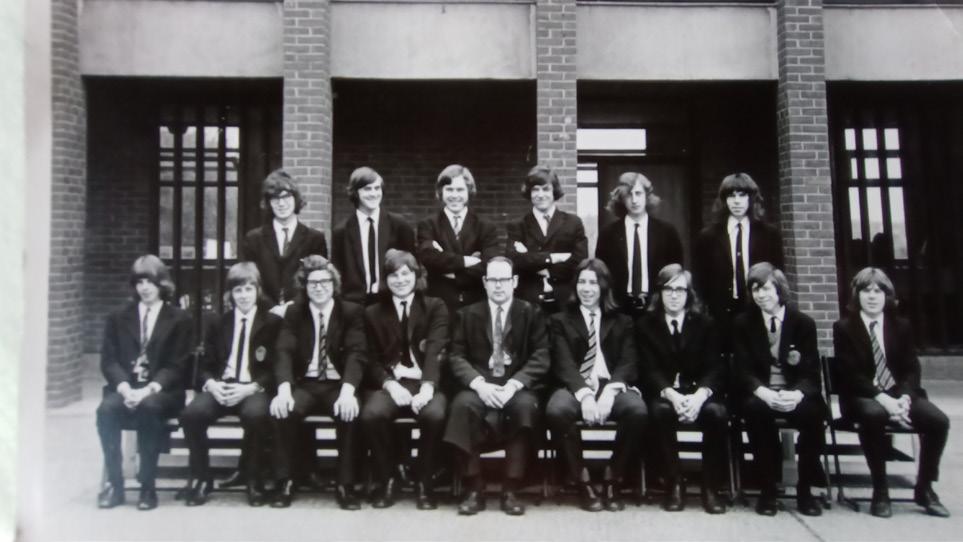
Needless to say, some of us took this new regime too far and in my case I foolishly called upon the lads to veto an exam to do with English literature as we had enough on our plate to which they all agreed. The day after the exam, I was hauled in by Jack Hawkins to explain why I was the only one not to attend the exam. I was fuming that I had been completely let down by my classmates, but it taught me a good lesson for the future.
Sixth-form life also involved field trips and they were a blast. I had to do Geography as the school timetable would not allow me to do French together with my two other chosen subjects, History and Economics. So for those of us in the same boat, Geography field trips were just a jolly for us, as we studied pubs rather than wave-cut platforms etc . Unfortunately, on one occasion some of the teachers chose the same pub as us so we were immediately told to get back to the hostel and that detention would await us on our return to school.
During our time in sixth-form, someone foolishly agreed to allow us to organise a band to play, and a couple of lads booked Kilburn and The High Roads with the magnificent Ian Drury. The looks on the faces as Ian Drury treated us to his full repertoire was a delight. Needless to say, I don’t think there was a follow-up.
Sixth form was a relative success for me due to the excellent tutelage of the Economics and History teachers, including the superlative John Burston, and I came out with good grades at A level, though being a rebellious idiot I refused to follow the Headmaster’s and teachers’ advice to go to university. Instead I went to study accountancy at college which did for me reasonably well. The University of Life I chose was the excellent institution, Old Olavians Rugby Football Club, which has been an excellent chapter of my life.
Message from the Reverend Clive Smith (1961-69): I would love to hear from any contemporaries or other Old Olavians in the Doncaster or South Yorkshire area I already know Colin Jeynes. I was at St Olave’s through the sixties and, after reading History and Theology at Leeds University, I was eventually ordained in 1977 after a brief spell teaching. I served most of my ministry as a Hospital Chaplain. At school I was a member of the History Society, the school choir, the Debating Society, the chapel committee after the move to Orpington, a monitor and captain of the 2nd XV in 1968-69. I was quite often the hospital money collector for my form which led to my participation in the ‘2Q Tabloid’ and its subsequent versions. For the uninitiated this was a funny and slightly irreverent newsletter which made quite a profit for the causes supported by hospital money.
Possibly my unique contribution to school life was that my father was the school-keeper at our sister school, St Saviour’s and St Olave’s and I lived in the school grounds there, I was on a few occasions used as a courier to take various documents to or from the Clerk to the Governors who had his office at St Saviour’s . This entailed me walking to and from Tooley Street to the New Kent Road and having an hour or two out of school and a cup of tea with my mum. I can’t see that happening nowadays!
With best wishes to all Olavians, past and present,
Like many other organisations, freemasonry has slowly emerged from the freeze following our isolation from one another.
The good thing is that, despite the work of individual lodges coming to a standstill for almost two years, those who look outward from our organisation have remained active. This particularly applies to those who respond on our behalf to emergencies and disasters - whether they occur in this country or overseas.
We are particularly proud that our organisation is always in the forefront whenever we receive those desperate appeals for financial aid in the aftermath of war, floods, disease, volcanic eruptions, drought and so on. Alongside these, our regular Old Olavians’ Masonic Lodge, once restricted to those with close links with our school, is an ‘open’ lodge nowadays - welcoming and accepting members from all walks of life. Even so, we are delighted that our latest applicant to join is a former pupil of our school. So, too, is our newly elected Master - Phil Clare (1978-83) - who takes office in October 2022.
I am always prepared to meet, or chat on the phone with, anyone wanting to learn more about our organisation or
wanting to join it. Just give me a call if you would like to take up this offer. I live not far from the school in the Orpington area. I can readily pop up to London by train for a meeting.
Peter G Hudson OBEHonorary Secretary - Old Olavians’ Lodge.
Telephone: 01689 858583
E-mail: hudsons91@btinternet.com
Former Choristers’ Reunion
For the first time in quite a few years, I made it down to the Savoy Chapel for Former Choristers’ Sunday, which is always on the second Sunday in July. I knew a few other people from the period when I sang in the choir in the mid-1980s were also going to be there, and it was a particular pleasure to catch up with John Keith, Peter King and David Budds. It was also great to see Mr Coulson, who was Headmaster during my time at the school, looking and sounding remarkably similar to how I remember him striding onto the platform at the start of assemblies. He was always so supportive of music in the school, including contributing confident bass tones to the school choir.
The Chapel Choir were in excellent voice. The service began with the setting by Ralph Vaughan Williams of George Herbert’s poem ‘Sweet Day, So Cool’, and it was so good to hear that this rarely sung piece is still in the repertoire. It brought back a very strong memory of Dr Cole explaining the double meaning of ‘closes’ in the line ‘My music shows ye have your closes’; one of the many occasions when he would pause a rehearsal to ensure that we understood what we were singing.
Director of Music, Philip Berg made a point of spending time with all of the former choristers at the end of the service, and the Chaplain made us all feel so welcome. I shall certainly make sure I attend more regularly in the years to come!
Andrew Flewitt (1984 -1991)
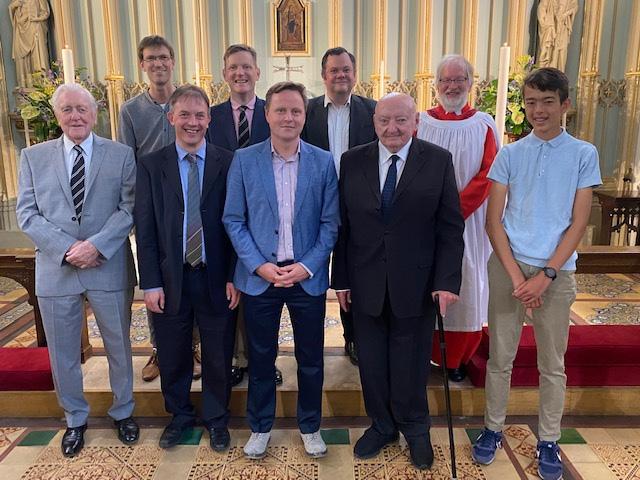
Who would’ve thought that the hardest tour for player availability for over twenty years would be the year after two years of Covid? But so it proved, to the point where we had to cancel the Friday game against Kenn in advance because we had no hope of fielding more than about four players. Luckily our fortunes improved for the rest of the week, and we ended up welcoming no less than eleven new players to tour, and just about scraped through with enough personnel to fulfil the other games. Even the forecast 31’C temperatures all week didn’t put a damper on things too much, as a gentle sea breeze kept us very welcome company for most of the week and conditions stayed just about manageable.
After a nice meet-up lunch in the Church House Inn in Marldon we drove the short distance to Paignton and along the seafront to start the first game. Needless to say, the pitch was looking pretty brown, hard and dry. Tom Parsons had managed to recruit three players from his home club, Tintagel, to play with us on the Sunday, and they were all terrifically nice guys and really good cricketers, so well done Tom. We even thought we may be a bit strong for the home team, based on the strength of previous years. We were given a choice and decided to bat first in a 35-over game. Andy Rouse opened up with Jeremy Araujo (Tintagel) and they got the tour off to a flying start, scoring 86 together in twelve overs before Rousey was out. Sadly, as is so often the case, one wicket brought two and Joe Parsons’ stay at the crease was all too short, bowled by Charlie Ward’s brisk seam. Jeremy was out soon afterwards for a sparkling 75 (run out from a direct hit), and our other two Tintagel guests, Jordan Burnard and Ryan Pooley, only lingered a little longer, possibly victims of trying to maintain the fast pace we’d set off at. Archie Walker, another new tourist, battled manfully against the speed of the attack at number five, which is about five places higher than he usually is for his home club, Bishopston in Bristol, but the only other innings of note came from Ashwani Arora, who had come down with Rousey from ODCUACO. He set about the bowling enthusiastically until he was run out for an entertaining 49 off thirty-eight balls (some may mutter those familiar words ‘jug avoidance’), and the Old Olavians coasted in to finish on 228 for nine at the end, which we thought was a good total and, if it was beaten, the oppo would have had to bat well.
Well, they did bat well. It turned out that Paignton had populated their side with about eight of their premier league first team, and several of them were up at the top of the order. Archie Walker and Ben Arthure, also from Bishopston, opened the bowling, but the batsmen, R and L Medlock, didn’t give them any chance to settle. There was little in the wicket for the bowlers and the outfield
was like lightning, and the batters hit through the line and targeted the short boundary towards the parked steam train just through the fence. After a few overs we had to try something a bit different, and Lance Giles tried a few darts and managed to bowl one Medlock for 37, by which time the score was already on 77 after six overs. We hoped Ashwani’s big-spinning mystery left-arm would cause them some trouble and he came on at the other end but, although they seemed to think about it a little harder, it didn’t really stem the tide. Ryan replaced Lance, but received similar treatment and, until the other Medlock retired on 105, it was pretty tough going. This did bring about a bit of a change, though. Jeremy came on and bowled their number three, and Tom Parsons started ripping his leg-spinners quite nicely and bowled their number five, and then they got another one or two each, but the runs kept flowing at quite a rate and their target was rapidly approaching. Lance returned and got another wicket, leaving them effectively eight wickets down, but then their skipper Harry Ward came in and smashed a four and six and it was over. We’d made a really good effort to come back after their stratospheric start but it proved too much of a task at the end and Paignton won with about ten overs left.
We played a little gentle pitch and putt on Monday morning, which Ian Giles won, as is the custom, although Laurence Sanders was the crowd-puller; he’d been having trouble getting anywhere near the green with his wedge, but once he got the putter out he found he couldn’t miss, so he simply adopted the approach of using a putter from the tee, to pretty good effect in coming second. It was observed that this safety-first approach was not too far removed from his batting style, to which he merely gave a scornful scoff.
Needless to say, it was another bright, blue, warm day at Sidmouth. The OOs won the toss in a forty-over game and decided to bat. The Paignton lads we’d been chatting to the day before had mentioned that Sidmouth had an overseas pro who had been putting the wind up everyone with his fast bowling (apparently well into the 80s mph), so we all played spot-the-quickie with their fielders. Tom Parsons was unlucky to get a thin edge to the first ball, but after that Laurence (29) and Nick Price (another Bishopston friend) batted well to take the score to 70 before the second wicket fell. Pete White marched out and immediately looked at home, despite having not played that much cricket this season, and punched 29 runs off twenty-eight balls. In fact, he should have got a few more than that because he hit a nice six over square leg, but sadly the skipper for the day had omitted to make sure everyone knew about the new rule at the ground, whereby the batter is docked five runs if he hits the netting along the seafront on the full, rather than the customary +6 (in order to discourage
players from whacking the ball out of the ground and onto the sunbathers below). Sorry about that. Ironically it was our game against Sidmouth a few years before that had made them bring in the netting and the rule, when Sagren had clonked an old lady sitting on a beach-front bench (she recovered fine).

Joe Parsons and Cameron kept Nick company for a bit until he was out for an elegant 61 from sixty-eight balls with the score on 151 and the OOs five wickets down and twenty-eight overs gone. There was still a bit of work to be done to get up to a respectable total. As Sidmouth worked their way through eight different bowlers, Ashwani (50 off thirty-nine balls) and Lance (31 off thirty-four) put on a stand of 75 and Rousey chipped in at the end to take us up to 246 from our overs. In the second half of the innings a chap with “Yusuf” written on his back had come on and bowled some decent spin, and one much quicker ball which zipped past Lance’s bat before it was half-way down, and it later transpired that this was the Codi Yusuf who had been giving the Devon batsmen heart palpitations all season. We were rather glad he’d not bothered with his long run-up that day.
Annoyingly the Sidmouth scorer completely messed up the scoresheet for the second innings, but this is basically what happened: Ben and Archie opened the bowling and put up a good show, with Archie actually getting too much swing and having to fight against it hooping in too much. Sidmouth had started aggressively though, and had settled down a little ominously. Lance came on at the hotel end, protected somewhat by the new netting rules which shackled the batsmen’s urge to welly him out of the ground. He managed to break the partnership with the caught and bowled (extremely rare) wicket of Thomas for 46 off thirtynine. Cameron came on at the other end and found some lively bounce and nip and got Moore out for five, and then Yusuf came in and started smiting about. Ash replaced Lance, but despite getting some prodigious spin couldn’t sneak a wicket and, with the other opener Gaywood, Yusuf began to take the game out of the hands of the tourists. Laurence’s leg-spin couldn’t magic a wicket either. Lance tried again from the bottom end in a last roll of the dice.
He darted a wide one down that Gaywood took a great heave at and completely missed. Rousey threw himself across to cover it, and the ball bounced off his gloves and back onto the stumps and Gaywood was out stumped for 71 from eighty-eight balls. Ha! Was this the chink we needed? Giles was hit for a couple of sixes and that was his spell over.
However, now one end was opened up for Ashwani. He was still jagging it about and bowled one new batter, and then another. At the other end, Yusuf was bashing boundaries. Which would be reached first, ten wickets or 247 runs? Then Ash got one to keep low (with a possible hint of bottom edge) and got Yusuf out LBW for 82 from forty-seven balls. Only a handful more runs were needed but Sidmouth were now six wickets down. Was an unlikely win possible? Ash was still beating the bat every ball but was spinning it so much he was having trouble hitting the stumps. Then he bowled another batter. Sadly it was just a little bit too late, and the final runs required were knocked off and Sidmouth won with four overs left. We later found out that one of the home batsmen had actually stormed off in a rage and refused to bat in a protest at them putting him in the middle-order rather than at the top, so we’d actually only needed two more wickets.
Still, it was a beautiful evening, with the dipping sun giving the sea an ethereal glow and adding a rosy hue to the red cliffs at the end of the beach, and after a couple of drinks with the oppo we set off to the White Horse for a reliably excellent meal in good humour, if slightly wistful that we didn’t quite have time for a dip in the sea to cool down instead of a shower in the clubhouse.
Motivated by our two gallant losses so far, we drove up to Sandford with a steely glint in our eyes to accompany the usual tour twinkle. The ground was as picturesque as ever, and the new second pitch was found to be coming along a treat - when viewed from the new square it really did give a completely different perspective on the ground; seeming more like you were playing in front of the grand pink mansion in the middle distance than the clubhouse.
The tourists won the toss again and thankfully batted first for a third time in the warm sun. Regular guest Simon Burrell (37) and Pete White (24) got us off to a great start with a solid 59 in ten overs before they were parted, and then the Sanders brothers Laurence (29) and Cameron (35) took the score on to 185-4 from thirty-two overs of the forty-over game. New guest Aditya More (29) from Ashburton and Nick Price (26) carried on the good work, and Rousey and Ash finished things off to leave the OOs on a round 240. It was nice to see Andy Theedom playing for Sandford again - he’d moved away some years ago but happened to be visiting and had been roped in to play.
We were treated to a proper old-fashioned Sandford tea during the interval, which was doubly welcome since most clubs had totally given up making teas this year. Hopefully they will make a return to league cricket next year as everyone seems to have missed them.
Archie took the first over of our defence and settled down nicely, and Pricey, as our only other seam candidate, took the second. No joy was forthcoming immediately, however, and captain Cameron brought on Lance who managed to bowl one opener who was unlucky enough to face one that actually turned a small amount. Adi More came on at the other end and bowled a maiden and then a wicket maiden with his fizzing left arm spin and had to be taken off quickly as he seemed to be outclassing the batsmen. We thought we’d keep him for when we were under the cosh later on but that state of affairs never materialised. Chris Evans, playing his first Sandford game after years of touring, got the other opener out caught by Laurence, and Ashwani took wickets steadily at the other end and the home team’s challenge never really got going. Aditya returned and took two more wickets to end with figures of four overs, three wickets for one run. Andy Theedom came in at number ten with an impossible task in front of him. He smashed his first ball for a big six over long-on, and then drove his second to point to become Ash’s fifth wicket. Sandford were all out for 165 and Old Olavian pride was restored and an important win recorded in the book . As Ian Giles said afterwards in his short speech thanking them for the game and expressing our condolences about the sad passing of Bill Matten: every few years Sandford let us win one to keep things interesting.
As we repaired to the Three Little Pigs in Crediton for dinner everyone was full of good spirit and feeling the love of tour, which was quite appropriate for a team including players named A More and A Rouse!
The game against Chudleigh on the Wednesday had been sadly demoted to an evening T20 as they couldn’t raise a side for an earlier start, but we certainly didn’t waste the day. A dip in the sea was followed by beach cricket and
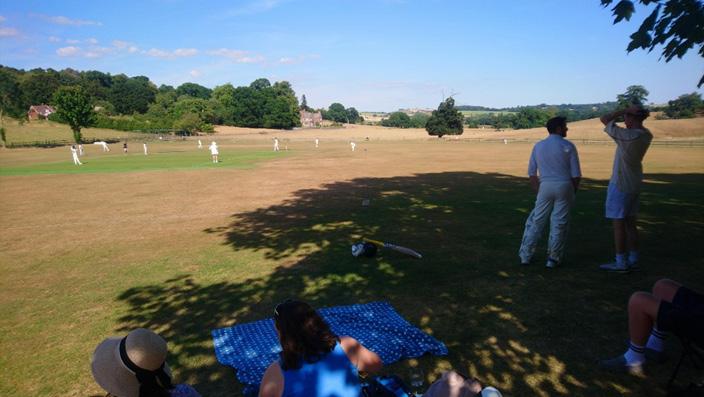
crazy golf and lunch and ten-pin bowling back at the hotel and general seaside fun.
The Chudleigh scorer has unfortunately mislaid the scoresheet for the game, but this is what happened: the tourists once again won the toss and batted. Simon opened up with Lance and they put on a steady fifty-odd before Lance got slightly disoriented, and looking at the scorebox which showed twelve overs had been bowled, thought they had better start whacking it a bit more. He had a big swish at one and got out. It was only later when he realised that the overs were actually counting down from twenty rather than incrementing up from zero, as often happens in Devon, so he didn’t need to have got in such a panic at all. Pete White got a few, as did Nick Price, but we lost wickets at regular intervals and looked like being woefully short of a defendable score, especially considering we were only fielding nine men (Chudleigh had said they also had nine, but then someone else turned up so they actually had ten, although their tenth man didn’t bat). However, Giaco Bridget, another friend from Bishopston, was guesting for us and decided to take his opportunity of batting higher than his usual number eleven with both hands. A series of lovely lofted drives over mid-on garnered him 27 runs and took our total to 129, which at least made a game of it.
Archie and Giaco opened the bowling when Chudleigh began their reply, with Giaco particularly starting well and getting a wicket or two. Ian Giles bowled his spell fairly tightly and got a wicket too, and Chris Evans and Lance chipped in a bit as well. The Chudleigh overseas bat retired after getting a few to make it a closer contest and, although the home team kept advancing towards the target, the OOs did keep taking wickets to retain a glimmer of hope. In the end we were twenty runs light, however, and Chudleigh won with an over and one ball to go and their last pair at the crease. It had been a fun game and certainly much better than no game at all.
The final game of the week was at Newton Abbot. Expected player numbers had fluctuated on both sides during the preceding days, but we both ended up with nine
players just before the start of the thirty-five over game.
The OOs won the toss and batted first for a record fifth time in the week. Tom Parsons opened up with his friend from Tintagel, Andy Boxhall (10), and remedied his Sidmouth disappointment with a classy fifty before getting out the very next ball in perfect friendly cricket etiquette. Dan Coles, a guest from Ashburton, hit out for a good thirty and Pete White carried on his strong earlier form by getting another fifty at a run-a-ball. Not to be outdone in the politeness stakes by Tom, he also got out the very next ball. Lance Giles wandered to the crease at 126 for four off twenty overs and wafted his own way to fifty off thirty-three balls before getting out the very next ball. Well, he wasn’t going to be the one to let the side down. Joe Parsons (13) and Ian Giles finished things off and the tourists posted 240 in their thirty-five overs, which we thought was probably a fair bit more than we needed as they seemed to have a fairly young/old side. We had offered to mix the teams up a bit before the start of the game, but Conrad, the home skipper, had preferred to keep things as they were, and actually it’s always a bad thing for the OOs to become overly confident about their batting prowess, as Paignton earlier in the week had demonstrated.
The tea intermission was lit up by probably the best teas we’d ever had at South Devon! And after a long week these were especially welcome. Andy Boxall opened the bowling when the tourists began their defence and put in a creditable effort and got a wicket, even though he said he didn’t normally bowl much. Chris Evans put in his quota from the other end and for once didn’t get his normal clutch of South Devonian wickets. After ten overs the batsmen were 40 for one and beginning to get behind the rate, although M. Hargreaves was batting well at one end. Ian Giles came on and got a wicket in his first over, the batsman falling to a running catch at mid-off as the fielder came over from mid-on, and the scorebook recorded the excruciatingly rare, “caught Giles bowled Giles”. Pete White was wheeled out to roll back the years to about 2012 when he had had to open the bowling every game as we didn’t have any other seamers. He got a wicket too and, with a run out, South Devon were 121 for four from twenty-one, and still required 120 from another fourteen. Possible, but a tough ask. Tom Parsons began a spell and sent down a barrage of leggies that the batsmen found difficult to get away. Chris Evans would never pretend to be the most electric fielder in the side, but he does generally make an effort at things and can often be heard to utter a genuine snort of disappointment when the ball bounces over a stuck-out foot, but on one delivery of Tom’s he couldn’t offer any excuses when the ball cannoned squarely off his back, as he stood supposedly saving a single alongside the umpire at square leg, because he happened to be watching the football game in progress on the next
pitch.
Hargreaves had been batting well all this time, and the hopes of the home side rested on his shoulders, but when he was bowled by Lance for an excellent 89 the writing was on the wall. We’d been holding back Adi More because we rather thought he may run through the batsmen a bit too swiftly when he was unleashed, but we couldn’t deny him a bowl any longer. Sure enough, fourteen balls from him yielded two runs and three wickets and it was all over, in 31 overs with the score on 169. It had been a most enjoyable game, though, played in the perfect friendly tour fashion. The absence of a tour dinner this year due to the unusually small number of tourists allowed us to stay and enjoy the hospitality of our hosts a bit longer than usual, which was a fine way to end the week.
It had been another entertaining tour, full of good memories and a lot of hot, sunny, enjoyable cricket. Best of all, of course, was the renewal of old friendships and the making of new ones. I hope all eleven of the first-time players come back to take part in another tour; they all contributed a huge amount, especially the ones from Tintagel and Bishopton cricket clubs. Many clubs throughout the country have had a really difficult year for player availabilities, probably because lots of people wanted to go out and try new things and have new adventures after a couple of years mostly stuck at home due to Covid. We hope that player numbers will be better next year once people have got this out of their systems. Spending a few days with new and old friends playing cricket in Devon is a very different experience to league cricket every Saturday, and the tour is only possible if people are prepared to commit a relatively small amount of time and money for the experience. I’m utterly convinced everyone comes out well ahead in this deal, and that the Old Olavians’ tour is an institution worth the effort of keeping alive. If any cricketer reading this hasn’t been before (and congratulations on reading this far!), please do consider it - I’m sure you won’t be disappointed. And to everyone else - don’t put off your return too long, or when you find you do fancy it again, we may not be here! Also, if anyone has cricketing friends whom they think would enjoy it, don’t be too shy to get in touch.
A final thank you to Stephen Parsons for another year manfully putting in the umpiring duties for us in almost sweltering conditions. Also a big shout out to our travelling family and supporters/critics who add that invaluable extra dimension to the week - Ray and Linda Michael (who sadly got Covid and had to leave early but who recovered quickly), Pennie Giles (who sadly got covid too and took a little longer to recover but got there in the end), Becky White and Kathy Staff, Ben’s dad James Arthure, and Andy Bayliss and Craig Giles and the boys Mason and Freddie who kept everyone very entertained/exhausted. Finally
finally, a big hug to Terry Smith who wasn’t able to come this year due to ill health - you were missed Tel! And also to Dave Colloff, whose first baby was delivered on the first morning of tour at about breakfast time (no doubt arriving slightly before Colloff, who would have scooted in holding a sausage and a piece of toast he had grabbed from the canteen on the way just before they stopped serving). And a raised glass to Brian Cantle, whose memory still looms large whenever OOs gather in numbers more than one to talk about cricket.
Lance Giles (1988-95)lancegiles@hotmail.com
See this page for photos and video clips from this and previous tours:
https://www.facebook.com/oldolavianscricketclub
Results:
Sunday 7th August vs Paignton: 35 overs, Paignton won by 3 wickets
OOs 228 for 9 (J Araujo 75, A Arora 49)
Paignton 231 for 7 in 24 overs (T Parsons 3-22, J Araujo 2-17, L Giles 2-26)
Monday 8th August vs Sidmouth: 40 overs, Sidmouth won by 3 wickets
OOs 246 for7 (N Price 61, A Arora 50*, L Giles 31, P White 29, L Sanders 29)
Sidmouth 247 for 7 in 36 overs (A Arora 4-39, L Giles 2-41)
Tuesday 9th August vs Sandford: 40 overs, OOs won by 75 runs
OOs 240 for 6 (S Burrell 37, C Sanders 35, L Sanders 29, A More 29)
Sandford 165 all out in 33.2 overs (A Arora 5-17, A More 3-1)
Wednesday 10th August vs Chudleigh: 20 overs, 9 a-side, Chudleigh won by 1 wicket
OOs 129 all out in 19 overs (S Burrell 30)
Chudleigh 131 for 7 in 18.5 overs (G Bridget 3-20)
Thursday 11th August vs South Devon: 35 overs, 9 a-side, OOs won by 71 runs
OOs 240 for 7 (T Parsons 53, L Giles 53, P White 50, D Coles 30)
South Devon 169 all out in 31.2 overs (A More 3-2)
https://www.facebook.com/oldolavianscricketclub
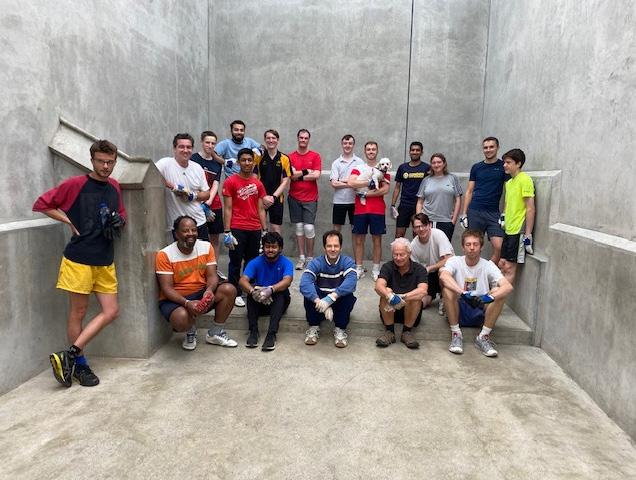
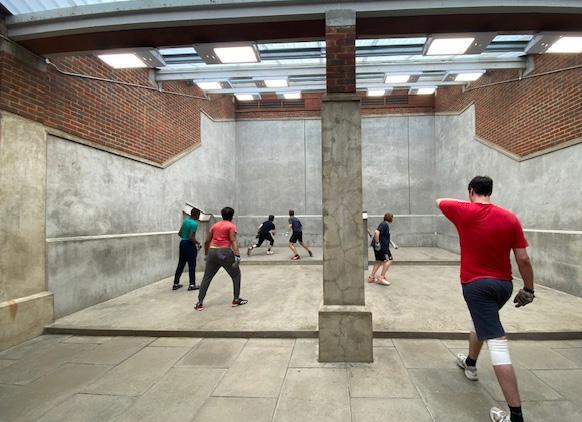
It was another fantastic season for the Old Olavians Fives Club with numerous excellent team performances and individual achievements too. These included another men’s national win for Seb Cooley, a ladies’ national title for Charlotta Cooley, as well as a further win for Seb in the Northerns and a London final for James Toop and Howard Wiseman. There were numerous Old Olavians taking part this year in the men’s and ladies’ varsity match between Oxford and Cambridge as well as a good scattering of Olavians in the National Universities Championships. Jessye Tu deserves special mention for pioneering the amazing growth of fives on the Magdalen College court at Cambridge University. Under 21s champion, Prajeeth Sathiamoorthy, also reached the final of the Under 25s.
The Old Olavian club morning continued to grow steadily with more returning after recently leaving university. Six courts were frequently in use on Saturdays and the growth in numbers was reflected in the large range of players that represented the Old Olavians across the first, second and third league divisions. Isaac Jochim was a particular rising star of the season, having just left school and having become the resident Fives professional at Mill Hill School; he continued to be the unstoppable force that he had been throughout his school career. Isaac struck up a particularly powerful partnership with Tom Gallagher; recently back from university, and they achieved some clinical, very high-level results through their league matches and brilliant performance in the Kinnaird Cup, reaching the quarter-finals at their first attempt. The all-important
three-pair national team competition, the Barber Cup, was successfully defended against the Old Salopians from Shrewsbury School. Isaac Jochim and Tom Gallagher convincingly won at third pair in straight sets.
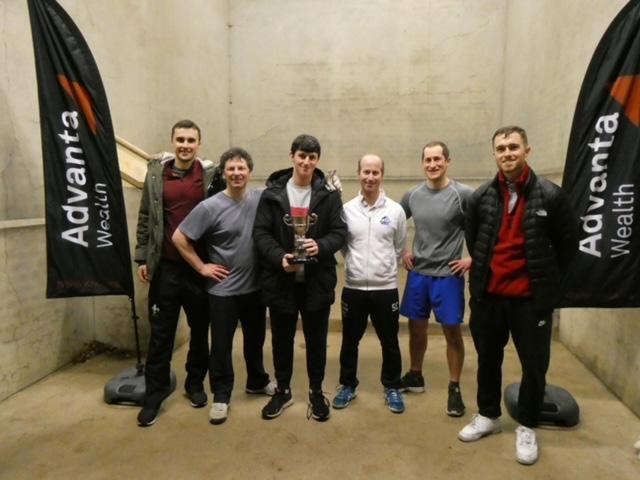
James Toop and Howard Wiseman were still battling at first pair when Seb Cooley and Tony Barker took the second-pair match by three games to one to secure the team victory. Harry Ravi and Prajeeth were part of our eight-strong squad who helped get us to the final. This was the twenty-first win in the past twenty-three years; the club’s twenty-second in total.
Olavian Fives goes from strength to strength at the School, and also with the Old Olavians. Do feel free to join us in any capacity on Saturday mornings during term-time, from 10am. Family and friends all welcome!
Walter MELLORS (1944): Died on 17 March 2022. We were told this sad news by his daughter, Meg Andrews.
Terence (Terry) Charles PLATT: Died on 6th July 2022 - we heard this sad news from his son, Simon.
Ronald Alfred RANSOM (1951): We have recently been told by his widow, Renate, the sad news that Ronald died more than four years ago in 2018. His daughter, Andrea, has sent the following brief tribute: Ron (1935-2018) passed away on 8th July 2018 in Berlin after spending many years living in Germany. His profession within the oil and coal industry brought him to Germany in the 1980s. He was fortunate to travel to numerous countries which he enjoyed very much, always eager to expand his knowledge on different cultures and languages. He had a great passion for books and for global affairs but also loved the arts, football and good food. He was very much a loving family man and leaves behind a wife, two daughters and three granddaughters.
Keith Edward SAVAGE (1964-71): died suddenly on 4th December 2021. He was born in August 1953 and left StOGS in 1971. In 1996 he received his MA in Education from The Open University. Keith had at least one older brother who also attended our school, Colin Bryan Savage, two years Keith’s senior.
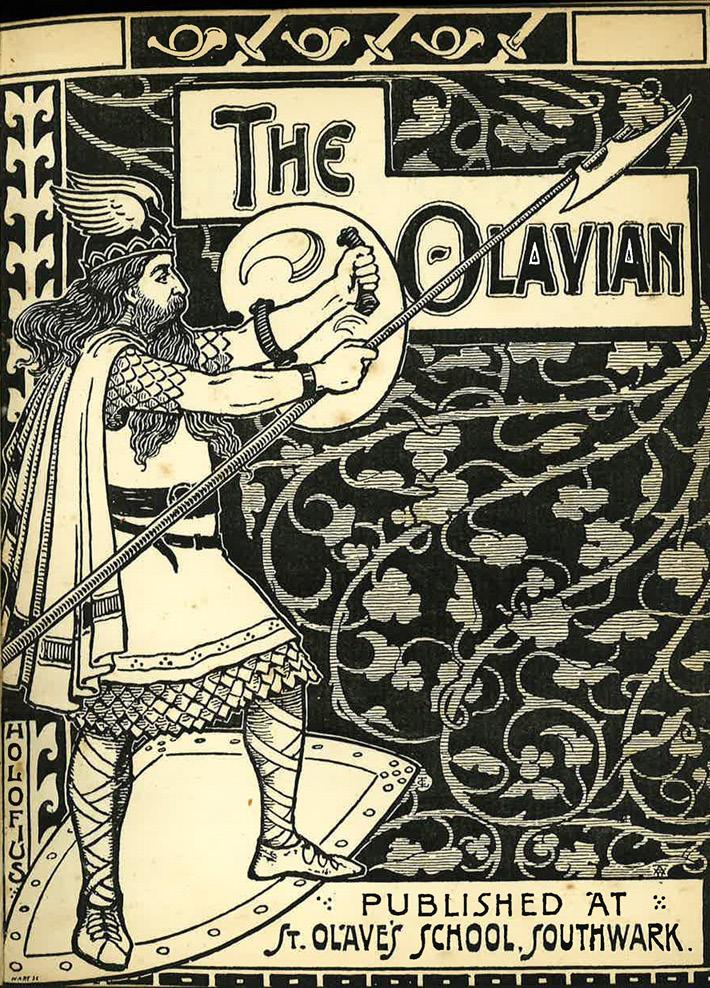
PRESIDENT
Andrew Rees, Headmaster
St Olave’s Grammar School, Goddington Lane, Orpington, Kent BR6 9SH
Tel: 01689 820101
CHAIRMAN
Chris Harris, chairoldolavians@gmail.com
COMMITTEE MEMBERS
Graham Milne
Paul Ouseley
Bill Prouse
Rajiv Purwar
EDITOR OF THE OLD OLAVIAN
John M Brown, 60 The Lawns, Rolleston-on-Dove, Staffordshire, DE13 9DB
Tel: 01283 813976 e-mail: johnmbrown60@gmail.com
SECRETARIES OF AFFILIATED CLUBS AND SOCIETIES
CRICKET CLUB
Lance Giles, c/o 44 Harwood Avenue, Bromley, Kent, BR1 3DU
Tel: 07891 725488 e-mail: lancegiles@hotmail.com
FIVES CLUB
Howard Wiseman, 7 Genoa Road, Anerley, SE20 8ES
Tel: 020 8778 0752
OLD OLAVIANS’ LODGE (No. 5758)
Peter G Hudson OBE
9 Downs View Close, Pratts Bottom
Orpington, Kent, BR6 7SU
Tel: 01689 858583 e-mail: hudsons91@btinternet.com
